This brief discusses the experiences of early career Black, Latina, and Afro Latina women in the trades. The COVID crisis has put a spotlight on the concentration of Black, Latina, and Afro-Latina women in low-wage jobs, including in many essential healthcare and retail jobs. The skilled construction trades have given many women an alternative to the poorly paid jobs in the service sector that many had to turn to before finding the trades. Skilled construction trades provide opportunities to build careers that are both challenging and fulfilling, pay a family sustaining wage with benefits, and can be accessed through ‘learn as you earn’ apprenticeships.
RESOURCE TYPE
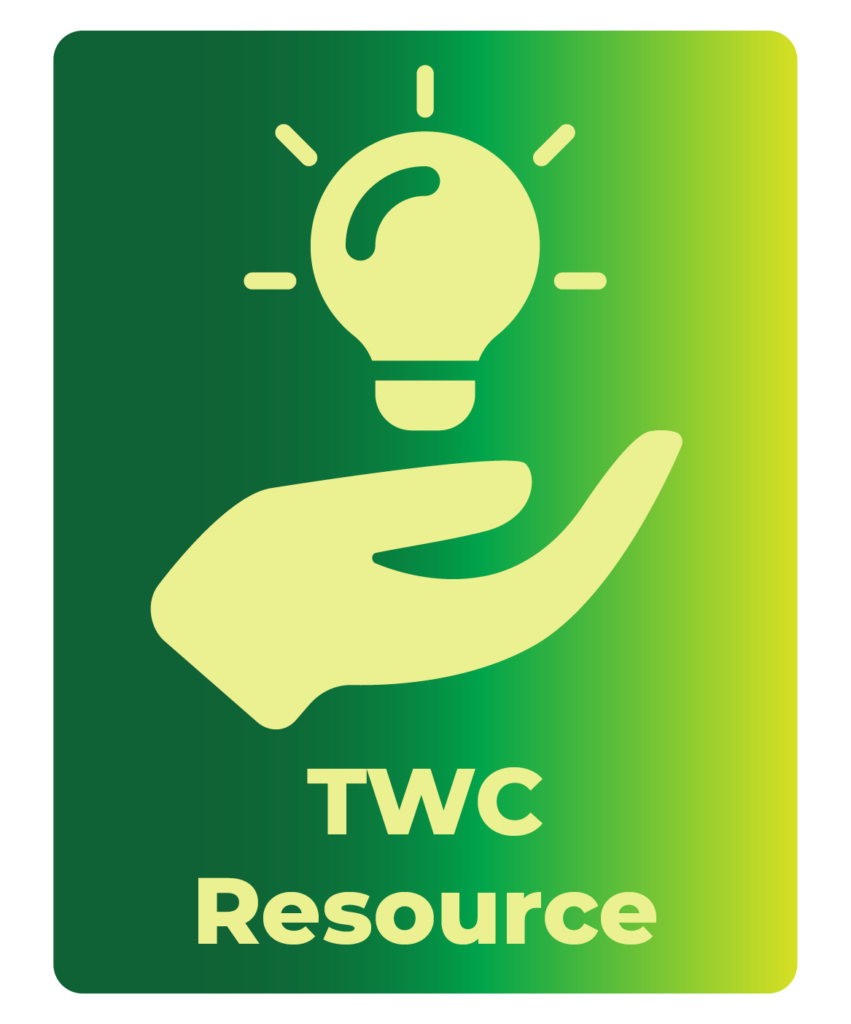
Programs to Expand the Skilled, Technical Transportation Workforce
Programs to Expand the Skilled, Technical Transportation Workforce: Proceedings of a Workshop summarizes the Workshop to Broaden the Diversity of the Skilled, Technical Transportation Workforce held in September 2024 at the National Academies of Sciences Building in Washington, DC. The workshop was sponsored by the Federal Transit Administration and the National Science Foundation and brought together experts and educators across academia, government, and industry.
National Academies of Sciences Engineering and Medicine
March 2025

Understanding Absenteeism in Public Transport Operations
Absenteeism has been a persistent problem that can directly impact an organization’s ability to meet the demands of providing service. Factors such as operator job satisfaction, the attractiveness of the profession to current and future workers, and the evolving attitudes towards work all contribute to absenteeism playing a role in workforce availability. Several APTA members participated in a global study on operator absenteeism. The result is a report which aims to describe the causes and impact of absenteeism, while identifying action plans that organizations can use to address the issue. This report was developed by the International Association of Public Transport (UITP).
American Public Transportation Association
February 2025
TOPICS: Policy and Planning , Retention , Workforce Shortage

Understanding the Prevalence of Mental Health and Behavioral Distress in Transit Assaults
Mineta Transportation Institute
February 2025
TOPICS: Policy and Planning , Retention , Safety and Health
Understanding the Prevalence of Mental Health and Behavioral Distress in Transit Assaults and Presenting Targeted Response and Mitigation Methods to Reduce Victimization Trends
This research aims to better understand the prevalence of mental health and behavioral distress in transit assaults and present corresponding targeted response and mitigation methods to reduce victimization trends. It includes a literature review, a data presentation and overview of reported public transit assault-related events, an examination of the contributing factors to those events, and documentation of 10 transit agency case studies. It discusses various approaches and strategies that transit agencies have used to prepare transit vehicle operators and other frontline workers to better recognize mental health presentations and engage appropriately. It also highlights evidence-based practices that transit agencies can use to better prepare their systems and provide tools employees can use to better communicate with individuals who may be having mental health-related episodes. The research team gathered additional data from case study sites, including the methods used to address assault-related challenges and the successful community engagement and partnerships. The report provides findings and policy and practice recommendations.

Technical Assistance Coordination Library (TACL)
National Rural Transit Assistance Program
TOPICS: Apprenticeship , Career Pathways , Community Engagement , Hiring and Recruitment , Labor-Management Partnerships , Low-No , Mentorship , Policy and Planning , Procurement , Program Evaluation and ROI , Retention , Safety and Health , Trainer and Mentor Development , Training , Workforce Shortage
Transportation Technical Assistance Coordination Library (TACL)
The Transportation Technical Assistance Coordination Library (TACL) provides a viable methodology and platform for access and findability of rural and tribal transit coordination resources across a broad range of transportation technical assistance centers and the Federal Transit Administration (FTA).
The FTA-funded Technical Assistance (TA) Centers participating in this ongoing work are:
- National Aging and Disability Transportation Center (NADTC)
- National Center for Applied Transit Technology (N-CATT)
- National Center for Mobility Management (NCMM)
- National Rural Transit Assistance Program (National RTAP)
- Shared Use Mobility Center (SUMC)
- Transit Workforce Center (TWC)
The TACL Task Force uses a systematic review process for resources included in the database. New resources will be added on a quarterly basis. Let us know if you would like to serve as a peer reviewer for our resources.
Why was TACL created?
The United States Government Accountability Office (GAO) published Public Transportation: Enhanced Federal Information Sharing on Coordination Could Improve Rural Transit Services in January 2020. GAO recommended that FTA “develop a communication plan that will effectively share information with state and local stakeholders on coordination opportunities in an accessible and informative way.” This effort was created to improve interagency resource coordination between FTA and its five TA Centers.
How can TACL be used?
TACL resources can be used to identify high quality technical assistance on transportation coordination. The resources can be used for research, training, practice, operations, planning, and other purposes. We encourage authors to cite TACL resources.
Ready to get started?
Visit http://transportation-tacl.org. Click on the Training tab at the top for instructions.
If you have a question about TACL, or if you would like to be considered to become a TACL peer reviewer, please contact info@nationalrtap.org

FTA-Sponsored Technical Assistance Centers
Federal Transit Administration
TOPICS: Apprenticeship , Career Pathways , Community Engagement , Hiring and Recruitment , Labor-Management Partnerships , Low-No , Mentorship , Policy and Planning , Procurement , Program Evaluation and ROI , Retention , Safety and Health , Trainer and Mentor Development , Training , Workforce Shortage
FTA’s Technical Assistance and Workforce Development Program (49 U.S.C. § 5314) and the Public Transportation Innovation Program (49 U.S.C. § 5312) fund technical assistance centers through national nonprofit organizations across a number of areas to improve public transportation. These nonprofit partners and the work they do play a critical role in supporting public transit agencies. Their services help to:
- Improve transportation for older adults and people with disabilities
- Drive the adoption of mobility management and related promising practices
- Accelerate innovative mobility practices and strategies
- Support rural communities
- Leverage new transit technologies
- Train the public transit workforce
- Provide workforce development technical assistance
- Support research projects selected by the transit industry that address day to day issues
- Support the transit industry meet safety regulations
National Center for Applied Transit Technology (N-CATT)
The National Center for Applied Transit Technology (N-CATT) delivers expert, focused technical assistance to transit agencies and organizations in rural areas and small cities to use or develop transit technologies and innovations that make services more cost-effective and efficient. N-CATT’s work supports FTA’s mission and focus on innovation by developing and supporting transit programs and services in rural and small-city America.
National Aging and Disability Transportation Center (NADTC)
The National Aging and Disability Transportation Center (NADTC) is a national technical assistance center funded by FTA with guidance from the U.S. Department of Health and Human Services’ Administration for Community Living to promote the availability of transportation options that serve the needs of people with disabilities, seniors and caregivers with a focus on the Section 5310 program and other transit investments. NADTC supports the delivery of more effective, efficient, high-quality and coordinated specialized transportation services that maximize federal investments. NADTC provides technical assistance, information and referral; develops field training; implements interactive communication and outreach strategies; and supports communities in assessing their needs and developing innovative transportation solutions.
National Rural Transit Assistance Program (National RTAP)
The National Rural Transportation Assistance Program (RTAP) was established by FTA in 1987 to provide a wide range of professional services and products. National RTAP addresses the training and technical assistance needs of rural and tribal transit programs across the nation and supports state RTAP programs. National RTAP provides comprehensive free technical assistance programs and resources including training materials, webinars, newsletters and technical briefs, peer resources, research, and innovative technology initiatives. The National RTAP also manages the Transportation Technical Assistance Coordination Library (TACL), which provides a sustainable methodology and platform to access resources across a diverse range of transportation technical assistance centers and FTA.
Shared-Use Mobility Center (SUMC)
The Shared-Use Mobility Center is a public-interest organization dedicated to achieving equitable, affordable, and environmentally sound mobility across the US through the efficient sharing of transportation assets. By connecting the public and private sectors, piloting programs, conducting new research, and providing policy and technical expertise to cities and regions, SUMC seeks to extend the benefits of shared mobility for all. The Shared Mobility 2030 Action agenda includes improving access to public transit, on-demand shuttles or buses, ride-on-demand services, carpooling and vanpooling, and carsharing, bikesharing and scooter-sharing.
National Center for Mobility Management (NCMM)
The National Center for Mobility Management (NCMM) supports FTA’s Coordinating Council on Access and Mobility activities and is funded through a cooperative agreement with FTA. The Center works to help communities adopt transportation strategies and mobility options that empower people to live independently, and advance health, economic vitality and self-sufficiency. NCMM provides capacity-building technical assistance and training; catalogs and disseminates best practice information on innovative mobility management programs around the country; and works to improve and enhance the coordination of federal resources for human service transportation, especially for people with disabilities, older adults and people with lower incomes.

Responses to General Directive 24-1: Required Actions Regarding Assaults on Transit Workers
FTA published Responses to General Directive 24-1: Required Actions Regarding Assaults on Transit Workers. FTA’s initial analysis of agency responses shows more than two-thirds of transit agencies determined that safety risk mitigations are necessary to reduce the risk of assaults on transit workers, and these agencies are working to roll out a variety of mitigation measures.
Federal Transit Administration
January 2025
TOPICS: Policy and Planning , Safety and Health
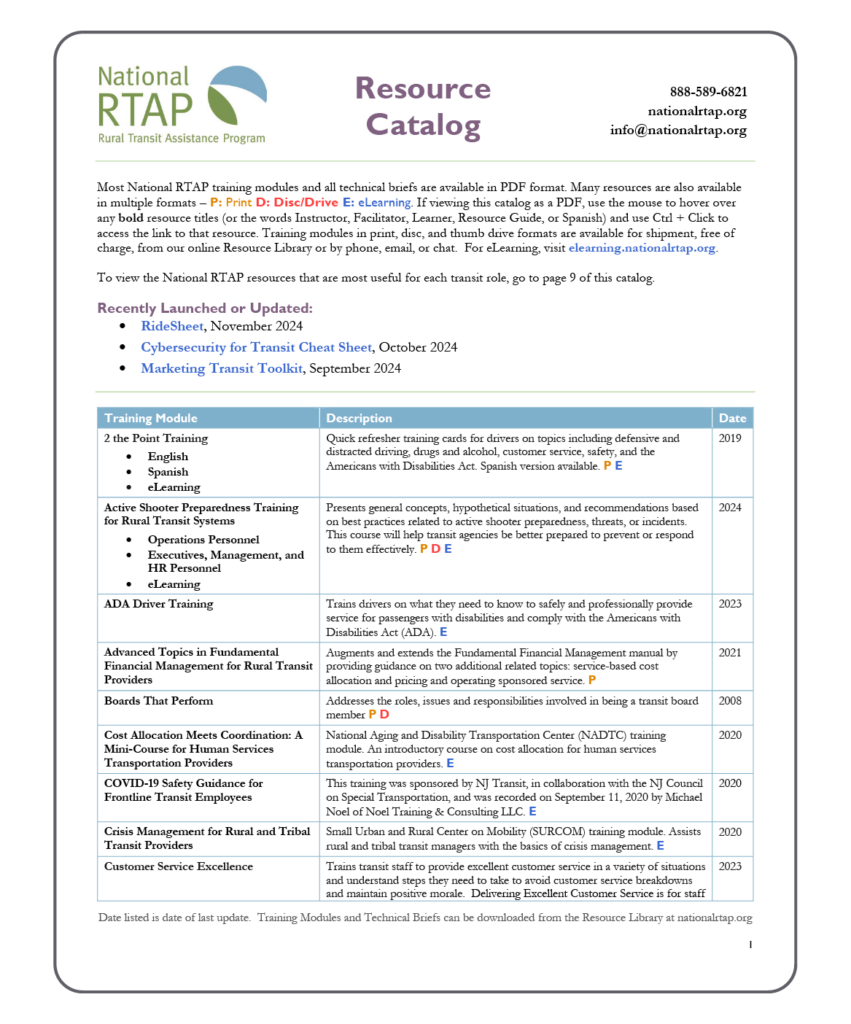
National RTAP Resource Catalogue
The National Rural Transit Assistance Program (National RTAP) aims to address the training and technical assistance needs of rural and tribal transit operators across the nation. They provide free technical assistance programs and resources including training materials, webinars, newsletters and technical briefs, peer resources, research, and innovative technology initiatives. This Resource Catalogue details all products available for ordering or online use.
National RTAP
TOPICS: Policy and Planning , Safety and Health , Training
Check out some trainings that may be most useful for transit frontline workers:
- Safety
- Active Shooter Preparedness Training for Rural Transit Systems
- COVID-19 Safety Guidelines for Frontline Transit Employees
- Emergency Procedures for Rural Transit Drivers
- Problem Passengers: Managing Difficult Passengers & Situations
- START (Safety Training & Rural Transit) Training
- Substance Abuse Awareness Training for Employees
- Transit and Human Trafficking
- Drivers/Dispatchers
- 2 the Point Training (available in Spanish)
- ADA Driver Training
- Customer Service Excellence
- Customer Service for Rural and Tribal Transit Providers
- Dispatching and Scheduling Training for Rural Transit Systems
- Essential Skills for Trainers
- Essential Spanish for Rural Transit
- HR
- HR Training Shorts on Employee Recognition, Interview Questions, Onboarding, and Performance Appraisals
Check out some technical briefs and toolkits relevant to the frontline transit workforce:
- Safety
- Coronavirus Disease 2019 (COVID-19): Information and Resources for Transit
- Healthy Habits: Reducing Stress and Fatigue and Increasing your Energy
- Incident and Injury Report Form
- Responding to Transit Incidents
- Seasonal Flu: Information and Resources
- Substance Abuse Awareness Training, Testing, and Compliance
- Threat and Vulnerability Toolkit
- Trainers
- Bus Roadeo Toolkit
- Training Adult Learners: How to Reach and Engage Your Audience
- Drivers/Dispatchers
- Customer Service in Rural Transit: How to Identify and Meet Customer Needs
- Emergency Response Checklist: After Normal Operating Hours & Emergency Response Checklist: During Normal Operating Hours
- Entry-Level Driver Training Requirements
- Essential Spanish for Rural Transit
- Mobile Driver Training Simulators
- HR
- Applying Good Business Practices: Hiring, Training and Evaluating Employees
Offerings as of January 2025

Expanding Apprenticeships in Maryland
The state of Maryland has recognized the potential for registered apprenticeships both to provide a path to better-paying careers that do not require college degrees and to help employers meet their needs for employees with specialized skills. This report explores opportunities for and challenges to expanding apprenticeship in Maryland and Baltimore.
Abell Foundation
January 2025
TOPICS: Apprenticeship , Career Pathways , Community Engagement , Policy and Planning
The report includes topics such as overcoming barriers to participation, such as transportation and childcare; countering employer misconceptions about apprenticeship; supporting apprenticeship in non-traditional sectors; and improving data collection and analysis.

American Public Transportation Association (APTA)
APTA is a nonprofit international association of more than 1,500 public and private sector member organizations. Organizations must pay for membership; benefits include advocacy for federal funding and policies, research, technical expertise and consulting services, workforce development programs, educational conferences and seminars, and 135 subject-matter working committees, including a workforce development committee
American Public Transportation Association

The Indirect Benefits of a Transit Apprenticeship and its Potential Value as a Flexible Postsecondary Pathway
As apprenticeships become more prevalent in the transit industry, they can also emphasize both technical and soft skills to invest in career advancement. This can attract young people to transit careers, which helps address challenges with recruitment and an aging workforce. Santa Clara Valley Transportation Authority’s Joint Workforce Initiative (JWI) employs this model by formally recognizing skills acquisition with accredited certificates. This study explores the JWI’s strengths within the revival of non-degree credentials fueled by efforts like the California Guided Pathways Program. Drawing on guidelines for connecting job training with degree programs, the study details the importance of affordability, portability, and articulation and outlines how these features could be further developed in the JWI.
Mineta Transportation Institute
December 2024
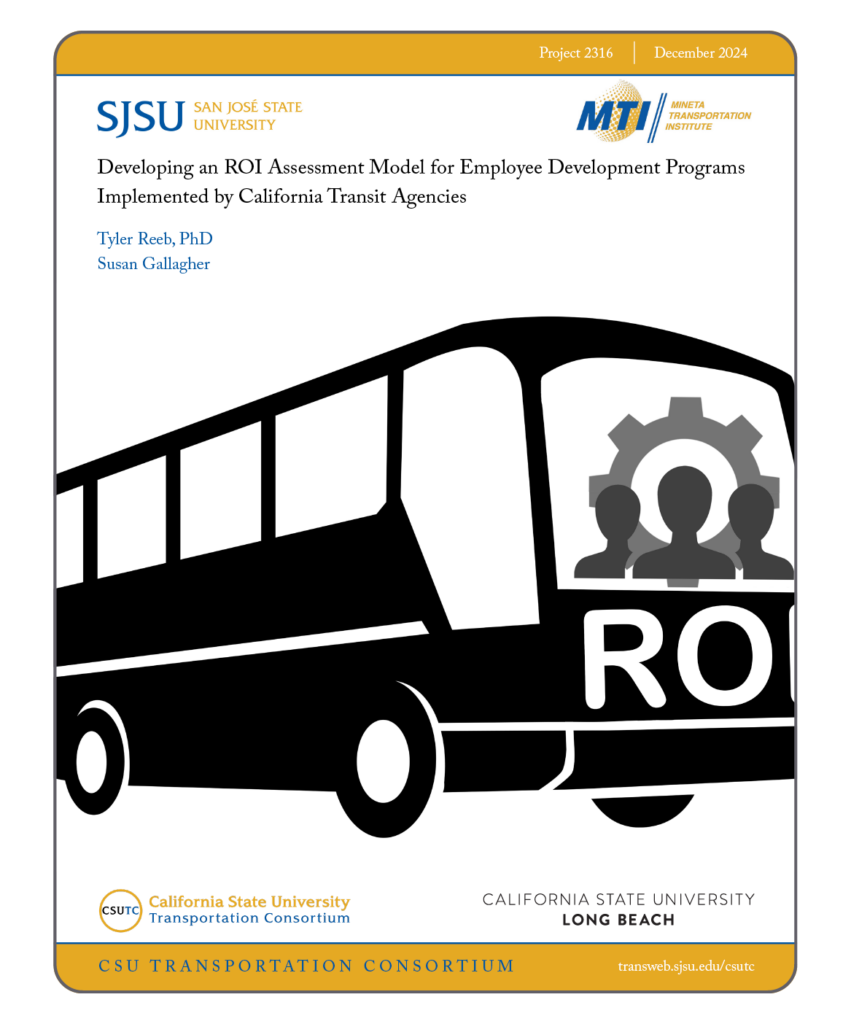
Developing an ROI Assessment Model for Employee Development Programs Implemented by California Transit Agencies
Mineta Transportation Institute (MTI)
December 2024
Transit agencies will necessarily incur expenses in efforts to improve the recruitment, retention, and morale of employees, but will struggle to solicit adequate funding unless they are able to demonstrate the value of such efforts to a broader audience. Thus, developing and implementing ROI assessments is critical. The literature review, survey, and follow-up interviews conducted by the MTI research team found that program outcome measures and programmatic expense data required for ROI is similar across employee development programs but is not currently being uniformly collected across agencies. The research findings demonstrate the need for technical assistance to combat data collection challenges such as staff capacity and know-how.
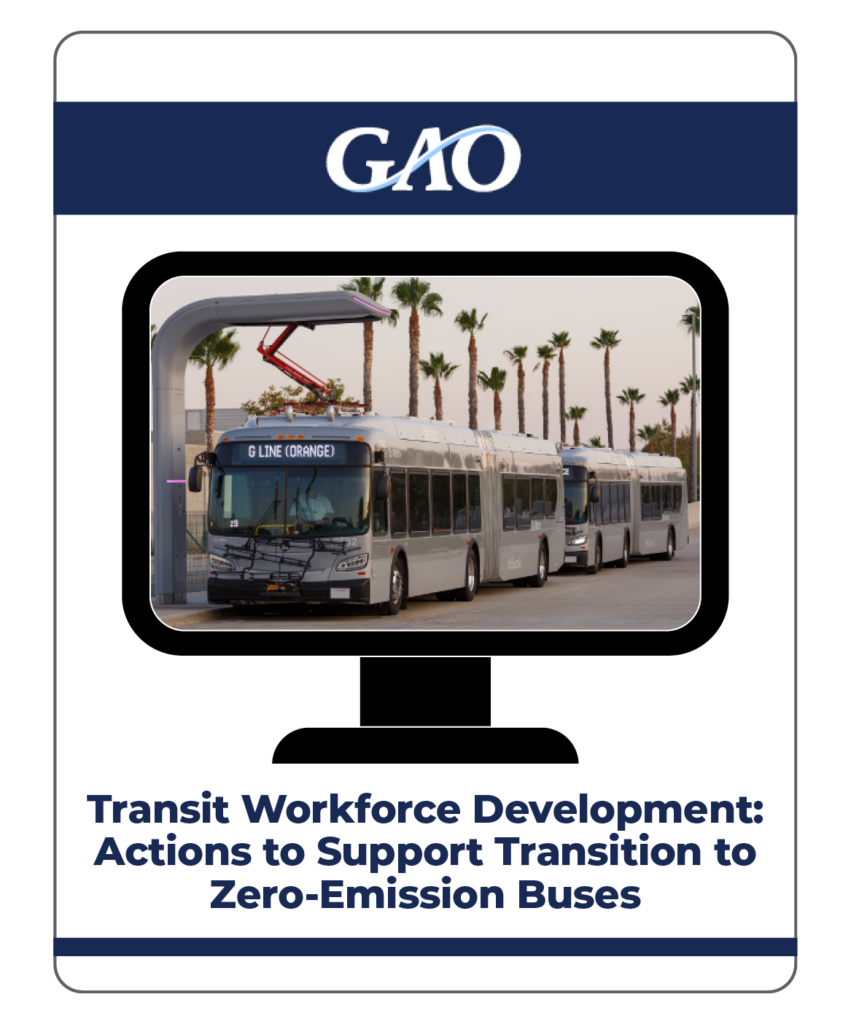
Transit Workforce Development: Actions to Support Transition to Low-No Buses
U.S. Government Accountability Office
December 2024
After data analysis and expert interviews, GAO published this report which describes: (1) the status of transit agencies’ transition to zero-emission bus fleets and any challenges they may face meeting transition goals; (2) skill- and workforce-development needs of transit agencies and actions selected agencies are taking to address any workforce gaps; and (3) recommended FTA actions to assist transit agencies in preparing their workforces for zero-emission buses.
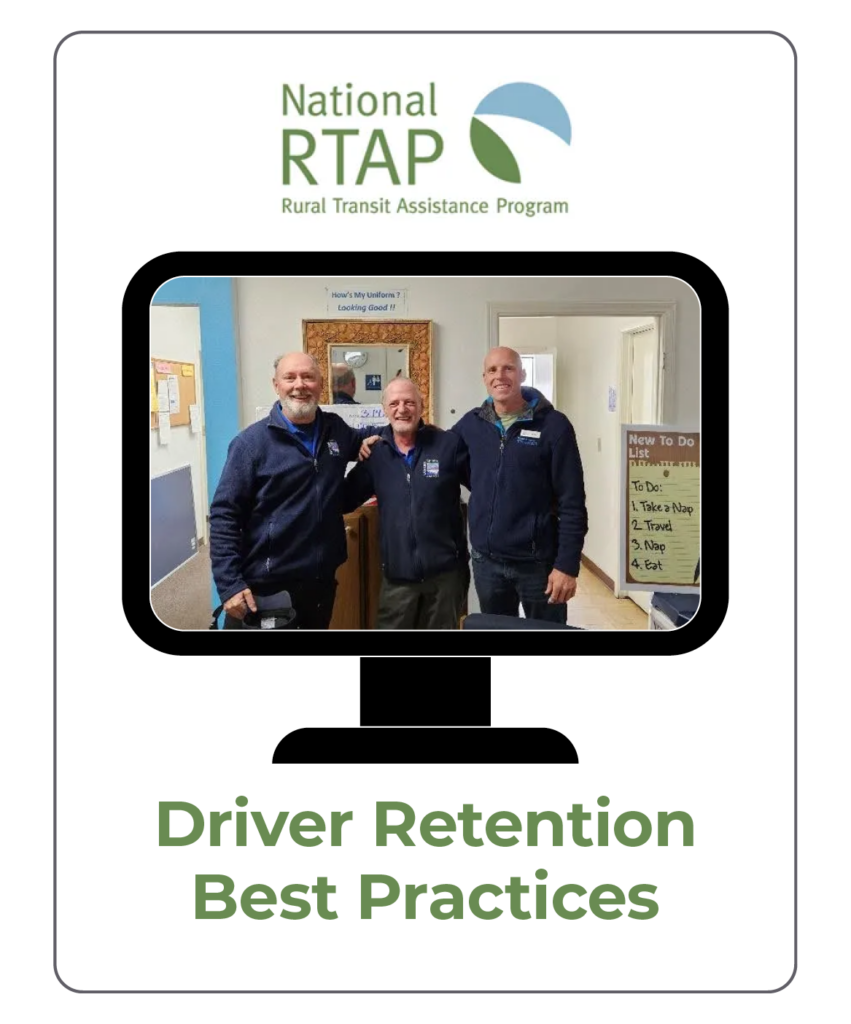
Driver Retention Best Practices
National RTAP
December 2024
TOPICS: Hiring and Recruitment , Retention , Workforce Shortage
It is increasingly difficult to recruit and retain rural and tribal transit drivers. This National RTAP Best Practices Spotlight Article provides practical and easy-to-implement strategies from transit leaders that agencies can use to create a workplace that drivers will want to remain in and thrive in. This article includes advice from Eastern Sierra Transit Authority (ESTA), Redding Area Bus Authority (RABA), Heart of Iowa Regional Transit Agency (HIRTA), and Big Woods Transit (BWT).
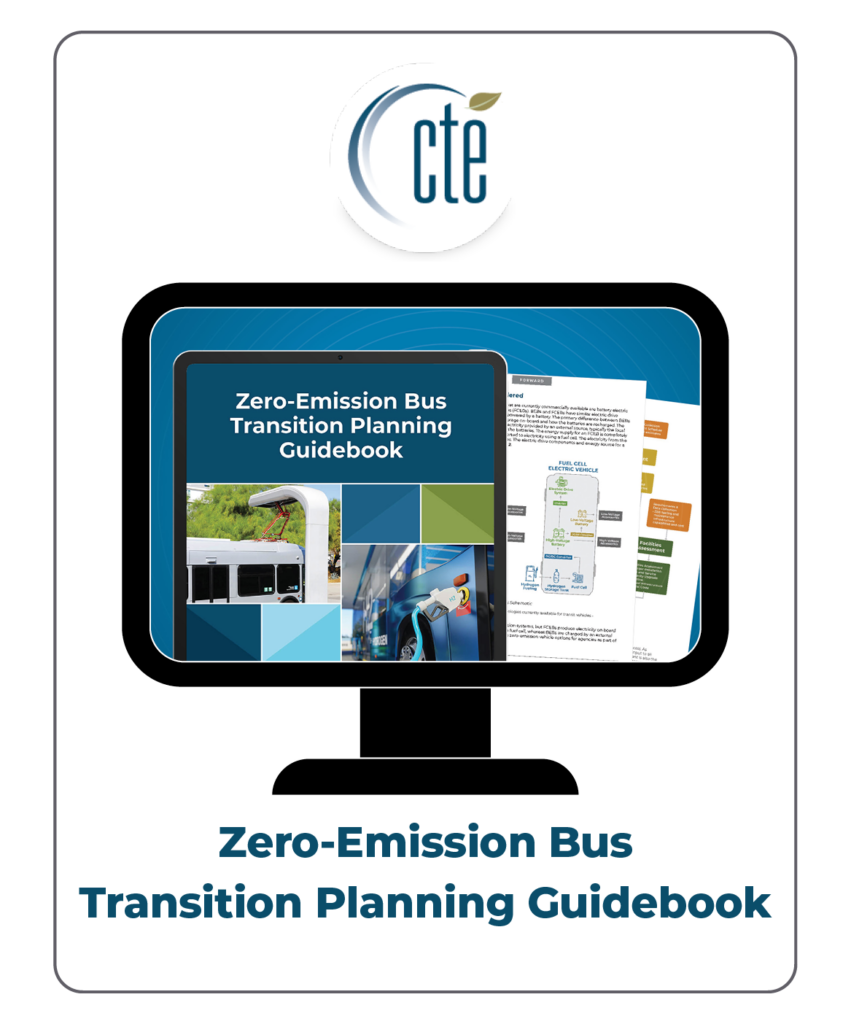
Low-No Bus Transition Planning Guidebook
The Center for Transportation and the Environment
November 2024
TOPICS: Low-No , Policy and Planning , Procurement
Transitioning to a ZEB fleet requires thorough planning and consideration of the elements that are unique to ZEBs, such as range limitations, higher vehicle costs, charging and/or hydrogen infrastructure, and operator and maintenance workforce development. Failing to plan around these issues may result in added costs for bus and infrastructure purchases, project delays, service concerns, and operational challenges as low-no become a larger and larger portion of the fleet.
A properly developed Low-No Transition Plan can help overcome these challenges. This Guidebook is intended to give public transit fleet operators the knowledge necessary to plan for a full fleet transition to low-no technologies.
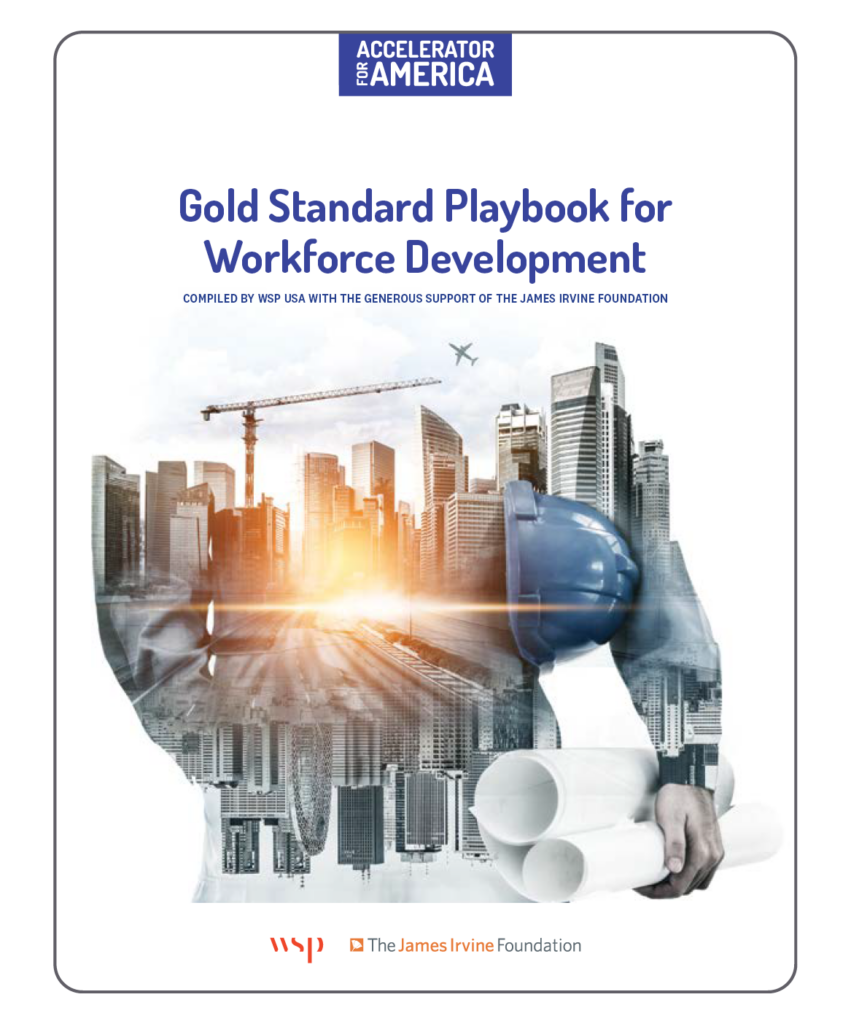
Gold Standard Playbook for Workforce Development
Accelerator for America
August 2024
This Workforce Development Playbook – a menu of malleable strategies and tactics that can be applied in different situational contexts – is meant to serve two purposes:
- To document best practices in workforce development focusing on California but with applicability nationally and sources.
- To set the first “Gold Standard” guiding owners who want to incorporate workforce development goals into their infrastructure projects.
To develop the Playbook, WSP and Accelerator for America (AFA) supported by The James Irvine Foundation, gathered information on current standards, practices, and barriers to workforce development efforts through interviews with key stakeholders across the industry in California, including project owners, community benefit organizations (CBOs), and government leaders.
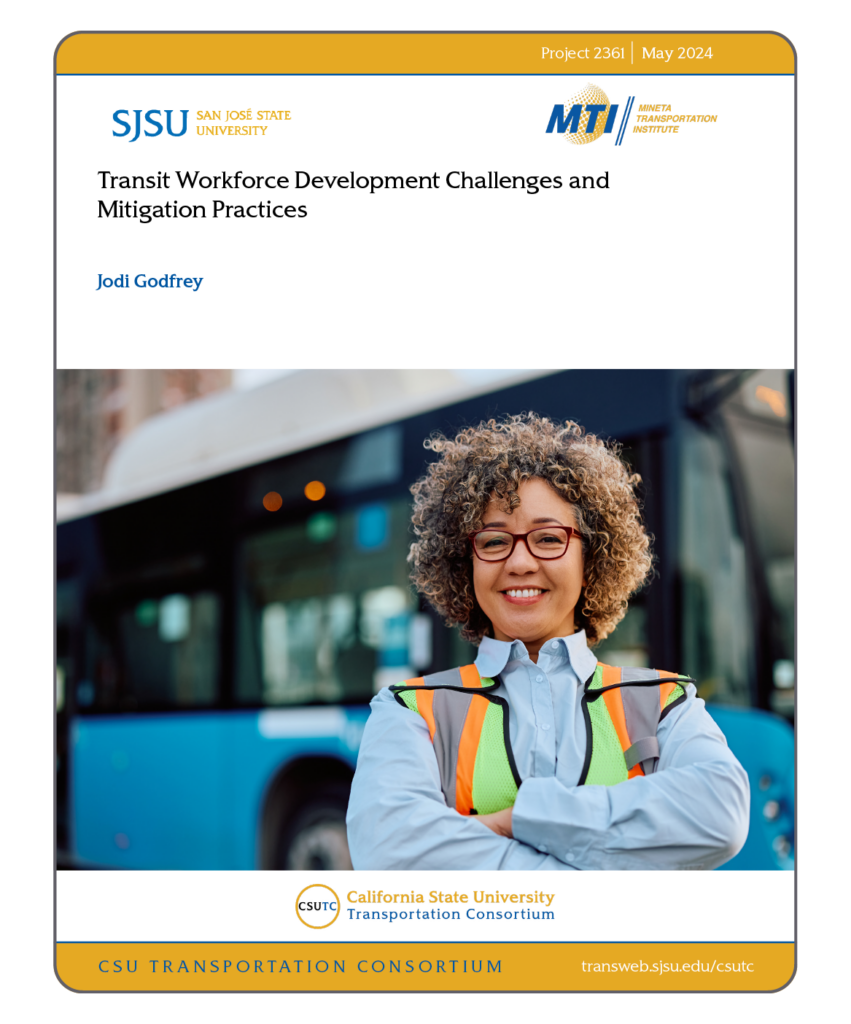
Transit Workforce Development Challenges and Mitigation Practices
San Jose State University
August 2024
TOPICS: Hiring and Recruitment , Retention , Workforce Shortage
The goal of this research is to provide transit industry executives and transportation professionals with awareness of the many tools that are available to help attract more qualified candidates to the transit industry, as well as ways to advance the development
of the transit workforce. This research highlights social media recruiting; online hiring platform improvements; and partnerships with career centers, universities, and recruitment centers to attract new employees to the transit workforce. In addition, increases in pay, benefits, bonuses, providing flexible schedule options, and some other atypical ideas have successfully been used to retain workers in the transit workforce. This research focuses on ways in which all transit stakeholders can invest in all aspects of industry workforce development to ensure qualified employees choose the transit industry and that they are subsequently trained to be the most beneficial assets to the organization and remain there via effective retention strategies.
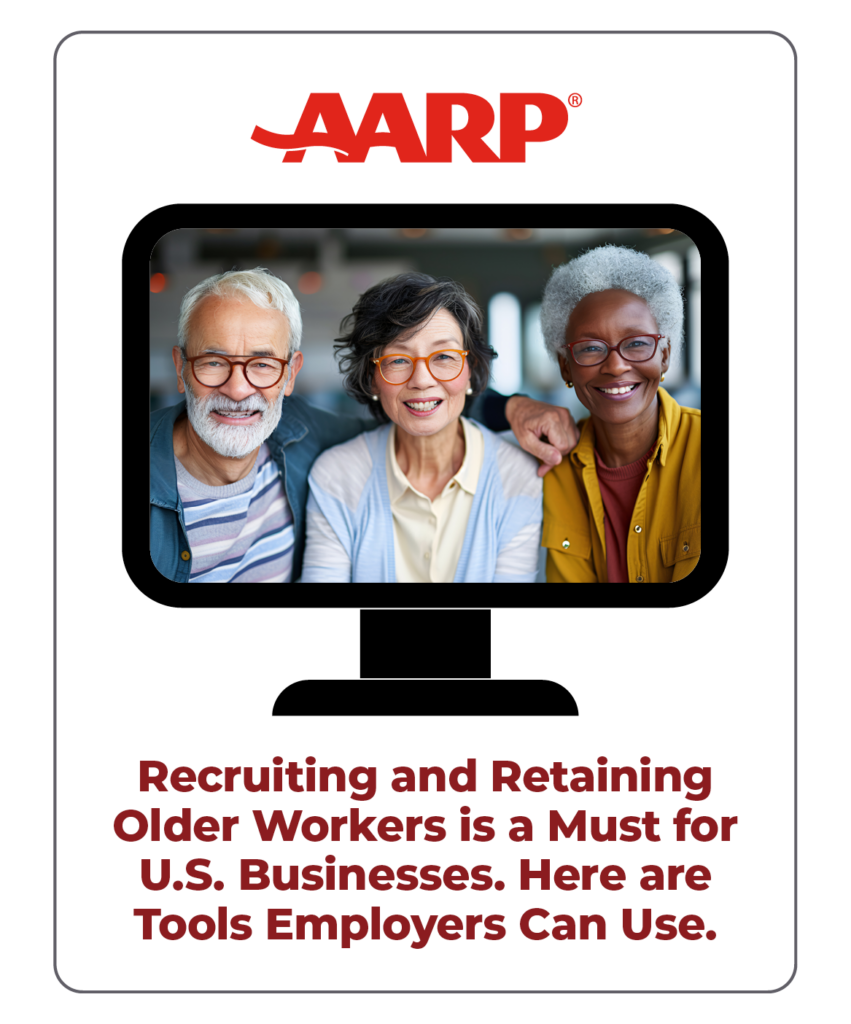
Recruiting and Retaining Older Workers is a Must for U.S. Businesses. Here are Tools Employers Can Use.
AARP
July 2024
Shifting demographics in the U.S. workforce indicate that businesses are probably going to need to recruit, train, and retain older workers to ensure their companies remain competitive. However, workplace surveys indicate that most firms are currently not prepared to find and welcome workers who are 50 years of age or older.
Fortunately, a broad array of evidence-based hiring and talent development strategies are at the ready for U.S. employers. These strategies draw from a recent and comprehensive review of employer practices and their influence on economic security and mobility for U.S. workers.
Three key connected takeaways for employers to consider as they plan for ways to leverage this segment of the workforce are as follows:
• Engage directly with older employees in developing their digital skills.
• Seek out the social networks in which older workers operate to find the best recruiting matches.
• Lean into current or former employees and their online connections to identify these social networks.
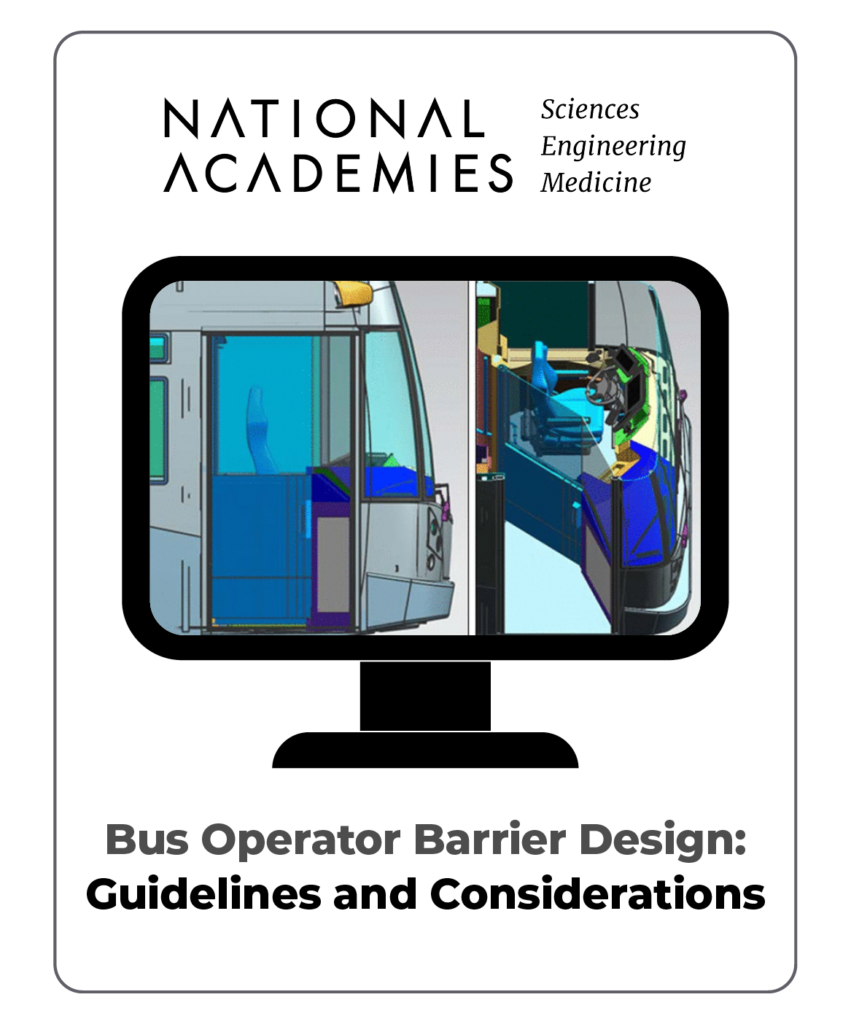
Bus Operator Barrier Design: Guidelines and Considerations
Transit Cooperative Research Program
July 2024
TOPICS: Policy and Planning , Procurement , Safety and Health
The importance of security barriers for transit bus operators became even clearer after the fatal attack on a Tampa, Florida, bus operator in 2019. The need for security barriers was reinforced by a serious attack on another operator for that same system later that year. While these are two extreme examples, they are likely not unique, as many assaults against transit workers have been underreported in the past. Another important but more pernicious risk to bus operator health is viral and bacterial infection.
TCRP Research Report 249: Bus Operator Barrier Design: Guidelines and Considerations, a pre-publication draft from TRB’s Transit Cooperative Research Program, provides information and guidance for North American public transportation agencies, standards committees, and government and non-government policymaking organizations on designing, procuring, and installing bus operator barriers to prioritize the health and safety of essential operators and the public they serve.
Contributor(s): National Academies of Sciences, Engineering, and Medicine; STYL&TECH; International Transportation Learning Center; Transportation Research Board; Transit Cooperative Research Program; Andrew Krum; Scott Tidwell; Joshua Skole; Erin Mabry; Aditi Manke; Tarah Crowder; Christy Campoll
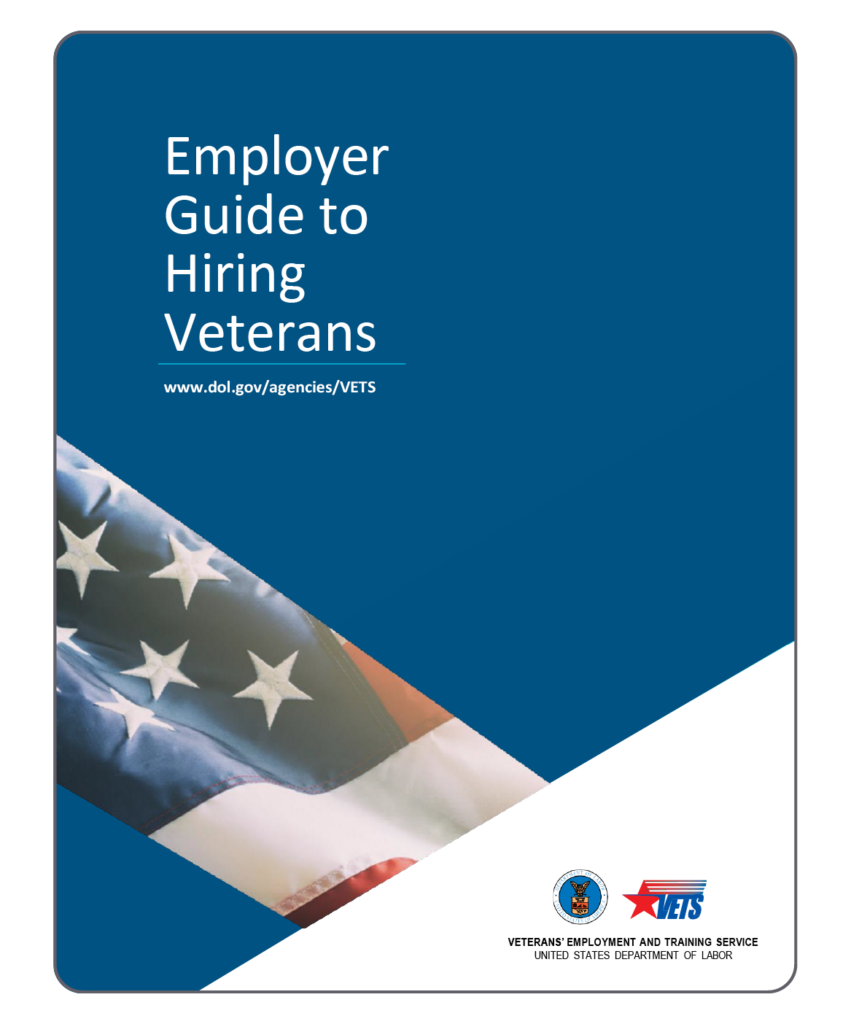
Employer Guide to Hiring Veterans
Employers recognize the value veterans bring to the workplace but often find it challenging to connect with separating service members and veterans seeking employment. Veterans are in high demand, so it requires dedicated efforts by employers to find and hire veterans.
This guide intends to:
• Provide accurate information about service member and veteran demographics.
• Share federal, state, and other resources with employers to facilitate veteran employment; and
• Make recommendations on how to attract, train, and retain veterans.
United States Department of Labor
TOPICS: Community Engagement , Hiring and Recruitment , Retention
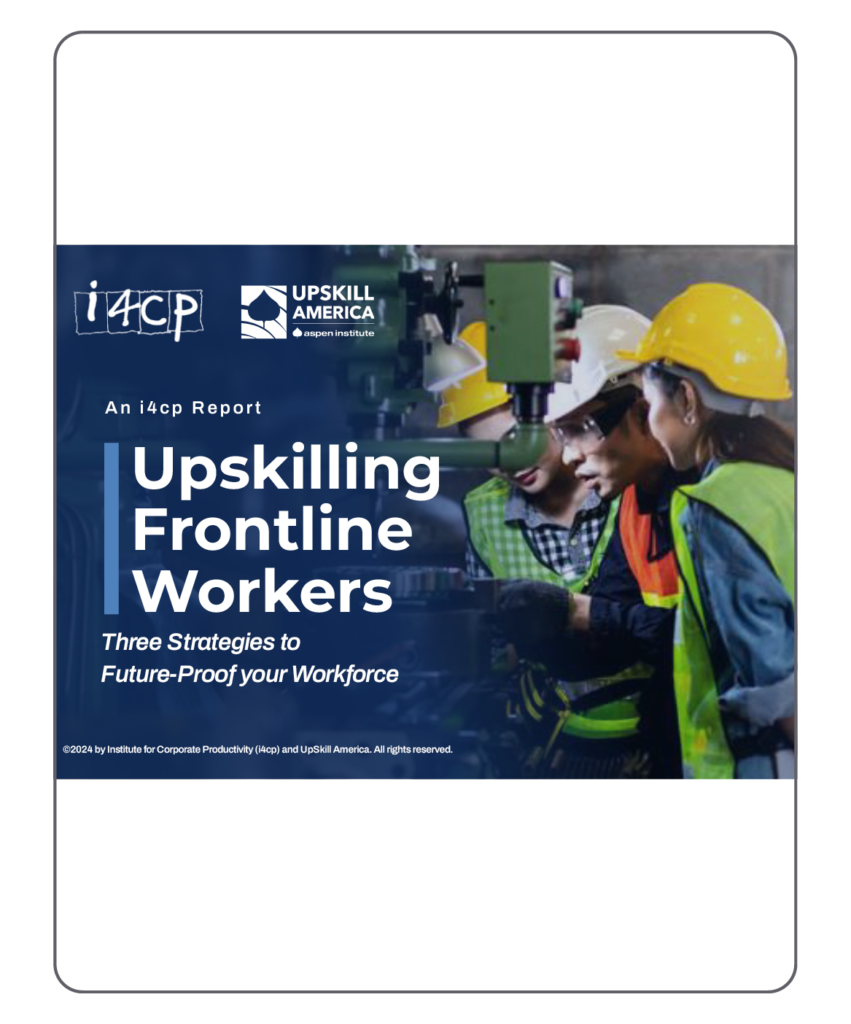
Upskilling Frontline Workers: Three Strategies to Future-Proof your Workforce
UpSkill America & Institute for Corporate Productivity (i4cp)
TOPICS: Apprenticeship , Career Pathways , Trainer and Mentor Development , Training
The rapid advancement and proliferation of technology increases the need for accelerated and continuous workforce development. Prioritizing the upskilling of frontline workers requires a variety of educational programs, and there is no single answer to the upskilling challenge. Still, UpSkill America and the Institute for Corporate Productivity (i4cp) created this report of best practices that can help any organization become more productive and resilient via a skilled workforce.
Read the brief to learn more about next practices in upskilling, including internal training, apprenticeship, and tuition assistance that will help any organization to be more productive and resilient for the future.
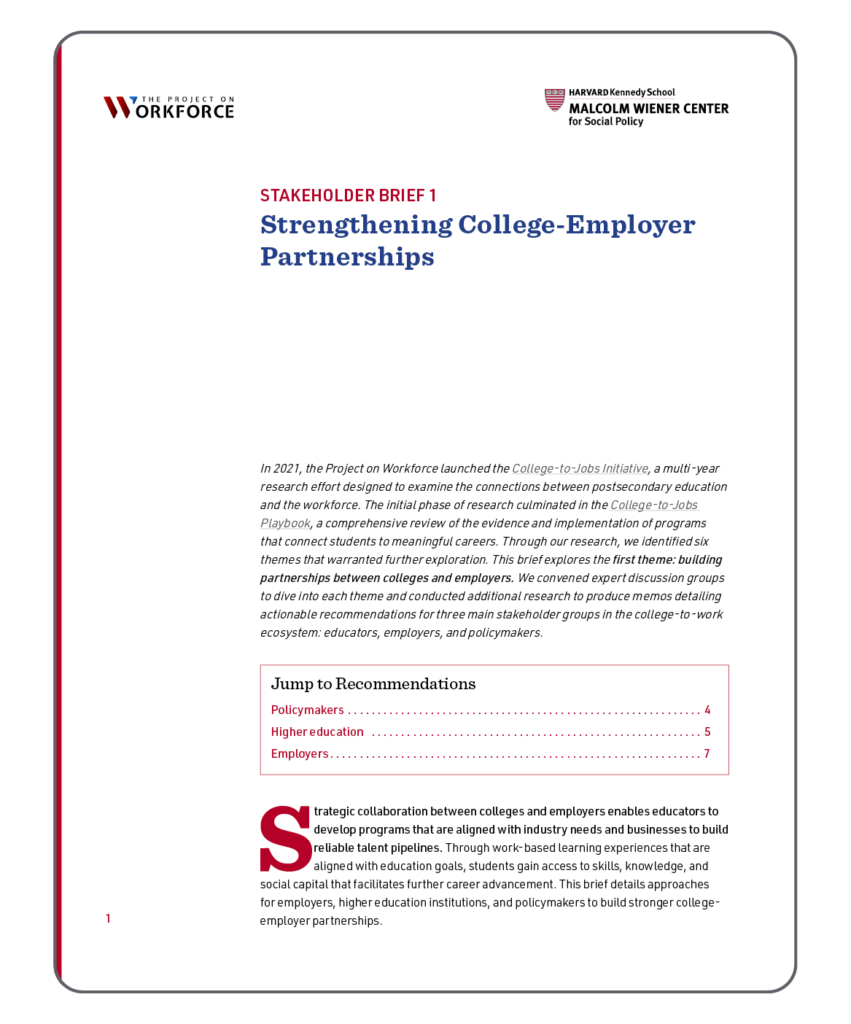
College-to-Jobs Initiative: Policy and Practice Series
The Project on Workforce
The Project on Workforce released new recommendations for educators, employers, and policymakers on how to improve college-to-jobs connections. With these webinars and stakeholder briefs, they aim to increase attention and investment in college-to-career transitions and show how colleges can better deliver on economic prosperity.
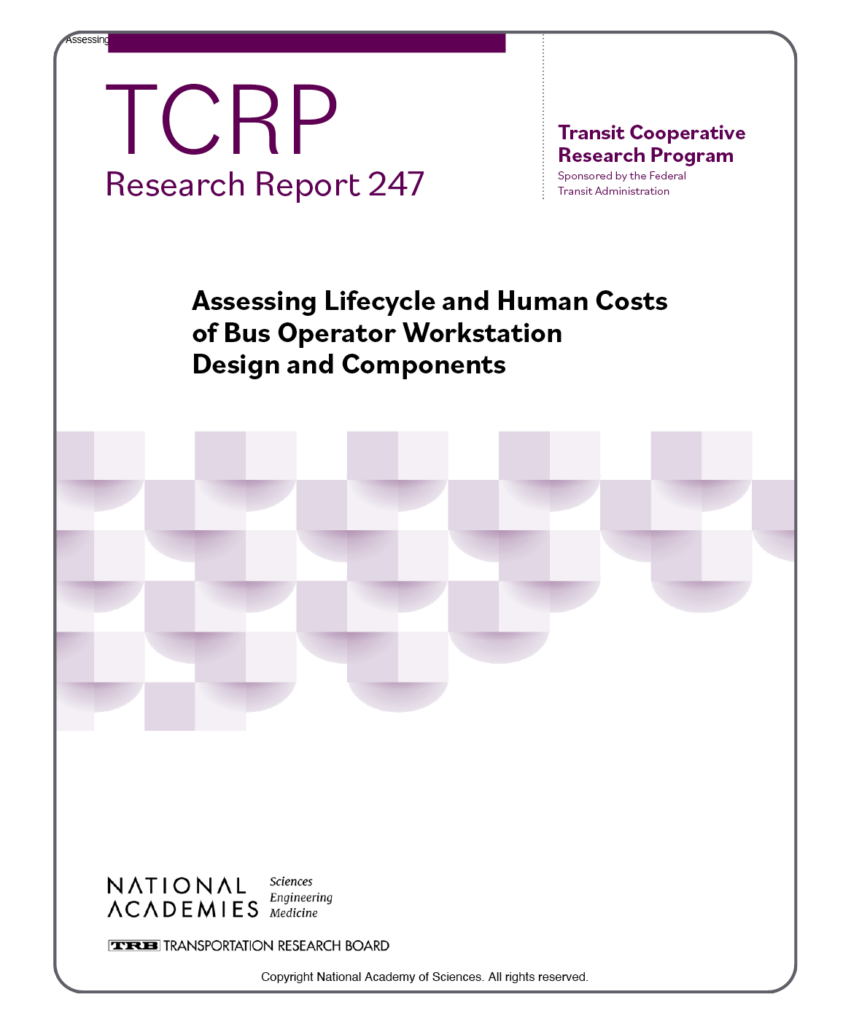
Assessing Lifecycle and Human Costs of Bus Operator Workstation Design and Components
Transit Cooperative Research Board
June 2024
TOPICS: Policy and Planning , Retention , Safety and Health
Driving trucks and buses is a physically demanding occupation that carries one of the highest injury rates of major occupational categories in the United States. Drivers often work in postures that increase risk of low back pain and other musculoskeletal disorders, slow their response time, and put them at increased risk for acute injuries due to crashes.
TCRP Research Report 247: Assessing Lifecycle and Human Costs of Bus Operator Workstation Design and Components, from TRB’s Transit Cooperative Research Program, creates an easy-to-use toolkit for predicting the long-term safety of and promoting a healthy environment in bus operator workstations.
Contributor(s): National Academies of Sciences, Engineering, and Medicine; Transportation Research Board; Transit Cooperative Research Program; Songlin Wu; Eunsik Kim; Andris Freivalds; Yiqi Zhang; Matthew Parkinson
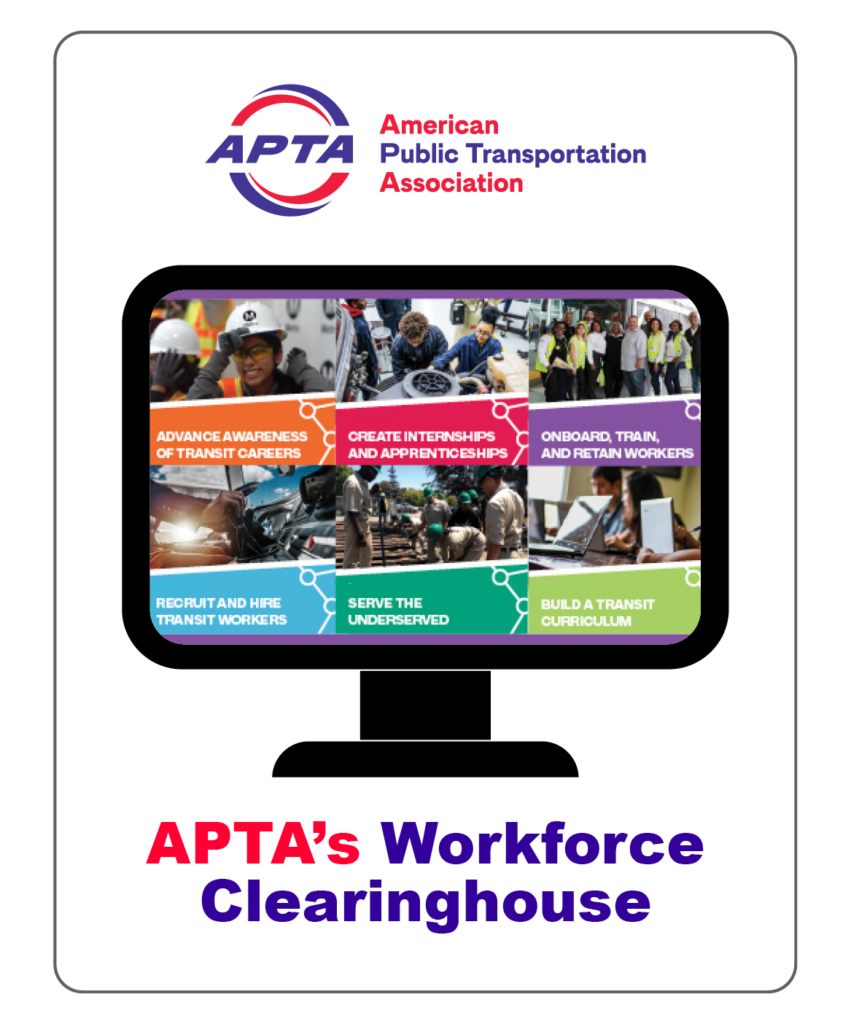
APTA’s Workforce Clearinghouse
APTA’s Workforce Clearinghouse connects users with convenient access to industry materials, stories, and recommended practices. Use the search bar or choose a categorical grouping to find resources from APTA’s six ‘Workforce Mini Guides’ as well as selected examples from the initial workforce volume – APTA’s Transit Workforce Readiness Guide.
American Public Transportation Association (APTA)
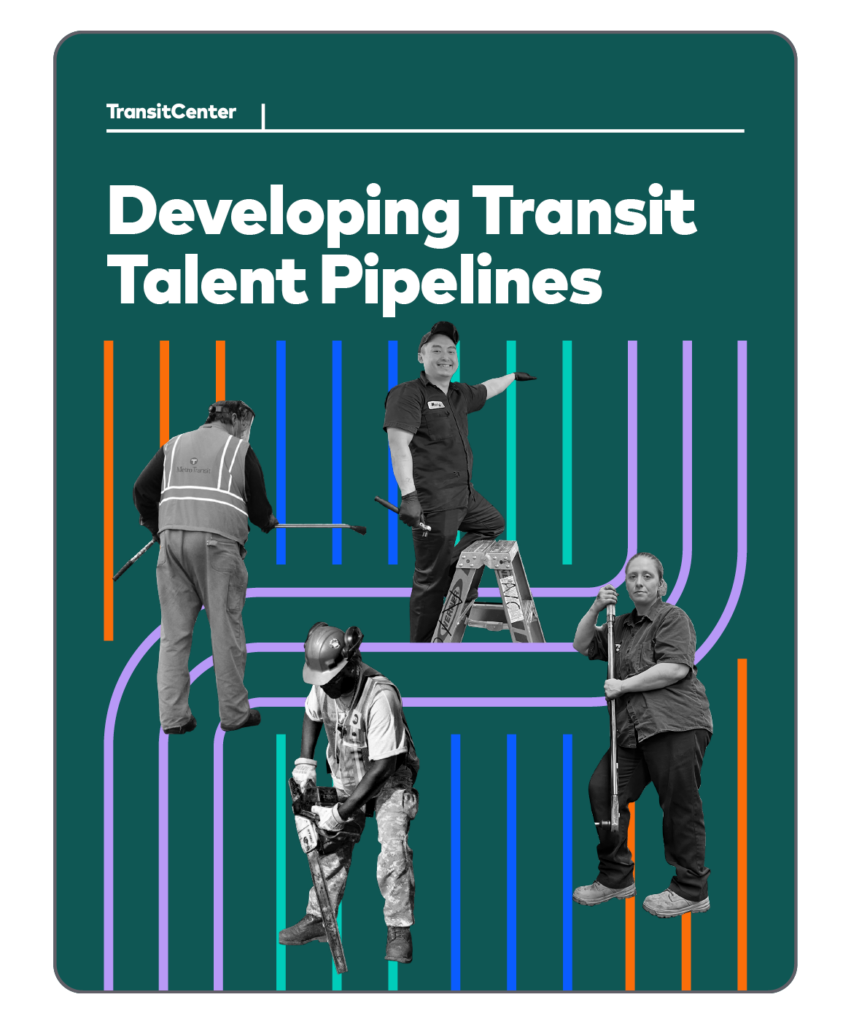
Developing Transit Talent Pipelines
TransitCenter’s report explores the workforce challenges of transit bus mechanics and maintenance workers, which are essential for transitioning to low-no buses and restoring pre-pandemic service. Agencies are struggling to maintain a steady pipeline for these positions due to retirements, attrition, and a changing labor market. The report determines that agencies should engage more actively with potential workers and encourage them to join the transit workforce, as well as finding new ways to prepare new workers and retrain current workers to meet current and future needs, particularly as technology for low-no buses continues to change and grow more widespread. The report recommends greater investment from transit agencies, state and federal government, and philanthropy to support transit jobs.
TransitCenter
May 2024
TOPICS: Hiring and Recruitment , Low-No , Policy and Planning , Retention , Workforce Shortage
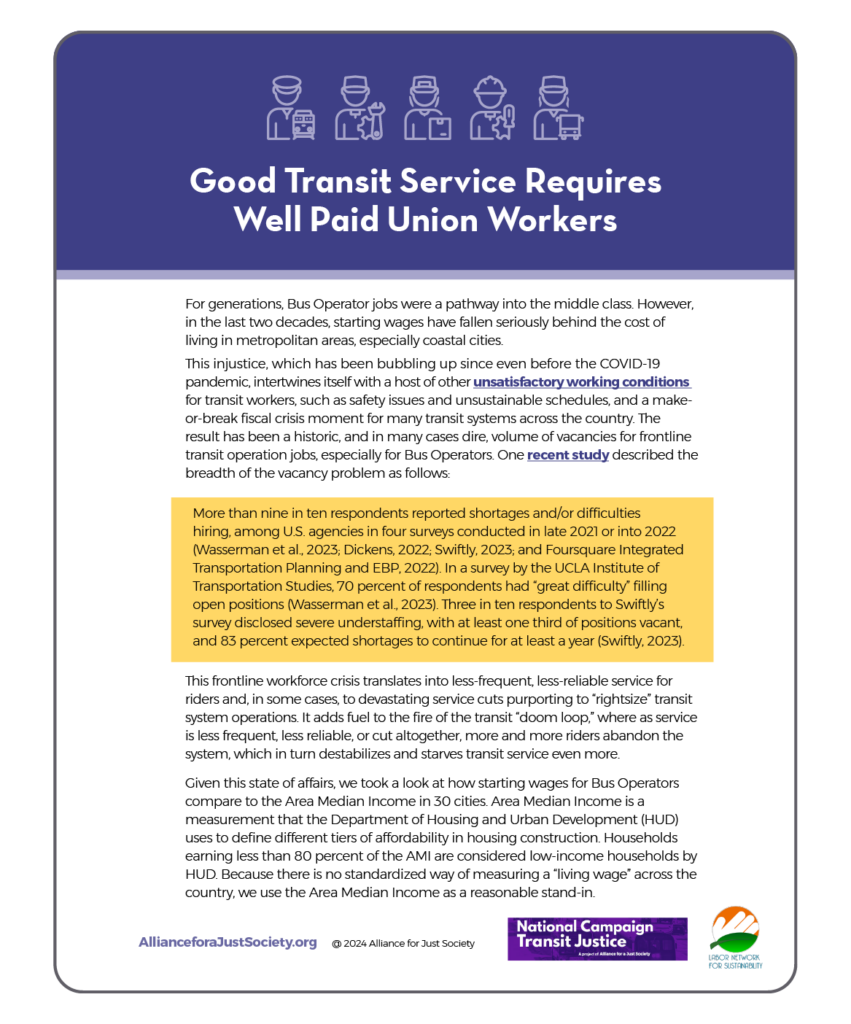
Good Transit Requires Well Paid Union Workers
This report presents bus operator wages as compared with Area Median Income in 30 cities across the U.S., pointing out that in the last two decades, starting wages for our nation’s bus operators have fallen seriously behind the cost of living. In the face of a workforce shortage, the report makes the case for decision makers to ensure higher wages for frontline transit workers.
The National Campaign for Transit Justice
March 2024
TOPICS: Hiring and Recruitment , Policy and Planning , Retention , Workforce Shortage
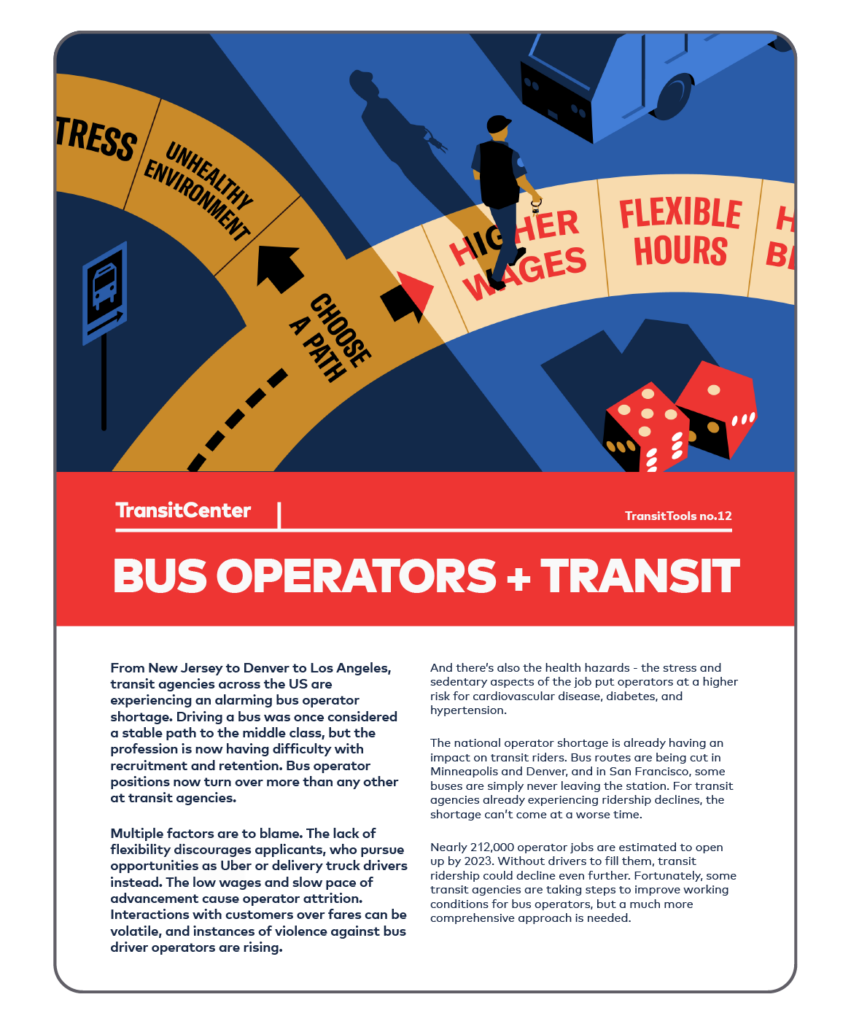
3 Ways to Make Bus Driving a Better Job
This report highlights ways that bus driving can be improved for workers to help increase retention and recruitment. The report explains three specific ways: redesigning the job for health and success, raising pay and creating opportunities for advancement, and making a more flexible schedule.
The National Campaign for Transit Justice
March 2024
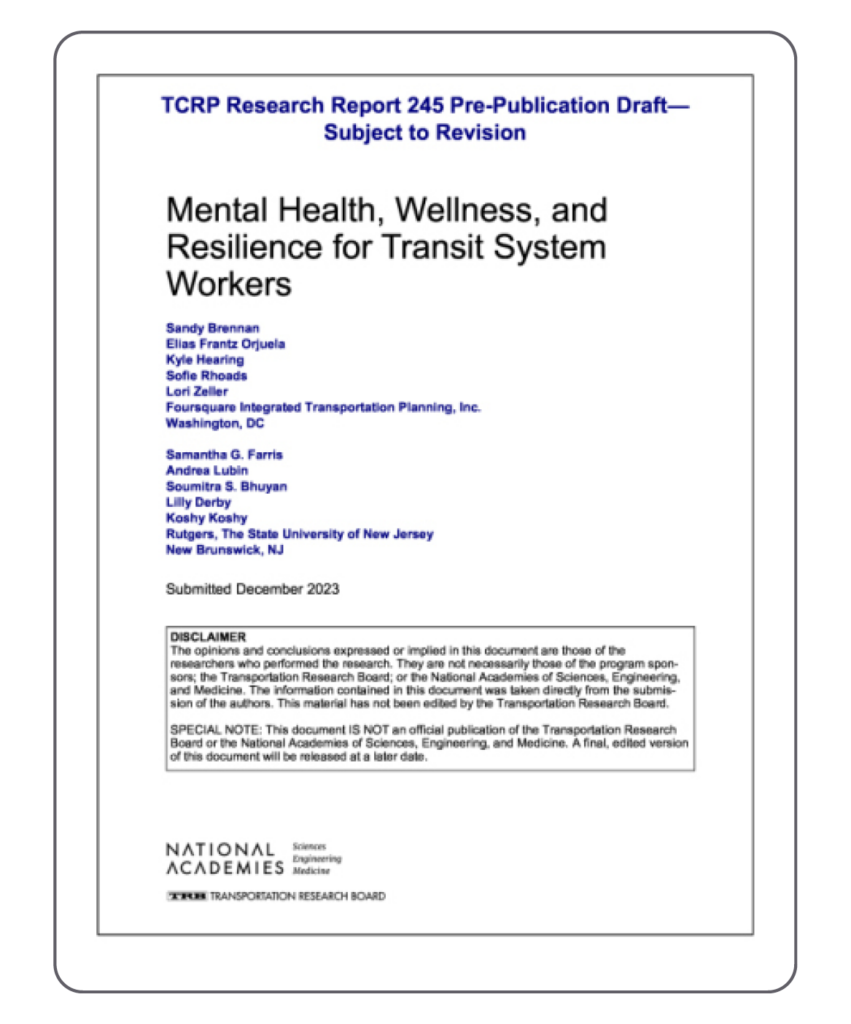
Mental Health, Wellness, and Resilience for Transit System Workers
TCRP Research Report 245: Mental Health, Wellness, and Resilience for Transit System Workers provides a detailed summary of common factors that influence the mental health, well-being, and resiliency of frontline transit workers and includes a range of solutions that transit agencies can implement to address them. Findings were determined using a mix of research methods, including multiple interviews and focus groups with frontline employees, transit agency management, and union leadership at two different points in the project.
Transit Cooperative Research Program
February 2024
TOPICS: Policy and Planning , Safety and Health
Contributor(s): Sandy Brennan, Elias Frantz Orjuela, Kyle Hearing, Sofie Rhoads, Lori Zeller, Samantha G. Farris, Andrea Lubin, Soumitra S. Bhuyan, Lilly Derby, Koshy Koshy; Transit Cooperative Research Program; Transportation Research Board; National Academies of Sciences, Engineering, and Medicine
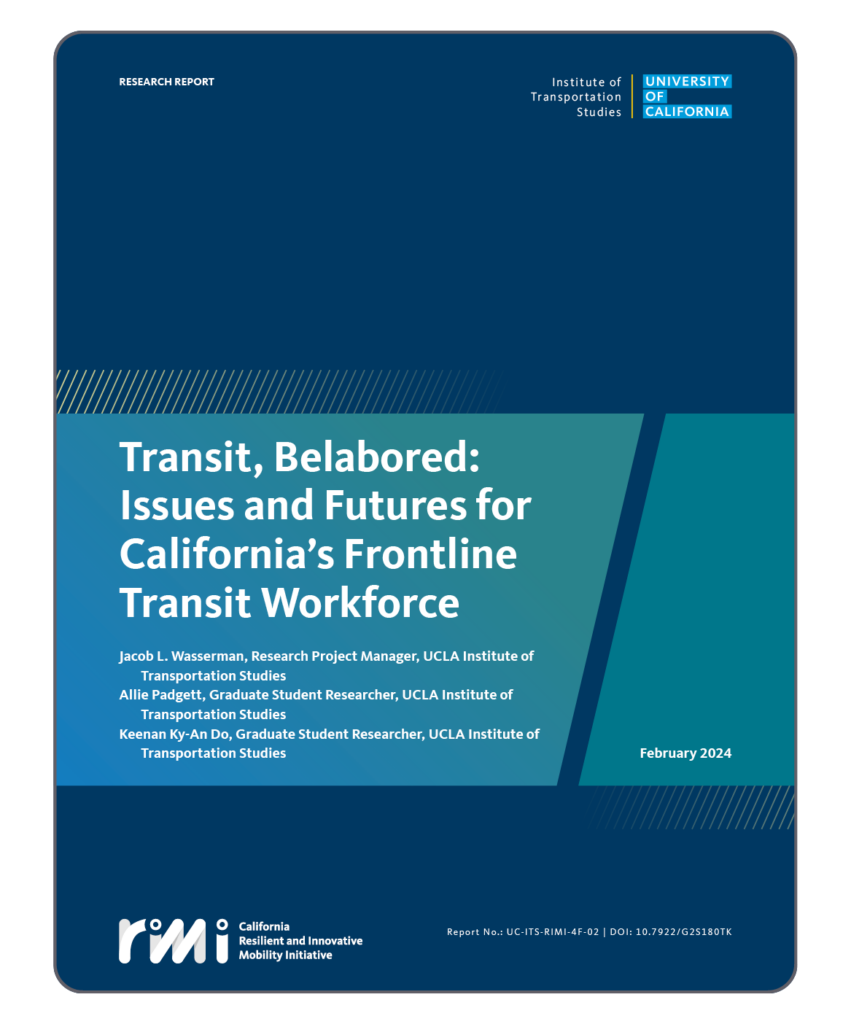
Transit, Belabored: Issues and Futures for California’s Frontline Transit Workforce
This report focuses on frontline transit workforce issues, including employee pay, issues before and after the COVID-19 pandemic, and the workforce shortage. The report is mainly about transit operators, but also touches on mechanics. It draws on quantitative and qualitative data, including wage data by agency and sector, contracts and agency documents, and interviews with union leaders, agency managers, and operators themselves.
Institute of Transportation Studies
February 2024
TOPICS: Hiring and Recruitment , Policy and Planning , Retention , Workforce Shortage
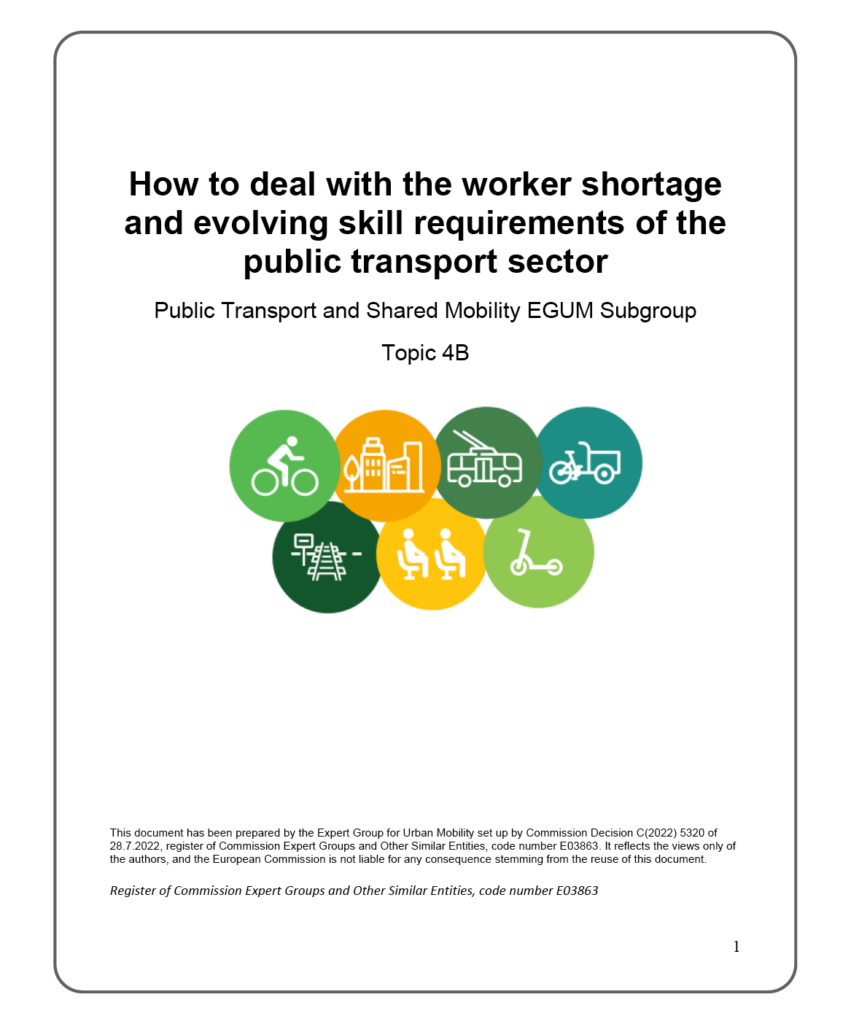
How to Deal with the Worker Shortage and Evolving Skill Requirements of the Public Transport Sector
This report provides a European counterpart to those produced within the United States on the transit workforce shortage. It gives an overview of the workforce shortage’s causes, as well as recommendations for addressing evolving skill requirements and more.
Expert Group on Urban Mobility, European Commission
February 2024
TOPICS: Community Engagement , Hiring and Recruitment , Training , Workforce Shortage
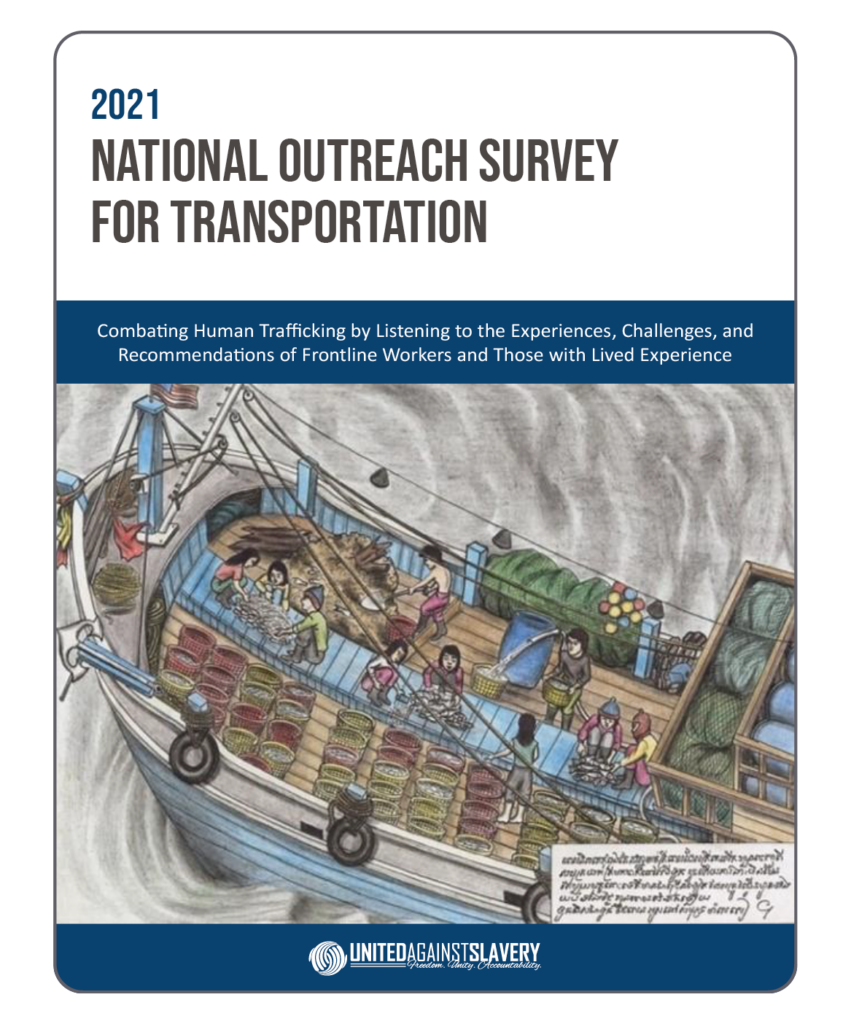
National Outreach Survey for Transportation (NOST)
This report explores the status of sex and labor trafficking in the transportation industry. It explains and highlights a survey of frontline data collected from across the transportation industry, as well as from sex and labor trafficking survivors and direct victim service providers. Data analysis includes information about the current knowledge base on sex trafficking among frontline transportation workers and suggestions for training.
United Against Slavery
January 2024
TOPICS: Policy and Planning , Safety and Health , Training
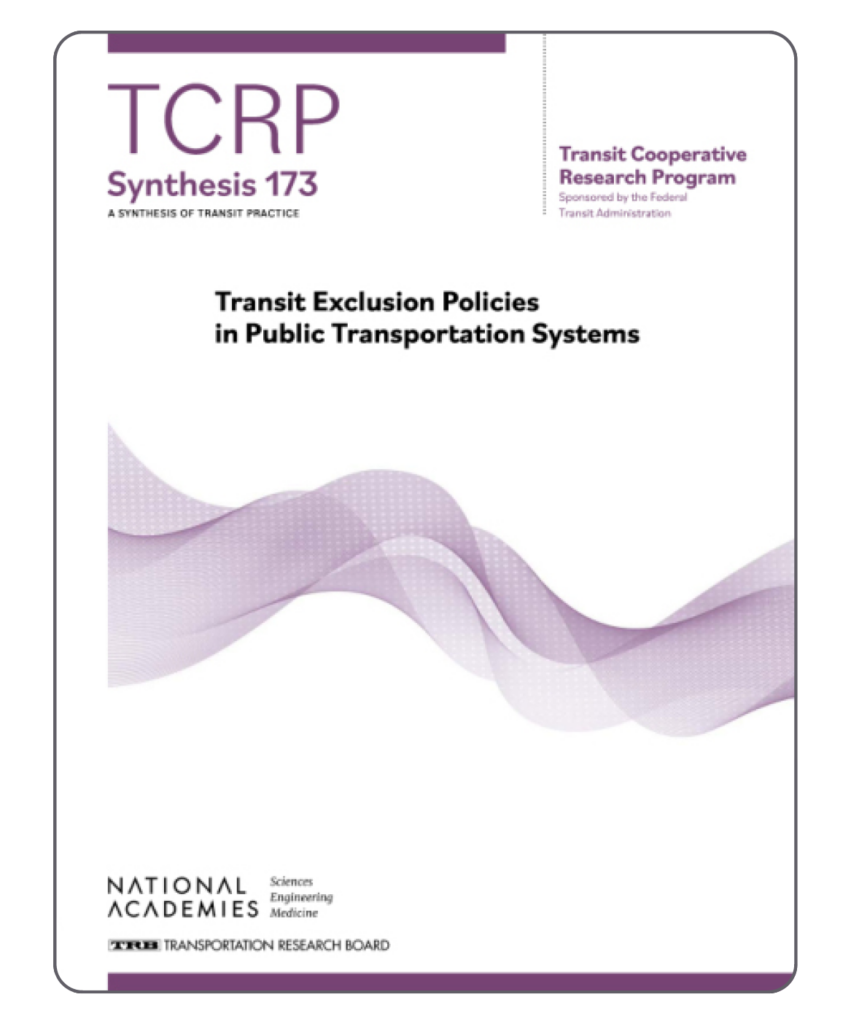
Transit Exclusion Policies in Public Transportation Systems
This report documents the practice of the use of transportation exclusion policies in North American transit systems. It is designed to help transit agencies in understanding the usefulness of such policies, as well as understanding the methods for creating, amending, or supplementing exclusion policies to maximize their effectiveness in reducing crime and disorder within their respective transit systems.
Transit Cooperative Research Program
January 2024
TOPICS: Policy and Planning , Safety and Health , Training
Contributor(s): National Academies of Sciences, Engineering, and Medicine; Transportation Research Board; Transit Cooperative Research Program; Patricia Bye; Deborah Matherly
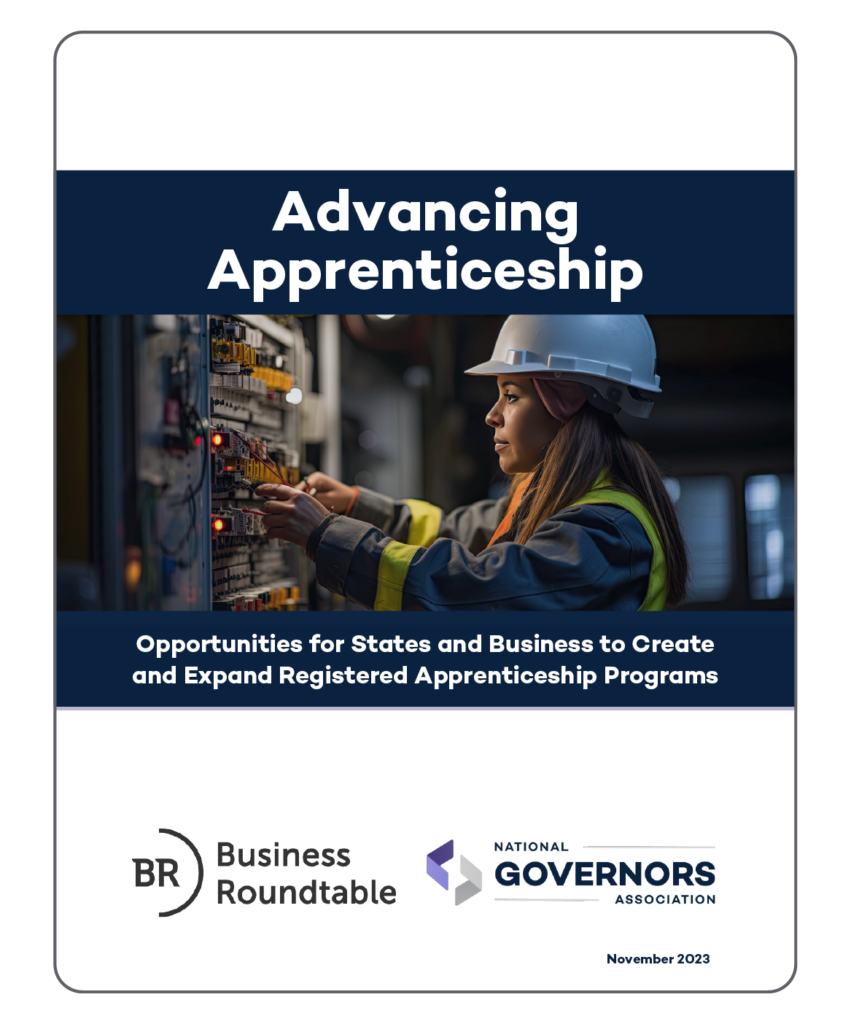
Advancing Apprenticeship: Opportunities For States And Business To Create And Expand Registered Apprenticeship Programs
This publication highlights the significance of Registered Apprenticeship Programs (RAPs) as one of several strategies and opportunities that employers and states can implement and offer to individuals as a viable path toward securing and prospering in a career. Registered Apprenticeship plays an important role in the U.S. economy and workforce ecosystem by satisfying employer talent needs while providing training and employment pathways for individuals in family-sustaining, in-demand careers. A registered apprenticeship is an intensive program that offers an individual paid on-the-job experience, coupled with classroom learning that together provides a jobseeker with the necessary skills to secure gainful employment.
National Governors Association
November 2023
TOPICS: Apprenticeship , Career Pathways , Policy and Planning
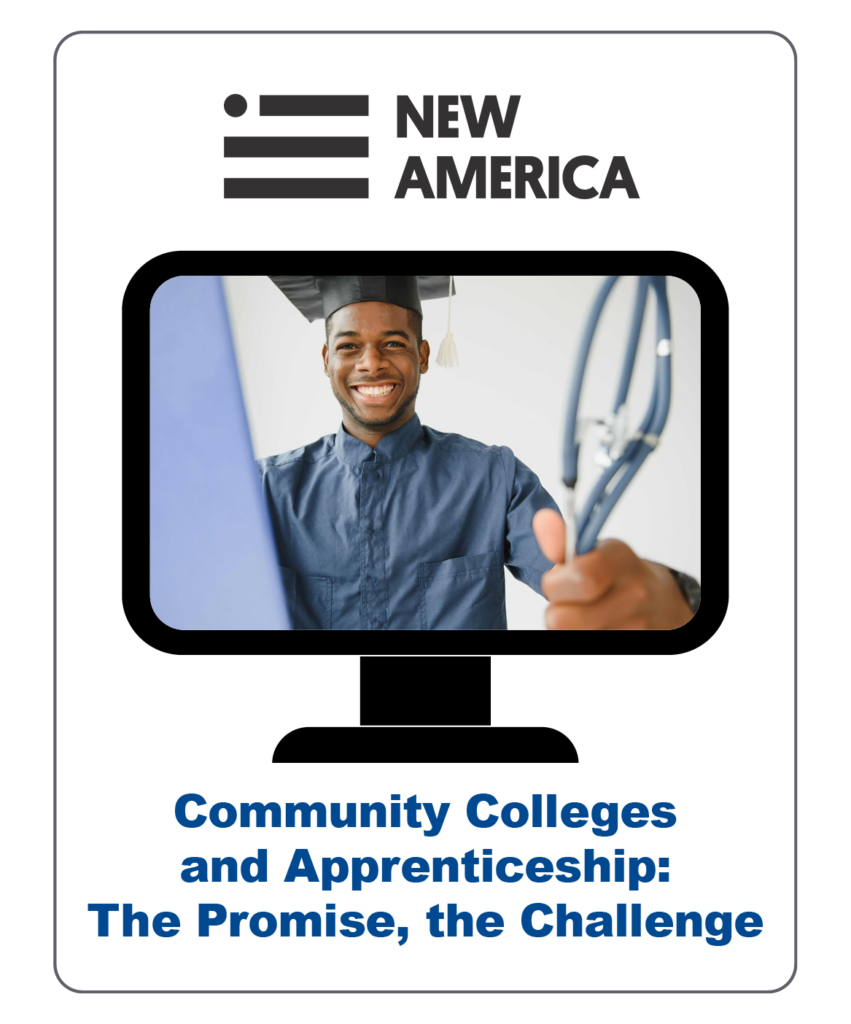
Community Colleges and Apprenticeship: The Promise, the Challenge
To better understand the challenges and opportunities facing community colleges that want to expand apprenticeship opportunities to their students, New America conducted a year-long study. They spoke to apprenticeship, workforce development, and community college leaders about the community colleges role in expanding apprenticeship.
New America Center on Education and Education Policy
November 2023
TOPICS: Apprenticeship , Career Pathways , Policy and Planning
Based on these conversations, we chose case studies and conducted in-depth interviews with leaders from the Community College System of New Hampshire’s ApprenticeshipNH, Arapahoe in Colorado, San Jacinto in Texas, and Howard Community College in Maryland’s programs in IT and cybersecurity, and Coastal Alabama Community College’s nursing apprenticeship.

Critical Conversations: The Public Transport Frontline Worker Crisis
Public transportation agencies across the country are facing challenges in attracting, recruiting, and retaining frontline employees. Critical Conversations provides insights from youth on transit’s frontline workforce crisis – bus and train operators, and entry-level mechanics. Researchers conducted a national survey targeting respondents under the age of 30, compiled agency-specific human resources information, and held focus groups asking participants to share their experiences and insights about challenges, lessons learned, and opportunities regarding the workforce crisis.
introducing youth to American infrastructure
November 2023
Contributors: Dr. Jamaal Schoby, Dr. Beverly Scott
The Barr Foundation provided support for the research element of this important youth empowerment and “people-readiness” initiative.
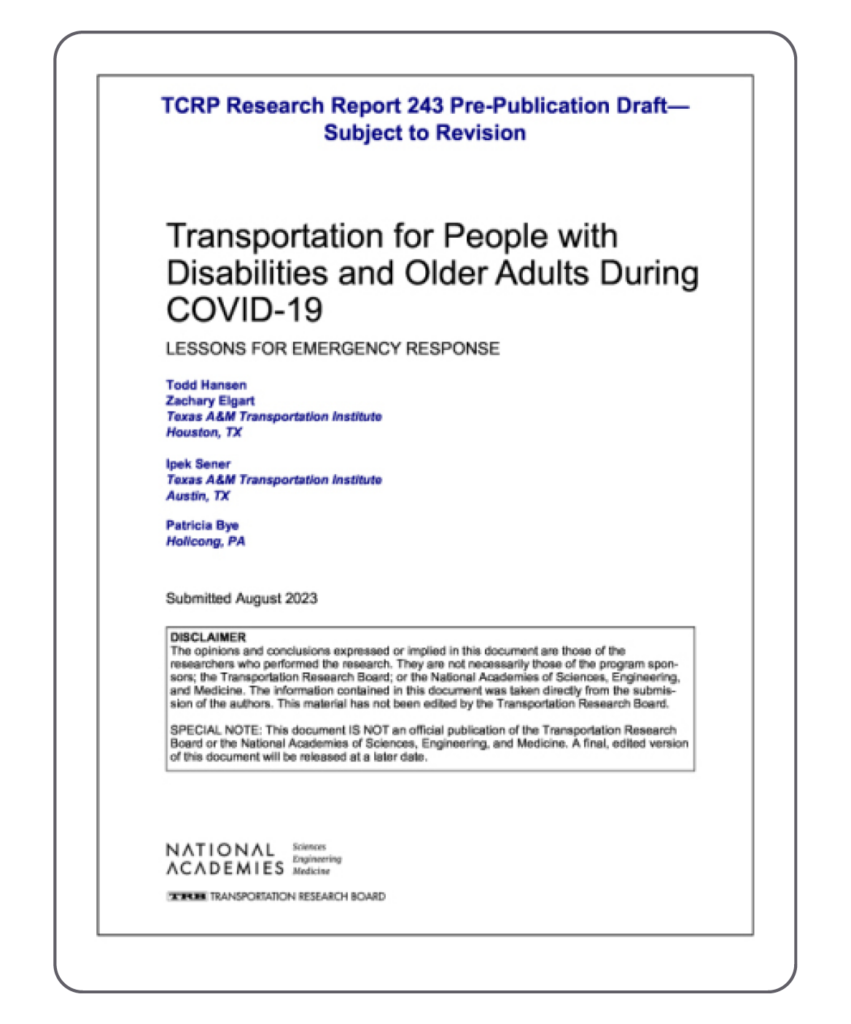
Transportation for People with Disabilities and Older Adults During COVID-19: Lessons for Emergency Response
This pre-publication report aims to provide transportation organizations (including transit agencies, specialized transportation providers, and other local government agencies and stakeholders) with helpful information and strategies on providing service for persons with disabilities and older adults in emergency situations.
Transportation Cooperative Research Program
October 2023
TOPICS: Community Engagement , Policy and Planning , Safety and Health
Contributor(s): National Academies of Sciences, Engineering, and Medicine; Transportation Research Board; Transit Cooperative Research Program; Todd Hansen; Zachary Elgart; Ipek Sener; Patricia Bye
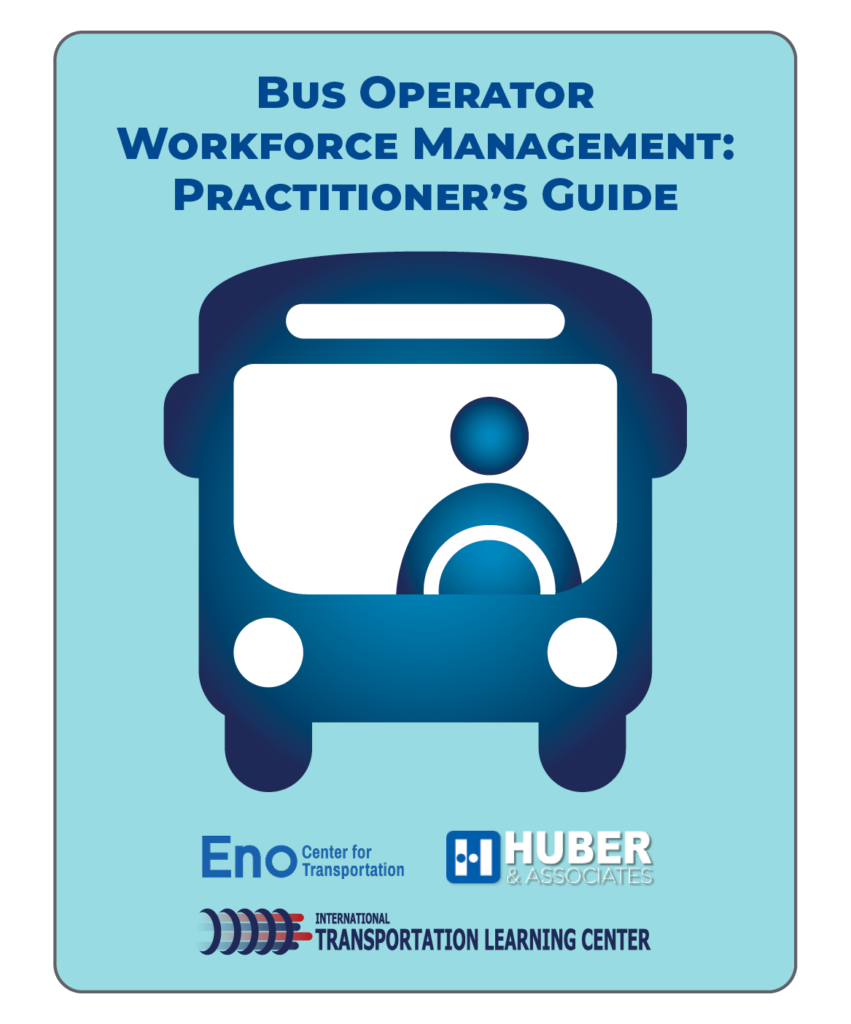
Bus Operator Workforce Management: Practitioner’s Guide
This report, produced by the Eno Center for Transportation, International Transportation Learning Center (ITLC), and Huber & Associates, is a practitioner’s guide that provides recommendations and resources enabling transit agencies to better assess, plan, and implement their operator workforce management programs. A link to a related TRB webinar is also included.
Transit Cooperative Research Program
August 2023
Contributor(s): National Academies of Sciences, Engineering, and Medicine; Transportation Research Board; Transit Cooperative Research Program; Robert Puentes; Philip Plotch; Brianne Eby; Paul Lewis; Karitsa Holdzkom; Xinge Wang; Douglas Nevins; Kenyon Corbett; Melissa Huber
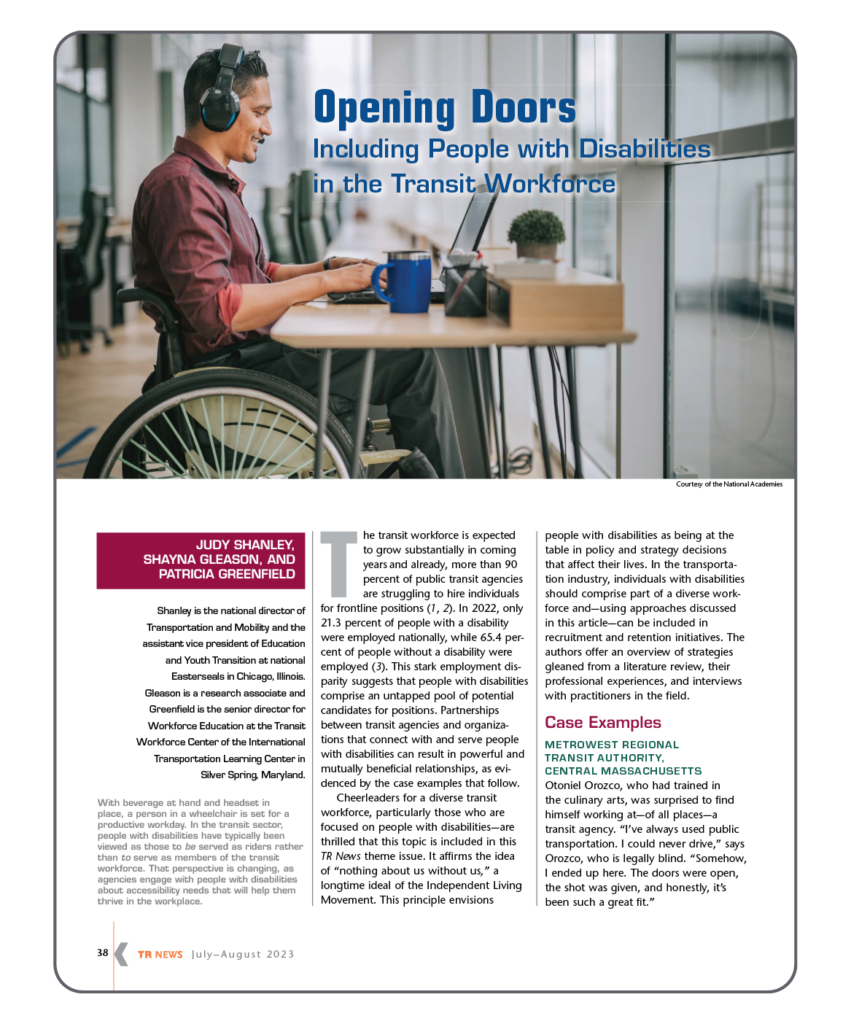
Opening Doors: Including People with Disabilities in the Transit Workforce
TR News
August 2023
In the transportation industry, individuals with disabilities should be included in recruitment and retention initiatives. “Opening Doors: Including People with Disabilities in the Transit Workforce” offers an overview of strategies and is one of the feature articles in the July-August 2023 edition (Issue 346) of TR News, TRB’s magazine.
Authors: Judy Shanley (National Center for Mobility Management), Shayna Gleason (International Transportation Learning Center), and Patricia Greenfield (International Transportation Learning Center)

Flagstaff Mountain Line Economic Contribution Analysis (FY 2022)
This study was requested by Mountain Line and was conducted by the Economic Policy Institute (EPI) housed in the W. A. Franke College of Business at Northern Arizona University. Its purpose is to provide Flagstaff city residents and decision makers with an understanding of the local economic benefits Mountain Line provides, including jobs supported by Mountain Line.
Northern Arizona University Economic Policy Institute
August 2023
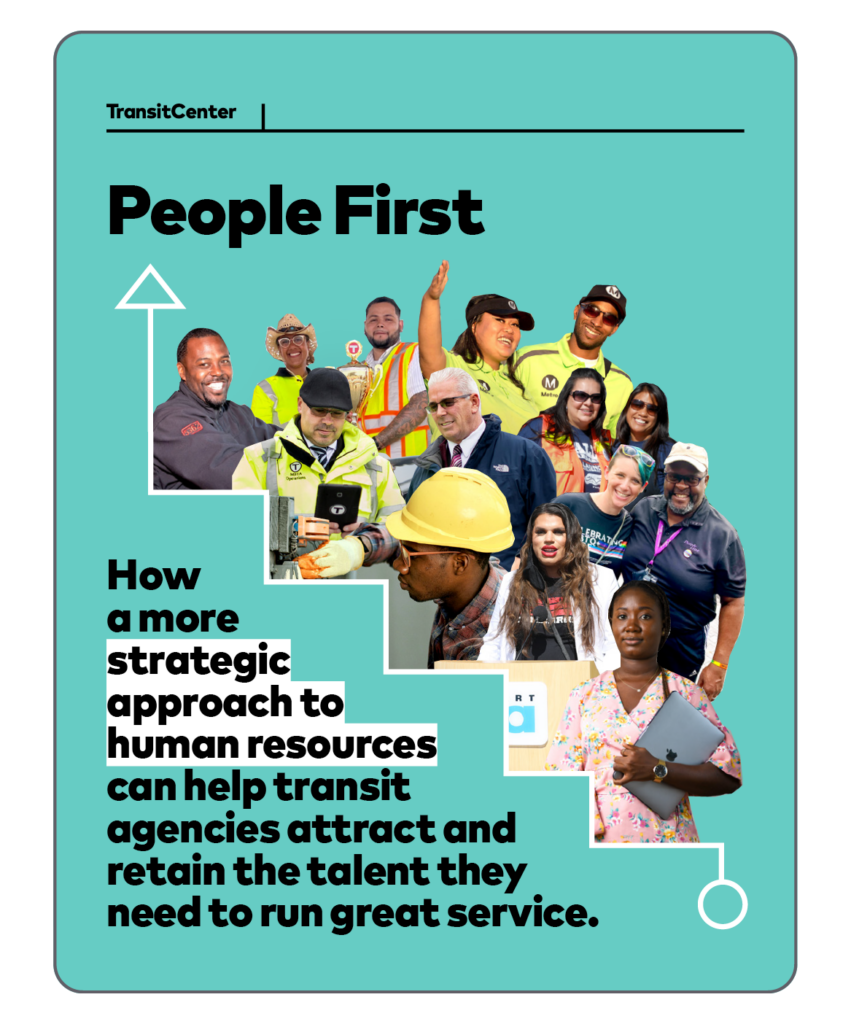
People First
This report from TransitCenter describes the current transit industry workforce shortage and provides recommendations for agency leadership, policy makers, and community advocates to help address the issue, including creating a robust human resources department, as well as strategies to address recruitment, training, and retention.
TransitCenter
July 2023
TOPICS: Workforce Shortage
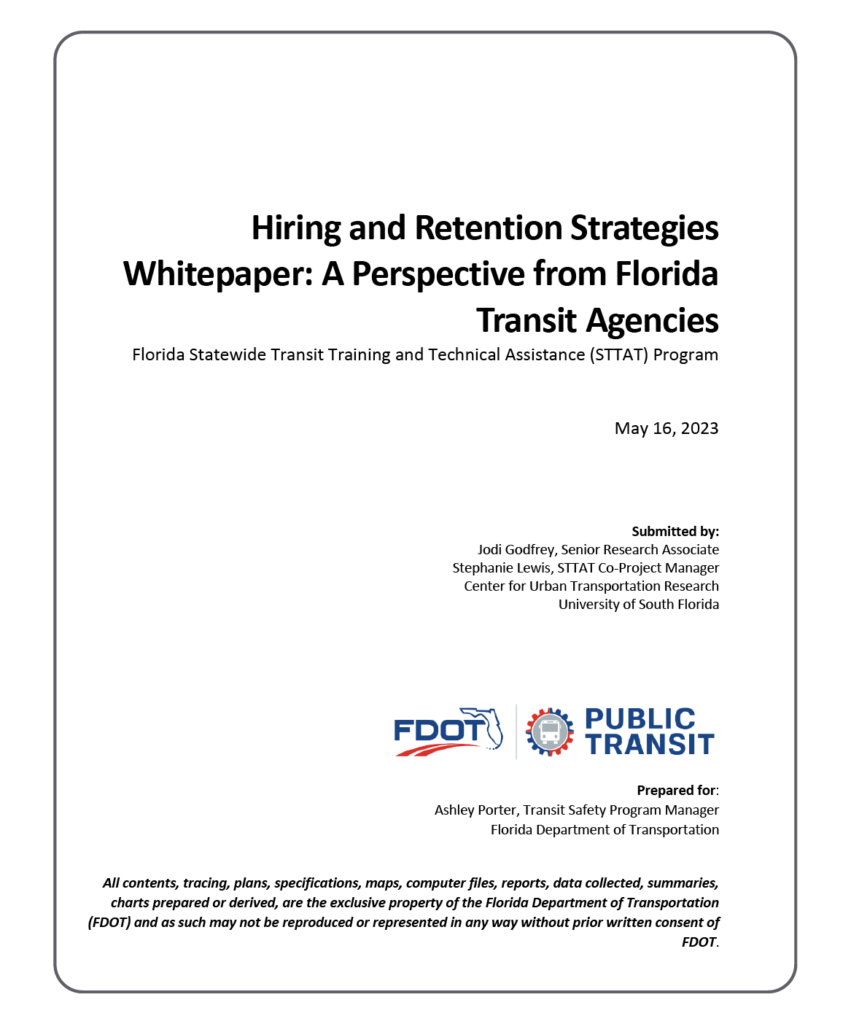
Hiring and Retention Strategies Whitepaper: A Perspective from Florida Transit Agencies
This study examines what transit agencies are doing to address hiring and retention challenges, what strategies are working, and what problems still need to be solved. The report includes six case study sites from Florida transit agencies and one non-Florida transit agency, that were selected due to a variety of characteristics, including partnerships and implemented service changes.
Center for Urban Transportation Research
June 2023
TOPICS: Hiring and Recruitment , Policy and Planning , Retention
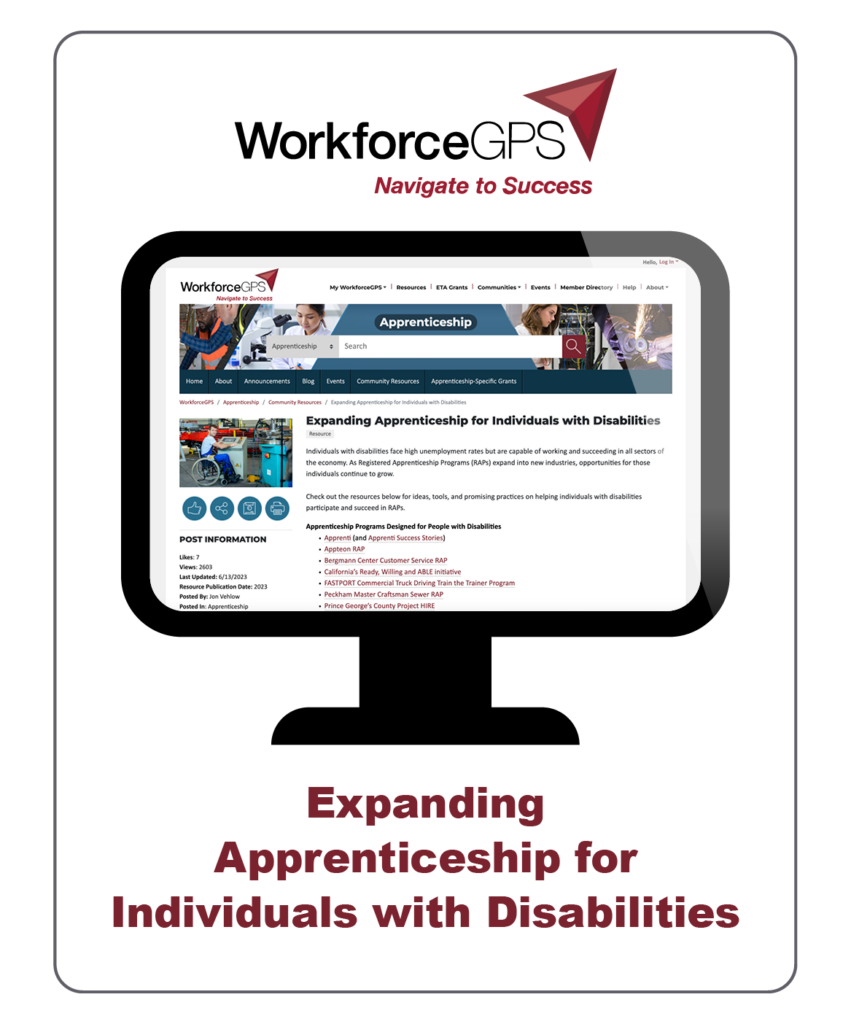
Expanding Apprenticeship for Individuals with Disabilities
This landing page features a variety of resources aimed at providing information, ideas, tools, and practices for supporting individuals with disabilities in apprenticeship programs. The resources include specific programs, toolkits and guides, outreach and background materials, and research.
WorkforceGPS
June 2023
TOPICS: Apprenticeship , Community Engagement , Mentorship
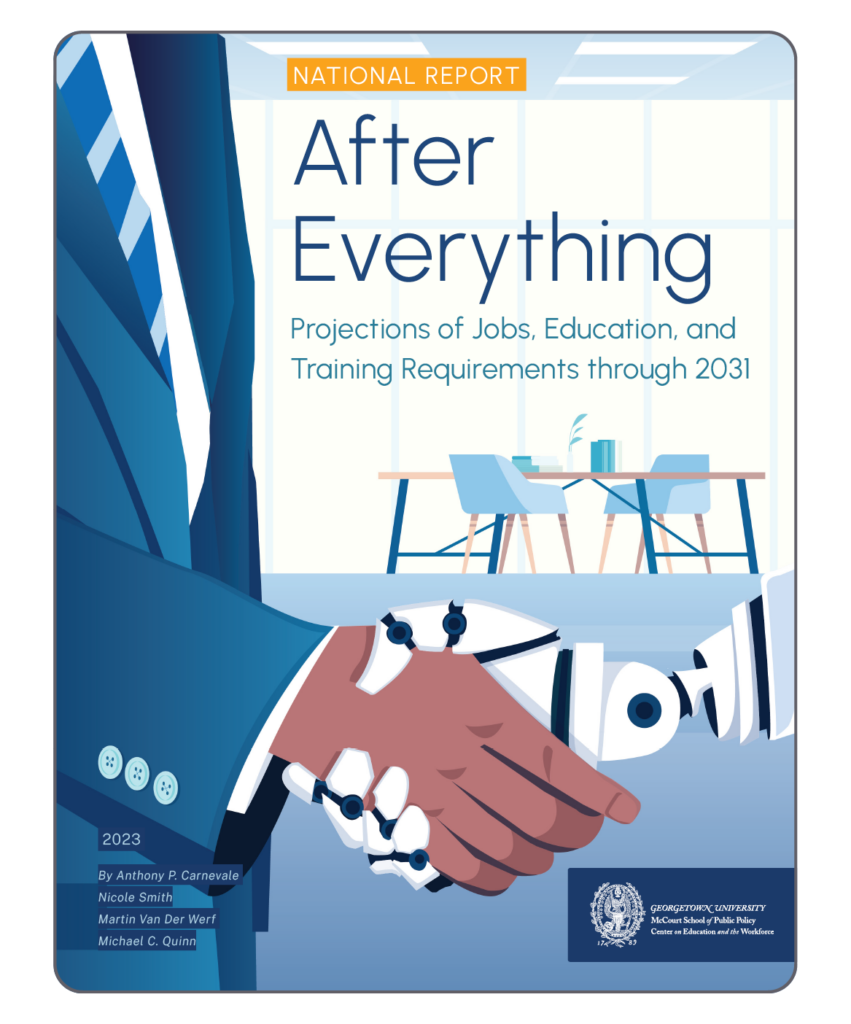
After Everything: Projections of Jobs, Education, and Training Requirements through 2031
By 2031, 72 percent of jobs in the US will require postsecondary education and/or training. Between 2021 and 2031, there will be 18.5 million job openings per year on average, and some 12.5 million of these annualized openings will require at least some college education. After Everything: Projections of Jobs, Education, and Training Requirements through 2031 includes a national overview of job projections and their educational requirements across industries, occupational clusters, and detailed occupational groups. These latest projections demonstrate the central role postsecondary education plays in preparing the workforce of the future.
Georgetown University Center on Education and the Workforce
June 2023
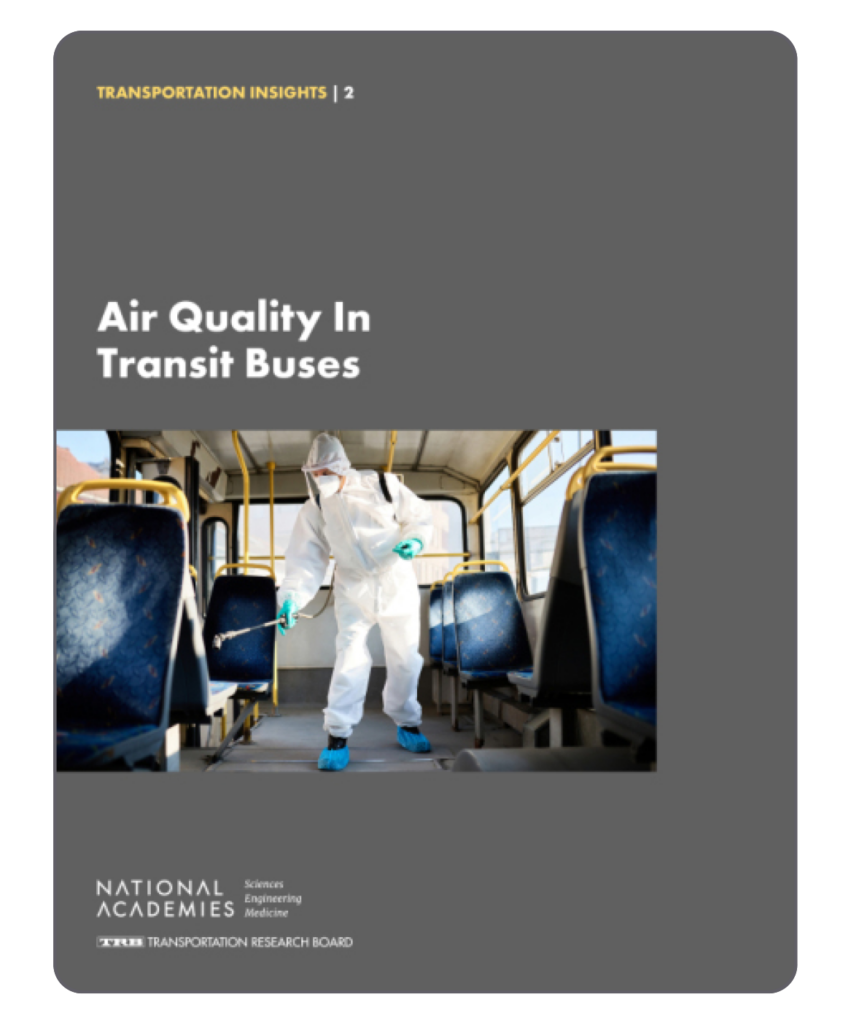
Air Quality in Transit Buses
This report provides a summary from a TRB Transit Cooperative Research Program (TCRP) Insight Event about the air quality in transit buses, particularly since the start of the pandemic. Since then, an increased understanding of infectious disease in confined spaces and the role of droplets and particles in transmission has been increasingly important to the bus industry. At this event, senior transportation executives; representatives from federal, state, and local government; and representatives from technology, consulting, academia, and engineering to discuss opportunities and the challenges of implementing air quality control in buses.
Transportation Research Board
May 2023
TOPICS: Policy and Planning , Safety and Health
Contributor(s): National Academies of Sciences, Engineering, and Medicine; Transportation Research Board; Transit Cooperative Research Program; Laura Williams
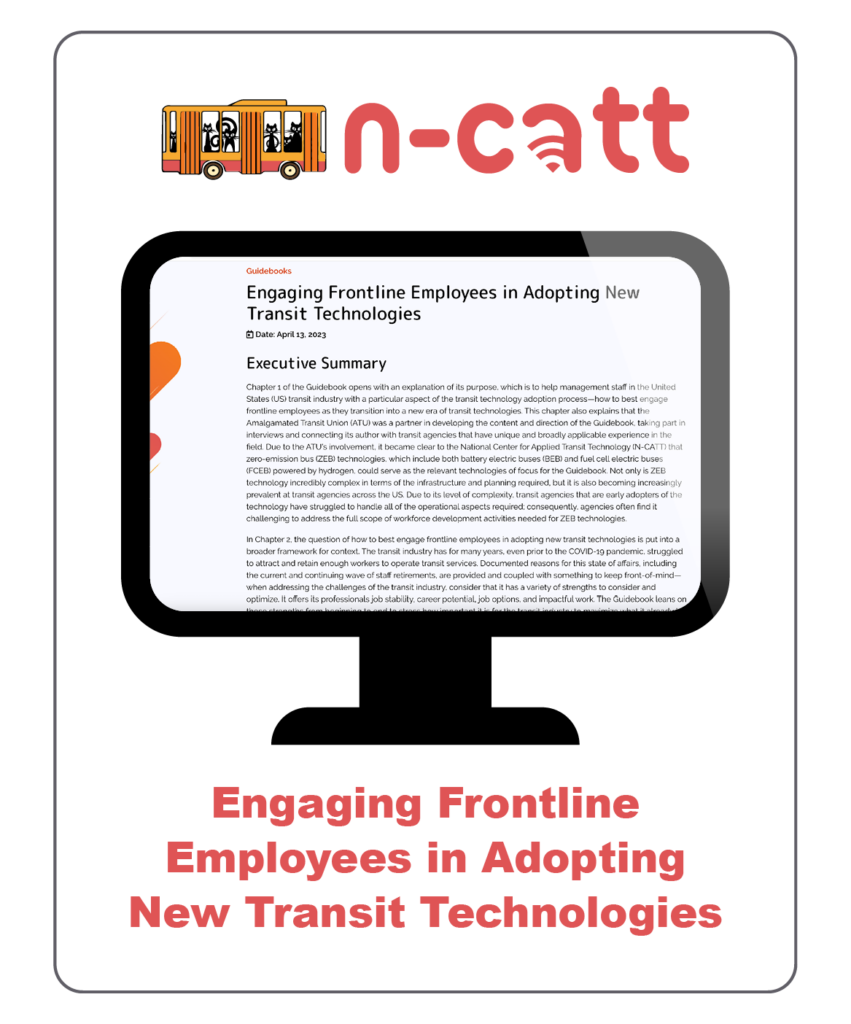
Engaging Frontline Employees in Adopting New Transit Technologies
The purpose of this guidebook, made in collaboration with the Amalgamated Transit Union (ATU), is to help management staff in the US transit industry engage frontline employees as they transition into a new era of transit technologies. The guidebook considers broader issues such as workforce shortages, provides advice and information on training frontline employees on new transit technologies, and discusses the usefulness of apprenticeships.
National Center for Applied Transit Technology
April 2023
TOPICS: Apprenticeship , Low- or No-Emission , Policy and Planning , Training , Workforce Shortage
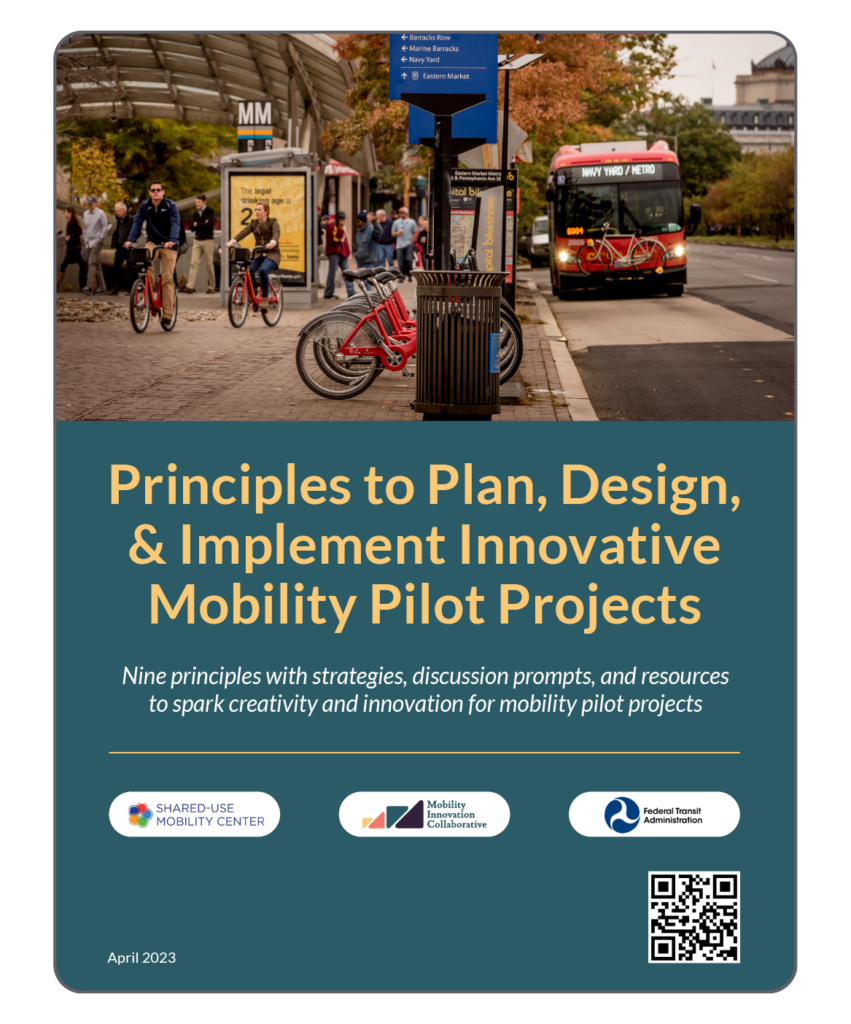
Guidebook for Mobility Innovation: Principles to Plan, Design, & Implement Innovative Mobility Projects
Shared-Use Mobility Center
April 2023
TOPICS: Policy and Planning , Training
This guidebook is designed to help mobility innovators in the transportation sector while developing and implementing a pilot project. It provides a series of principles to better plan, design, and implement innovative mobility pilot projects. These principles have supporting information about strategies to execute this principle, examples of this principle in action, resources about this principle, and questions to prompt team discussions. The guidebook includes advice and support for training transit workers during a pilot project.
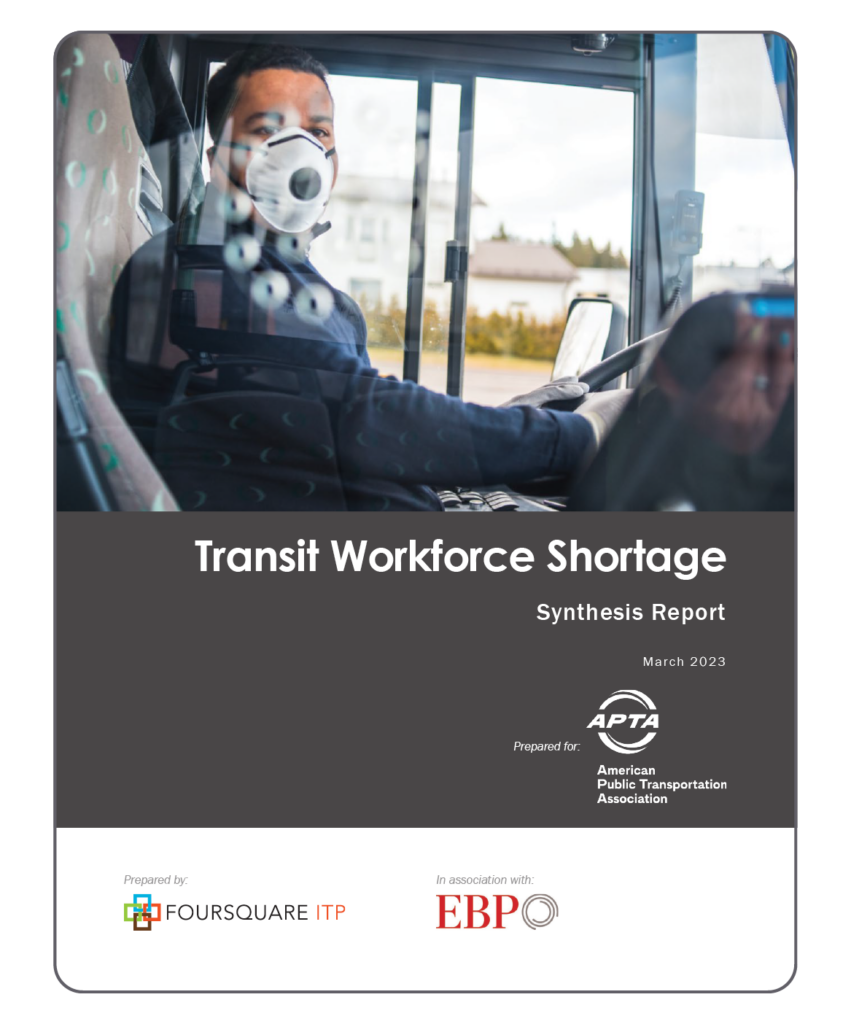
Transit Workforce Shortage: Synthesis Report and Toolkit
The Transit Workforce Shortage Study builds a framework for APTA, its members, and its partner organizations to better understand the workforce shortage’s causes and provides best practices for recruiting, hiring, and retaining transit operations workers.
American Public Transportation Association
March 2023
TOPICS: Hiring and Recruitment , Policy and Planning , Retention , Workforce Shortage
APTA’s Transit Workforce Shortage Study combines information from a survey of public transit workers and interviews with public transportation agencies to provide insight into ways to address the national shortage of transit workers. The report provides information on actions agencies have taken to address the workforce shortage, and the toolkit provides step-by-step answers to workforce shortage scenarios agencies are facing every day.
This report builds on findings from the first interim report.
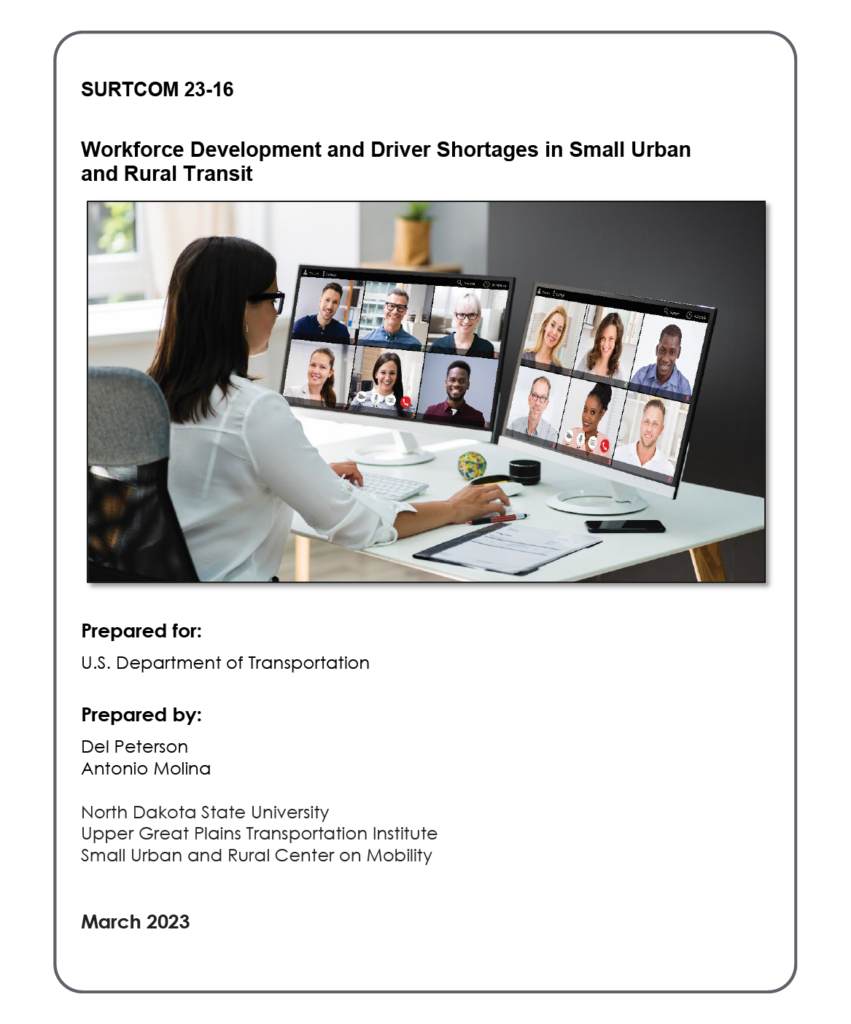
Workforce Development and Driver Shortages in Small Urban and Rural Transit
This report presents a national survey of small urban and rural transit managers to determine current workforce development practices. The survey results outline driver shortages and related issues, including an aging workforce, disruptions in service, and methods of alleviating the shortage.
Small Urban and Rural Center on Mobility
March 2023
TOPICS: Hiring and Recruitment , Retention , Workforce Shortage
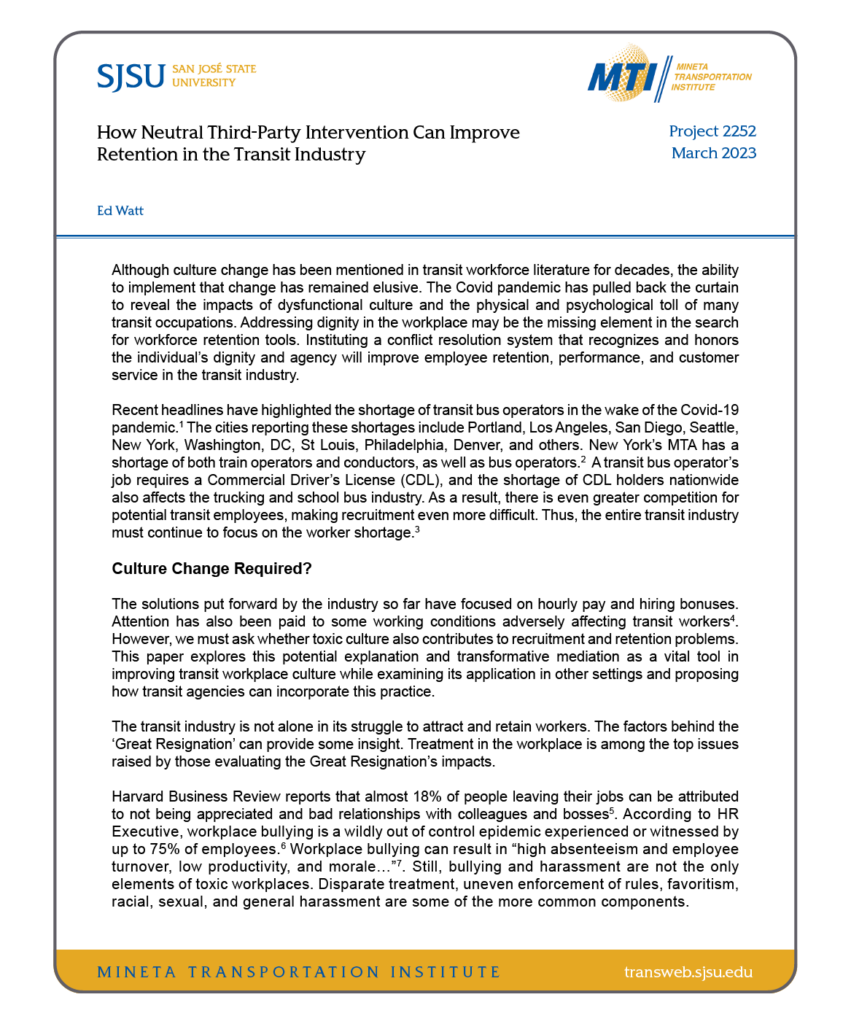
How Neutral Third-Party Intervention Can Improve Retention in the Transit Industry
This study proposes methods that follow transformative mediation in order to improve hiring and retention at transit agencies and other companies by providing an organizational culture that respects each person’s dignity, identity, and opinions.
Mineta Transportation Institute
March 2023
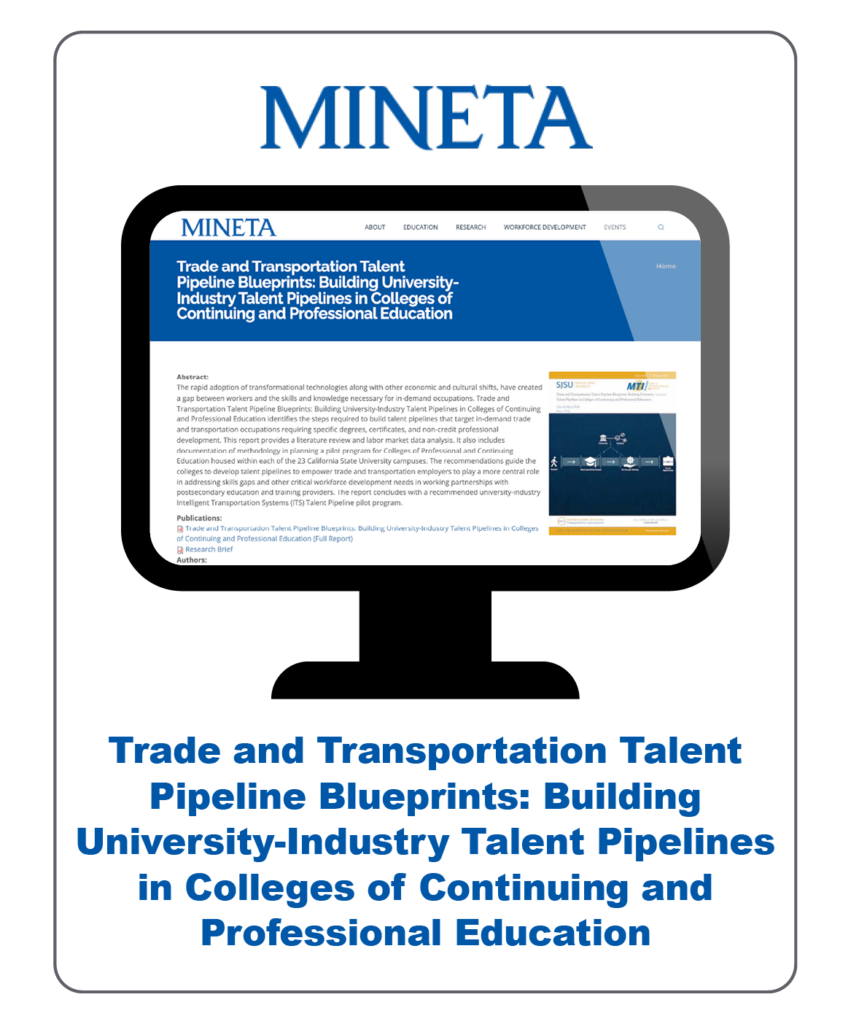
Trade and Transportation Talent Pipeline Blueprints: Building University-Industry Talent Pipelines in Colleges of Continuing and Professional Education
This report identifies the steps required to build talent pipelines that target in-demand trade and transportation occupations requiring specific degrees, certificates, and non-credit professional development and provides a literature review and labor market data analysis. It also includes documentation of methodology in planning a pilot program for Colleges of Professional and Continuing Education housed within each of the 23 California State University campuses.
Mineta Transportation Institute
February 2023
TOPICS: Career Pathways , Hiring and Recruitment , Policy and Planning , Training
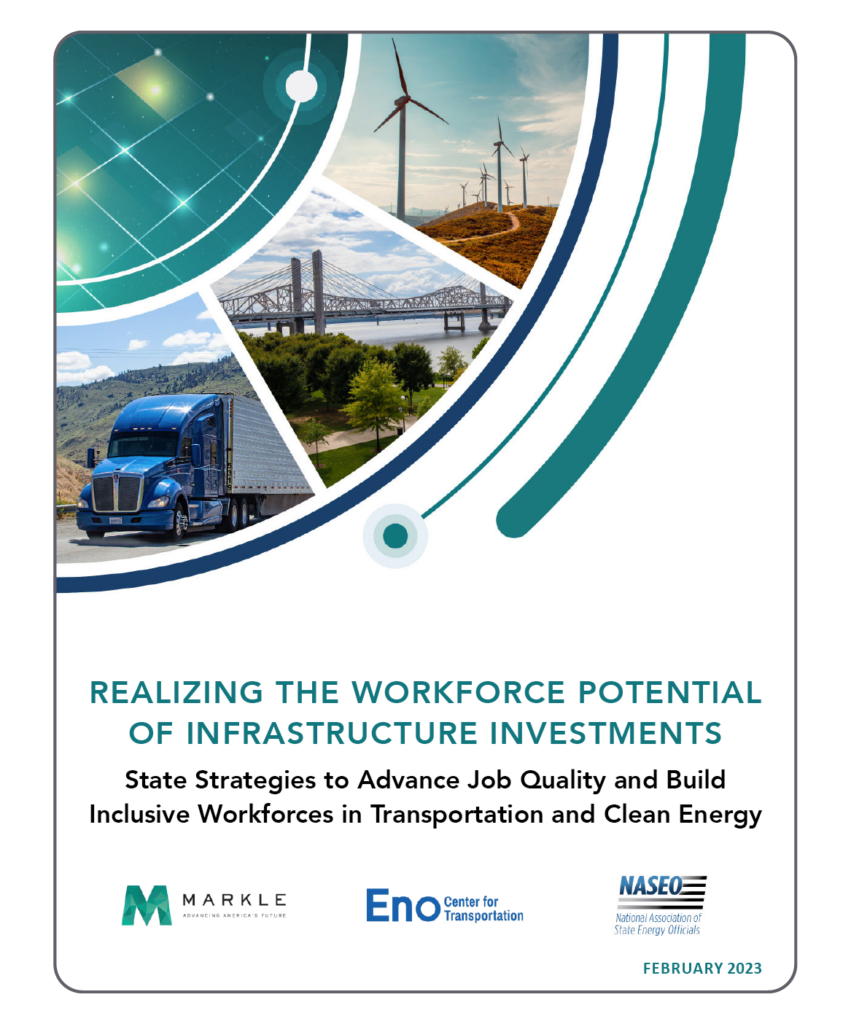
Realizing the Workforce Potential of Infrastructure Investments
This report details strategies for states to realize the workforce and job quality potential of infrastructure investments in critical sectors, particularly those poised for significant additional investments through the IIJA and IRA. The report explains specific funding streams on which states can capitalize and outlines a framework for priority actions that states can take to foster broad opportunity to benefit from good quality jobs connected to state spending in two of the most significant infrastructure sectors. The framework highlights examples of models and uses of these strategies from around the country, including a summary of instances of public infrastructure agencies embedding job quality and workforce aims into competitive procurement processes to influence private sector practices.
Markle; Eno Center for Transportation; National Association of State Energy Officials
February 2023
TOPICS: Policy and Planning , Procurement
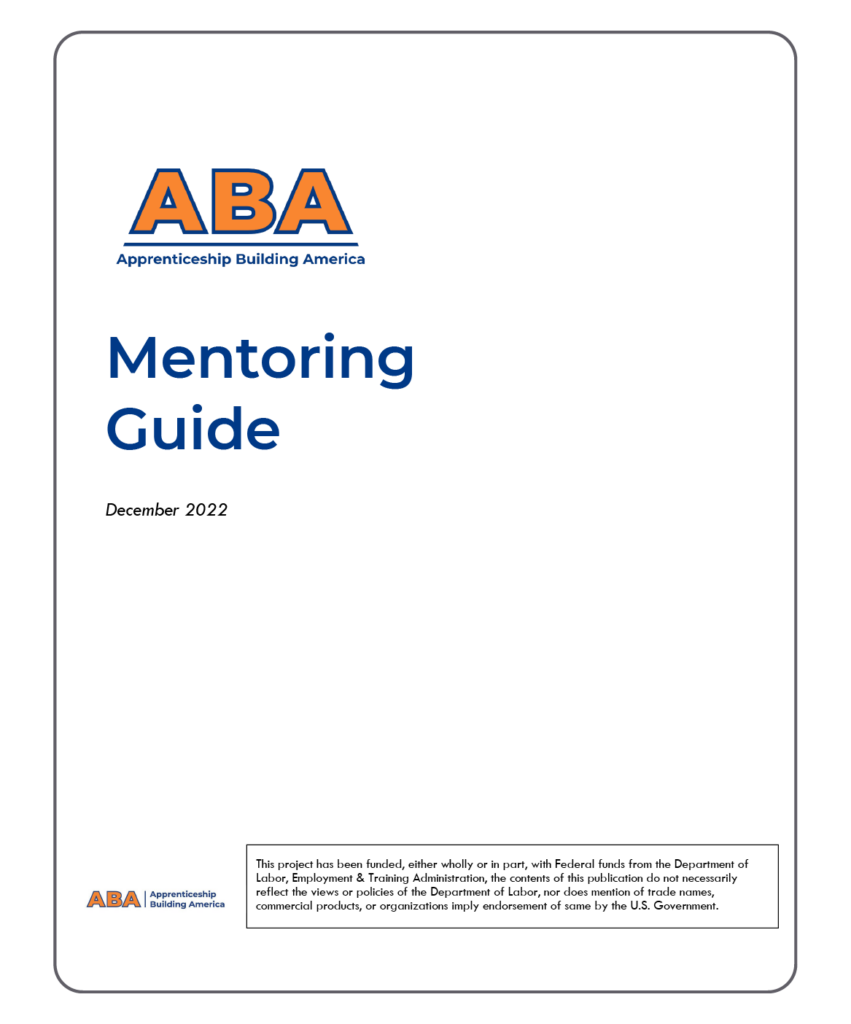
Apprenticeship Building America: Mentoring Guide
Mentoring is a key staple of a successful apprenticeship program. This guide provides an overview of the qualities of a good mentor, the activities a mentor undertakes, tips for mentoring youth apprentices, and more.
U.S. Dept of Labor, Apprenticeship Building America Grant Program
December 2022
TOPICS: Apprenticeship , Mentorship , Trainer and Mentor Development
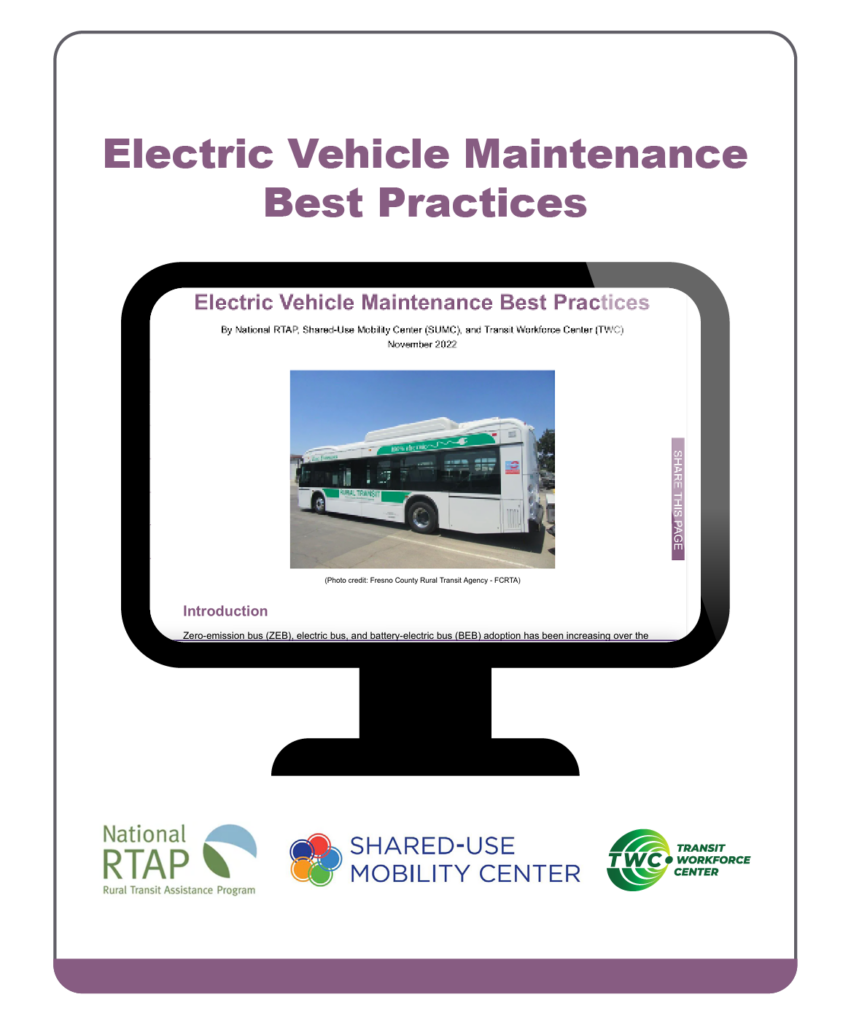
Electric Vehicle Maintenance Best Practices
This best practice spotlight article on electric vehicle maintenance provides recommended practices and case studies from transit agencies that have successfully implemented these vehicles into their fleets.
National RTAP, Shared-Use Mobility Center (SUMC), and Transit Workforce Center (TWC)
November 2022
TOPICS: Low- or No-Emission , Safety and Health , Training
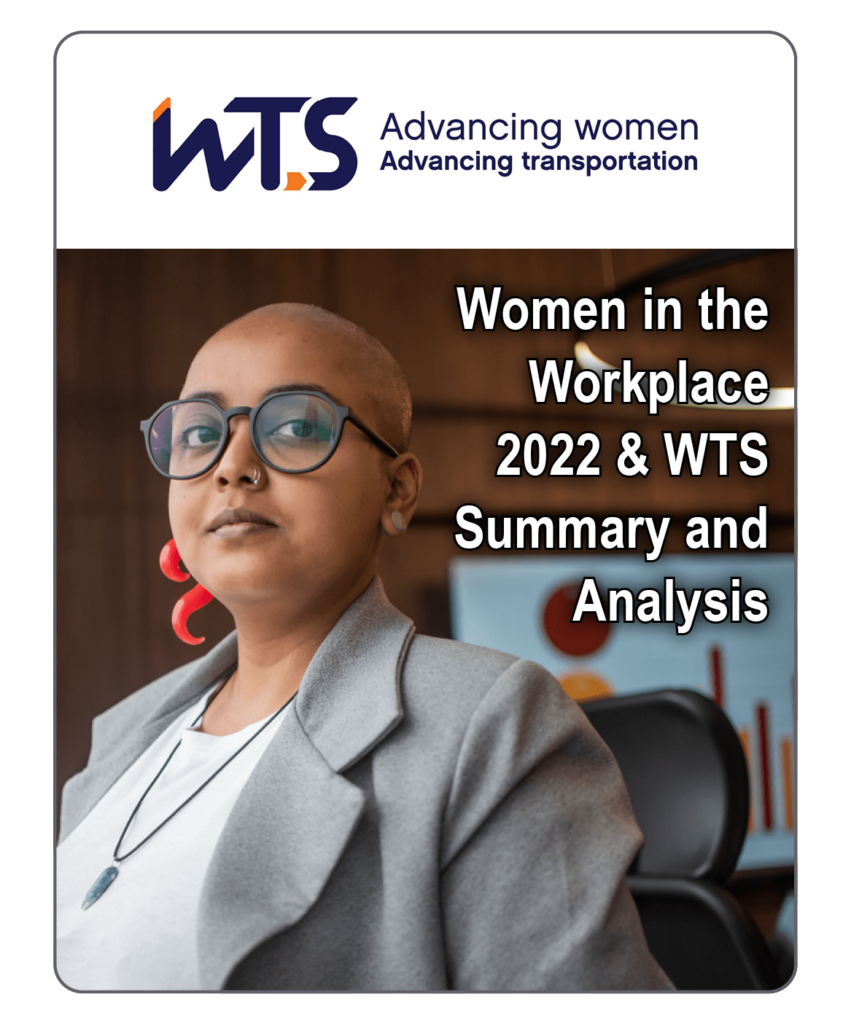
Women in the Workplace 2022
Launched in 2015 by LeanIn.Org and McKinsey & Company, Women in the Workplace is the largest study on the state of women in corporate America. The summary from WTS International outlines the report’s implications for the transportation workforce.
LeanIn.Org; McKinsey & Company; WTS International
October 2022
TOPICS: Career Pathways , Community Engagement
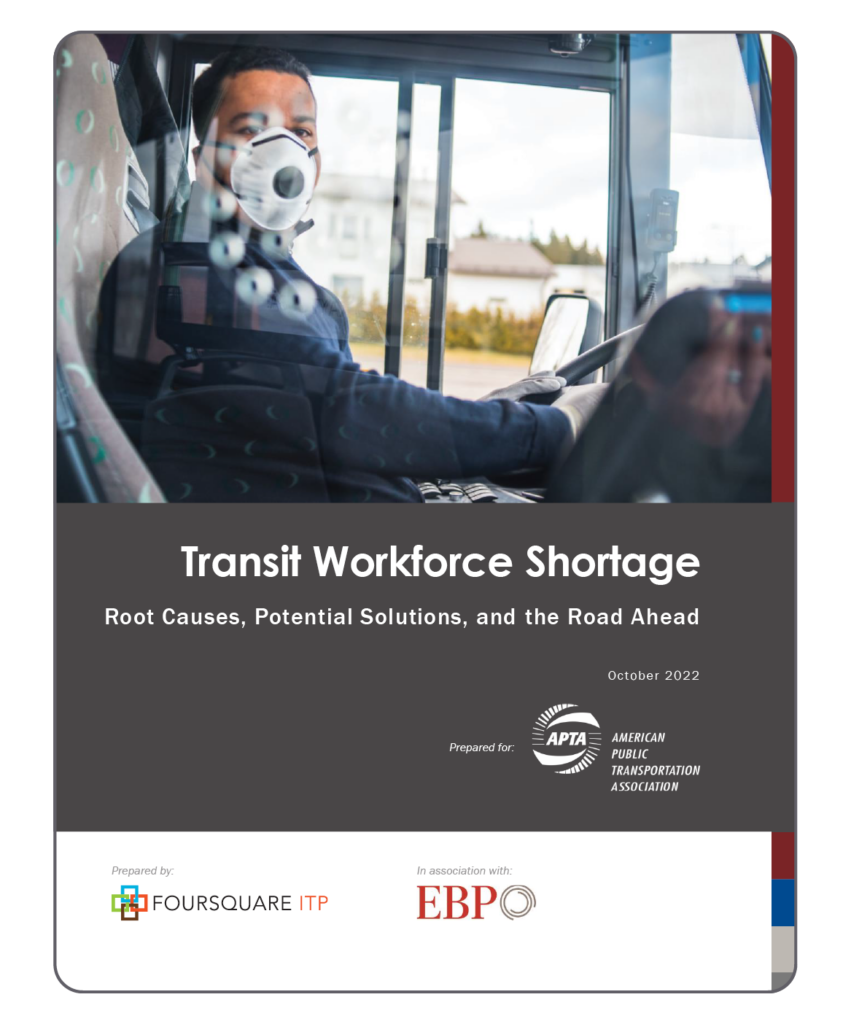
Transit Workforce Shortage: Root Causes, Potential Solutions, and the Road Ahead
American Public Transportation Association
October 2022
TOPICS: Hiring and Recruitment , Policy and Planning , Retention , Workforce Shortage
Public transit providers across North America face a shortage of operators and mechanics during a period of economic instability and reshuffling exacerbated by the COVID-19 pandemic. However, agencies’ ability to respond to the worker shortage has been hampered by inadequate information about its causes and effects. The Transit Workforce Shortage Study builds a framework for APTA, its members, and its partner organizations to better understand the workforce shortage’s causes and provides best practices for recruiting, hiring, and retaining transit operations workers. The study is comprised of two phases. This document, the Interim Findings Report, synthesizes the findings from Phase 1, which included a survey of transit agencies and background research into the macro causes of the shortage.
This report was followed by a full synthesis report and toolkit.
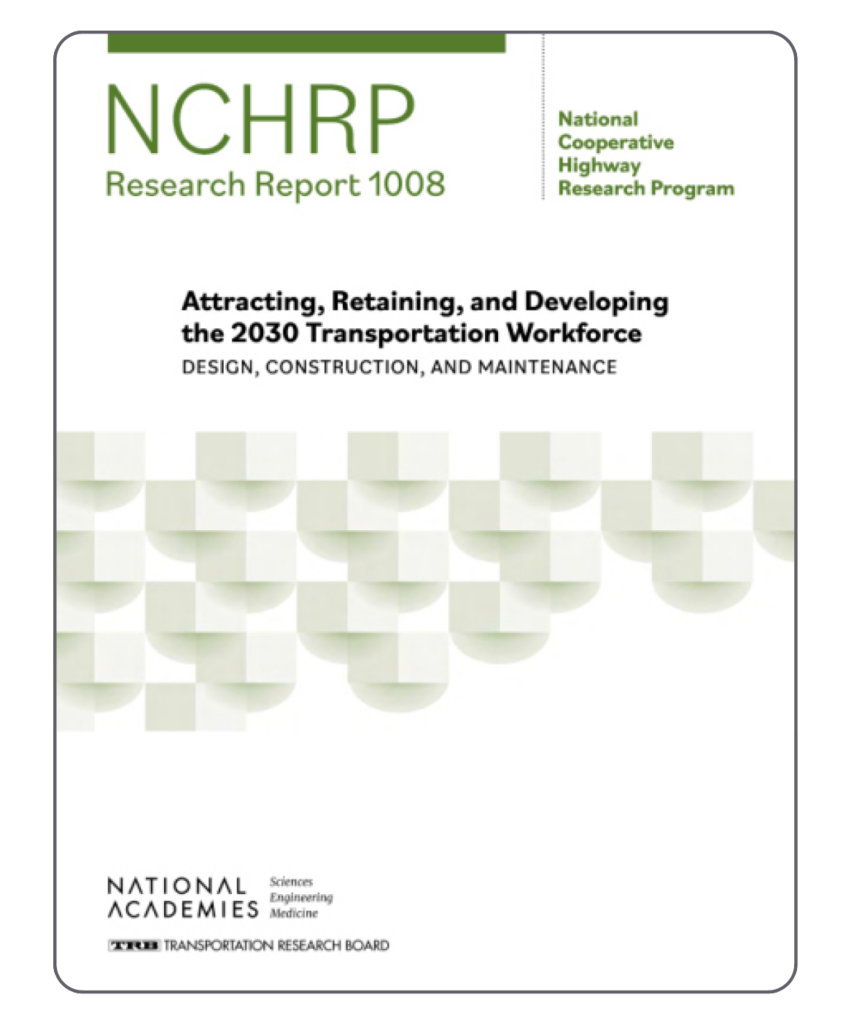
Attracting, Retaining, and Developing the 2030 Transportation Workforce
This report provides a guide with specific strategies and action plans to help agencies identify and address workforce needs through 2030 and beyond.
National Cooperative Highway Research Program
October 2022
State departments of transportation are responsible for providing a safe, efficient, and effective transportation system of infrastructure and services. To meet these responsibilities, transportation agencies need a highly skilled workforce with the expertise required to identify and address current transportation needs while also being prepared to address the challenges of the future.
Contributor(s): National Academies of Sciences, Engineering, and Medicine; Transportation Research Board; National Cooperative Highway Research Program; Candace Blair Cronin; Allison Alexander; Grace Arnold; Juan Carlos Batarse; Kelly Dray; Sasha Iliev; Jessica Jenkins; Erik Smallwood; Rachel Smart; Jake Streng; Mara Campbell; Susan Gallagher; Tyler Reeb; Tom O’Brien; Glenn McRae
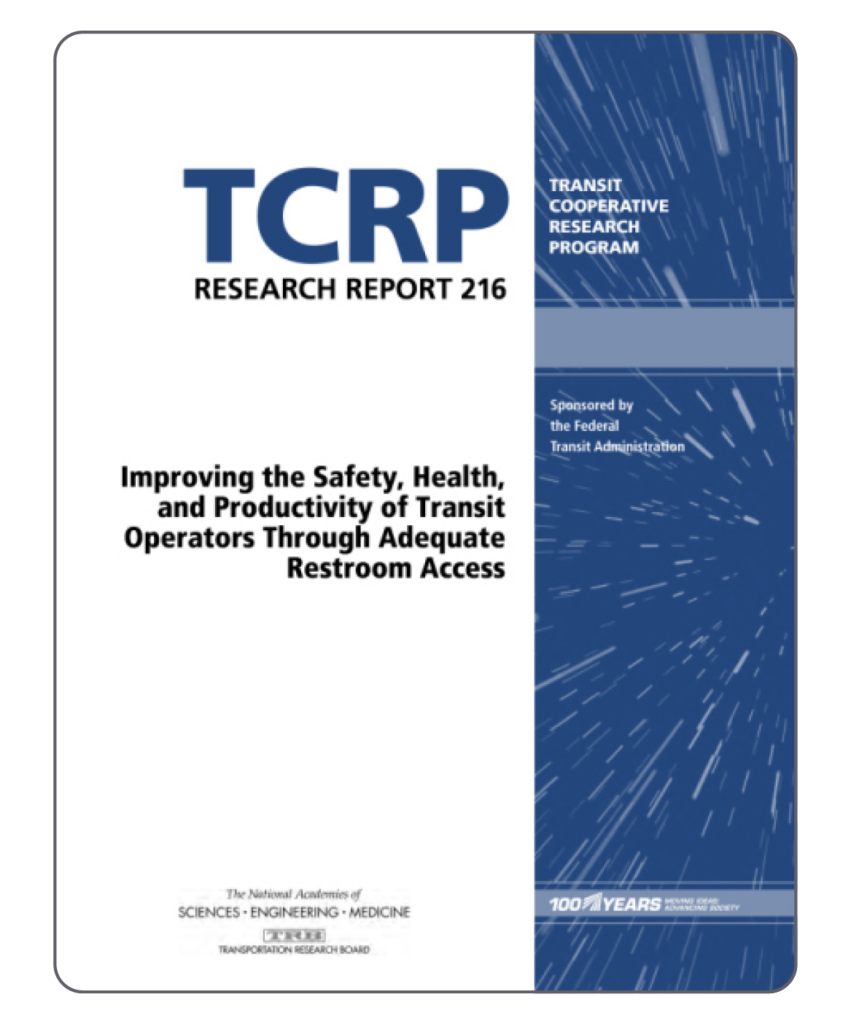
Improving the Safety, Health, and Productivity of Transit Operators Through Adequate Restroom Access
This report presents a catalog of good practices, tools, and resources that provide a foundation for implementable strategies to improve restroom access, primarily for transit vehicle operators. The report compiles research from 100 transit agencies on current and best practices; the impact of restroom access on health, safety, and operations, and lessons learned.
Transit Cooperative Research Program
October 2022
TOPICS: Policy and Planning , Safety and Health
A toolbox accompanying the report includes helpful resources such as restroom inventory, planning, and cost estimation tools, as well as templates for restroom access policies and contract language.
Contributor(s): National Academies of Sciences, Engineering, and Medicine; Transportation Research Board; Transit Cooperative Research Program; Robin Mary Gillespie, City University of New York; RLS & Associates Robbie Sarles
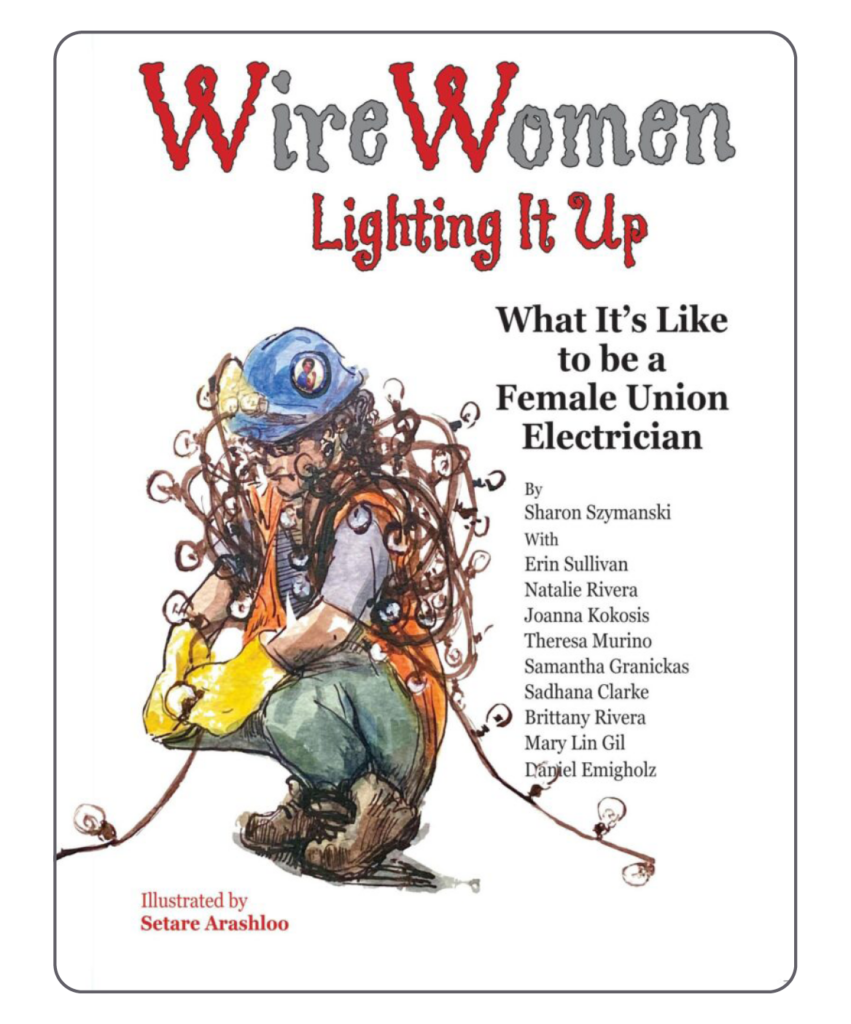
Wire Women: Lighting it Up
This illustrated publication tells the stories of women who are undertaking apprenticeship to become union electricians. This resource could be used by transit agencies, unions, or apprenticeship programs as promotional material or for educational purposes.
Sharon Szymanski
September 2022
TOPICS: Apprenticeship , Career Pathways , Community Engagement
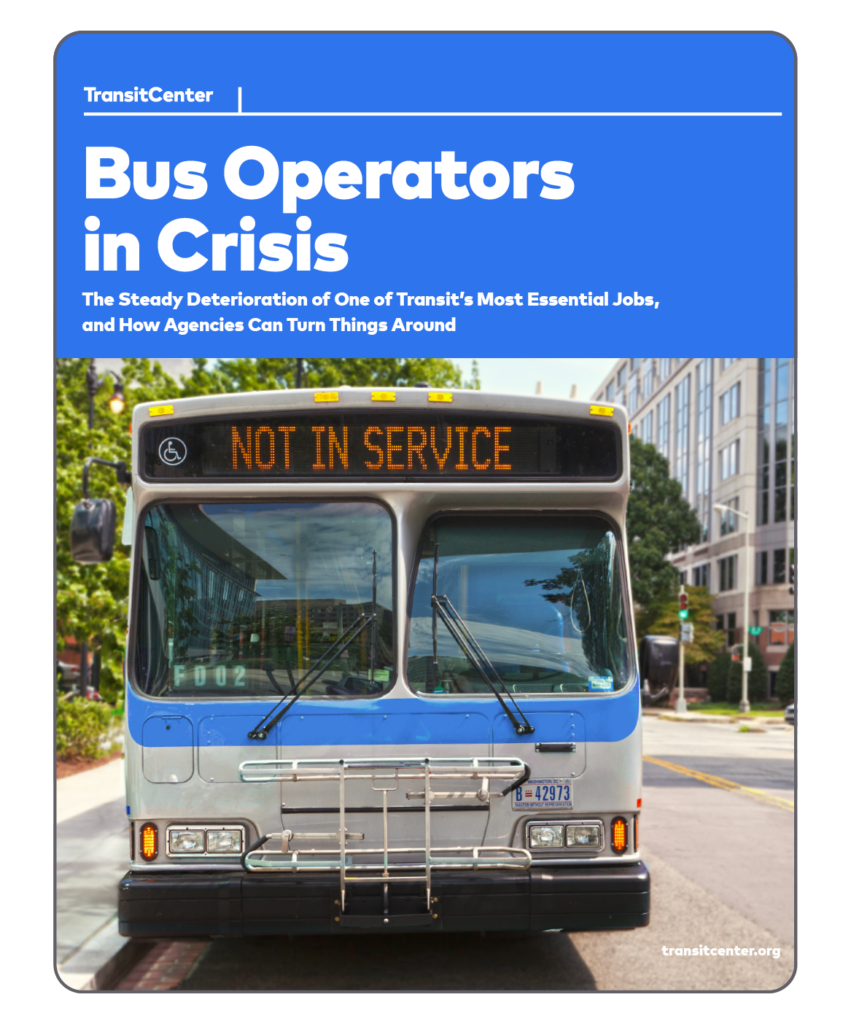
Bus Operators in Crisis
TransitCenter’s report, entitled Bus Operators in Crisis: The Steady Deterioration of One of Transit’s Most Essential Jobs, and How Agencies Can Turn Things Around, analyzes the nationwide phenomenon of bus operator shortages and advocates for enhanced job quality in the occupation. It details the challenges American operators are facing, and offers solutions that transit agencies can take to solve issues locally, as well as steps that state and the federal governments can take to provide agencies with necessary support.
TransitCenter
July 2022
TOPICS: Apprenticeship , Career Pathways , Community Engagement , Hiring and Recruitment , Retention
This resource also includes a link to a webinar hosted in July, 2022 presenting information from the report and slides from the webinar.
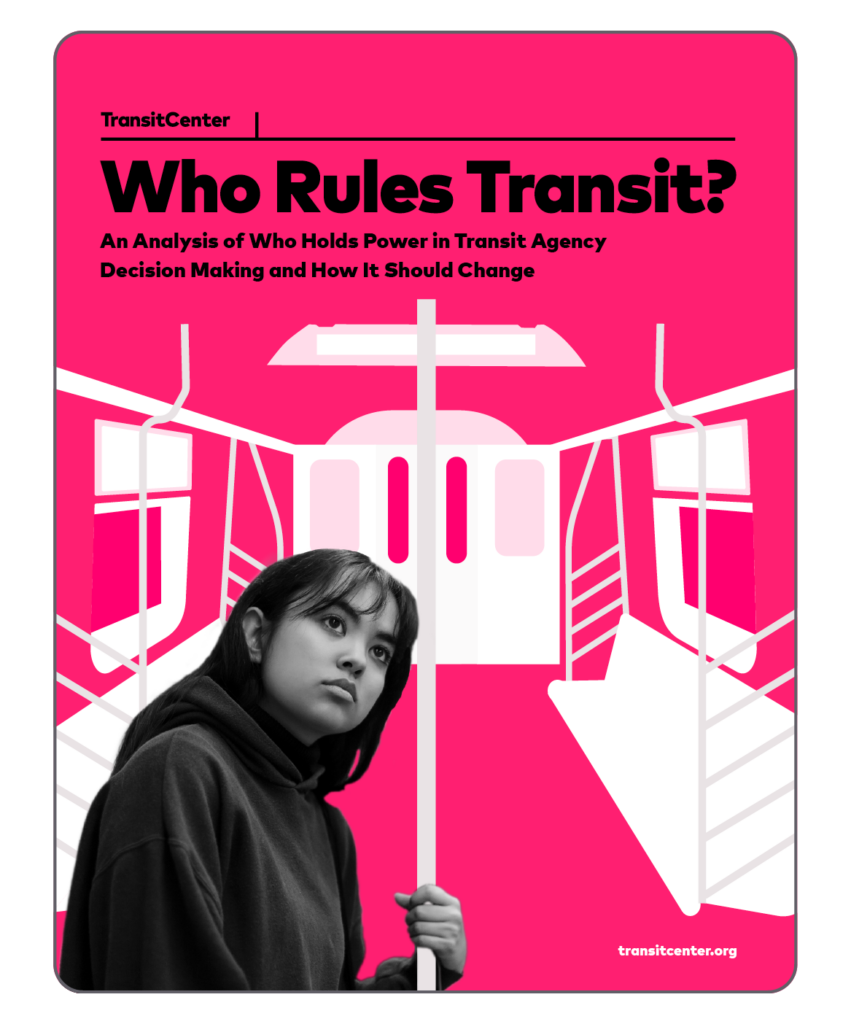
Who Rules Transit?
This report examines who makes key decisions at transit agencies and who is affected by these decisions. The report provides case studies of agencies that have taken steps to give transit riders and workers more power in the decision-making process.
TransitCenter
April 2022
TOPICS: Community Engagement , Policy and Planning
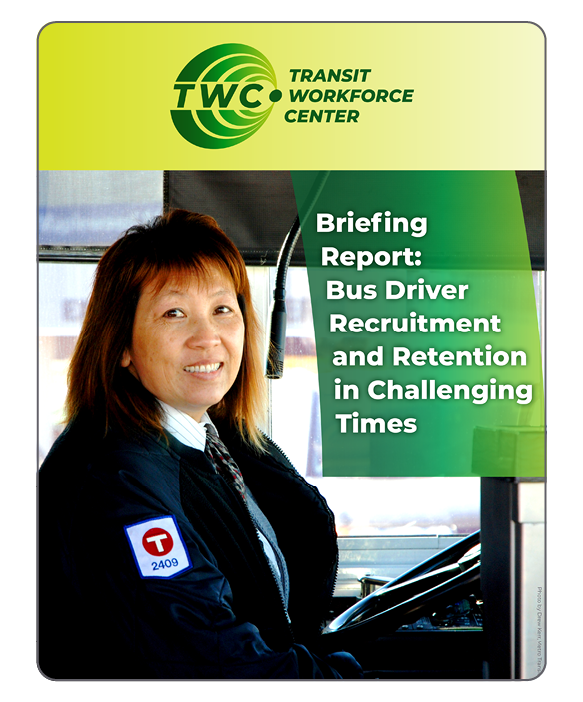
Bus Driver Recruitment and Retention in Challenging Times
Transit Workforce Center
April 2022
TOPICS: Hiring and Recruitment , Retention , Safety and Health , Workforce Shortage
While the U.S. public transportation industry has long had a significant bus operator shortage, it has been magnified by the COVID-19 pandemic. COVID-19 has not only exacerbated existing trends, but also introduced new labor market dynamics. This brief describes overall workforce trends for bus operators, obstacles to recruitment, and challenges for workforce retention, to help inform efforts to recruit more drivers nationwide.
Overall workforce trends
According to 2020 Bureau of Labor Statistics (BLS) data, there are 162,850 bus operators nationally. Federal government projections indicate strong growth for bus operators; BLS estimates the occupation will grow “much faster than average (15 percent or higher).”[1] To keep up with growth and make up for retirements and turnover, the industry will need to recruit scores of new workers. BLS reported an annual average of 24,600 projected bus operator job openings for 2020 to 2030.[2]
According to BLS, annual wages for the occupation were $45,900 in 2020, which was higher than the national median of $41,950.[3] Despite having a reputation for paying relatively well and providing robust benefits,[4], [5] transit agencies have faced significant challenges to recruit workers in sufficient numbers to meet the growing demand. The rise of COVID and the omicron variant have created a “labor crisis” in transit, leading Houston Metro to offer bonuses of $4,000 for new drivers, and NYC to try to lure workers out of retirement, for example.[6]
Demographic challenges
One major demographic challenge contributing to the current operator shortage is the disproportionately older bus operator workforce. As Figure 1 on the next page shows, the median age of U.S. workers was 42.2 years in 2021, and 42.8 years in transportation and warehousing. For the bus service and urban transit industry, it was 52.7, which is substantially higher than both the nationwide median age for workers and the median age for other subsectors within transportation and warehousing, such as air or rail transportation.[7] The higher median age of urban transit workers is largely attributable to the older age of bus drivers (median 53.3 years)[8], who constitute 60 percent of the workforce[9]. A large percentage of workers are expected to retire in the coming years.[10], [11]
COVID-related health and safety issues
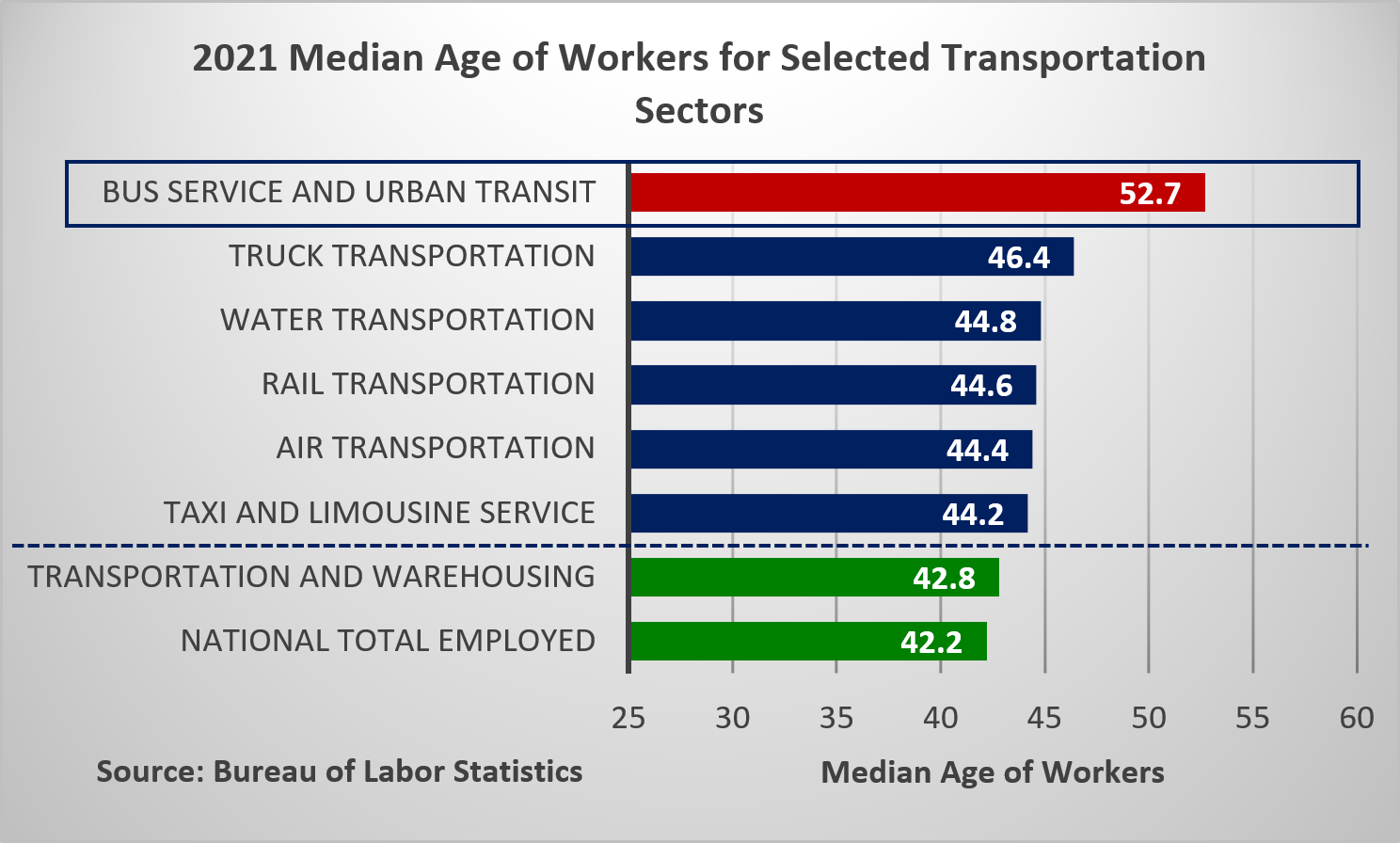
Figure 1. 2021 Median Age of Workers for Selected Transportation Sectors
As frontline workers, bus operators risk exposure to COVID-19, and serious health consequences, even death. For example, in New York City, 136 MTA operators died around the start of the pandemic.[12] As of December 2021, more than 2,000 COVID cases have been reported among WMATA workers since the pandemic began; seven of the workers died. According to CTAA, some member agencies have experienced as many as 40 percent of their operators absent from work due to sickness.[13] COVID-related factors have resulted in bus operator shortages and service cuts,[14] a trend which has occurred in transit systems nationwide. In addition, some drivers have quit due to fears about the virus or been terminated due to failure to comply with vaccination and testing policies.[15]
Pre-existing labor market dynamics
The pandemic has also exacerbated existing workforce challenges, such as competition for pay. Stakeholders interviewed for a GAO study reported that other industries which hire workers with similar levels of education, including fast food, may attract workers instead of transit, especially in rural areas or areas with low unemployment.[16] When the economy is strong, construction also tends to attract workers who might otherwise work in transit. Furthermore, some workers leave the transit industry once they have earned their CDL.[17]
CDL and new requirements
Transit bus drivers are generally required to hold Class B Commercial Drivers’ Licenses and passenger (P) endorsements. Due to the high cost of self-funding CDL training, employer-sponsored training programs in which costs are covered, such as those run by transit agencies, are an attractive option for job seekers. However, the potential exists for trainees to pursue employment in commercial driving or another sector after completing a transit-oriented training program.[18] This dynamic is particularly challenging given concurrent shortages of truck and school bus drivers.[19]
Individuals are required to hold a standard driver’s license to qualify for a commercial learners’ permit, which in turn is needed to pursue CDL training.[20] These requirements may impact recruitment of young people, as rates of driver’s license attainment for 18–24 year-olds have decreased slightly in recent decades and may be lower during recessionary periods and among residents of cities.[21]
Regulatory changes impacting entry level driver training (ELDT) may also affect agencies’ ability to fill positions. As of February 7, 2022, the FMCSA has started enforcing universal training standards for entry level driver training and maintaining a database of qualified providers (the Training Provider Registry).[22] Professional organizations representing transit agencies such as APTA and CTAA have expressed concern about these additional regulatory requirements. Agency contacts have also identified challenges related to requirements around license renewal, medical fitness testing, the availability of training during the pandemic and delays with local DMVs processing CDL application due to pandemic staff shortages. FMCSA has granted waivers around certain other CDL requirements during the pandemic, and recently announced a grant to support state capacity for CDL licensing, though the emphasis appears to be on commercial trucking. [23], [24]
Assaults against drivers
Driver safety has been a persistent problem. Assaults against drivers and altercations with passengers have been well-publicized in communities that transit serves.[25], [26]A 2015 Monthly Labor Review article identified violence as a key challenge facing drivers, with examples including a 2012 attack with rocks in Washington, DC and a 2013 shooting in Seattle.[27] More recently, drivers have reported increased stress during the pandemic and face threats including violence related to passenger non-compliance with mask mandates, among other issues. Such incidents have deterred potential applicants from considering a transit driving career and contributed to early retirements.[28]
Lack of interest from younger generations
Younger workers have different expectations about the workplace, which has made it challenging for agencies to recruit them. Younger workers tend to value flexible schedules, yet operators must often work on holidays and weekends, especially when they first start in the field. New hires in general may not find this attractive.[29]
Advances in technology
Advances in technology present challenges to recruitment and retention. The rise of automation and apps requires drivers to possess technical knowledge to operate newer buses and assist customers; this means there is a relatively small pool of qualified workers. Additional and new types of training are needed for both incumbent and new workers to adapt. Furthermore, drivers report feeling stress from being monitored more often by cameras and tracking technology.[30], [31]
Stress and burn-out
Finally, being a bus operator is a highly stressful occupation. Drivers must operate large vehicles on congested city streets on tight time schedules.[32] They work relatively long hours with infrequent breaks.[33] As discussed earlier, technological advances have contributed to worker stress as well. Operators also experience burn-out due to the stress of dealing with passengers, who may ignore COVID safety rules,[34] or be unruly or violent.
Conclusion
Bus operators have been in short supply for years, and this problem has been magnified by COVID-19. An aging workforce and labor exits related to COVID have largely contributed to the shortage. Top obstacles to recruitment and retention include pandemic-related health and safety issues, pre-existing labor market dynamics including competition over pay, CDL requirements, assaults against drivers, and lack of interest from younger generations. Other contributing factors include advances in technology, perceptions of inflexibility, and stress. To address these workforce recruitment and retention issues for bus operators, key stakeholders from management and labor should keep these data and trends in mind.
Bus Operator Recruitment Campaign
The Transit Workforce Center (TWC) is currently developing a national campaign in coordination with the FTA, along with key labor and industry partners, to effectively address the national bus operator shortage. The TWC is preparing to create a toolkit of materials designed to be adapted by agencies and labor union locals that will consist of templates for commercial scripts, postcard mailers, exhibit banners, talking points for public meetings, social media postings, informational video scripts, and letters of introduction. If any organization has existing models that should be incorporated into these plans, please contact Senior Communications Specialist David Stephen at dstephen@transportcenter.org.
Contributing Authors: Benjamin Kreider (Consultant); Xinge Wang; Douglas Nevins
[1] Bureau of Labor Statistics. Occupational Employment and Wages, May 2020. 53-3052 Bus Drivers, Transit and Intercity. https://www.bls.gov/oes/current/oes533052.htm
[2] Bureau of Labor Statistics. Table 1.7: Occupational projections, 2020–30, and worker characteristics, 2020. https://www.bls.gov/emp/tables/occupational-projections-and-characteristics.htm.
[3] Summary Report for: 53-3052.00 – Bus Drivers, Transit and Intercity. O*Net Online. https://www.onetonline.org/link/summary/53-3052.00?redir=53-3021.00.
[4] Shared-Use Mobility Center. “Case Study: Managing the Labor Shortage at Transit Agencies.” November 5, 2021. https://learn.sharedusemobilitycenter.org/casestudy/managing-the-labor-shortage-at-transit-agencies/.
[5] Laura Bliss. “There’s a Bus Driver Shortage. And No Wonder.” Bloomberg City Lab. June 28, 2018. https://www.bloomberg.com/news/articles/2018-06-28/there-s-a-bus-driver-shortage-and-no-wonder.
[6] Eli Rosenberg. “Labor shortages are hampering public transportation systems, challenging the recovery of city life.” Washington Post. December 28, 2021. https://www.washingtonpost.com/business/2021/12/28/worker-shortages-public-transportation/.
[7]Bureau of Labor Statistics. Table18b: Employed persons by detailed industry and age. https://www.bls.gov/cps/cpsaat18b.htm.
[8] Bureau of Labor Statistics, Table 11b: Employed persons by detailed occupation and age, 2020. https://www.bls.gov/cps/cpsaat11b.htm.
[9] Bureau of Labor Statistics, National Employment Matrix. https://data.bls.gov/projections/nationalMatrix?queryParams=485100&ioType=i.
[10] Jack Clark. Testimony before the House Transportation Infrastructure Subcommittee on Highways. March 13, 2019. https://transportation.house.gov/imo/media/doc/Testimony-%20Clark.pdf.
[11] Robert Puentes et al. “Practitioner’s Guide to Bus Operator Workforce Management.” Transportation Research Board of The National Academies of Sciences, Engineering, and Medicine. November, 2021. Unpublished interim report.
[12] Benito Perez. “After COVID, who’s driving the bus?” Transportation For America. Nov 2, 2021. https://t4america.org/2021/11/02/bus-operator-shortage/.
[13] Justin George. “Omicron deepens bus driver shortage, frustrating passengers as transit agencies pare back service.” Washington Post. January 15, 2022. https://www.washingtonpost.com/transportation/2022/01/15/covid-omicron-bus-transit/
[14] Justin George. “Bus operator shortage due to covid prompts Metro to reduce bus service.” Washington Post. December 23, 2021. https://www.washingtonpost.com/transportation/2021/12/23/dc-metro-bus-shortage-covid/.
[15] “MARTA Making Temporary Service Modifications to Address Bus Operator Shortage.” Metro Magazine. https://www.metro-magazine.com/10155945/marta-making-temporary-service-modifications-to-address-bus-operator-shortage. November 12, 2021.
[16] US Government Accountability Office. “Transit Workforce Development – Improved Strategic Planning Practices Could Enhance FTA Efforts.” GAO-19-2090. March 2019. https://www.gao.gov/assets/700/697562.pdf. P. 15.
[17] Puentes et al., 2021.
[18] Puentes et al., 2021. P. 37.
[19] Bliss, 2021.
[20] FMCSA. “Commercial Driver’s License: States.” December, 2019. https://www.fmcsa.dot.gov/registration/commercial-drivers-license/states
[21] Tefft, B. C. & Foss, R. D. “Prevalence and Timing of Driver Licensing Among Young Adults, United States, 2019.” October, 2019. AAA Foundation for Traffic Safety. https://aaafoundation.org/wp-content/uploads/2019/10/19-0500_AAAFTS_Teen-Driver-Safety-Week-Brief_r1.pdf
[22] FMCSA. “Commercial Driver’s License: Entry-Level Driver Training (ELDT). February, 2022. https://www.fmcsa.dot.gov/registration/commercial-drivers-license/entry-level-driver-training-eldt
[23] FMCSA. “Waiver in Response to the COVID-19 National Emergency –For States, CDL Holders, CLP Holders, and Interstate Drivers.” December 15, 2020. https://www.fmcsa.dot.gov/emergency/waiver-response-covid-19-national-emergency-states-cdl-holders-clp-holders-and-1
[24] U.S. DOT. “DOT, DOL Announce Expansion of Trucking Apprenticeships, New Truck Driver Boards and Studies to Improve the Working Conditions of Truck Drivers.” January 13, 2022. https://www.transportation.gov/briefing-room/dot-dol-announce-expansion-trucking-apprenticeships-new-truck-driver-boards-and
[25] Puentes et al., 2021. P. 36.
[26] Luz Lazo. “Citing attacks directed at buses, Metro weighs service cuts in Anacostia.” Washington Post.
[27] Bureau of Labor Statistics. “When the wheels on the bus stop going round and round: occupational injuries, illnesses, and fatalities in public transportation.” 2015. https://www.bls.gov/opub/mlr/2015/article/when-the-wheels-on-the-bus-stop-going-round-and-round.htm#_edn1..
[28] Chris Teale. “Transit workers face growing rate of assaults: ‘There’s not much we can do.’” Smart Cities Dive. February 17, 2021. https://www.smartcitiesdive.com/news/transit-workers-face-growing-rate-of-assaults-theres-not-much-we-can-do/594959/
[29] Puentes et al., 2021.
[30] Puentes et al., 2021.
[31] GAO, p. 16.
[32] Bliss, 2018.
[33] GAO, 2019; Puentes et al., p. 14.
[34] Justin George. “Omicron deepens bus driver shortage, frustrating passengers as transit agencies pare back service.” Washington Post. January 15, 2022. https://www.washingtonpost.com/transportation/2022/01/15/covid-omicron-bus-transit/.
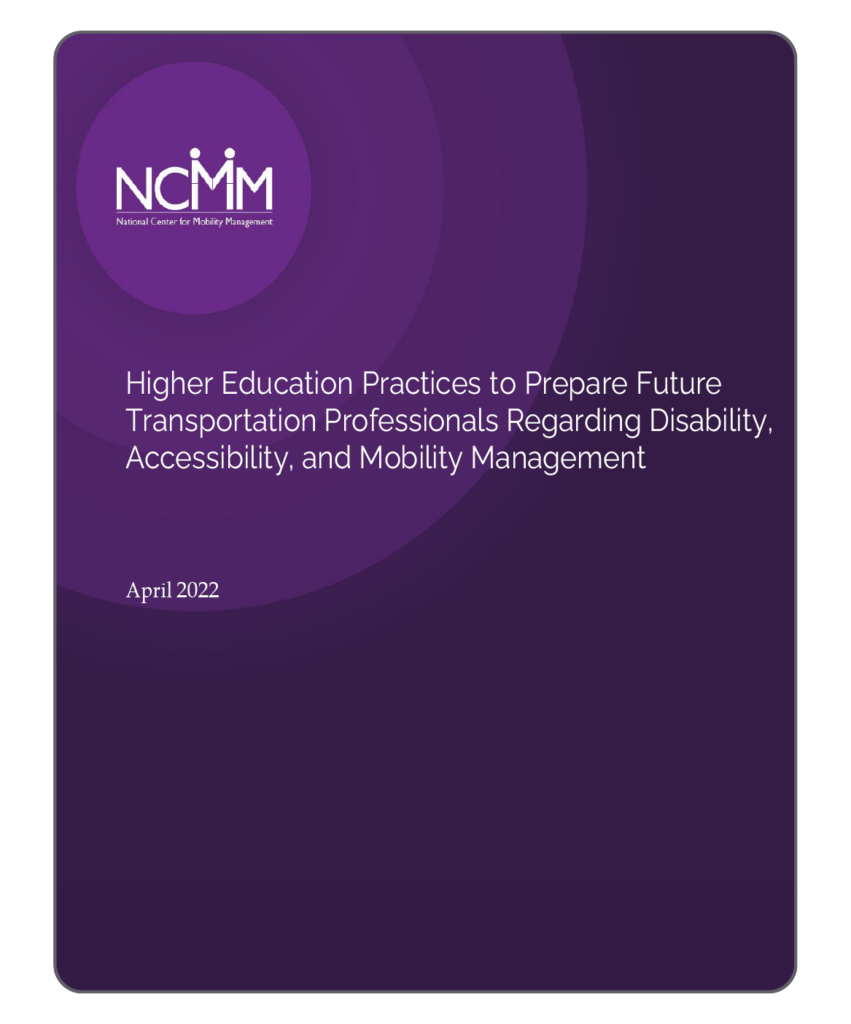
Higher Education Practices to Prepare Future Transportation Professionals Regarding Disability, Accessibility, and Mobility Management
This National Center for Mobility Management (NCMM) Information Brief provides the results of a NCMM study regarding mobility management, disability, and accessibility content in higher education preparation programs. This brief offers recommendations regarding how to integrate such content, as well as information on the recruitment and retention of individuals with disabilities in the transportation industry.
Please click the link below to view NCMM’s Mobility Management in Practice Series; this brief is listed among several 2022 publications.
National Center for Mobility Management (NCMM)
April 2022
TOPICS: Community Engagement , Hiring and Recruitment , Retention , Training
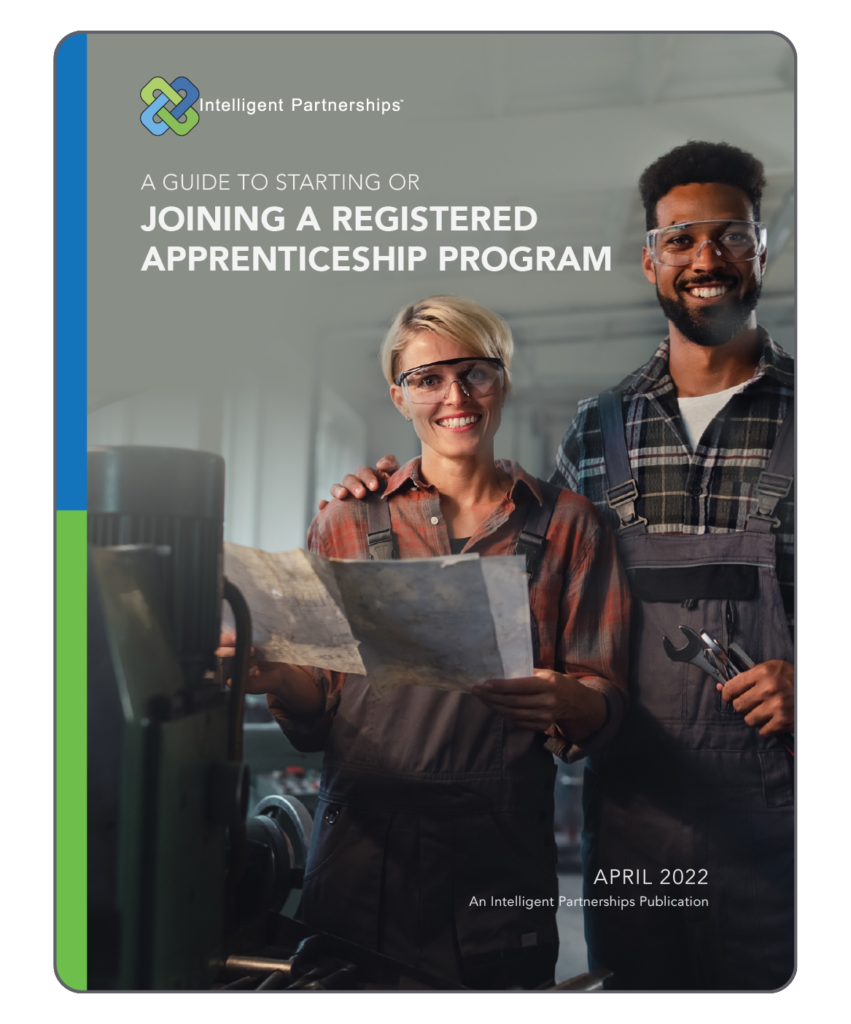
A Guide to Starting or Joining a Registered Apprenticeship Program
This publication provides an overview of registered apprenticeship, the benefits of registered apprenticeships to the employer, and the basic steps to get started.
You can also consult with your state office on registered apprenticeship for technical assistance and support for questions on the apprenticeship model, guidance on each phase of developing a program, connections to training providers, and advice on available funding sources to support apprenticeships: https://www.apprenticeship.gov/about-us/state-offices
Intelligent Partnerships
April 2022
TOPICS: Apprenticeship , Career Pathways , Community Engagement , Policy and Planning , Training
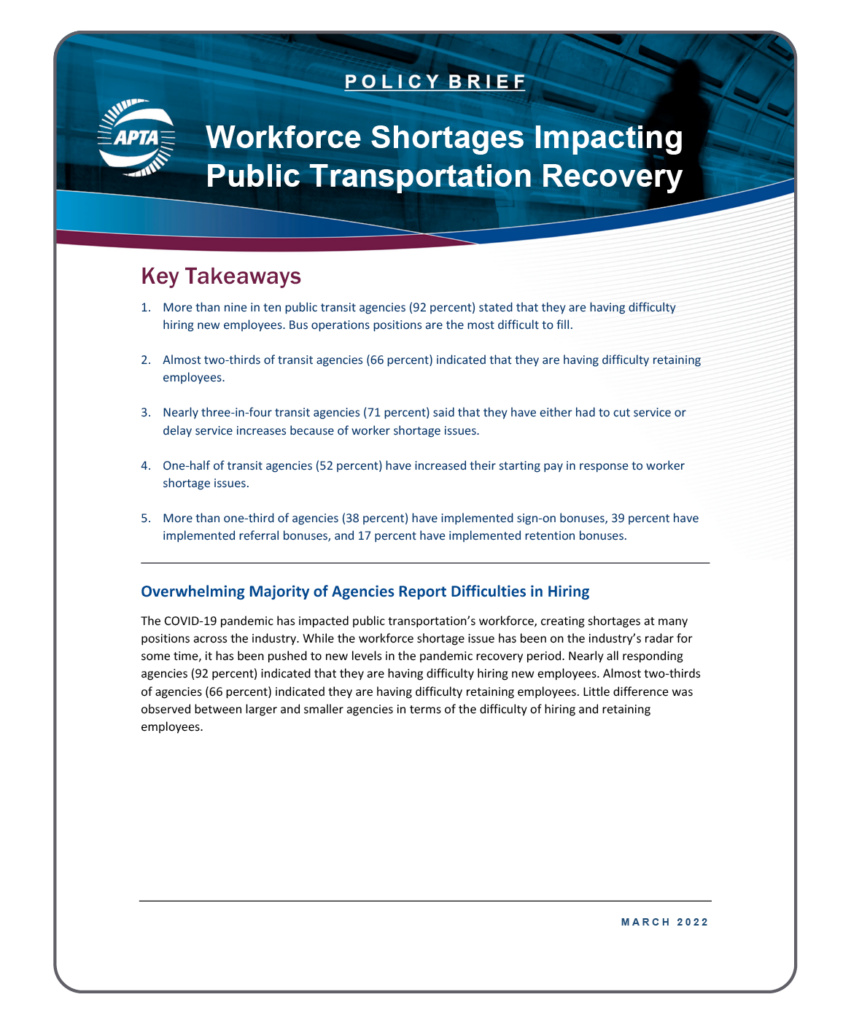
Workforce Shortages Impacting Public Transportation Recovery
This policy brief summarizes results from a survey the American Public Transportation Association (APTA) conducted with transit agencies in early 2022. The majority of responding agencies reported difficulties with hiring, with bus operator recruitment being the biggest challenge.
American Public Transportation Association
March 2022
TOPICS: Hiring and Recruitment , Workforce Shortage
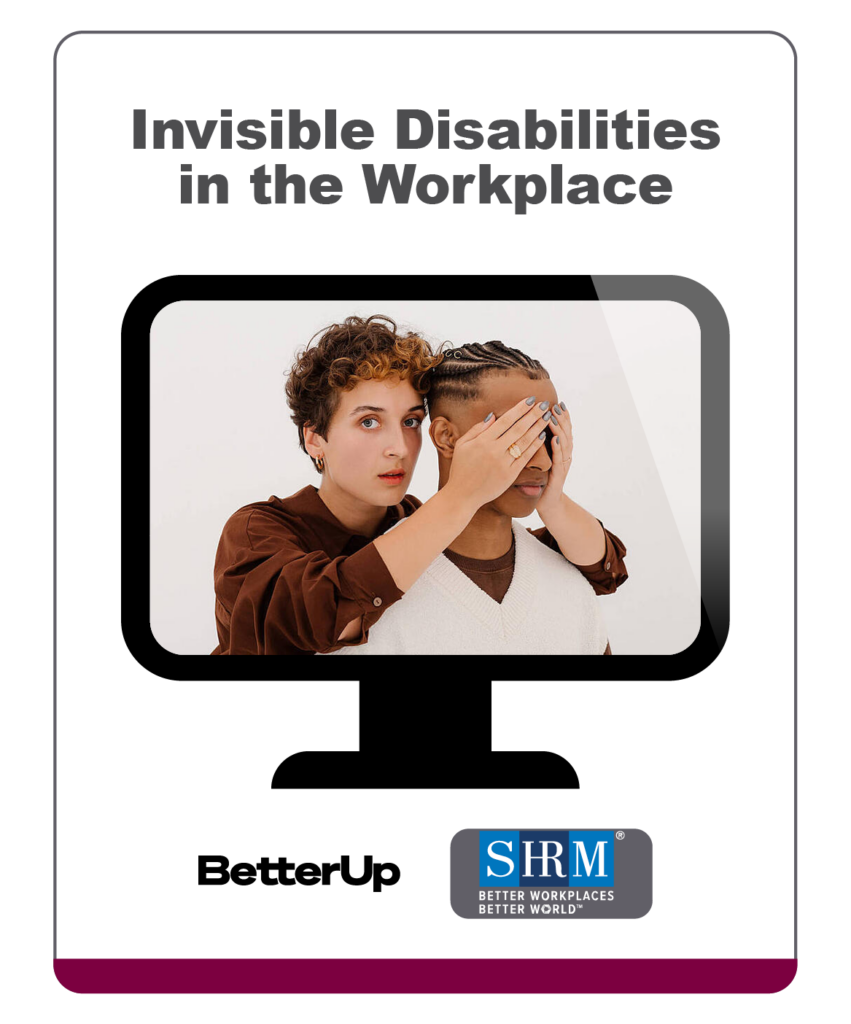
Invisible Disabilities in the Workplace
These two resources provide insight for employers into what “invisible” or “hidden” disabilities are, how to provide opportunities for employees to voluntarily disclose them, and how to support individuals with such disabilities to be successful in the workplace.
BetterUp; SHRM
February 2022
TOPICS: Community Engagement , Hiring and Recruitment , Retention
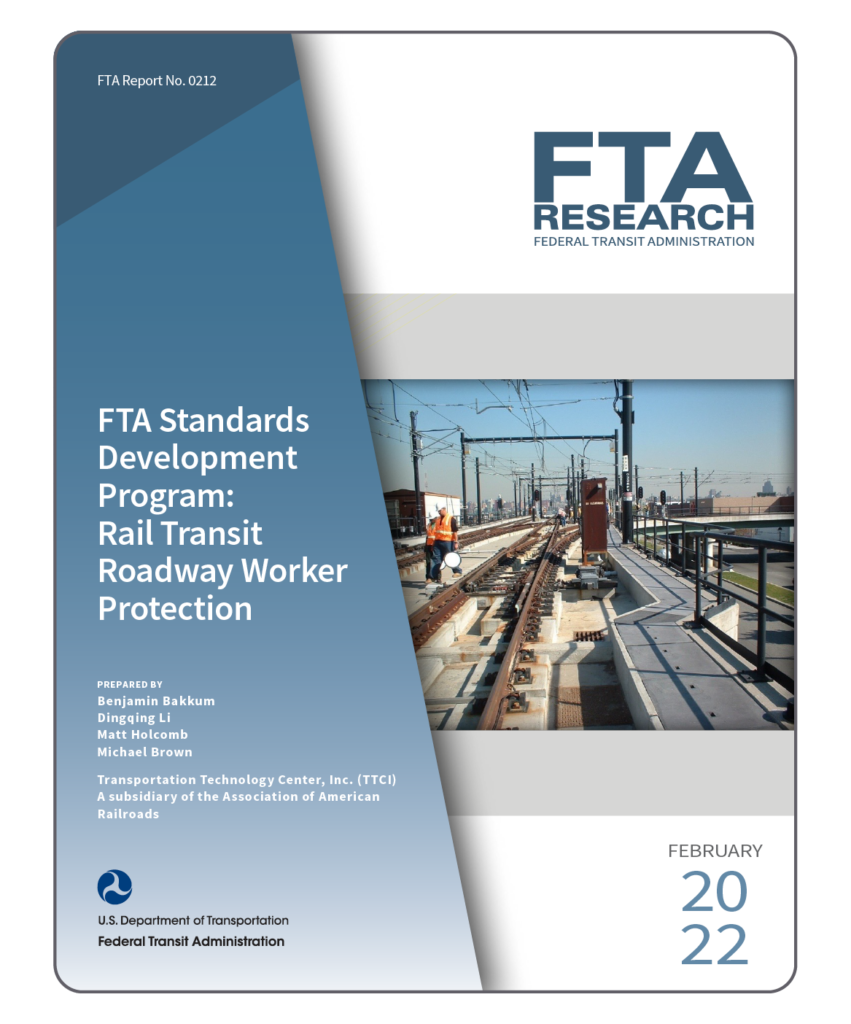
FTA Standards Development Program: Rail Transit Roadway Worker Protection
This report reviews existing standards and best practices and develops use cases, a risk assessment matrix, and high-level concepts of operations (CONOPS) for Rail Transit Roadway Worker Protection (RWP). The project evaluates current industry practices and technologies in use for roadway worker protection and conducts a risk/hazard analysis of current practices using an industry-representative survey.
Federal Transit Administration
February 2022
TOPICS: Policy and Planning , Safety and Health
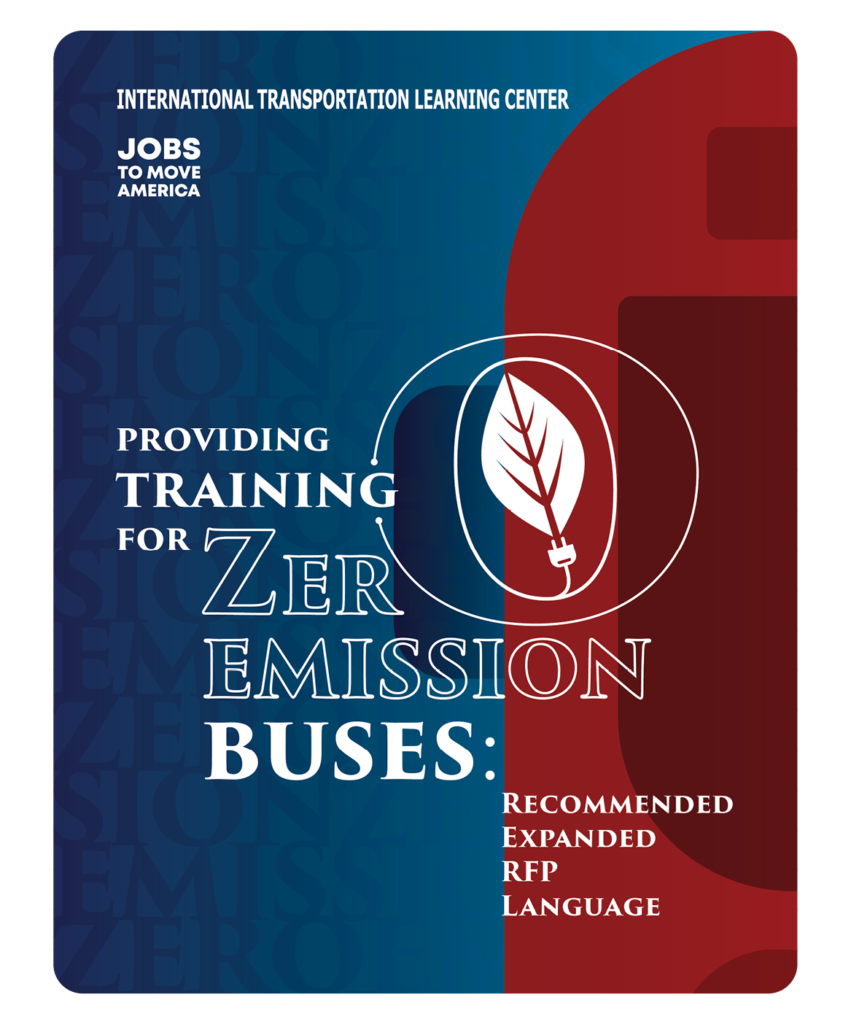
Providing Training for Zero Emission Buses: Recommended Expanded RFP Language
This document includes recommended language for agencies to build robust training procurement into their ZEB Request for Proposals. It is intended to be used as a starting point for agencies to tailor their training procurement to suit their specific needs.
International Transportation Learning Center; Jobs to Move America
February 2022
TOPICS: Low- or No-Emission , Procurement , Training
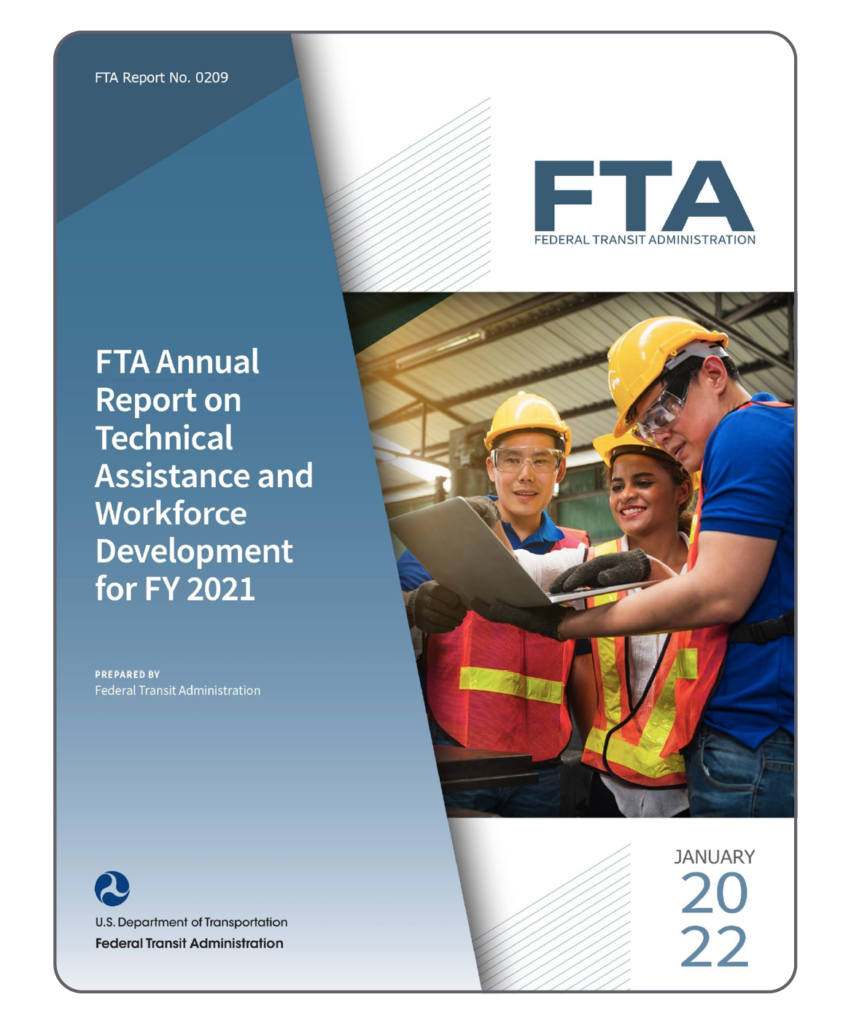
FTA Annual Report on Technical Assistance and Workforce Development for FY 2021
This statutorily required annual report provides information on FTA’s Technical Assistance and Workforce Development Program (49 U.S.C. § 5314), including technical assistance, workforce development, standards, human resources, and training projects active in Fiscal Year 2021. The report also describes FTA’s process for making upcoming allocations for FY 2022.
Federal Transit Administration
January 2022
TOPICS: Policy and Planning
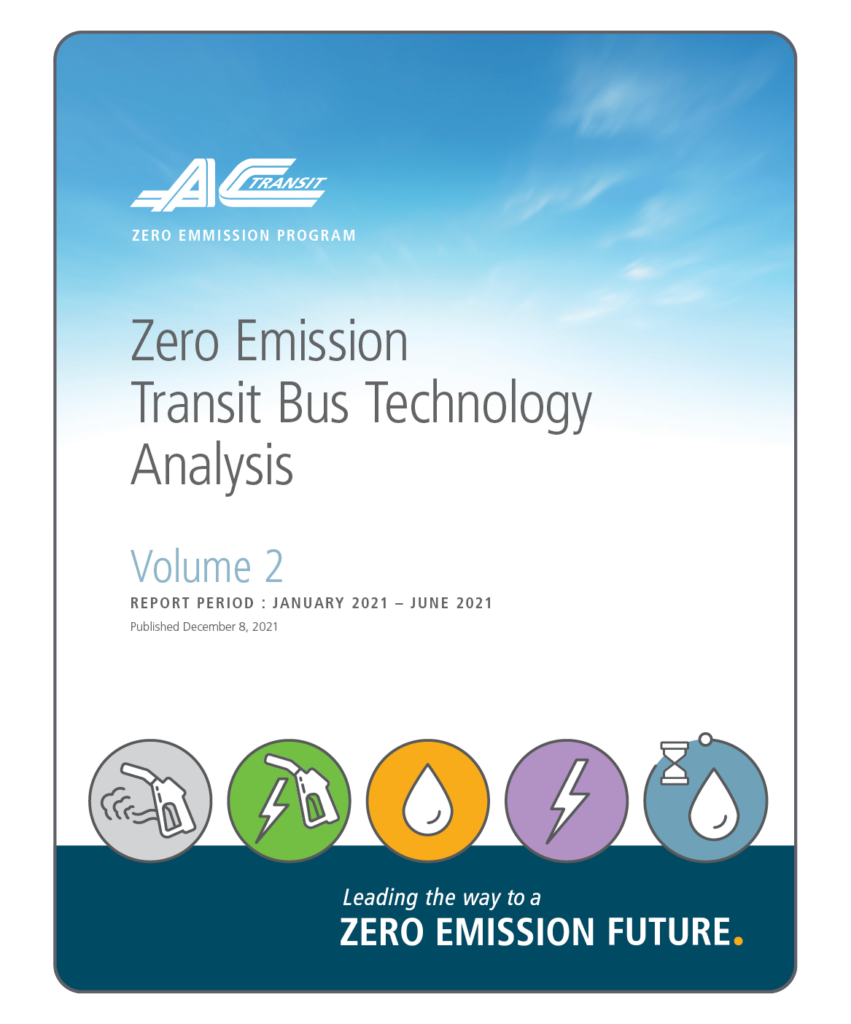
Zero Emission Transit Bus Technology Analysis Volume 2
This report, Volume 2, is the second edition of the Zero Emission Transit Bus Technology Analysis (ZETBTA) which includes results from the fuel-cell electric bus (FCEB), battery electric bus (BEB), diesel hybrid bus, and conventional diesel bus technologies control fleet. It integrates lessons learned and best practices gleaned from AC Transit’s extensive experience in deploying ZEB technologies, including developing innovative workforce training programs, data integration and management, and transit deployment viability.
AC Transit
December 2021
TOPICS: Low- or No-Emission , Procurement , Training
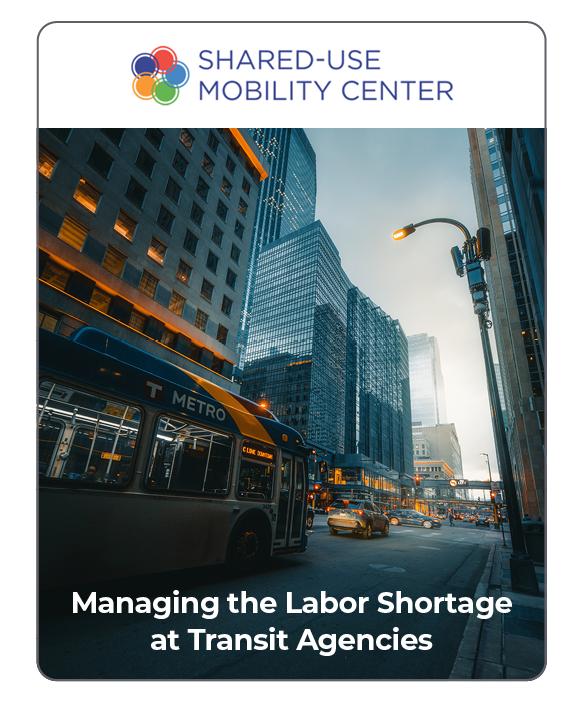
Managing the Labor Shortage at Transit Agencies
This article examines labor shortages in the public transit industry. It focuses on the following points:
- Transit agencies across the United States are experiencing a significant shortage in labor, that the COVID-19 pandemic has worsened. This shortage is negatively impacting the services they provide to the public.
- Employees at transit agencies have a significantly higher median age than employees in other industries.
- Transit agencies should use data and information to consider recruiting and retaining employees for the long term.
Shared-Use Mobility Center
November 2021
TOPICS: Hiring and Recruitment , Retention , Workforce Shortage
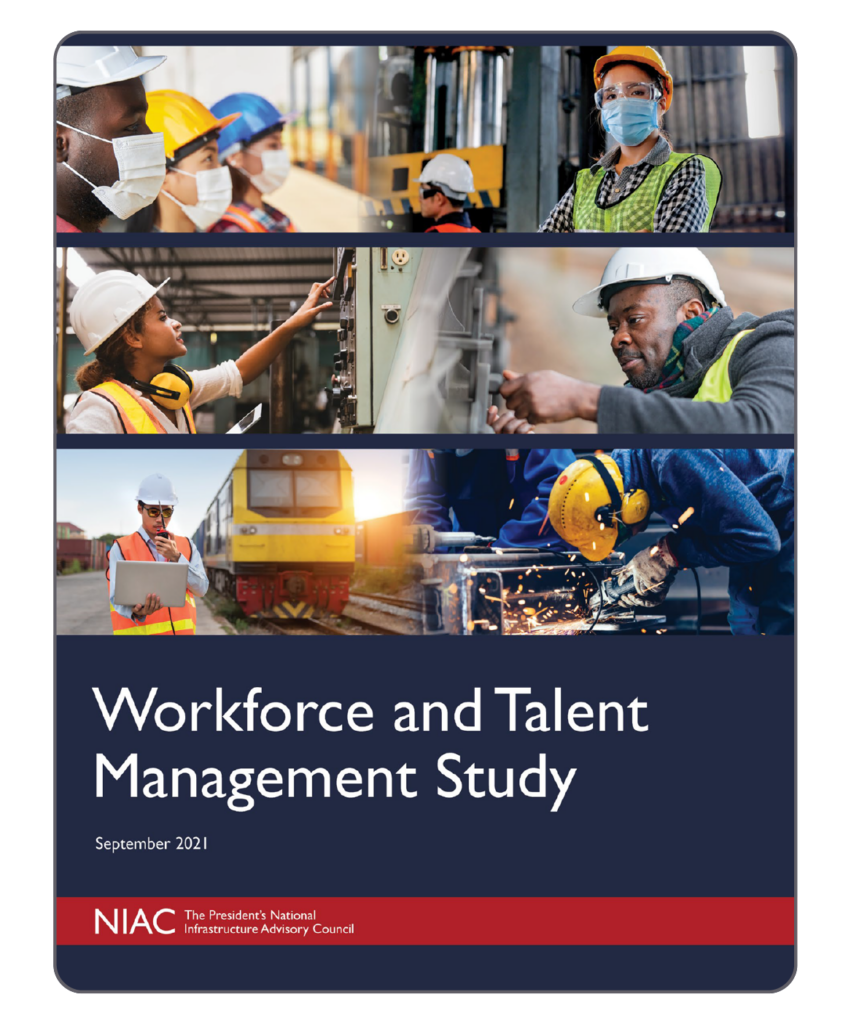
Workforce and Talent Management Study
This study provides an in-depth examination of the U.S workforce development system and offers nine recommendations to inform future policy development and keep the critical infrastructure workforce nimble in the face of change. The recommendations are guided by the principle that all workers must have access to the education, training, and resources necessary to begin and advance in critical infrastructure careers
National Infrastructure Advisory Council
September 2021
The Education/Career Readiness Continuum graphic on page 11 of the report might be useful to agencies considering comprehensive workforce development plans.

Rural Apprenticeships for Young People: Challenges and Strategies for Success
This report evaluates four rural registered apprenticeship programs in Maine, Arizona, Missouri, and Mississippi and identifies the key strategies in their approaches. It begins with defining rural apprenticeship programs and exploring their obstacles and benefits, and then discusses each of the four cases and concludes with recommendations for decisionmakers seeking to expand apprenticeship access in rural communities.
Urban Institute
August 2021
TOPICS: Apprenticeship , Community Engagement , Policy and Planning
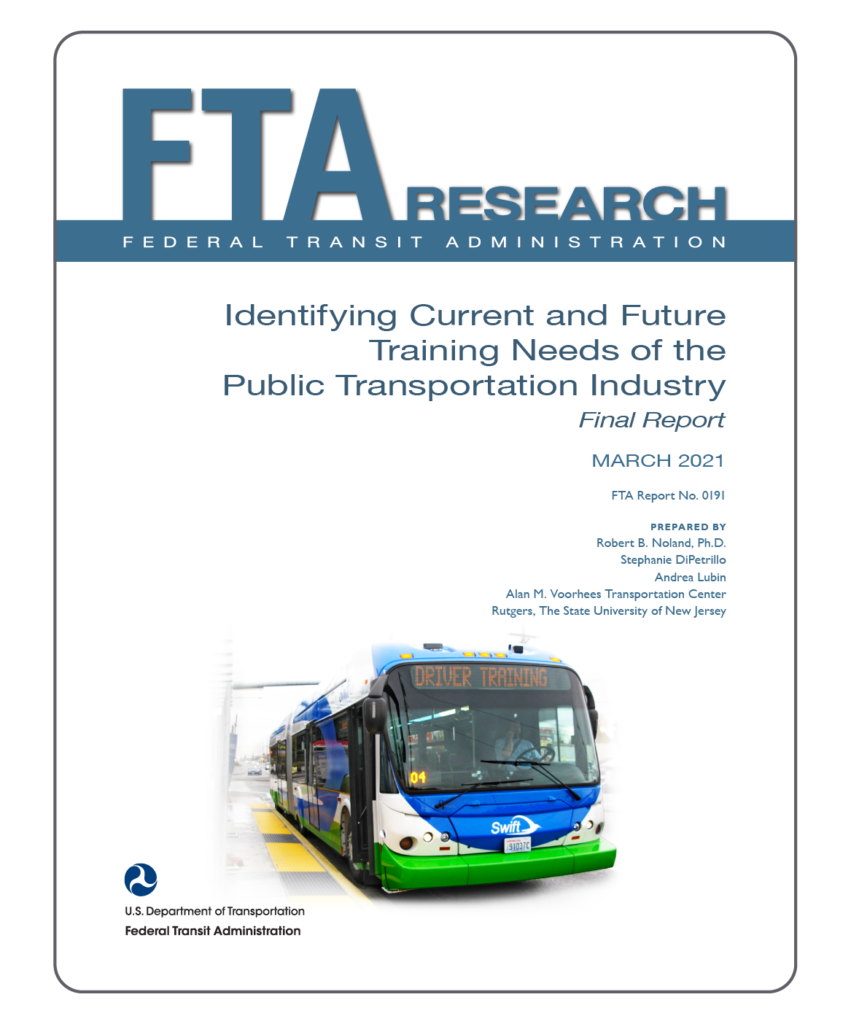
Identifying Current and Future Training Needs of the Public Transportation Industry
This report documents a study commissioned by the National Transit Institute (NTI) as part of its work to address training needs. The study investigates skills gaps among the workforce of the U.S. public transportation industry, identifies strategies to address those gaps, and explores approaches to more successfully recruit and retain the full spectrum of the transit workforce, from frontline to technical to professional staff.
Federal Transit Administration; National Transit Institute
June 2021
TOPICS: Hiring and Recruitment , Policy and Planning , Retention
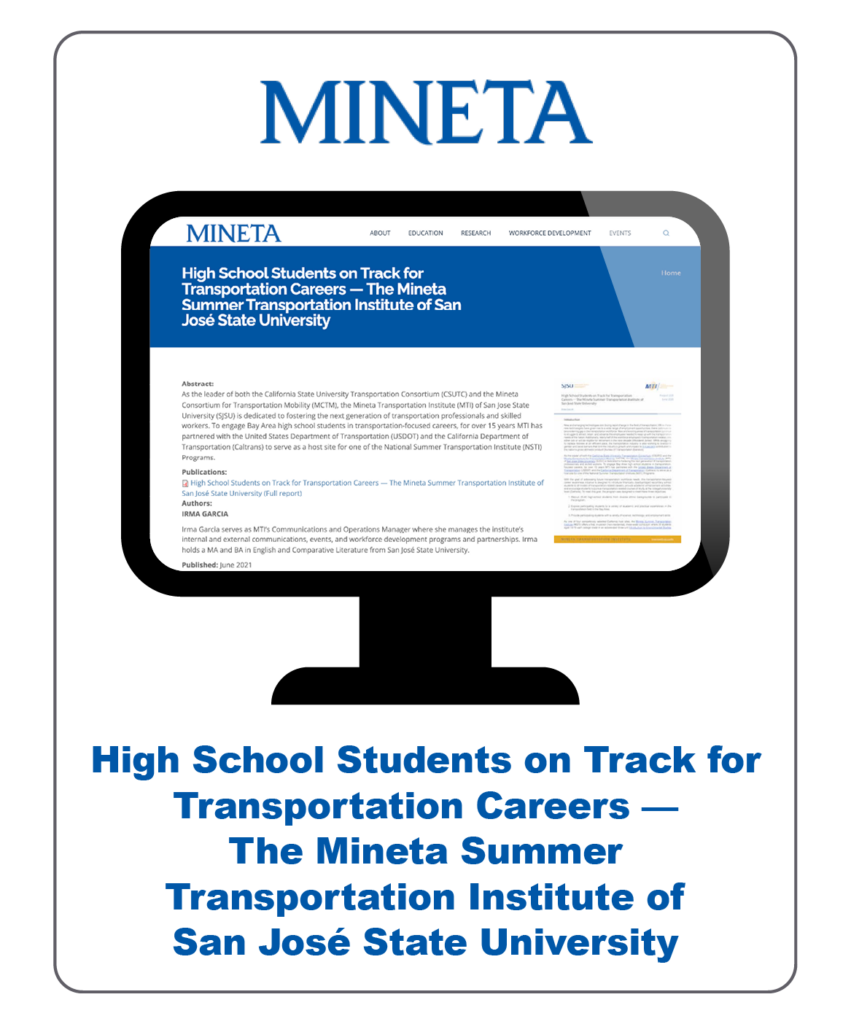
High School Students on Track for Transportation Careers
Mineta Transportation Institute
June 2021
TOPICS: Career Pathways , Community Engagement , Policy and Planning
This report provides an overview of the Mineta Summer Transportation Institute, one of the National Summer Transportation Institute (NSTI) Programs, which recruits high-school students, exposes them to a variety of academic and practical experiences in the transportation field in the Bay Area, and provides participating students with a variety of science, technology, and employment skills. The report shares program history, demographics, activities, etc.
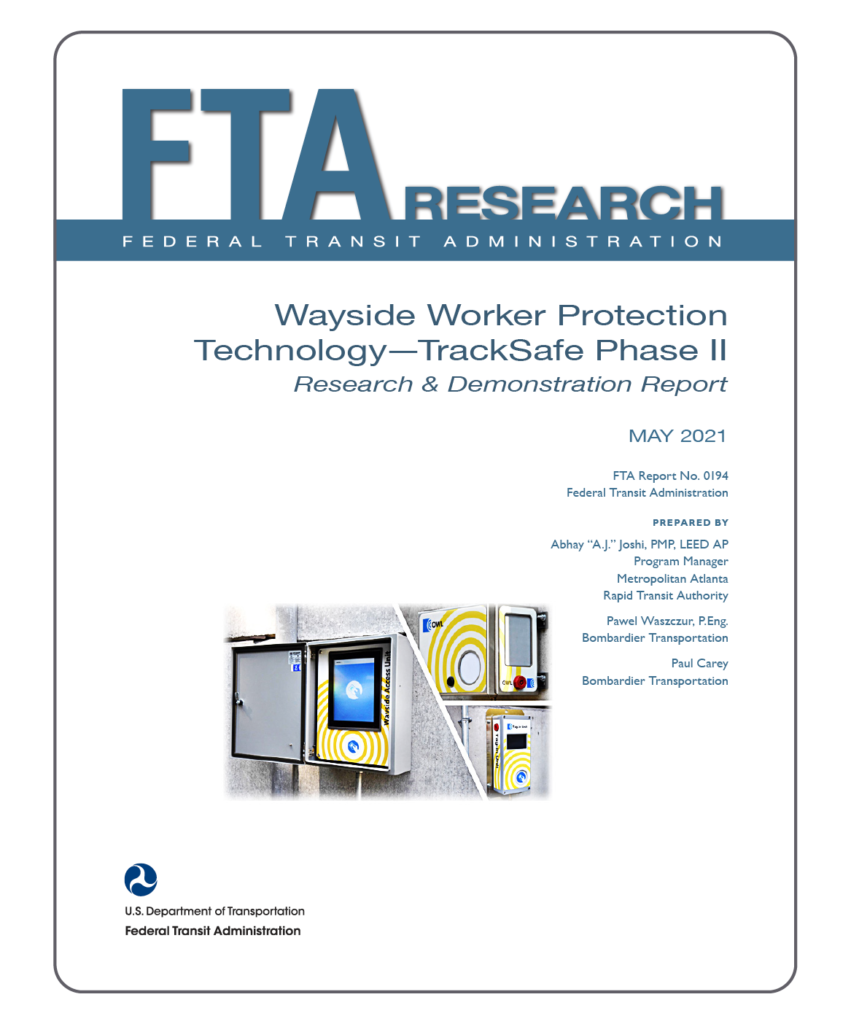
Wayside Worker Protection Technology—TrackSafe Phase II Research & Demonstration (Report 0194)
This report outlines research and demonstration of a roadway worker protection (RWP) warning technology developed by Bombardier Rail called TrackSafe. The system was installed at the Metropolitan Atlanta Rapid Transit Authority (MARTA) and was designed to reduce the hazards of working within a transit rail right-of-way (ROW).
Federal Transit Administration
May 2021
TOPICS: Policy and Planning , Safety and Health
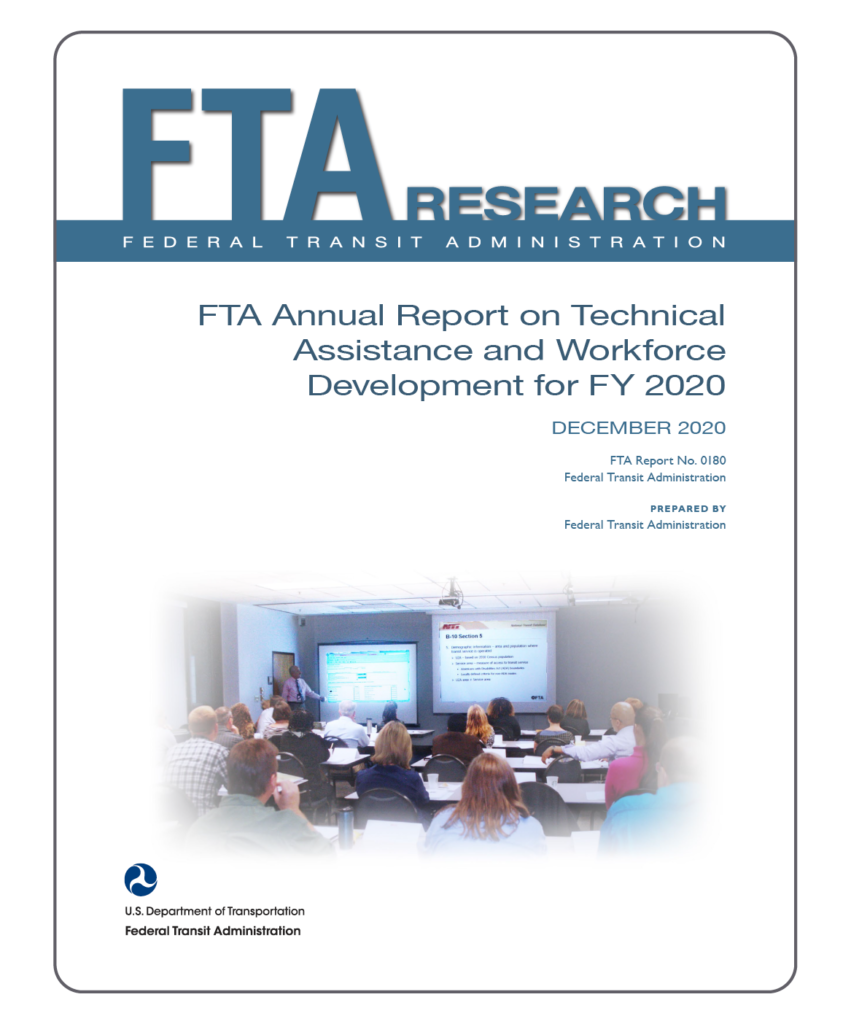
FTA Annual Report on Technical Assistance and Workforce Development for FY 2020
This statutorily required annual report provides information on FTA’s Technical Assistance and Workforce Development Program (49 U.S.C. § 5314). It provides information on technical assistance, workforce development, standards, human resources, and training projects active in FY 2020. The report also includes information on FTA’s process for making upcoming allocations for FY 2021.
Federal Transit Administration
May 2021
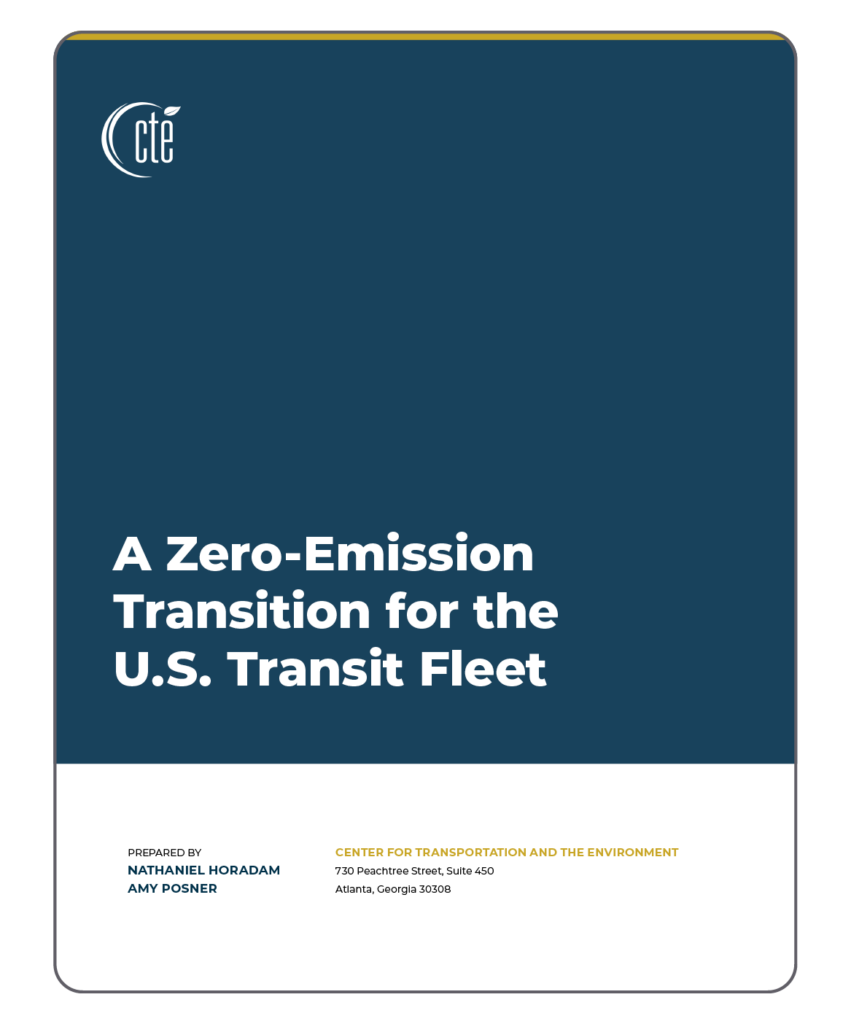
A Zero-Emission Transition for the U.S. Transit Fleet
This report offers a roadmap for federal lawmakers in support of making a complete transition to zero-emission vehicles in transit, including an accounting of estimated agency costs, key assumptions underpinning those figures, acknowledgement of limitations, and workforce development considerations.
Center for Transportation and the Environment
May 2021
TOPICS: Low- or No-Emission , Policy and Planning , Procurement , Training

The Transit Workforce: A Path Forward
This plan was developed collaboratively between the Delaware Valley Regional Planning Commission and Temple University as a guide to addressing the systematic challenges facing Greater Philadelphia’s primary transit agencies: SEPTA, PATCO, and NJ Transit. This plan is intended as a guide for possible opportunities for the transit agencies to address identified challenges and themes and prioritized by participating stakeholders as areas that need to be addressed in the short term to ensure long-term success: pipeline development, pathways, and processes.
Delaware Valley Regional Planning Commission; Temple University
May 2021
TOPICS: Career Pathways , Policy and Planning , Workforce Shortage
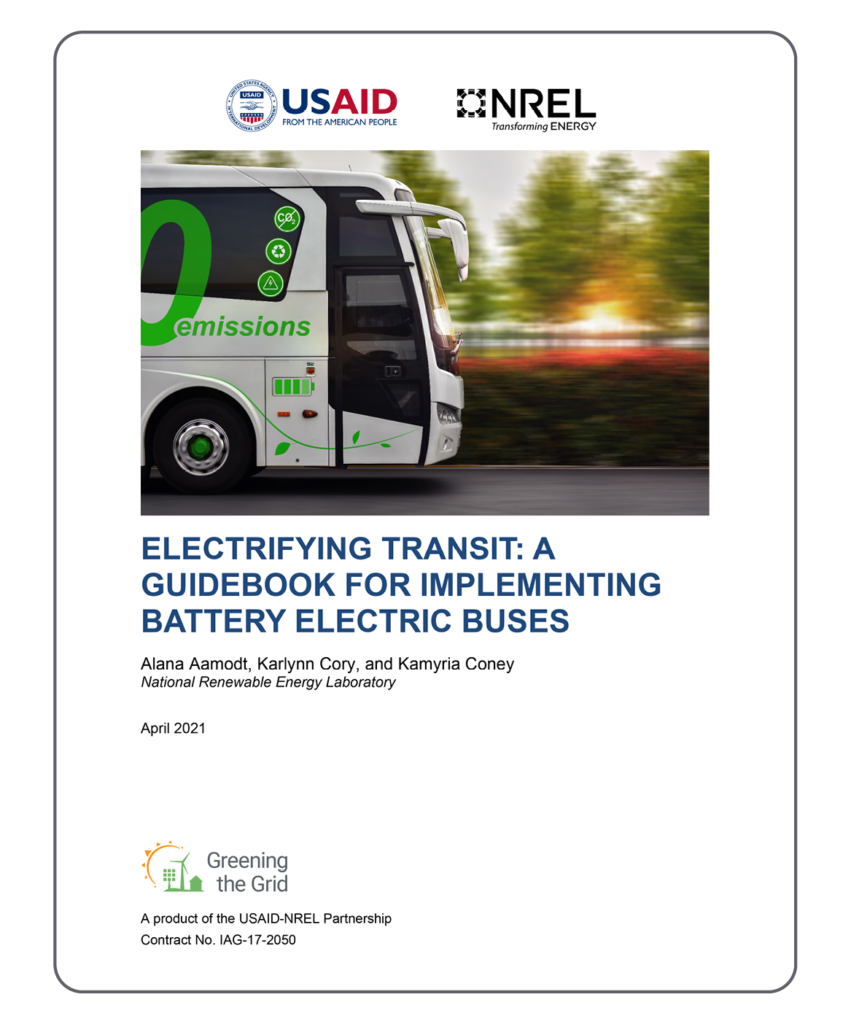
Electrifying Transit: A Guidebook for Implementing Battery Electric Buses
This guidebook assists stakeholders with interest in deploying battery-electric buses by describing decisions and considerations required for successful BEB implementation. It includes information about the benefits and barriers of BEBs, BEB basics, charging infrastructure, operation and maintenance, and costs.
United States Agency for International Development; National Renewable Energy Laboratory
April 2021
TOPICS: Low- or No-Emission , Procurement
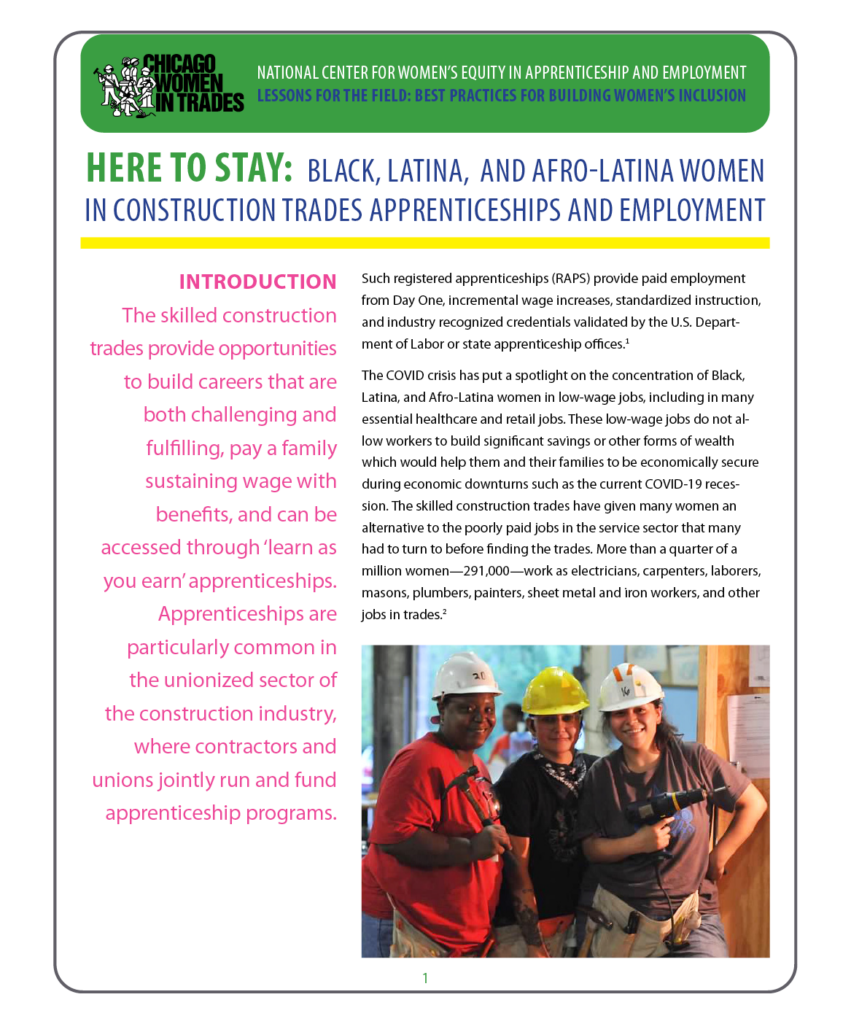
Here to Stay: Black, Latina, and Afro-Latina Women in Construction Trades Apprenticeships and Employment
Chicago Women in the Trades; Institute for Women's Policy Research
March 2021
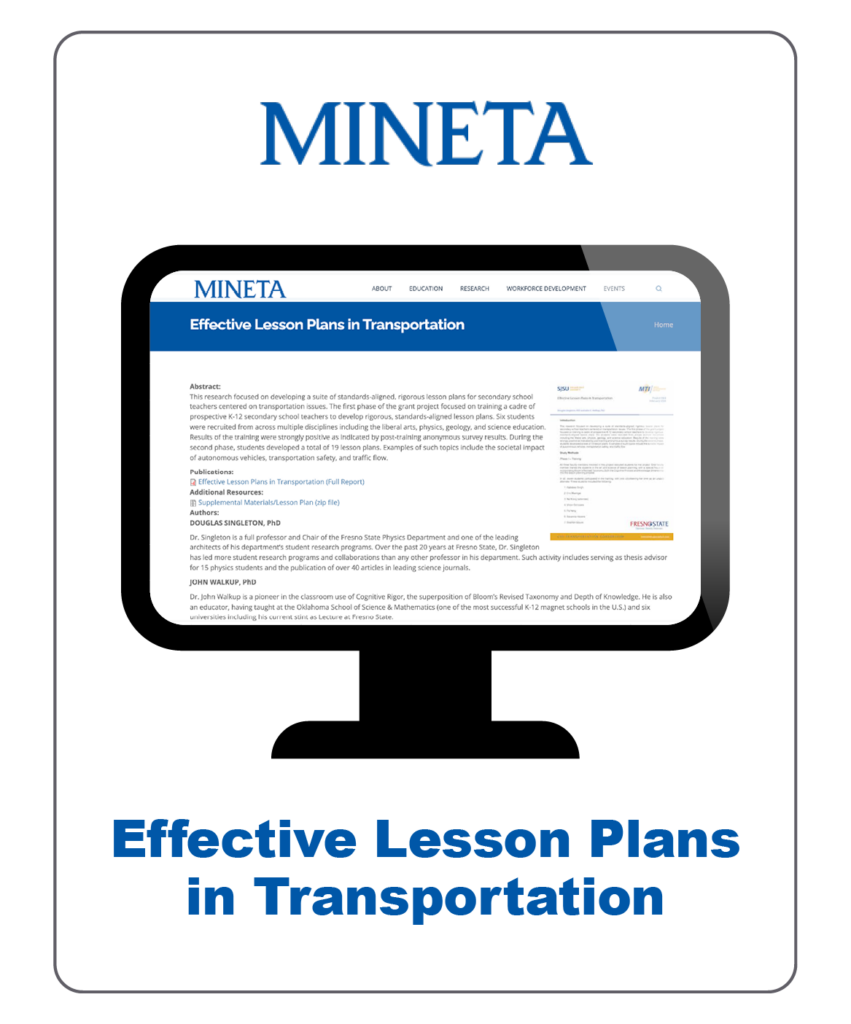
Effective Lesson Plans in Transportation
This research focuses on developing a suite of standards-aligned, rigorous lesson plans for secondary school teachers centered on transportation issues, such as the societal impact of autonomous vehicles, transportation safety, and traffic flow. It includes a report and lesson plans.
Mineta Transportation Institute
February 2021
TOPICS: Career Pathways , Policy and Planning
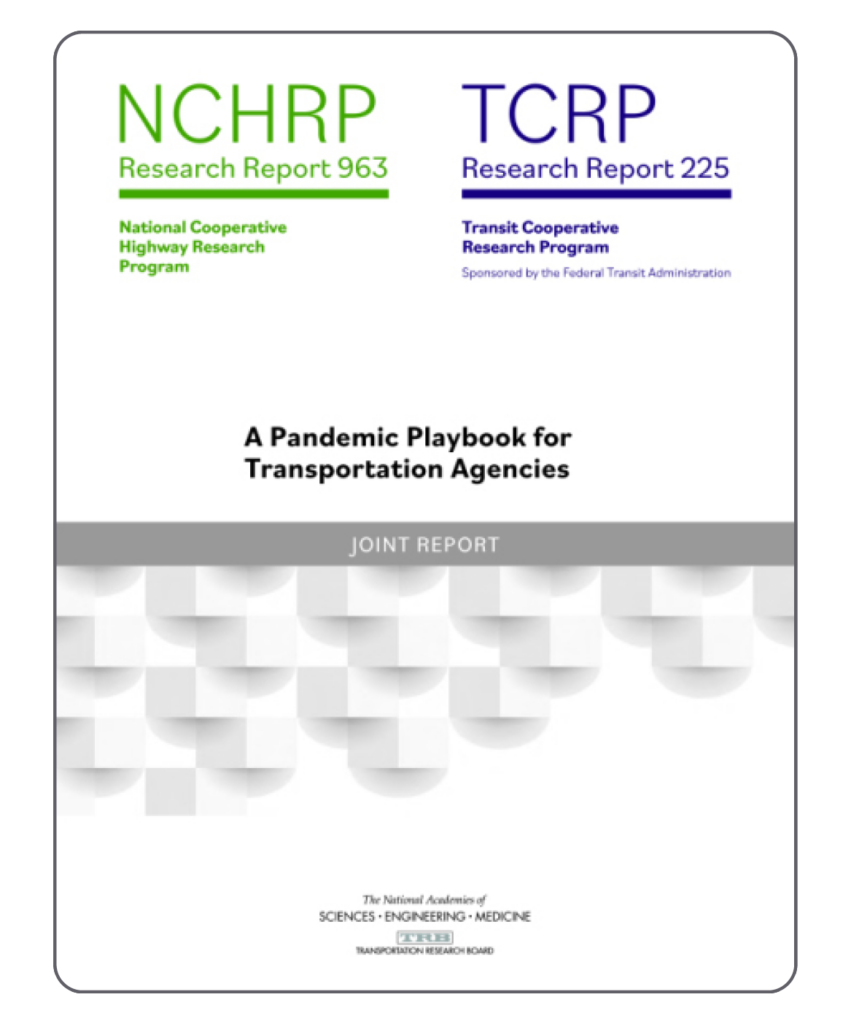
A Pandemic Playbook for Transportation Agencies
TRB’s National Cooperative Highway Research Program and Transit Cooperative Research Program have jointly issued NCHRP Research Report 963/TCRP Research Report 225: A Pandemic Playbook for Transportation Agencies, which was created to improve transportation agency responses to a pandemic.
The Playbook concentrates on what needs to be done, when and by whom. It briefly addresses planning for a pandemic, a topic addressed in greater depth in NCHRP Report 769: A Guide for Public Transportation Pandemic Planning and Response. It summarizes effective practices currently used by transportation agencies based on interviews with state departments of transportation and transit agency leaders and operational personnel, supplemented with national and international research results.
National Cooperative Highway Research Program and Transit Cooperative Research Program
January 2021
TOPICS: Policy and Planning , Safety and Health , Training
Contributor(s): National Academies of Sciences, Engineering, and Medicine; Transportation Research Board; National Cooperative Highway Research Program; Transit Cooperative Research Program; WSP USA Solutions – Deborah Matherly; Patricia Bye; Janet Benini
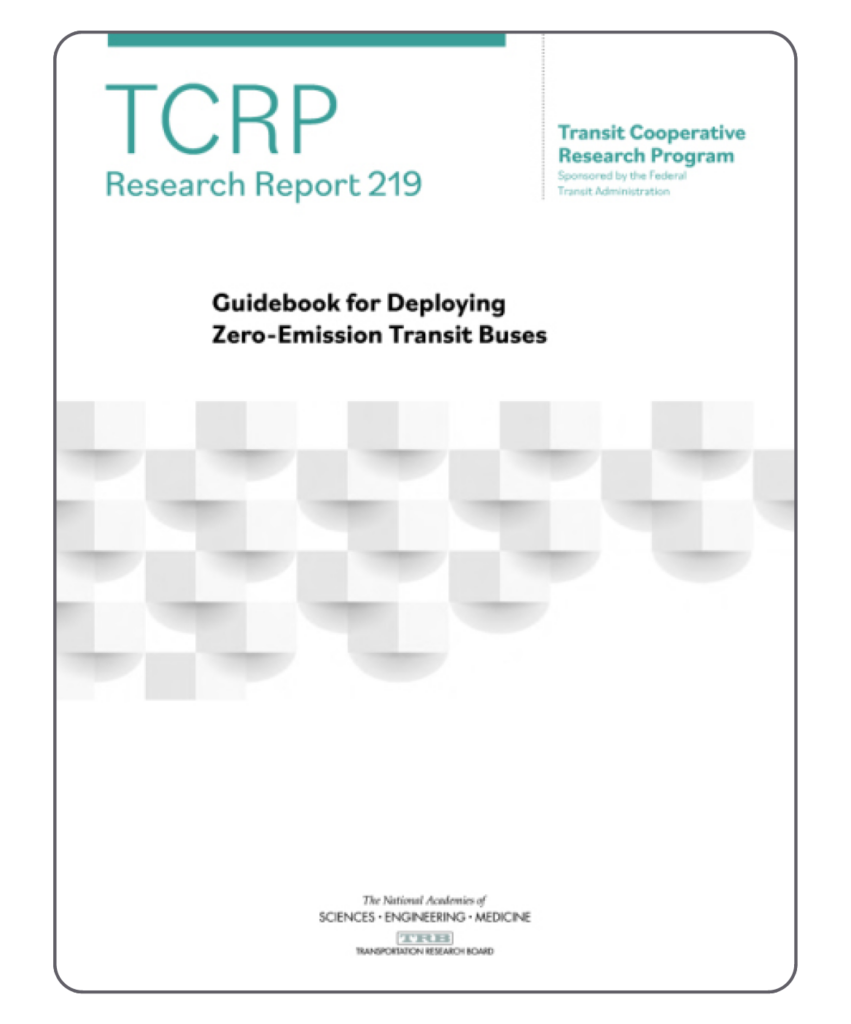
Guidebook for Deploying Zero-Emission Transit Buses
The TCRP Research Report 219: Guidebook for Deploying Zero-Emission Transit Buses is designed to provide transit agencies with information on current best practices for ZEB deployments and lessons learned from previous deployments, industry experts, and available industry resources.
Transportation Cooperative Research Program
January 2021
TOPICS: Low- or No-Emission , Policy and Planning , Procurement
Contributor(s): National Academies of Sciences, Engineering, and Medicine; Transportation Research Board; Transit Cooperative Research Program; Meredith Linscott; Amy Posner
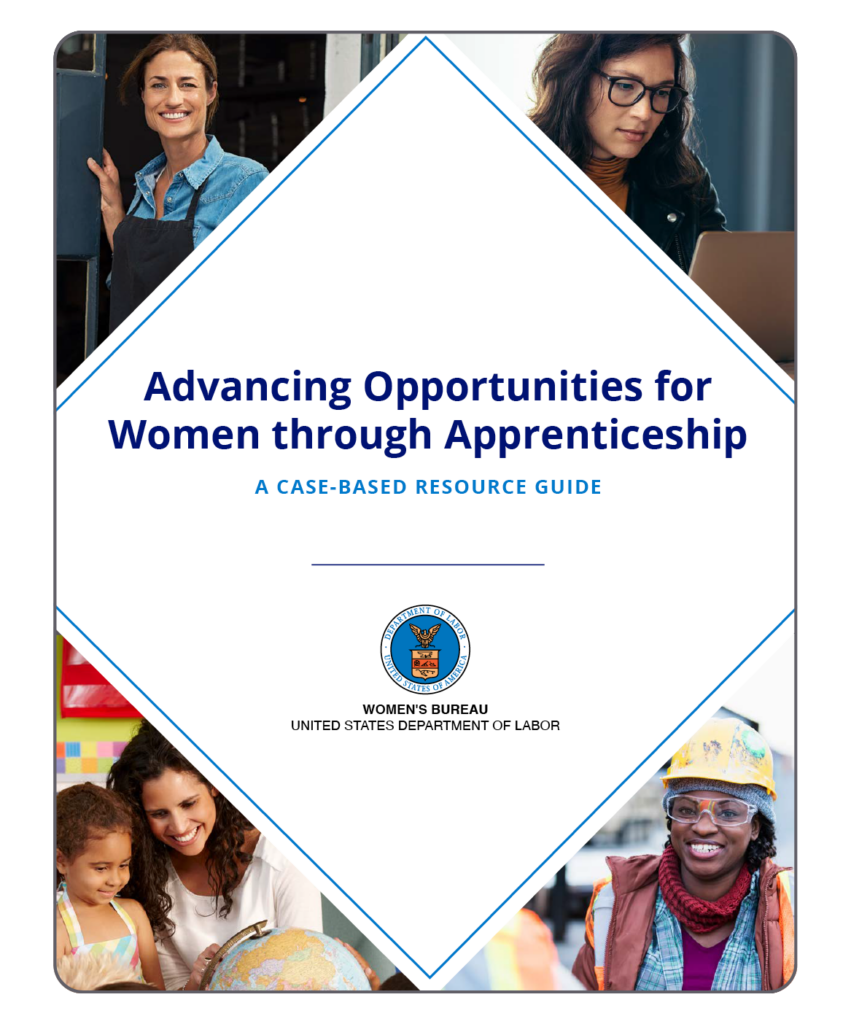
Advancing Opportunities for Women through Apprenticeship: A Case-Based Resource Guide
The Advancing Opportunities for Women through Apprenticeship case-based resource guide provides a framework for meaningful expansion of apprenticeship programs for women. The guide includes case studies on four high-quality pre-apprenticeship and apprenticeship programs in a range of industry sectors.
Department of Labor
TOPICS: Apprenticeship , Career Pathways , Community Engagement , Mentorship , Policy and Planning , Retention
The case studies were developed through on-site visits to the program locations; interviews with program staff, partners, and current and former participants; and a review of program materials and data. They provide information and insights related to partnership development, program design, and outcomes that outline how pre-apprenticeship and apprenticeship programs can help women access family-sustaining jobs and quality career pathways. The guide identifies common strategies across the four programs to help others learn how to create programs that successfully open pathways to in-demand jobs for women through apprenticeships.

Improving the Health and Safety of Transit Workers with Corresponding Impacts on the Bottom Line
Transit Cooperative Research Board
December 2020
TOPICS: Safety and Health
Transit workers experience more health and safety problems than the general workforce, primarily as a result of a combination of physical demands, environmental factors, and stresses related to their jobs. In response, TCRP Research Report 217 focuses on the prevalence of these conditions, costs associated with these conditions, and statistical analysis of data on participation in and the results of health and wellness promotion programs.
Contributor(s): National Academies of Sciences, Engineering, and Medicine; Transportation Research Board; Transit Cooperative Research Program; Jennifer Stoloff, Frankie Clogston, Fred Bellemore, Cynthia Khan, Jeff Pongsiri, Timothy Beggs, Econometrica, Inc.; Xinge Wang, Karitsa Holdzkom, Transportation Learning Center
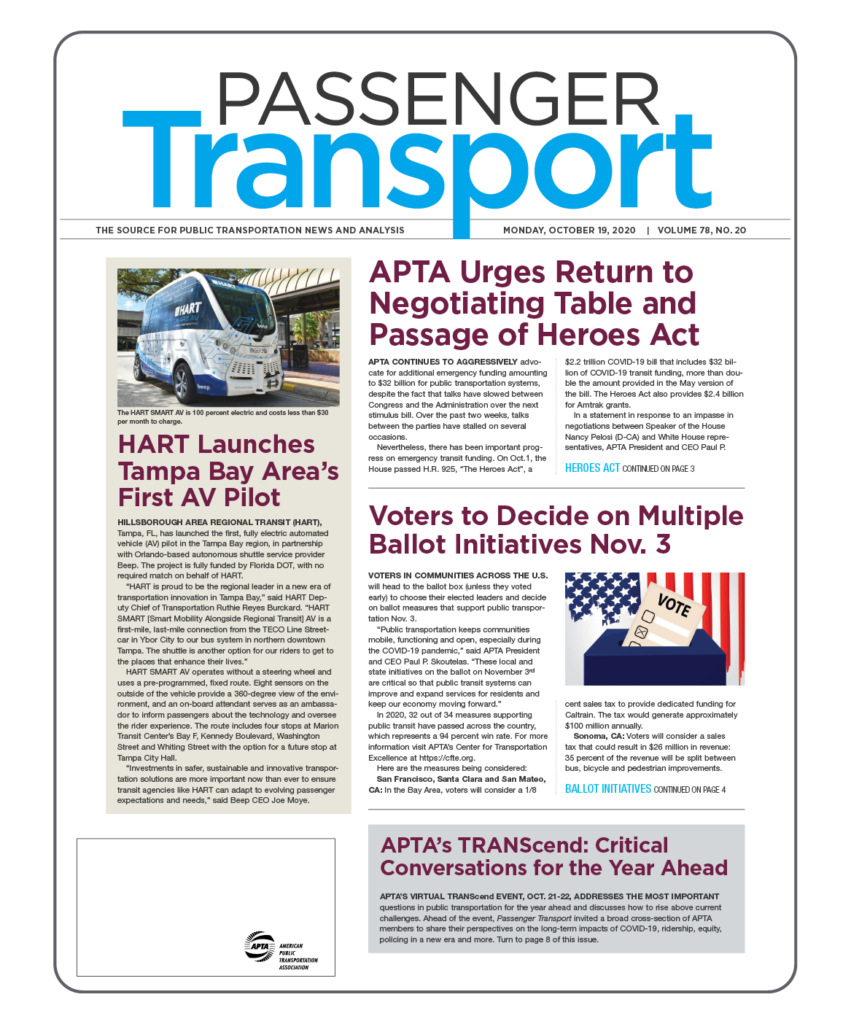
Transit Apprenticeship at Pierce Transit: From the Ground Up
This article in APTA’s Passenger Transport issue discusses the apprenticeship program at Pierce Transit, which is part of a transit apprenticeship initiative and has received technical assistance in structuring their apprenticeship program as well as financial assistance to reimburse some training costs.
American Public Transportation Association; International Transportation Learning Center
October 2020
TOPICS: Apprenticeship , Training
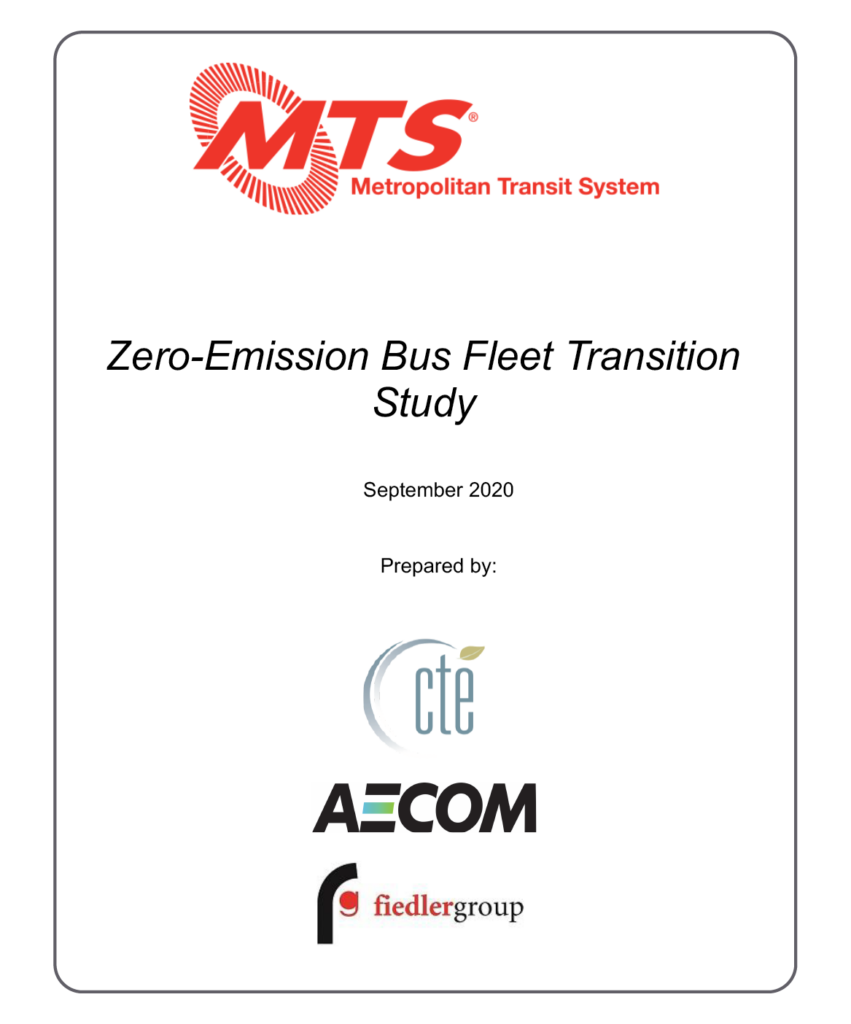
MTS Zero-Emission Bus Fleet Transition Study
This study, performed by the Center for Transportation and the Environment (CTE) for the San Diego Metropolitan Transit System (MTS), creates a plan for a 100% zero-emission fleet by 2040 to be in compliance with the Innovative Clean Transit (ICT) regulation enacted by the California Air Resources Board (CARB). The results of the study will be used to inform MTS Board members and educate MTS staff of estimated costs, benefits, constraints, and risks to guide future planning and decision making.
Center for Transportation and the Environment; AECOM; Fiedler Group
September 2020
TOPICS: Low- or No-Emission , Policy and Planning
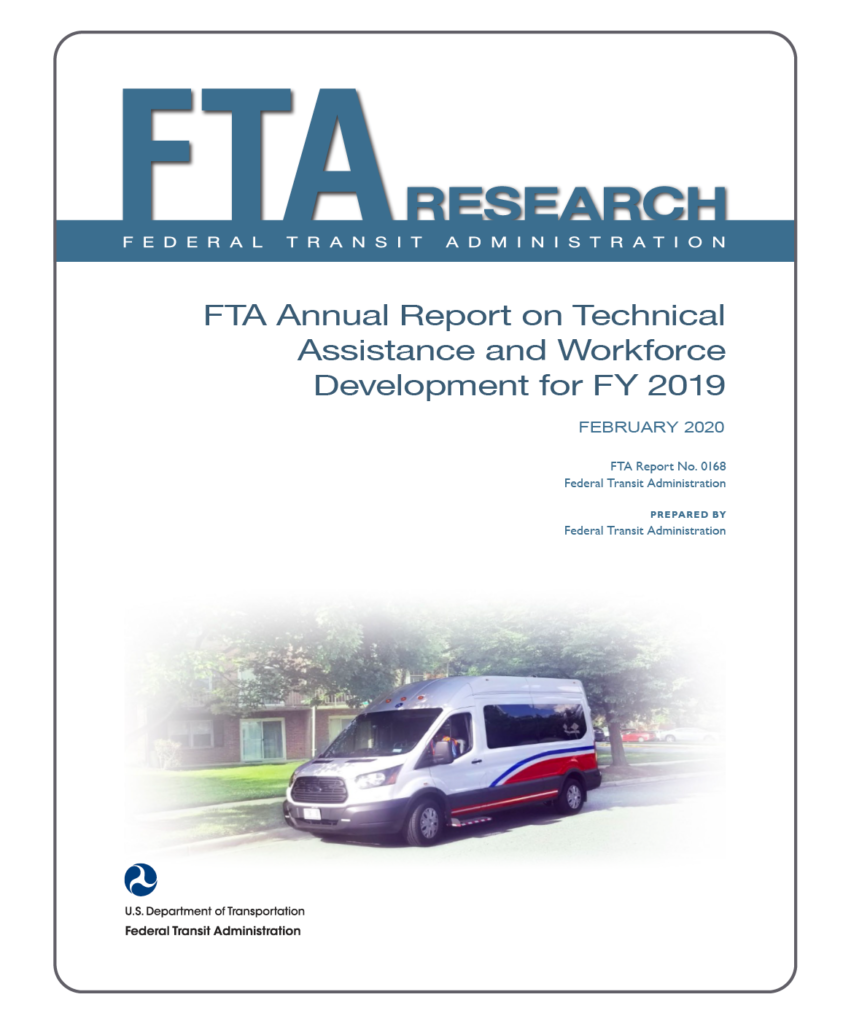
FTA Annual Report on Technical Assistance and Workforce Development for FY 2019
This statutorily required annual report provides information on FTA’s Technical Assistance and Workforce Development Program (49 U.S.C. § 5314). This annual report provides information on any technical assistance, workforce development, standards, human resources, and training projects active in Fiscal Year (FY) 2019.
Federal Transit Administration
July 2020
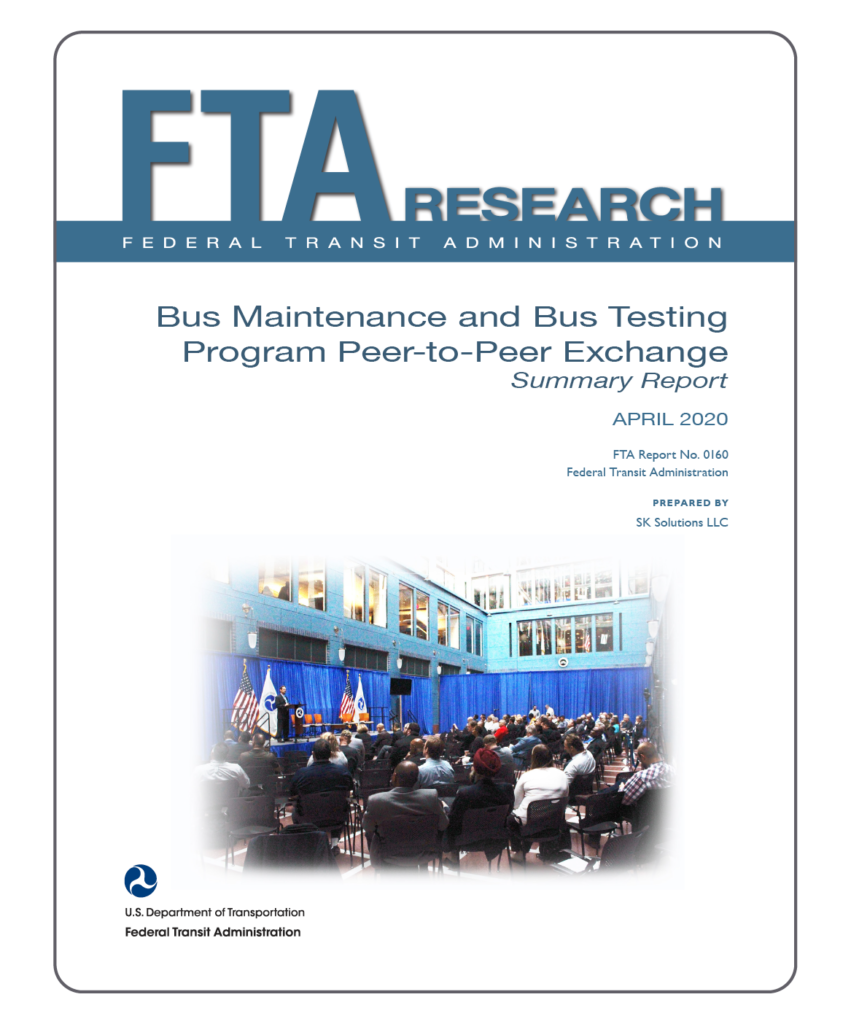
Bus Maintenance and Bus Testing Program Peer-to-Peer Exchange
This report presents a summary of the bus maintenance worker training peer exchange, hosted by the Federal Transit Administration (FTA). Significant shifts in the types of transit buses being procured (e.g., from traditional buses to alternative fuel/low- and no-emission buses) require new and different types of frontline worker training. Through the peer exchange, stakeholders, including industry representatives, shared knowledge about bus maintenance worker training and discussed best practices for developing the next generation of highly-skilled bus technicians.
Federal Transit Administration
May 2020
TOPICS: Hiring and Recruitment , Low- or No-Emission , Policy and Planning , Procurement , Training

What We Think We Learned: Transit Workforce Interview Themes
This report is a synopsis of the transit industry and workforce development interviews conducted in Greater Philadelphia from December 2019 to February 2020. The research team emphasized three distinct areas where the need for improvement should be elevated: Pipeline Development, Pathways, and Processes. While there are several ongoing successes within the transit industry, this document strives to focus on key identified gaps most conducive for joint problem-solving.
Delaware Valley Regional Planning Commission
March 2020
TOPICS: Apprenticeship , Career Pathways , Policy and Planning , Retention , Training
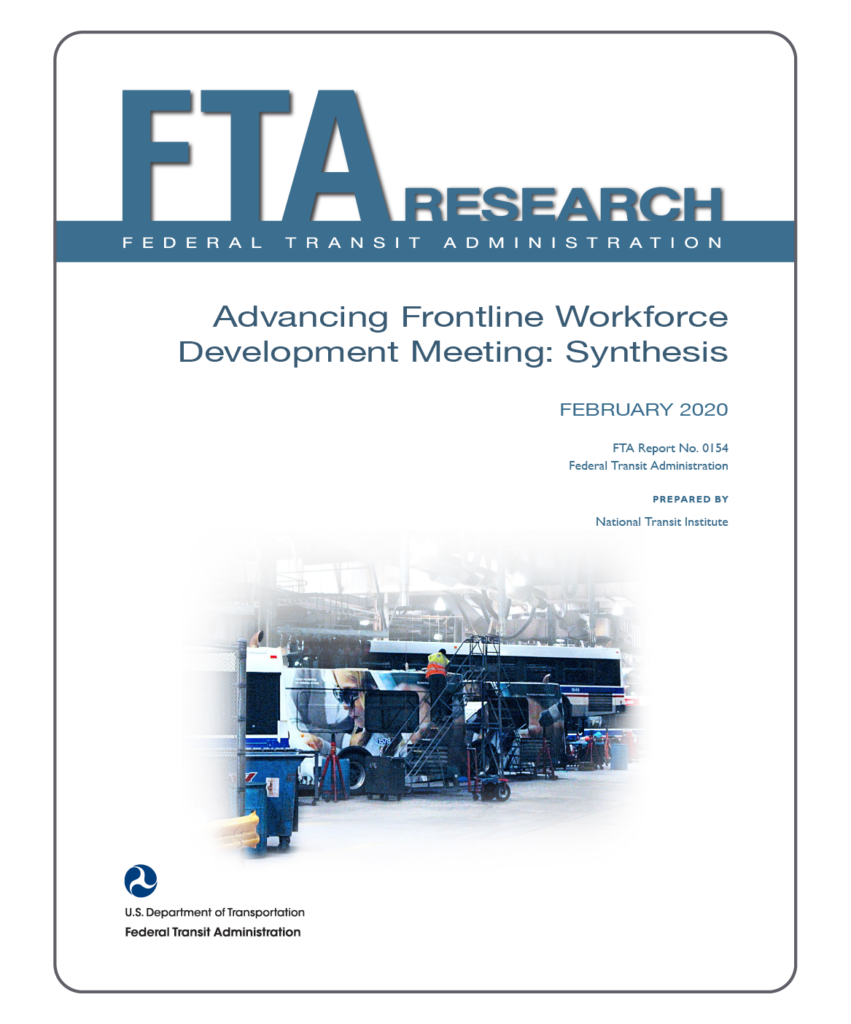
Advancing Frontline Workforce Development Meeting: Synthesis
This report synthesizes findings from a two-day gathering of more than two dozen transit industry labor and management representatives who engaged in in-depth discussions on frontline workforce training needs across the U.S. The purpose of the meeting was to identify immediate, short-term, and long-term training needs for the frontline public transportation workforce in the U.S. and ways to connect apprenticeship and formal training programs to support these needs.
National Transit Institute; Federal Transit Administration; International Transportation Learning Center
February 2020
TOPICS: Apprenticeship , Hiring and Recruitment , Policy and Planning , Training
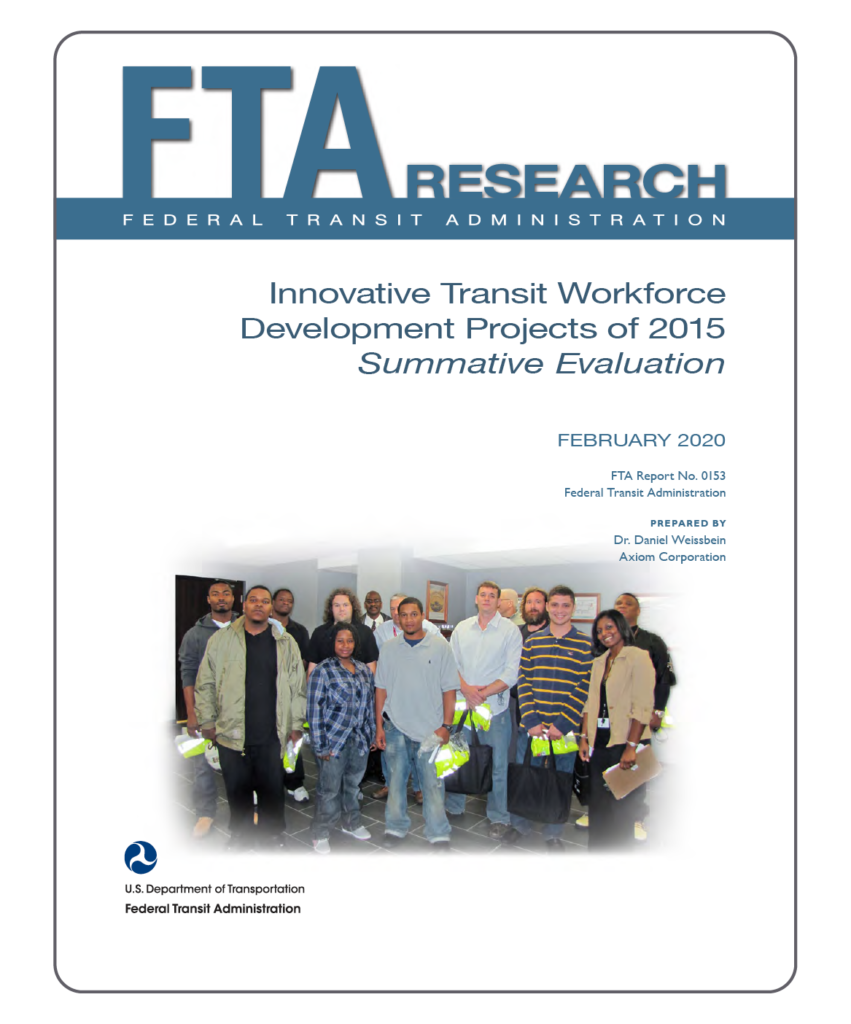
Innovative Transit Workforce Development Projects of 2015: Summative Evaluation
This report provides the results of an evaluation of Innovative Transit Workforce Development Program projects awarded in Fiscal Year 2015. Based on a competitive application process, FTA awarded 16 workforce development projects to transit authorities, higher education institutions, Native American tribes, and nonprofit organizations individually or as a consortium.
Federal Transit Administration
February 2020
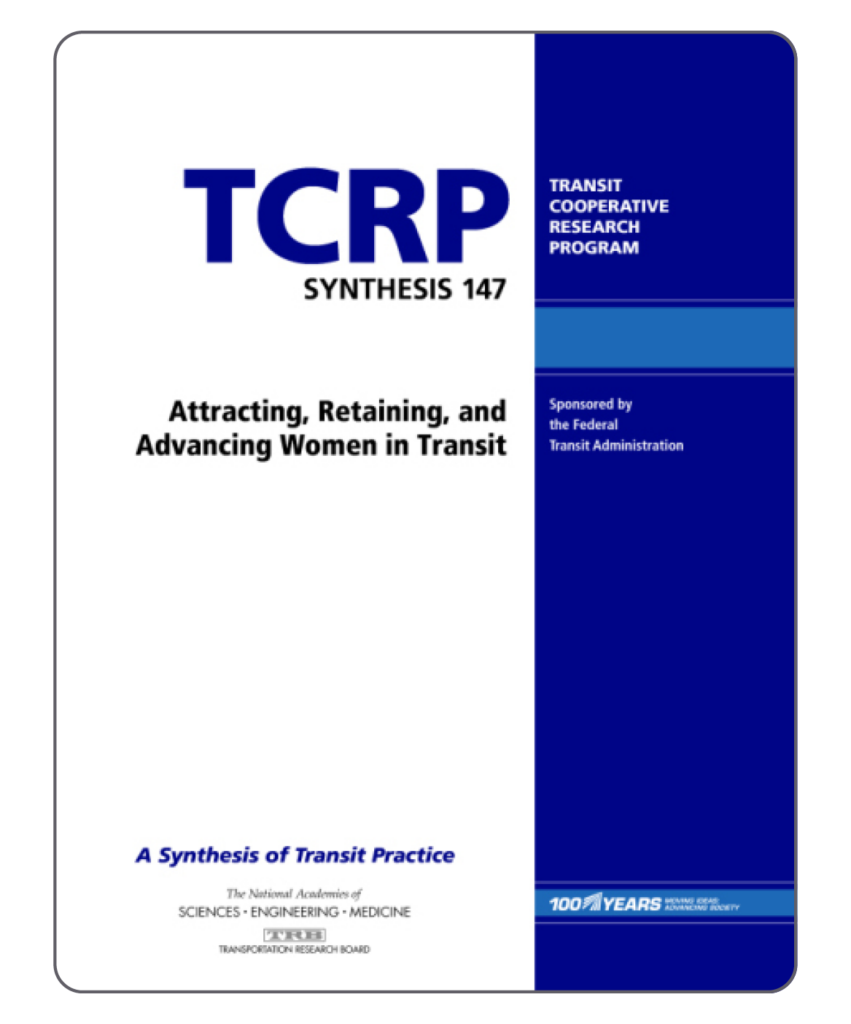
Attracting, Retaining, and Advancing Women in Transit
This TCRP report explores the strategies that have been deployed in transit and other related industries in order to attract, retain, and advance women in a variety of roles. It includes a survey and case studies from several major transit agencies.
Transit Cooperative Research Program
January 2020
TOPICS: Community Engagement , Hiring and Recruitment , Retention
Contributor(s): National Academies of Sciences, Engineering, and Medicine; Transportation Research Board; Transit Cooperative Research Program; ICF Allison Alexander
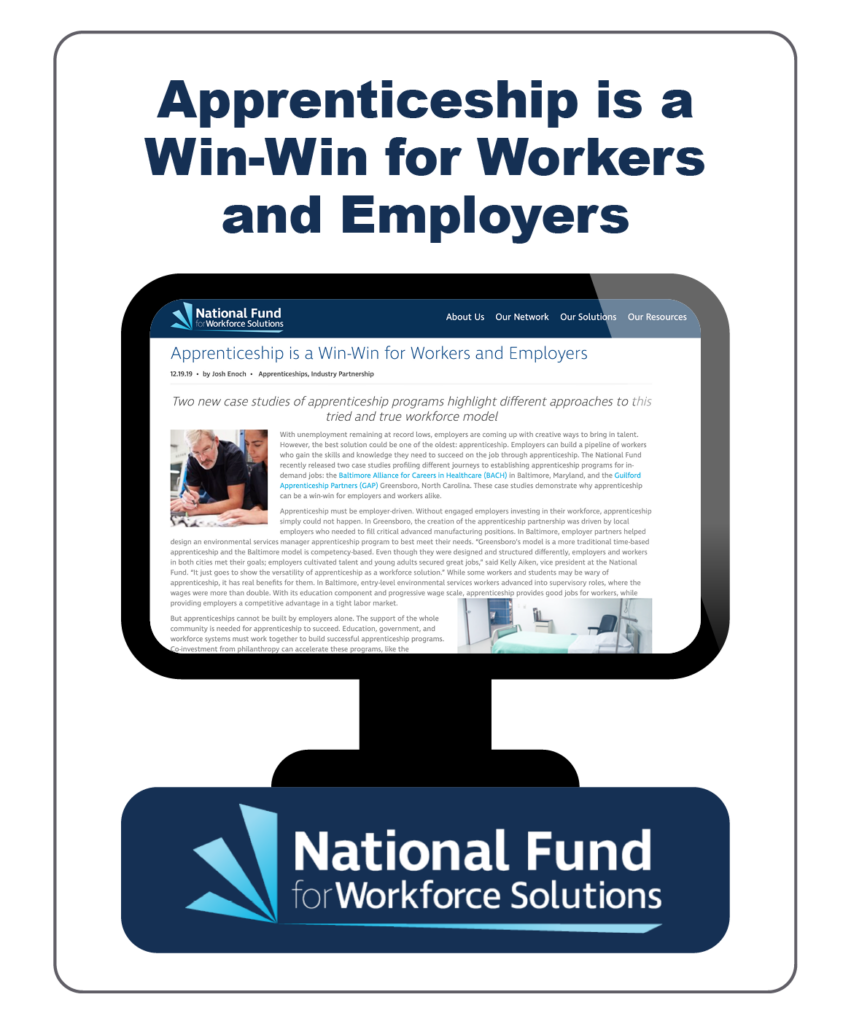
Apprenticeship is a Win-Win for Workers and Employers
These two case studies provide an analysis of apprenticeship programs at Baltimore Alliance for Careers in Healthcare (BACH) in Baltimore, Maryland, and the Guilford Apprenticeship Partners (GAP) in Greensboro, North Carolina. The case studies highlight the different approaches each organization used for their apprenticeship programs.
National Fund for Workforce Solutions
December 2019
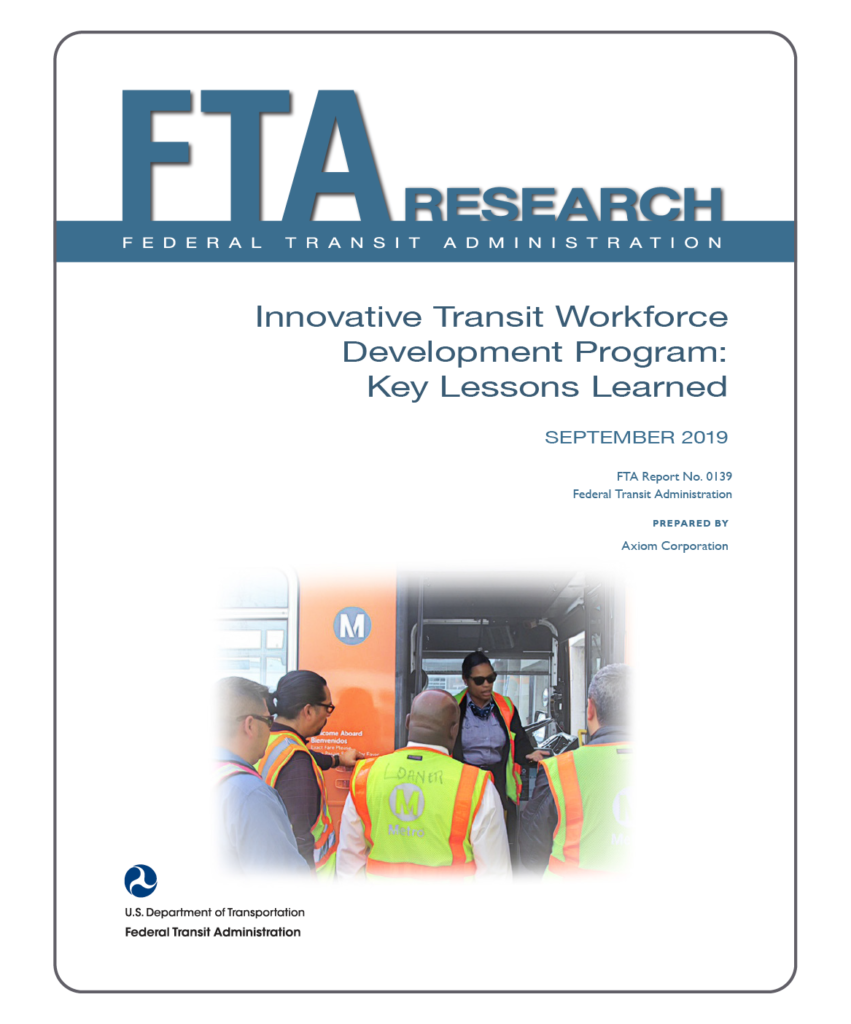
Innovative Transit Workforce Development Program: Key Lessons Learned
This report summarizes the impacts and lessons learned of individual project models, identifies transit workforce needs, and develops recommendations for the continuation or improvement of FTA’s workforce development efforts and investments.
Federal Transit Administration
September 2019
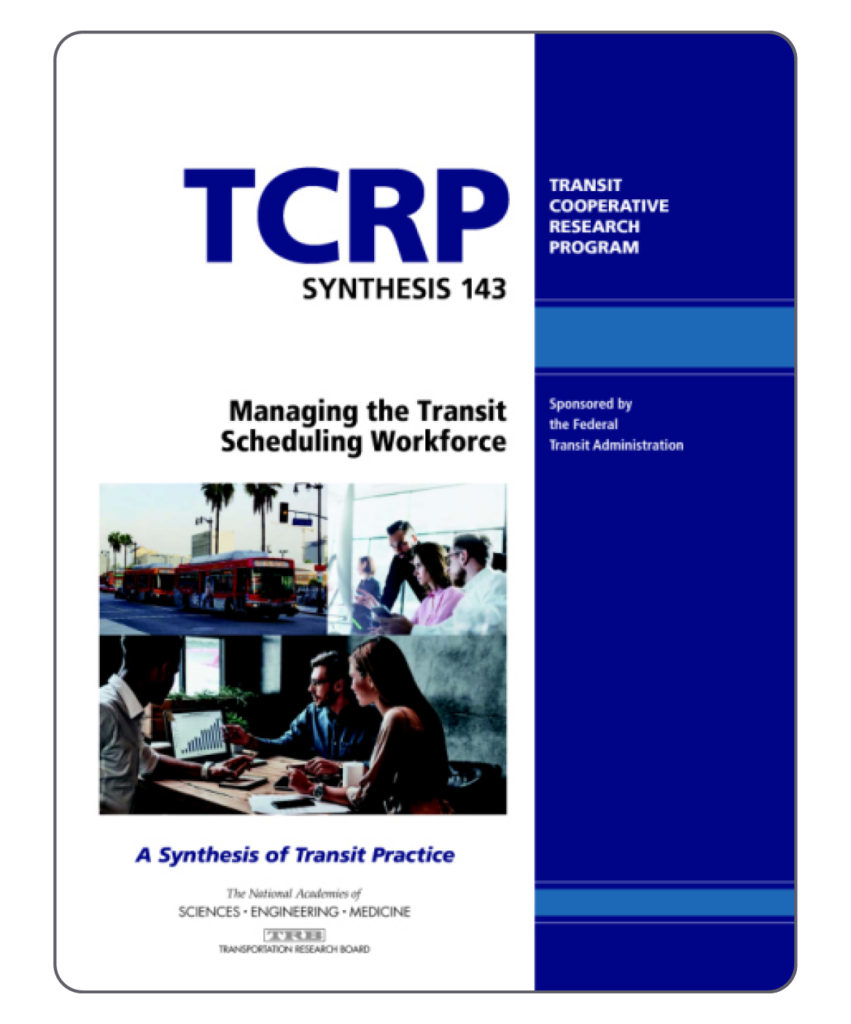
Managing the Transit Scheduling Workforce
Transit Cooperative Research Program
TOPICS: Career Pathways , Hiring and Recruitment , Training
This report is designed to assist transit agencies in managing their transit scheduling human capital. The report presents an overview of the practices and procedures transit agencies use to manage their scheduling workforce and will allow agencies to compare what they are currently doing with what others are doing in this area. The report also analyzes how transit systems are evolving their practices to adapt to industry and technological changes. It provides transit systems with new ideas and strategies to retain good schedulers.
Contributor(s): National Academies of Sciences, Engineering, and Medicine; Transportation Research Board; Transit Cooperative Research Program; Transit Cooperative Research Program Synthesis Program; Michael J. Walk; James P. Cardenas; Kristi Miller; Jessica Alvarez; Sandy Davis; Peter Hadley
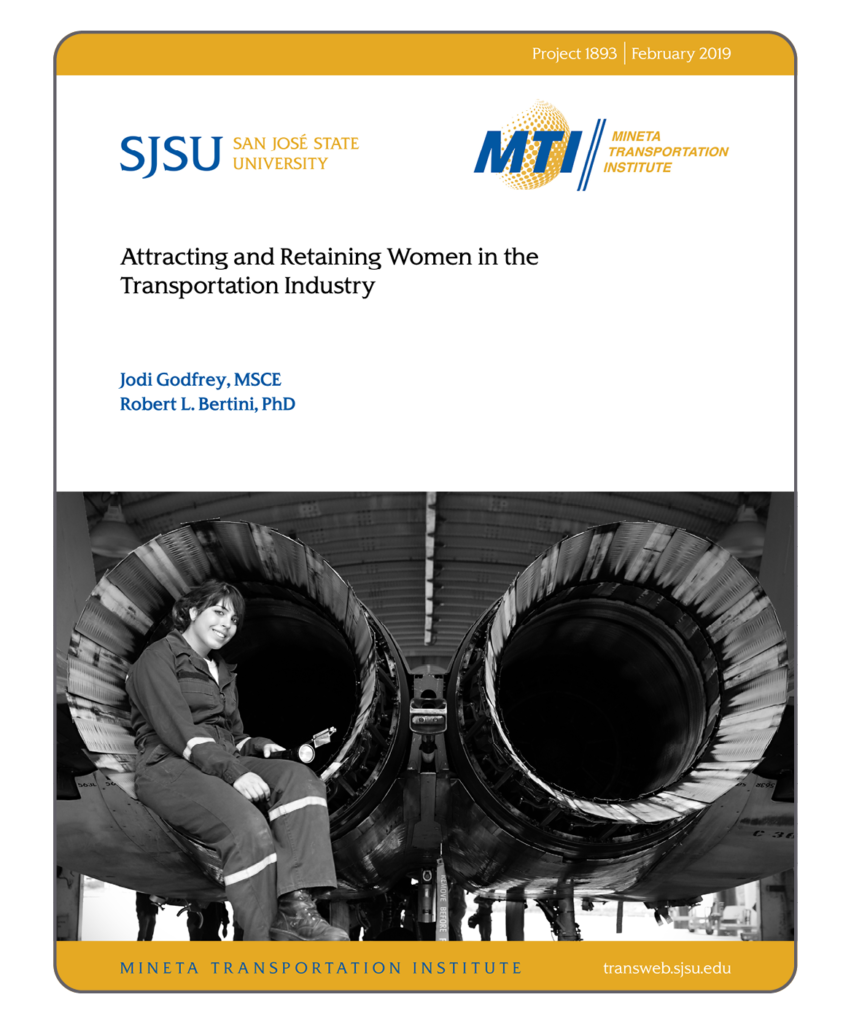
Attracting and Retaining Women in the Transportation Industry
This study synthesizes previously conducted research and identifies additional research needed to attract, promote, and retain women in the transportation industry, particularly emphasizing the importance of community-orientation and mentoring.
Mineta Transportation Institute
February 2019
TOPICS: Community Engagement , Hiring and Recruitment , Mentorship , Retention
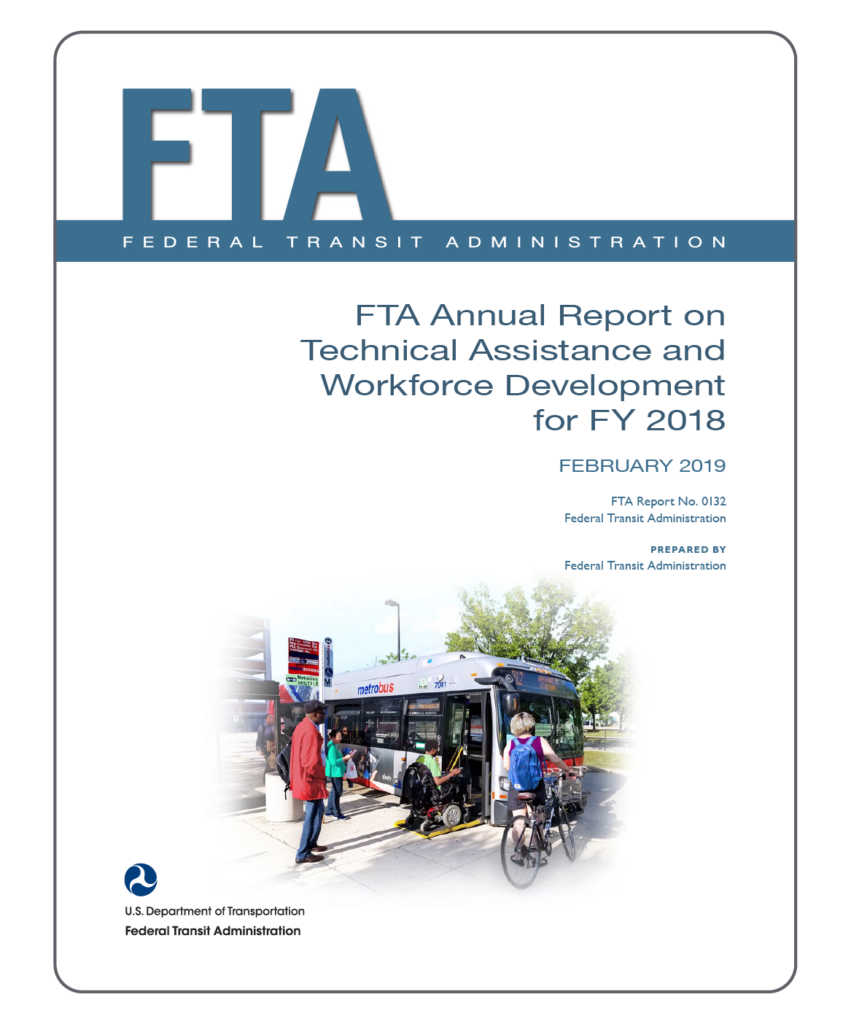
FTA Annual Report on Technical Assistance and Workforce Development for FY 2018
This annual report to Congress provides information on Fiscal Year 2018 technical assistance, standards, human resources and training projects to improve public transportation as authorized by federal public transportation law (49 U.S.C. § 5314). The report also includes information on FTA’s process for making allocations for FY 2019.
Federal Transit Administration
February 2019
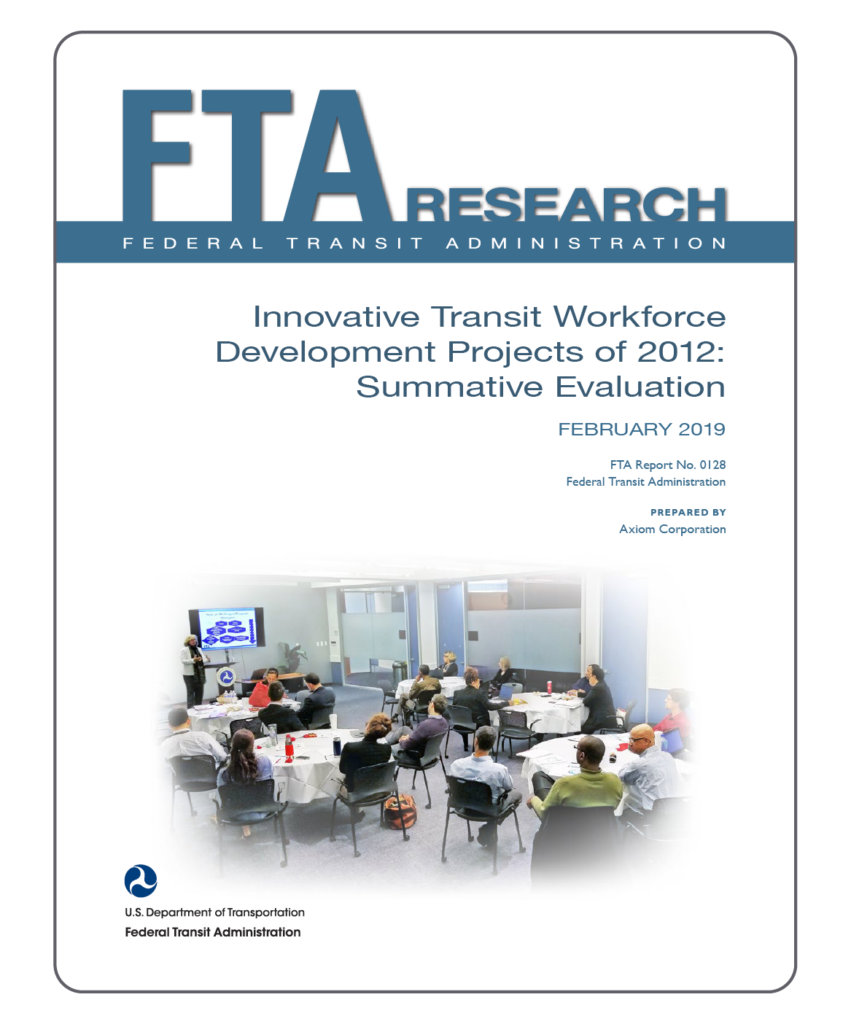
Innovative Transit Workforce Development Projects of 2012: Summative Evaluation
This report provides the results of the Innovative Transit Workforce Development Program Evaluation of projects awarded in Fiscal Year 2012. FTA awarded a total of $7,048,898 for 16 workforce development projects. Recipients included transit authorities, higher education institutions, Native American tribes, and nonprofit organizations.
Federal Transit Administration
February 2019
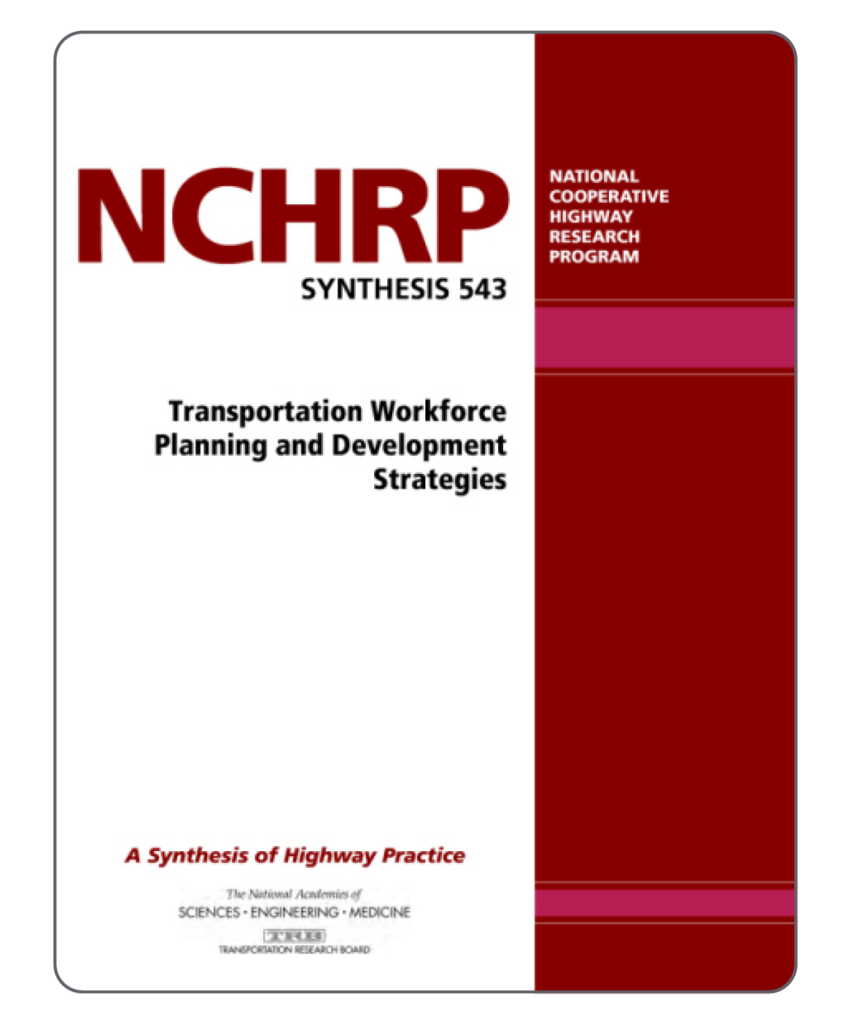
Transportation Workforce Planning and Development Strategies
This report is a synthesis of the current state of practice associated with the implementation of transportation workforce planning and development strategies at state departments of transportation (DOTs) and associated local and tribal technical assistance programs (LTAPs/TTAPs). The synthesis includes a literature review and survey results of both state DOTs and LTAPs, as well as case studies of five state DOTs, presenting an in-depth analysis of processes and considerations, challenges, lessons learned, and keys to success.
National Cooperative Highway Research Program
January 2019
TOPICS: Policy and Planning
Contributor(s): National Academies of Sciences, Engineering, and Medicine; Transportation Research Board; National Cooperative Highway Research Program; Robert Puentes; Alice Grossman; Brianne Eby; Alex Bond
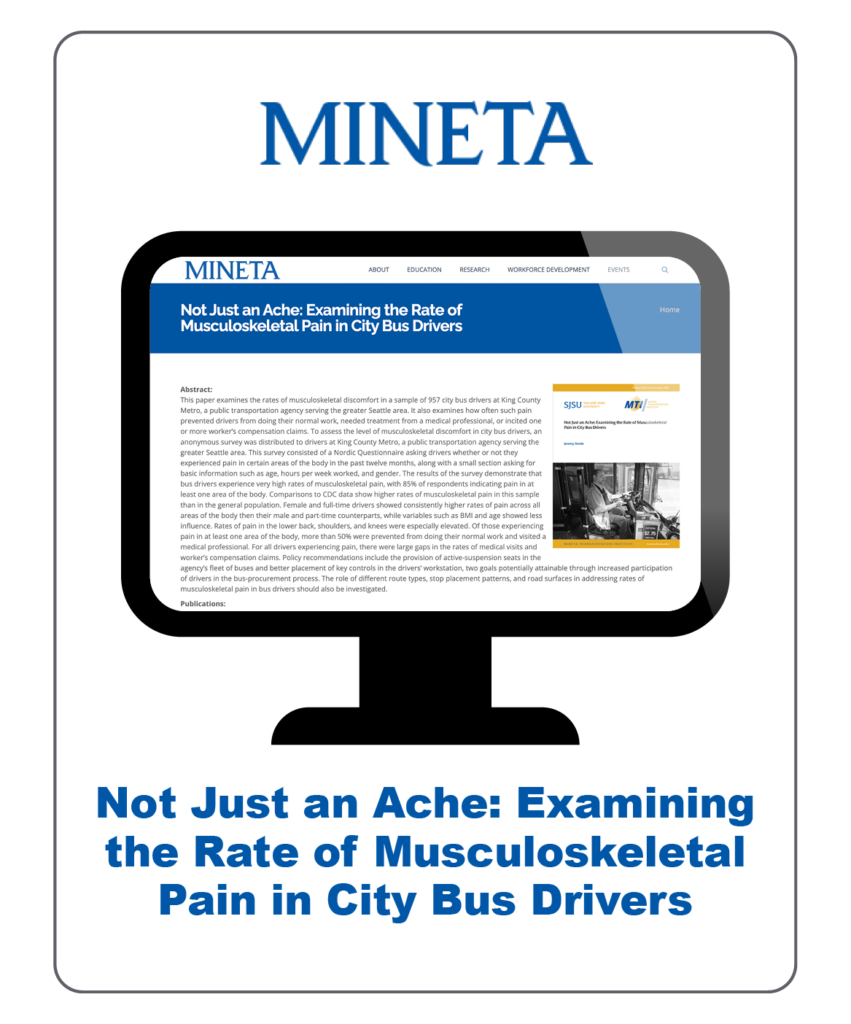
Not Just an Ache: Examining the Rate of Musculoskeletal Pain in City Bus Drivers
This paper examines the rates of musculoskeletal discomfort in a sample of 957 city bus drivers at King County Metro. The researchers conducted a survey demonstrate that city bus drivers experience very high rates of musculoskeletal pain in at least one area of the body. The paper includes policy recommendations, such as the provision of active-suspension seats in the agency’s fleet of buses and better placement of key controls in the drivers’ workstation, as well as considerations for further investigation.
Mineta Transportation Institute
November 2018
TOPICS: Policy and Planning , Safety and Health
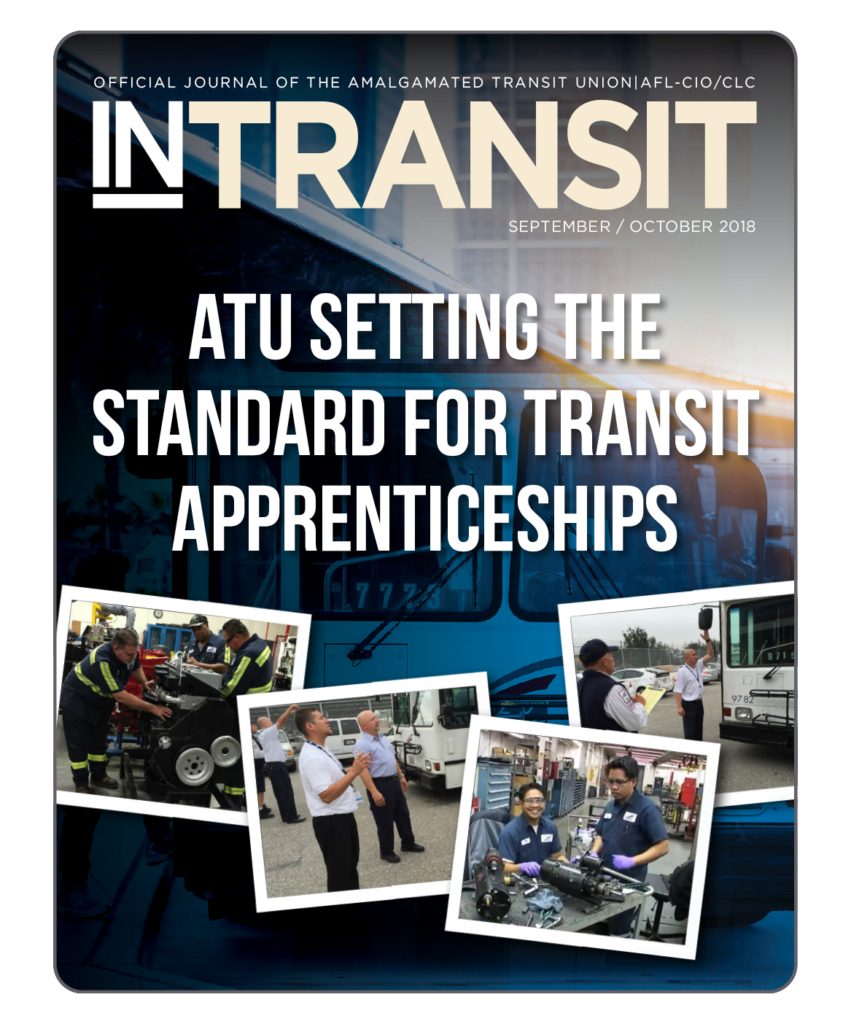
Setting the Standard for Transit Apprenticeships
This article in In Transit summarizes The Amalgamated Transit Union’s (ATU’s) and the International Transportation Learning Center’s (ITLC’s) efforts to promote apprenticeship program development. It discusses apprenticeship programs at several transit agencies and ATU locals, as well as the role of mentorship in a successful apprenticeship program.
Amalgamated Transit Union
September 2018
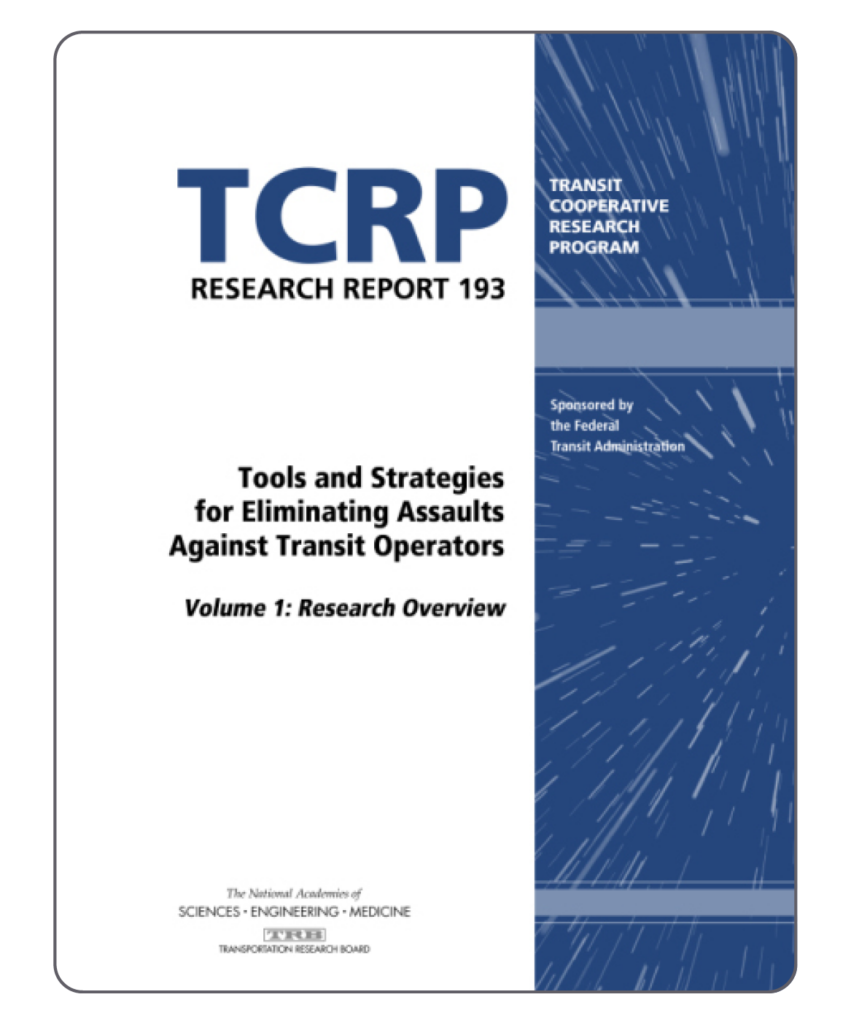
Tools and Strategies for Eliminating Assaults Against Transit Operators
This TCRP report documents policies, practices, and operating procedures related to preventing, mitigating, and responding to operator assaults. The varied format, scale, and implementation of policies and procedures set by transit agencies can shape mitigation approaches. Relevant skills and training required by transit operators to address this issue vary as well.
Transit Cooperative Research Program
May 2018
TOPICS: Policy and Planning , Safety and Health
Volume 1 documents the materials used to develop the report and Volume 2, the user guide, provides potential countermeasures and strategies to prevent or mitigate assaults against transit operators, including an operator assault risk management toolbox, vulnerability self-assessment tool, route-based risk calculator, as well as supportive checklists, guidelines, and methodologies.
Contributor(s): National Academies of Sciences, Engineering, and Medicine; Transportation Research Board; Transit Cooperative Research Program; Countermeasures Assessment and Security Experts, LLC and Transportation Resource Associates, Inc.
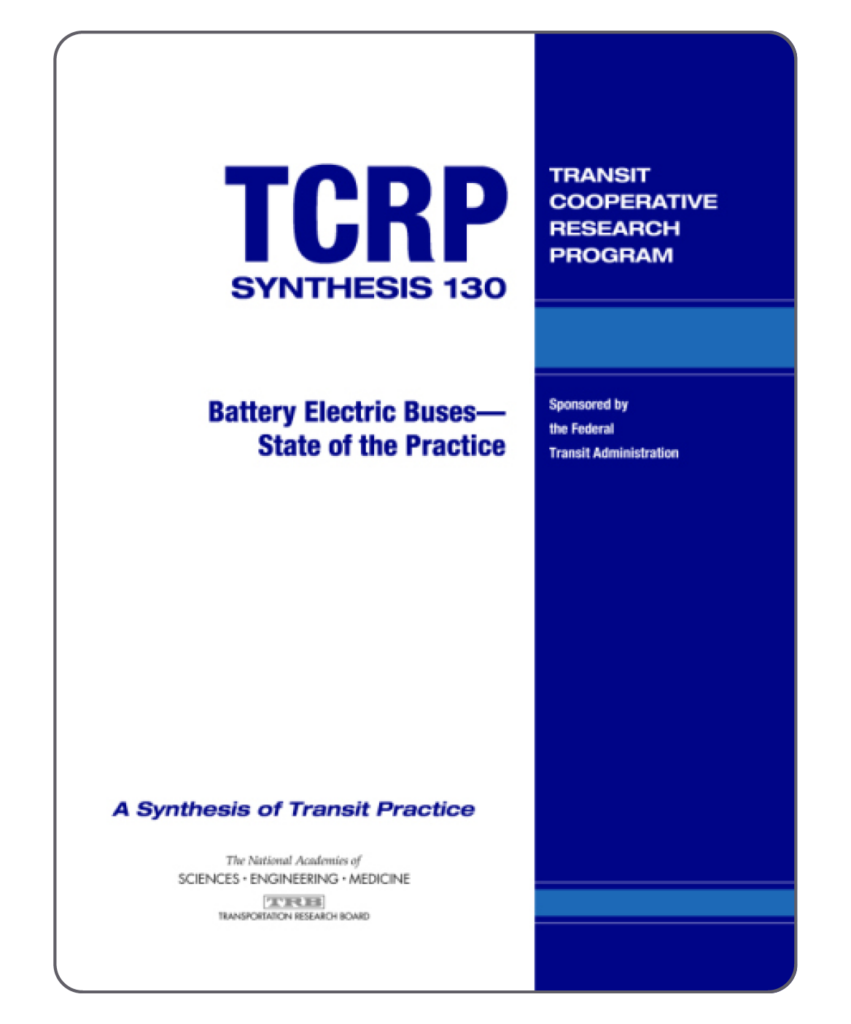
Battery Electric Buses—State of the Practice
This report documents current practices of transit systems in the planning, procurement, infrastructure installation, operation, and maintenance of battery electric buses (BEBs). The synthesis is intended for transit agencies that are interested in understanding the potential benefits and challenges associated with the introduction and operation of BEBs.
Transit Cooperative Research Program
March 2018
TOPICS: Low- or No-Emission , Procurement
Contributor(s): National Academies of Sciences, Engineering, and Medicine; Transportation Research Board; Transit Cooperative Research Program Synthesis Program; Synthesis Program; Transit Cooperative Research Program; Jason Hanlin; Darby Reddaway; Julia Lane
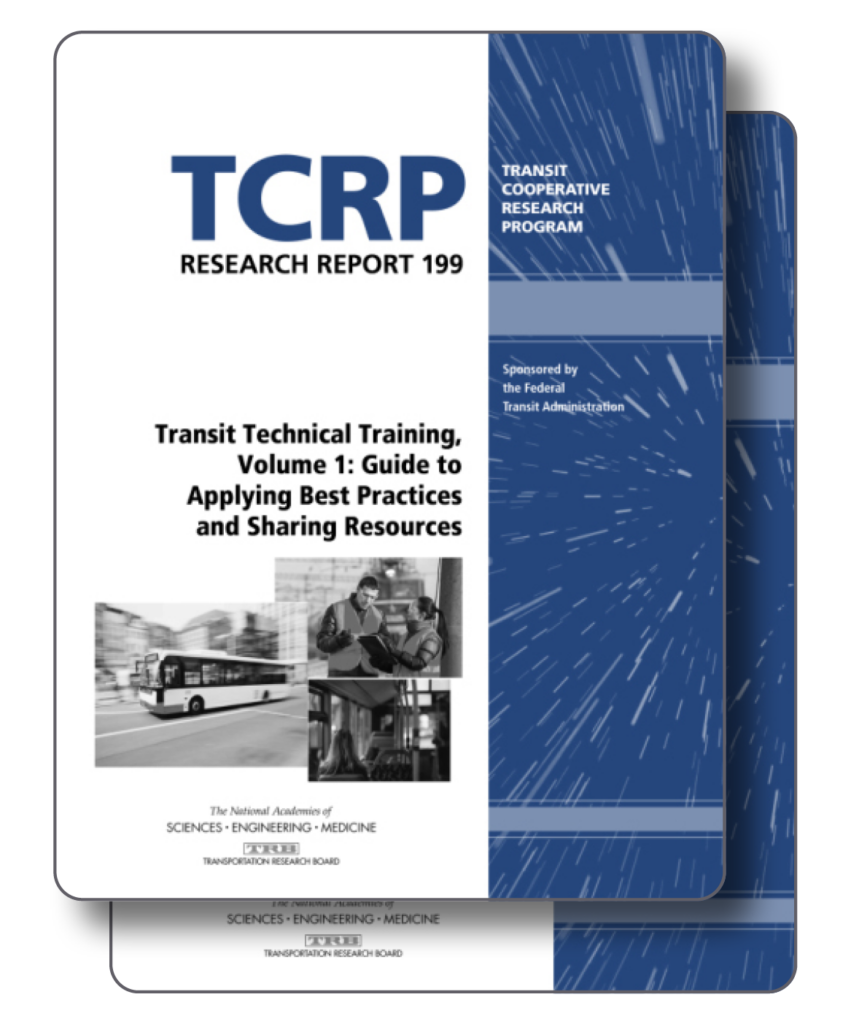
TCRP Research Report 199: Transit Technical Training (Volumes 1 & 2)
TCRP Research Report 199: Transit Technical Training is a two-volume set that presents guidance on technical training programs and the implementation of those for transportation agencies.
The report’s first volume, Guide to Applying Best Practices and Sharing Resources, documents the best models of technical training programs serving U.S. and international transportation agencies and related industries.
The second volume, Guide to Overcoming Barriers to Implementing Best and Innovative Training, provides public transportation agencies with best practices, strategies, and resources to assist with the implementation of effective and innovative training programs and techniques for frontline employees.
Transit Cooperative Research Program (TCRP)
January 2018
TOPICS: Apprenticeship , Safety and Health , Training
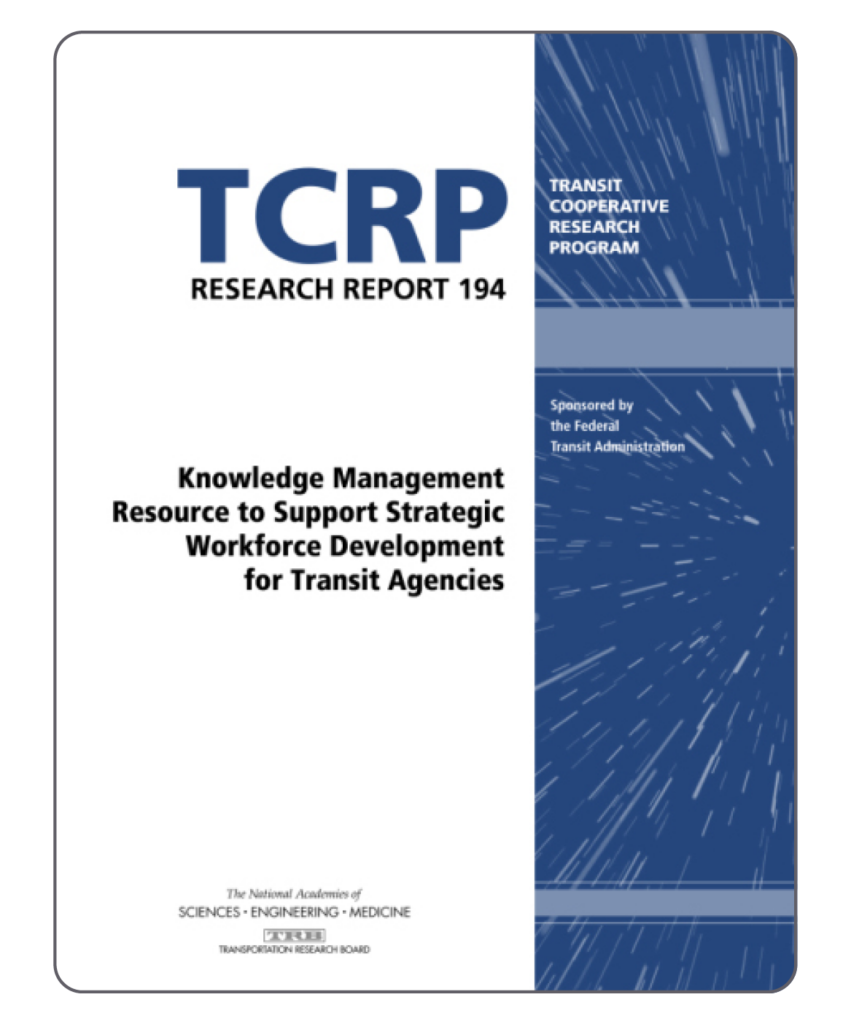
Knowledge Management Resource to Support Strategic Workforce Development for Transit Agencies
TRB’s Transit Cooperative Research Program (TCRP) Research Report 194: Knowledge Management Resource to Support Strategic Workforce Development for Transit Agencies explores the importance of knowledge management (KM), which is an organization’s process for collecting, storing, and sharing organizational information and knowledge, and provides guidance on implementing KM strategies in transit agencies. In addition, the guidance includes action plans for developing particular aspects of KM, analysis of KM strategies at several transit agencies, and a catalog of KM technology tools and resources.
Transit Cooperative Research Program (TCRP)
January 2018
TOPICS: Policy and Planning , Program Evaluation and ROI , Retention
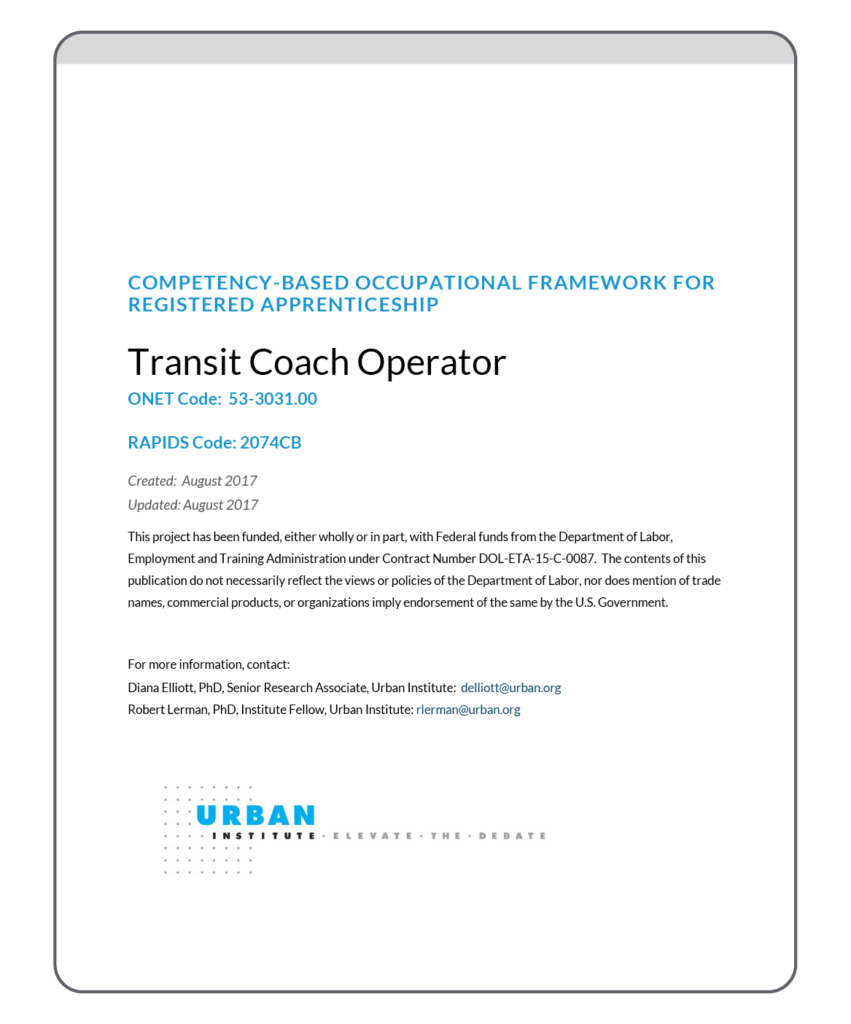
Transit Coach Operator Competency-Based Framework
This is the full Competency-Based Occupational Framework for Registered Apprenticeship for transit coach operator/bus operators.
The Urban Institute & International Transportation Learning Center
August 2017
TOPICS: Apprenticeship , Low- or No-Emission , Training
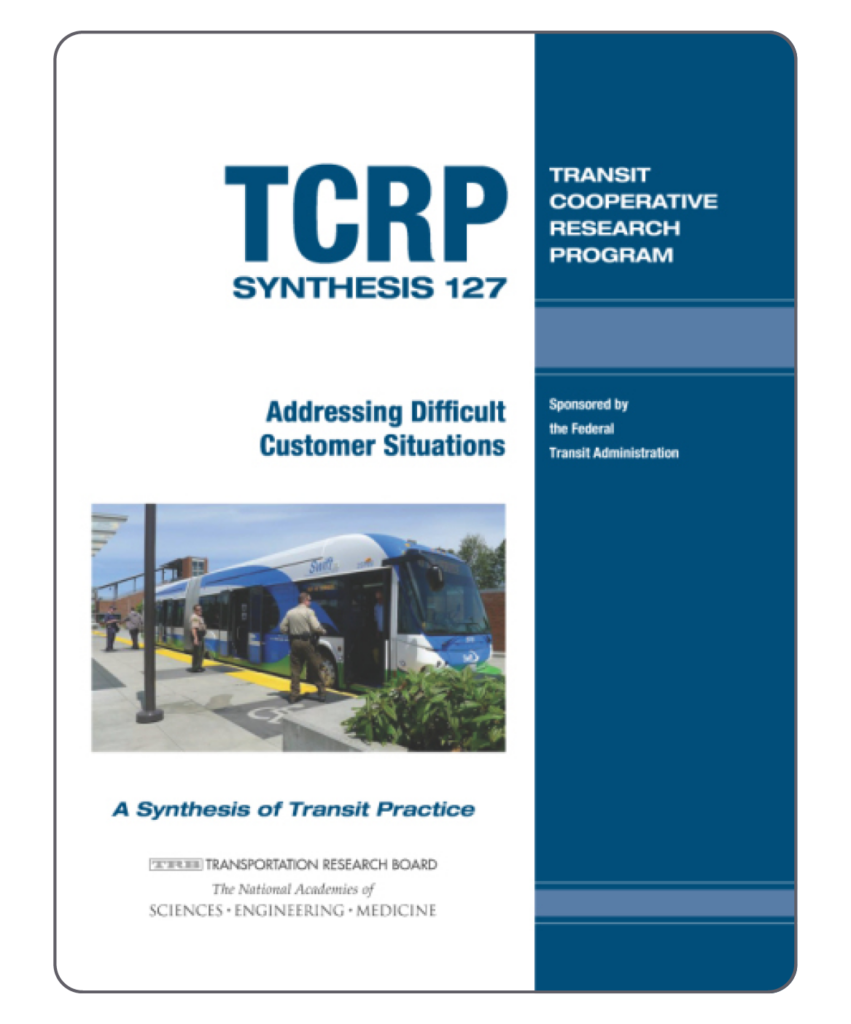
Addressing Difficult Customer Situations
This report considers issues surrounding difficult customers or passengers and the variety of circumstances that can arise when they utilize transit system facilities or vehicles. It identifies current practices used by transit agencies to prevent, prepare for, and deal with these incidents, including training programs for operators and other staff.
Transit Cooperative Research Program
March 2017
TOPICS: Policy and Planning , Safety and Health , Training
Contributor(s): National Academies of Sciences, Engineering, and Medicine; Transportation Research Board; Transit Cooperative Research Program Synthesis Program; Synthesis Program; Transit Cooperative Research Program; Joel M. Volinski
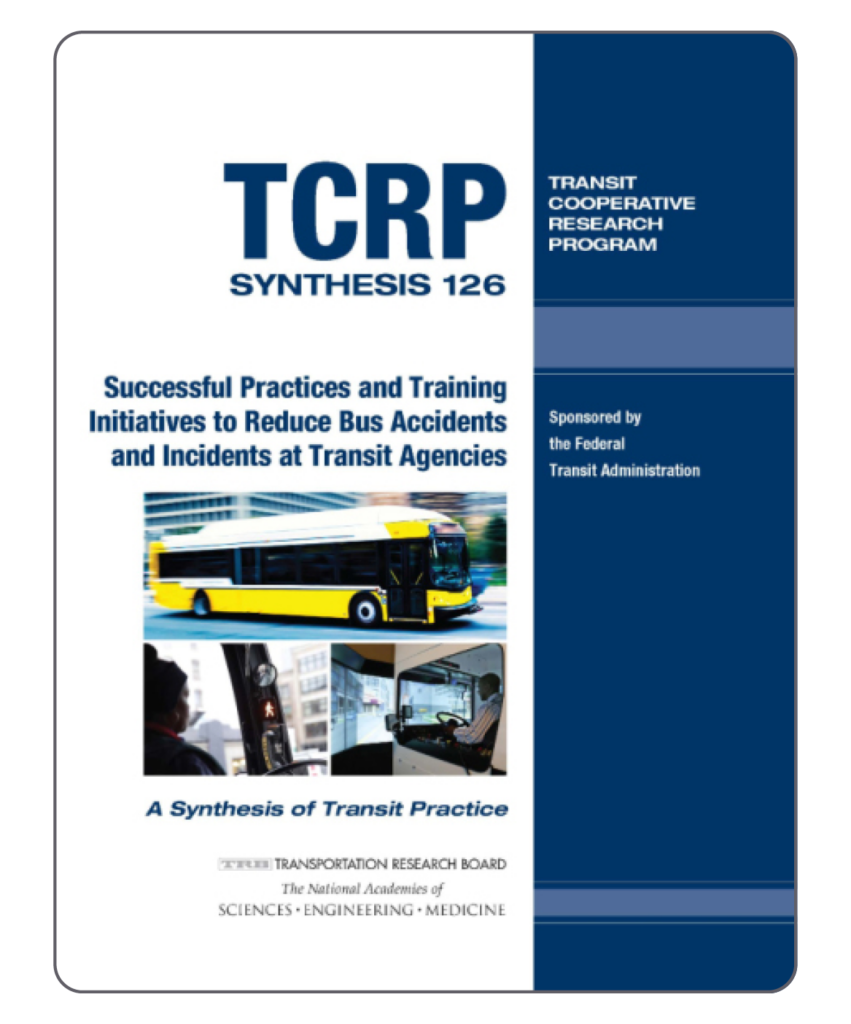
Successful Practices and Training Initiatives to Reduce Accidents and Incidents at Transit Agencies
TRB’s Transit Cooperative Research Program (TCRP) Synthesis 126: Successful Practices and Training Initiatives to Reduce Accidents and Incidents at Transit Agencies documents current practices and training initiatives, including bus operator training and retraining programs that have been effective in reducing accidents and incidents at transit agencies. The study also focuses on other system approaches that have been implemented to address safety hazards. These approaches include various technology applications, infrastructure modifications, and programs and initiatives such as driver incentive programs and close call/near miss reporting.
Transit Cooperative Research Program (TCRP) & CUTR
January 2017
TOPICS: Safety and Health , Training
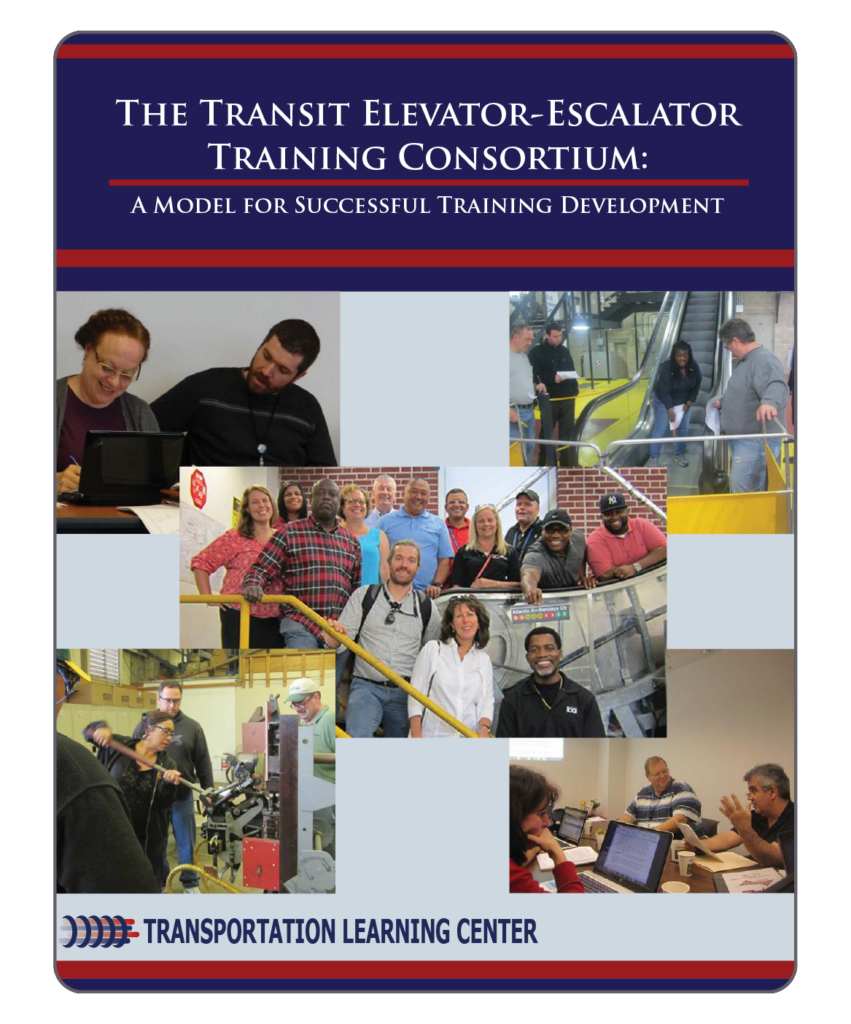
The Transit Elevator-Escalator Training Consortium: A Model for Successful Training Development
A report on the process, products and outcomes related to the first National consortium for development of training for public transportation maintenance employees. This joint labor-management effort set a proven model for multiple other similar consortia. Products include – instruction ready courseware, a nationally recognized apprenticeship program for transit maintenance elevator/escalator maintainers and train-the-trainer program.
International Transportation Learning Center
September 2016
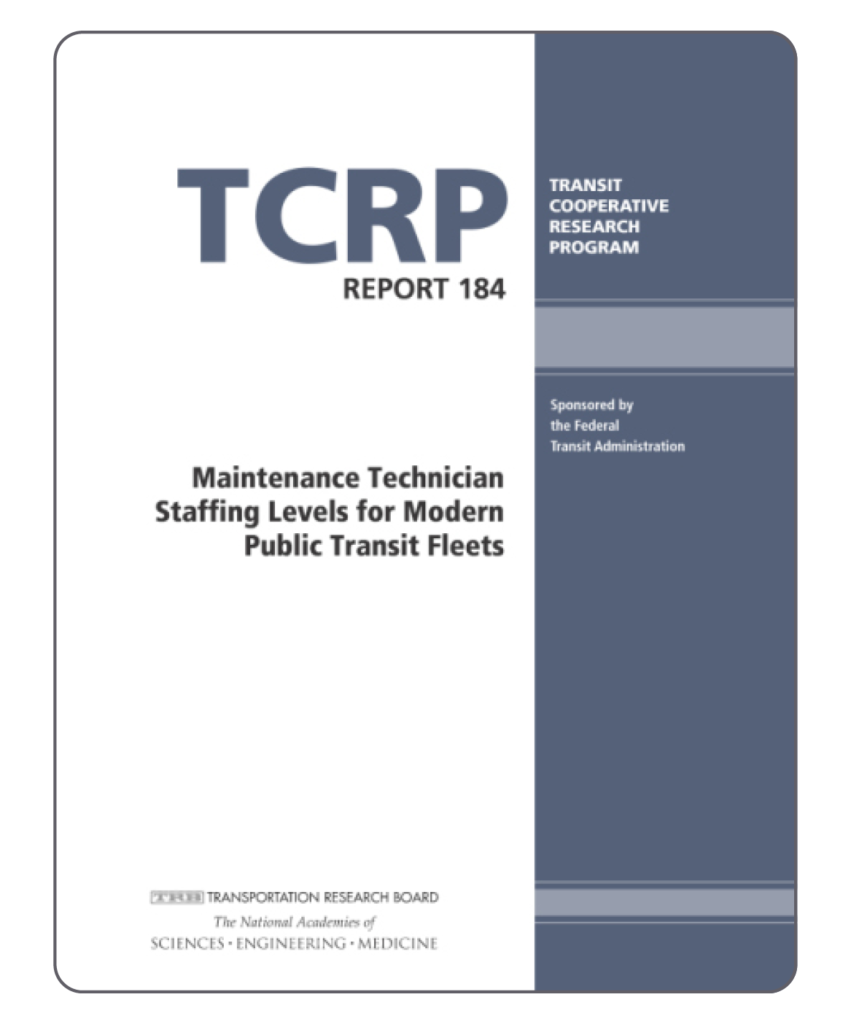
Maintenance Technician Staffing Levels for Modern Public Transit Fleets
This report identifies existing tools and practices used to determine optimum maintenance technician staffing levels and provides an analysis of variables that influence maintenance technician staffing needs. A Microsoft Excel maintenance staffing calculator and user guide is available.
Transit Cooperative Research Program
August 2016
Contributor(s): National Academies of Sciences, Engineering, and Medicine; Transportation Research Board; Transit Cooperative Research Program; Ken Mall; June Sekera; the Transportation Learning Center and Transit Resource Center
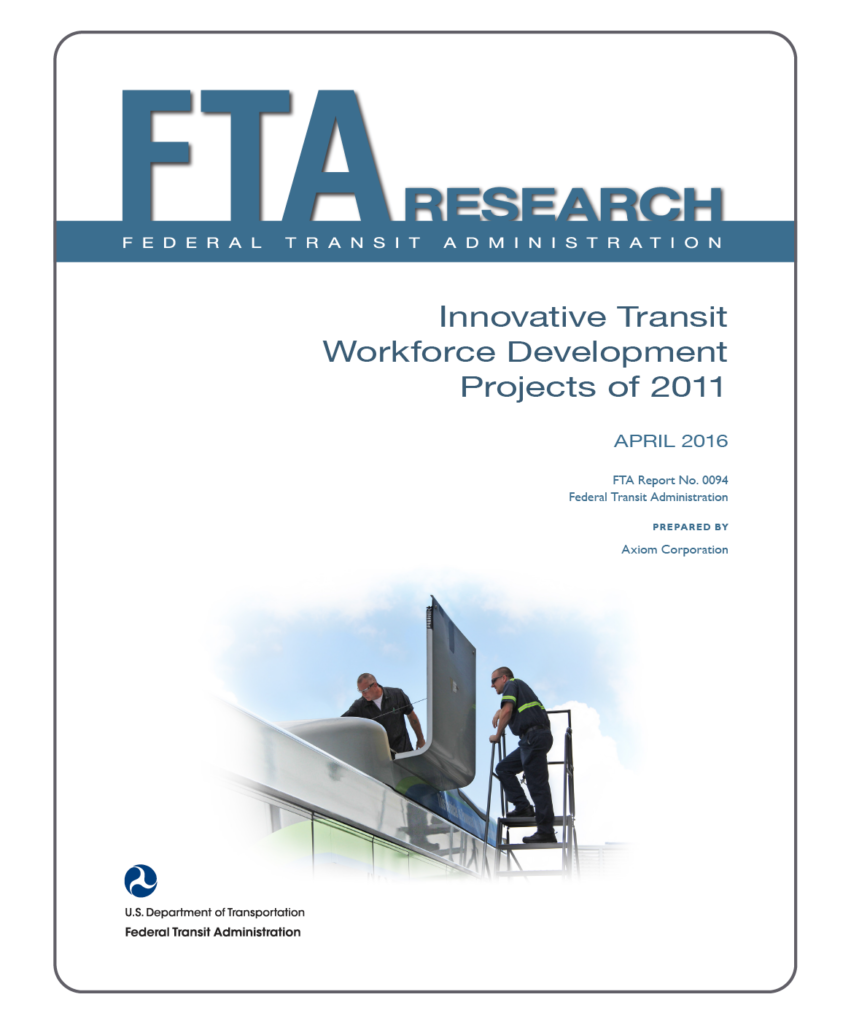
Innovative Transit Workforce Development Projects of 2011
This report provides the results of the Innovative Transit Workforce Program Evaluation of projects awarded in fiscal year 2011. The evaluation was conducted via review of updates and final report submitted by grantees and telephone interviews with grantees.
Federal Transit Administration
April 2016
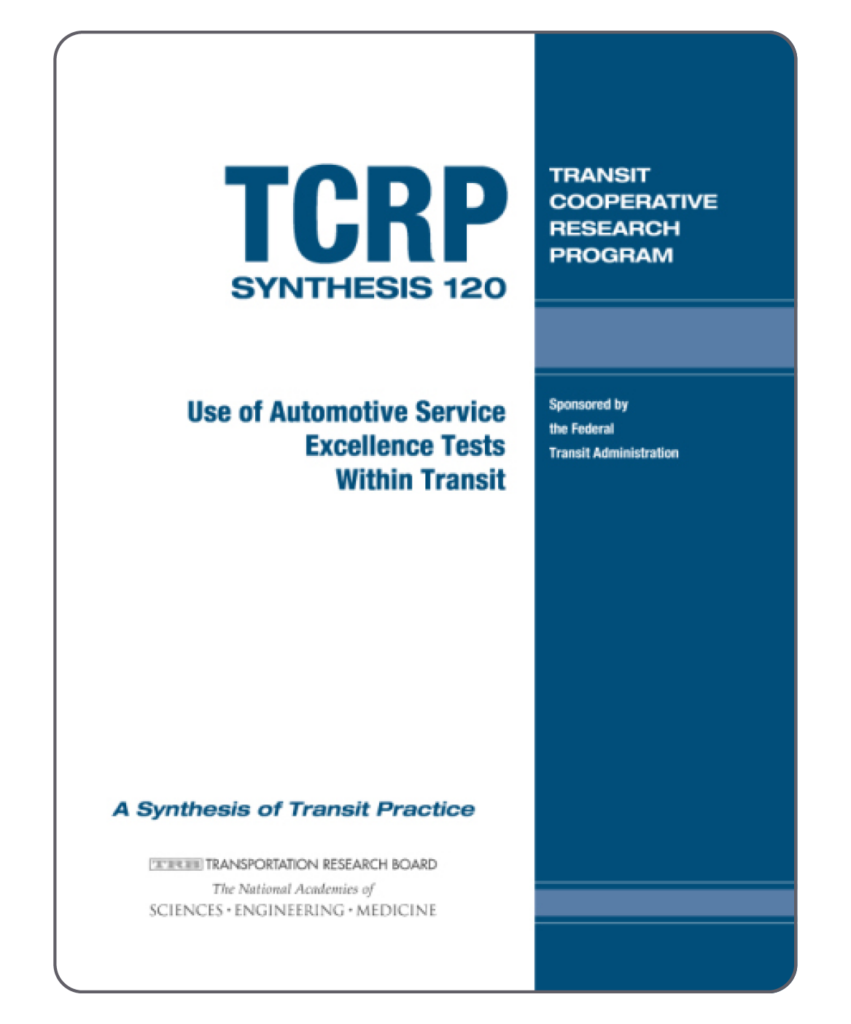
Use of Automotive Service Excellence Tests Within Transit
TRB’s Transit Cooperative Research Program (TCRP) Synthesis 120: Use of Automotive Service Excellence Tests Within Transit documents how the Automotive Service Excellence (ASE) program is accepted and used within the transit bus maintenance community. The ASE program is nationally recognized as the standard industry credential provider for automotive professionals. The report explores how a cross section of transit bus maintenance personnel view the ASE certification program and summarizes their perspectives to improve ASE certification acceptance and participation.
Transit Cooperative Research Program (TCRP)
January 2016
TOPICS: Safety and Health , Training
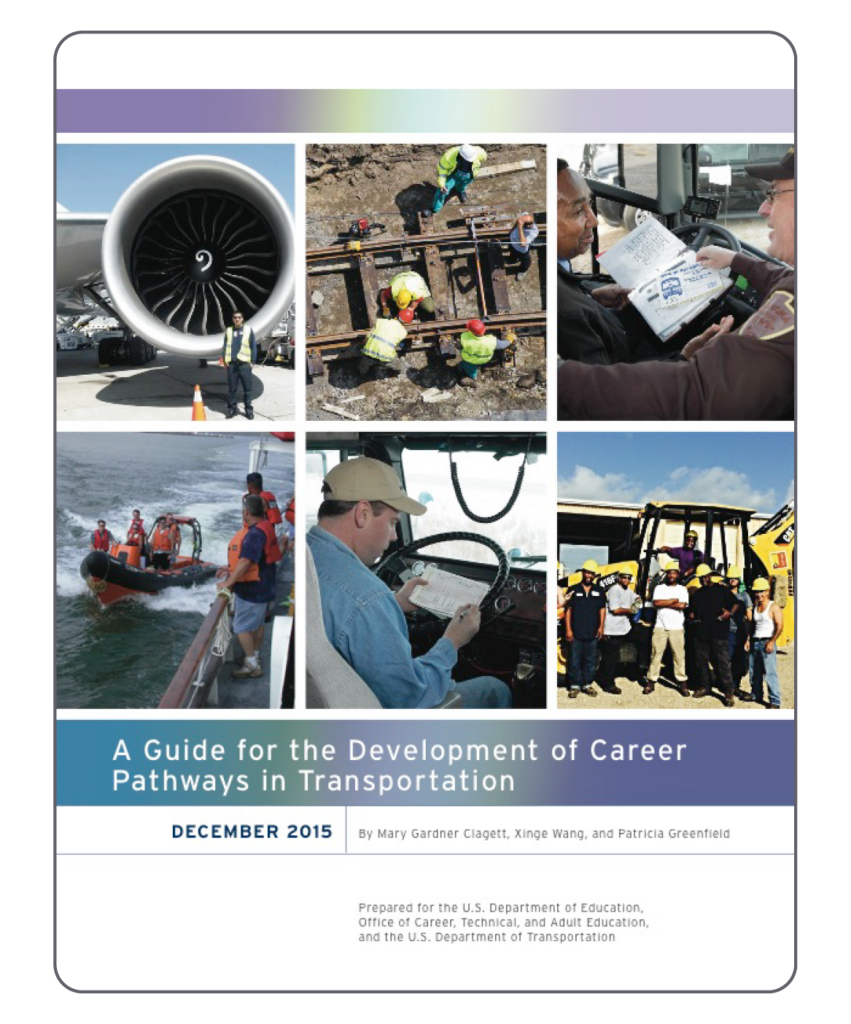
A Guide for the Development of Career Pathways in Transportation
This guide outlines the steps that transportation industry stakeholders can take to develop or expand Career Pathways to focus on the skills, competencies, and credentials needed for high-demand jobs in the transportation industry and its subsectors.
U.S. Department of Education; Jobs for the Future; International Transportation Learning Center
December 2015
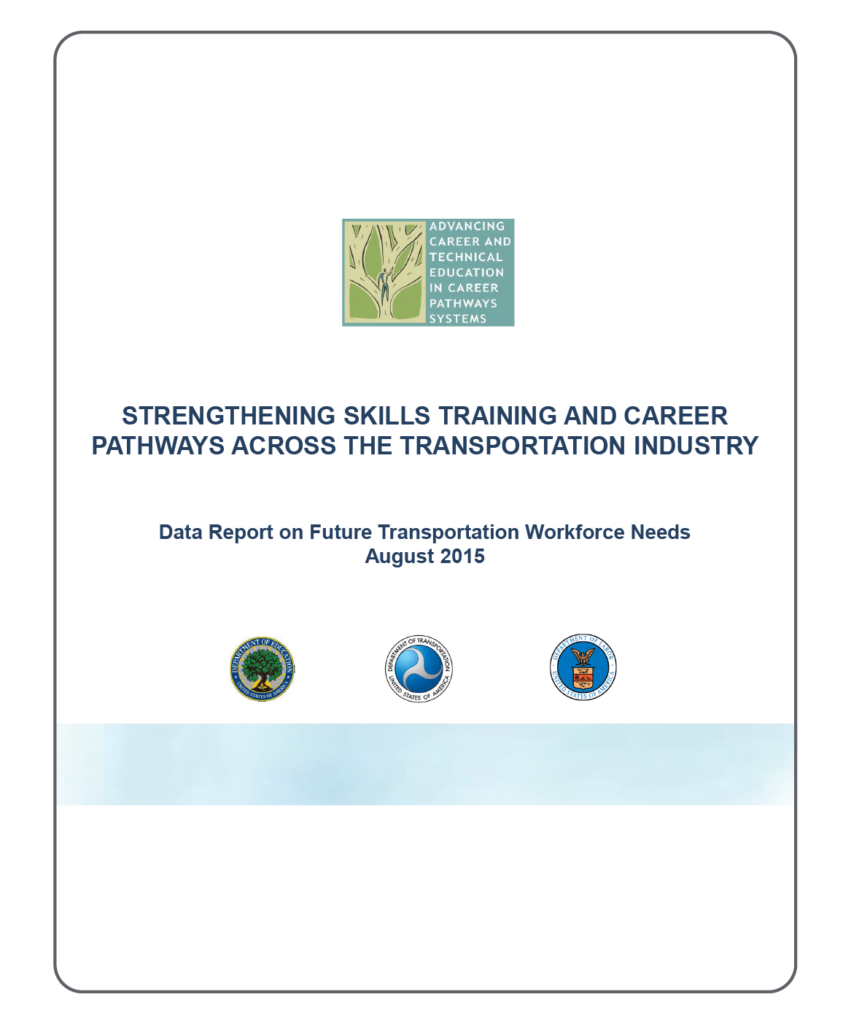
Strengthening Skills Training and Career Pathways Across the Transportation Industry
This report identifies high-demand jobs with good wages in transportation, discusses the role data plays in identifying future workforce skill needs, and analyzes the patterns in the education and work experience required for entry, as well as on-the-job training required for new entrants to gain full competency.
U.S. Department of Education, Office of Career, Technical, and Adult Education; U.S. Department of Transportation; U.S. Department of Labor
August 2015
TOPICS: Apprenticeship , Career Pathways , Hiring and Recruitment , Training
The Office of Career, Technical, and Adult Education (OCTAE) and the Department of Transportation acknowledge the important contributions to this report made by the following people: Xinge Wang, Deputy Director, and Jack Clark, Executive Director, Transportation Learning Center; and Mary Clagett, Director for Workforce Policy, Lois Joy, Senior Program Manager, and Dudney Sylla, Program Manager, Jobs for the Future, for their analysis and writing.
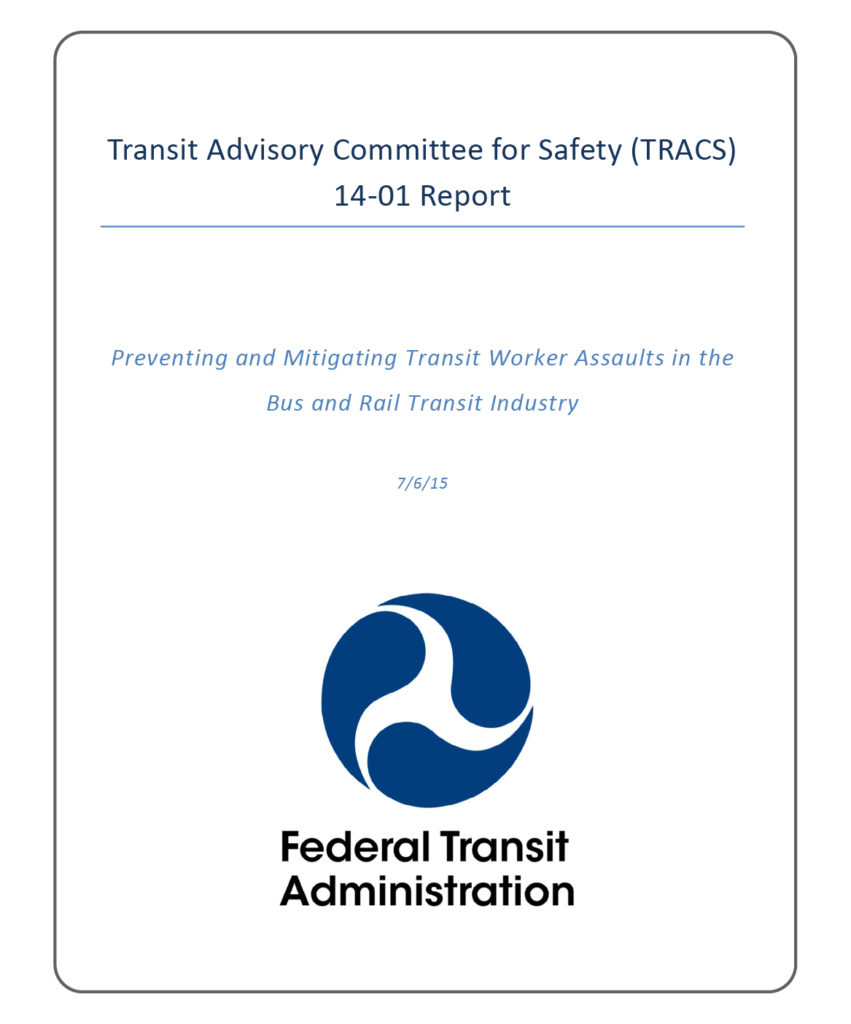
Preventing and Mitigating Transit Worker Assaults in the Bus and Rail Transit Industry
This report provides recommendations from state and local transportation agencies, labor unions, research organizations, and national transportation associations to address the elements of a safety management system (SMS) approach to preventing and mitigating transit worker assaults, including policy, risk management, safety promotion, and safety assurance.
Transit Advisory Committee for Safety
July 2015
TOPICS: Retention , Safety and Health
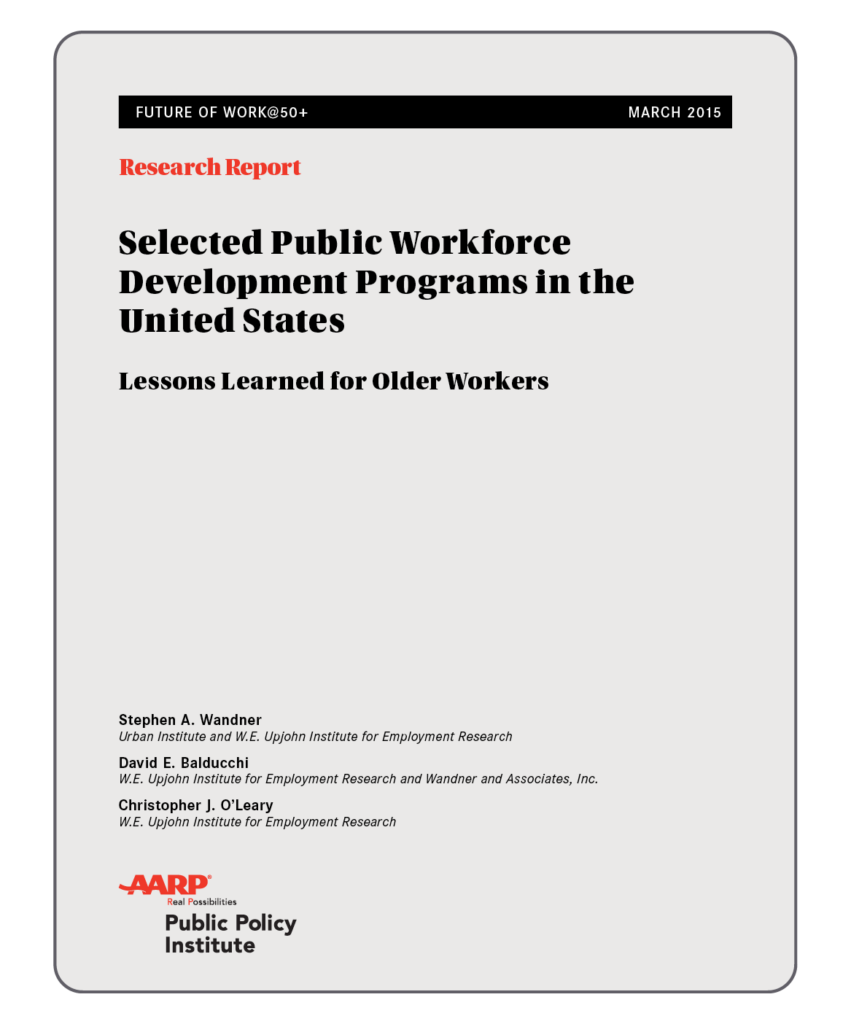
Selected Public Workforce Development Programs in the United States: Lessons Learned for Older Workers
This report provides a selective review of public workforce development programs in the United States over the past 80 years, placing special emphasis on the importance these programs have to older Americans. It discusses how the public workforce system developed, how it operates today, significant programs and target groups, common employment services and job training strategies, and what is known about program effectiveness.
American Association of Retired Persons
March 2015
TOPICS: Community Engagement , Policy and Planning
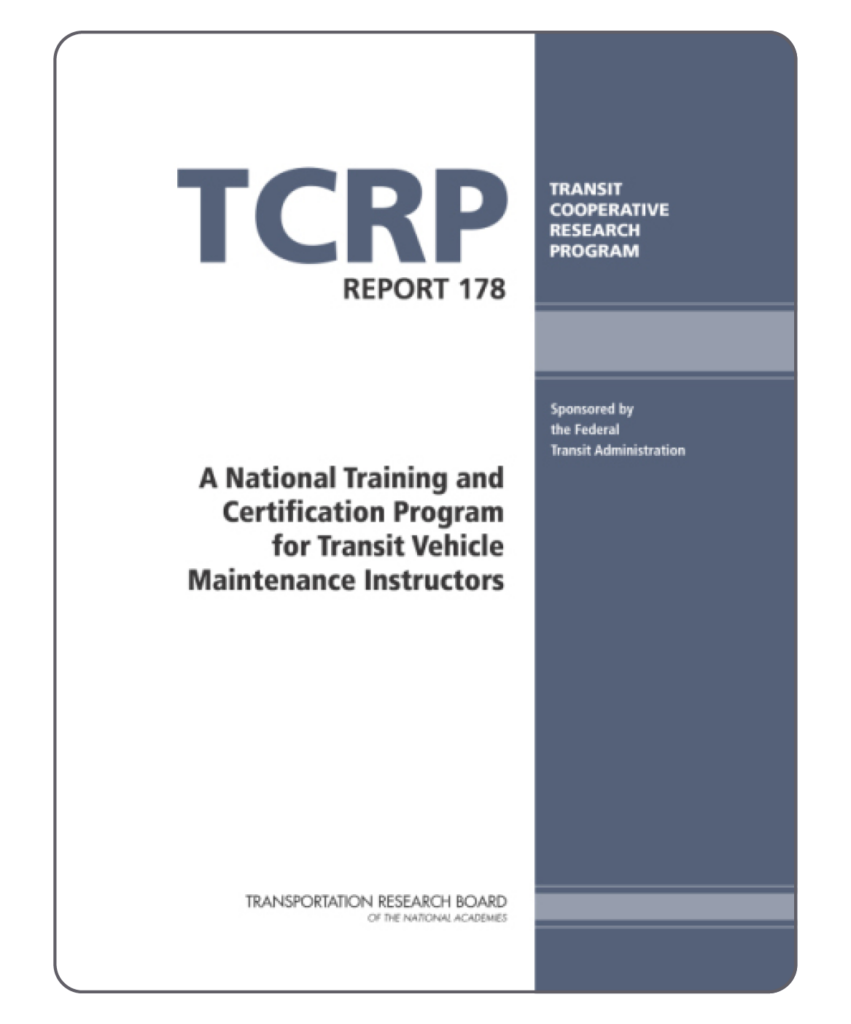
A National Training and Certification Program for Transit Vehicle Maintenance Instructors
This TCRP report provides a proposed national program structure and plan for training and certifying transit bus and rail maintenance instructors. The report also provides best practices used in the public and private sectors to prepare and certify technical instructors, as well as the attributes and instructional delivery methods found most effective for maintenance instructors.
Transit Cooperative Research Program
January 2015
TOPICS: Trainer and Mentor Development , Training
Contributor(s): National Academies of Sciences, Engineering, and Medicine; Transportation Research Board; Transit Cooperative Research Program Synthesis Program; Transit Cooperative Research Program; Transportation Learning Center; Educational Data Systems Inc
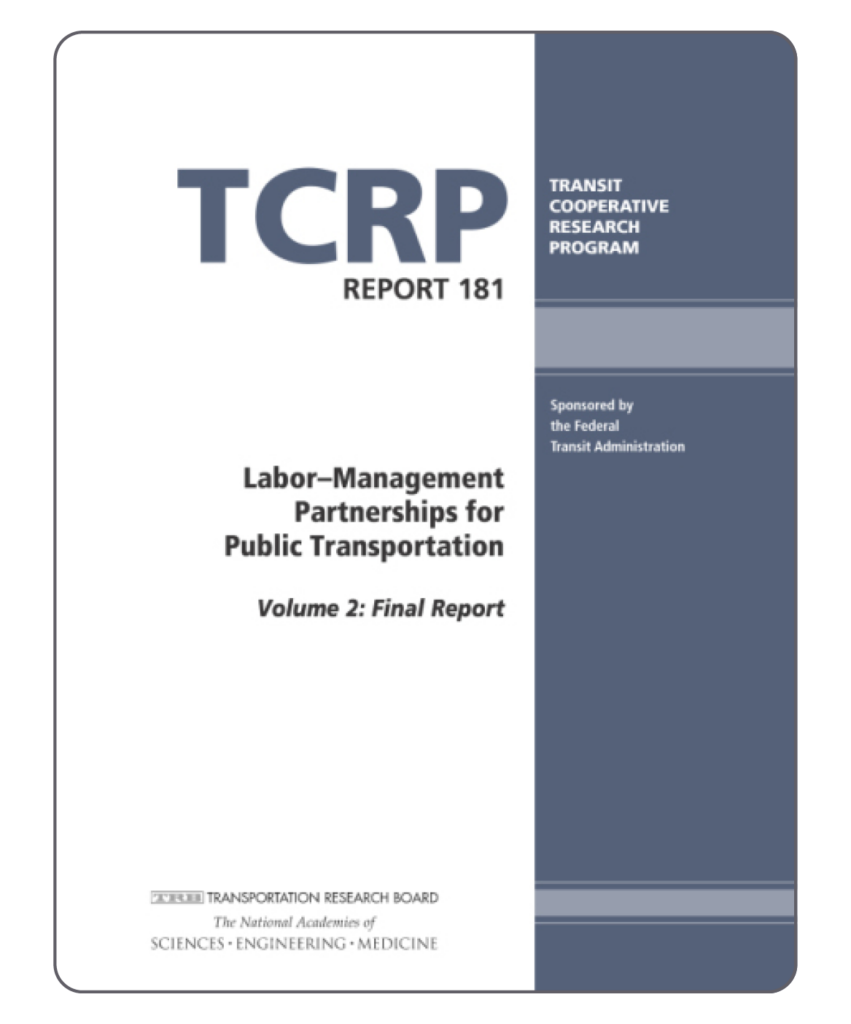
Labor-Management Partnerships for Public Transportation, Volume 2: Final Report
This TCRP report documents the materials used to develop the Volume 1: Toolkit, including an industry survey and case studies. Volume 1 provides resources for public transportation management and labor union leaders to establish, manage, and improve labor–management partnerships.
Transit Cooperative Research Program
January 2015
TOPICS: Apprenticeship , Labor-Management Partnerships , Training
Contributor(s): National Academies of Sciences, Engineering, and Medicine; Transportation Research Board; Transit Cooperative Research Program; Scott Baker; Chuyuan (Viktor) Zhong; Douglas Taylor; William F. Scott; Richard Plante
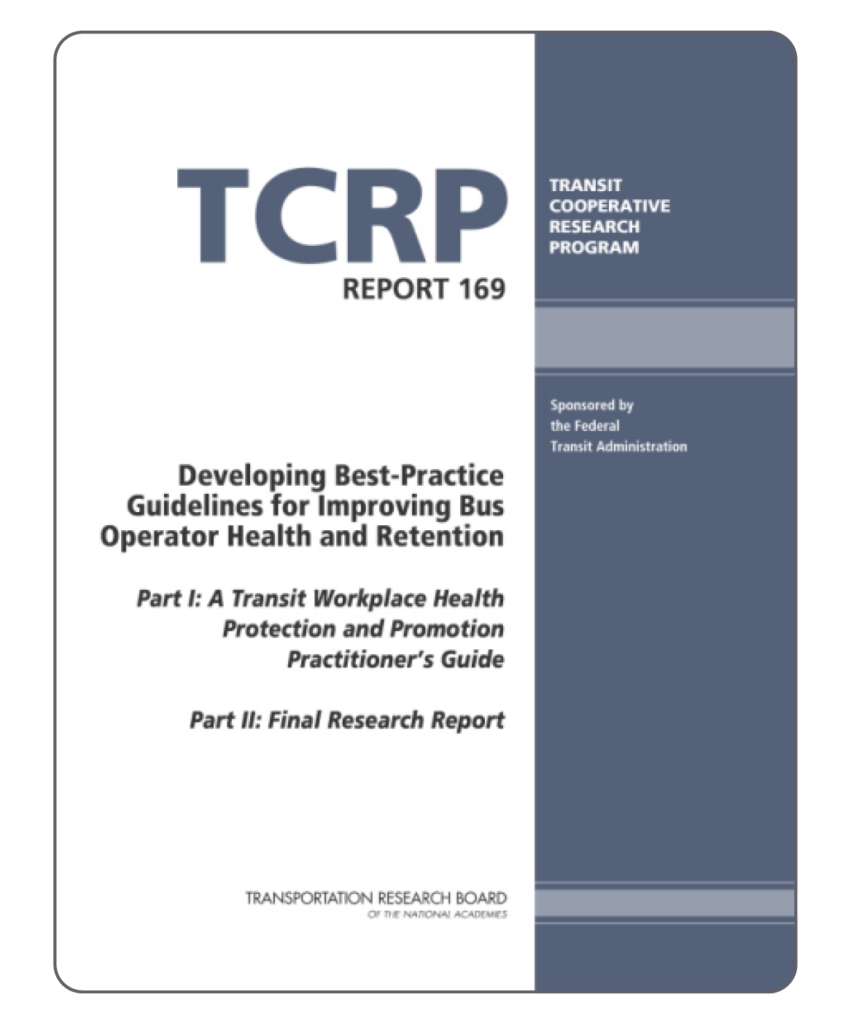
Developing Best-Practice Guidelines for Improving Bus Operator Health and Retention
This TCRP report addresses some of the health and safety issues common throughout the transit industry, and describes approaches that transit organizations in the United States and Canada have taken to address health problems faced by transit employees. The report is supplemented by a presentation, Making the Case for Transit Workplace Health Protection and Promotion, and an Excel worksheet, Transit Operator Workplace Health Protection and Promotion Planning, Evaluation, and ROI Template, that may assist transit agencies with implementing and carrying out transit-specific programs to protect the health of bus operators and other employees.
Transit Cooperative Research Program
August 2014
TOPICS: Policy and Planning , Retention , Safety and Health
Contributor(s): National Academies of Sciences, Engineering, and Medicine; Transportation Research Board; Transit Cooperative Research Program; Robin Mary Gillespie; Xinge Wang; Tia Brown
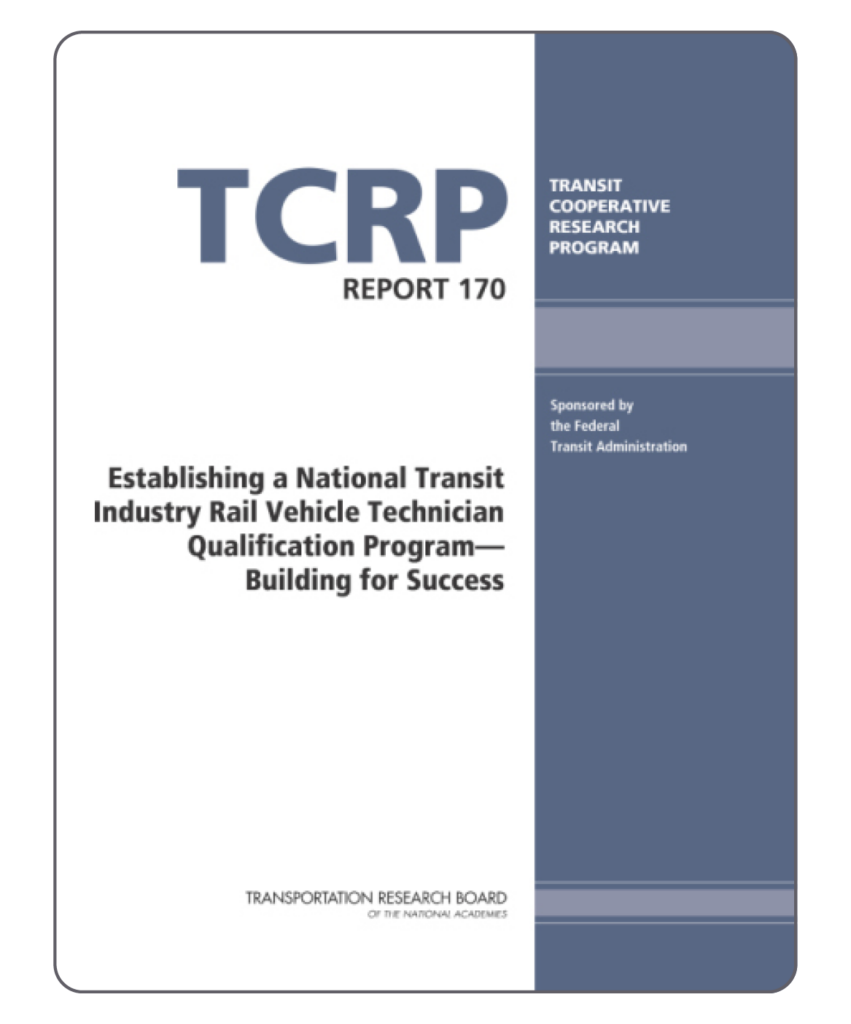
Establishing a National Transit Industry Rail Vehicle Technician Qualification Program—Building for Success
TRB’s Transit Cooperative Research Program (TCRP) Report 170: Establishing a National Transit Industry Rail Vehicle Technician Qualification Program—Building for Success describes a system of qualification that has been developed for rail vehicle technicians. This qualification system is available for implementation through the Transportation Learning Center.
The program integrates national training standards, progressive classroom curricula and introductory courseware, on-the-job learning modules, an apprenticeship framework that combines well-designed sequences of learning, mentoring to support learners, and coordination of classroom and on-the-job learning. The qualification system also includes written and hands-on certification assessments to confirm that technicians have the practical knowledge and skills required to perform their jobs at the highest level of expertise.
Transit Cooperative Research Program (TCRP) & International Transportation Learning Center
January 2014
TOPICS: Career Pathways , Mentorship , Trainer and Mentor Development , Training
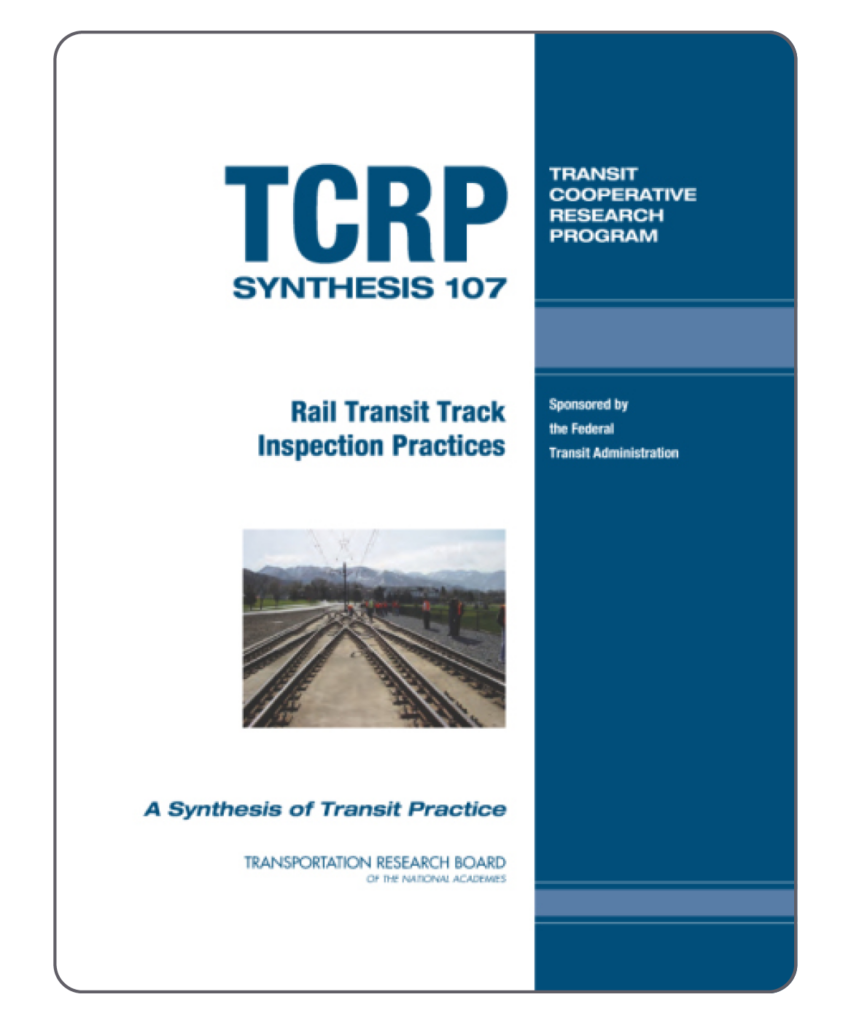
Rail Transit Track Inspection Practices
TRBs Transit Cooperative Research Program (TCRP) Synthesis 107: Rail Transit Track Inspection Practices offers information across a range of older and newer U.S. rail transit agencies on track inspection practices and policies.
Issues addressed in the report include agency staffing, agency organization and characteristics, track inspection program criteria, training and certification, procurement, and track safety practices.
Transit Cooperative Research Program (TCRP)
January 2013
TOPICS: Policy and Planning , Procurement , Safety and Health , Training
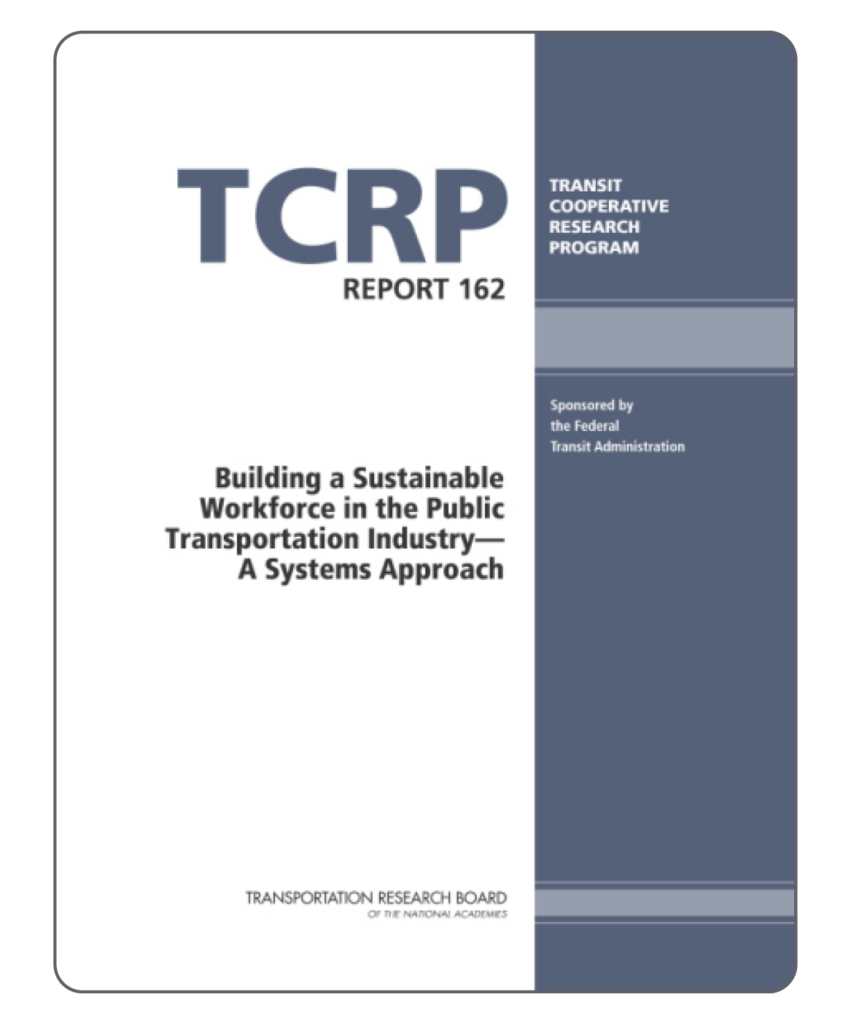
Building a Sustainable Workforce in the Public Transportation Industry—A Systems Approach
TRB’s Transit Cooperative Research Program (TCRP) Report 162: Building a Sustainable Workforce in the Public Transportation Industry—A Systems Approach provides a guidebook that addresses contemporary issues in workforce development, retention, and attraction, and public transportation image management.
The guidebook provides practical tools to transit agencies on a variety of workforce issues including workforce strategies that enhance organizational processes, performance metrics to evaluate the impact of workforce strategies, image management techniques that improve perceptions of the public transportation industry, and benchmarking processes that allow for continuous organizational improvement.
The guidebook is separated into modules that may be used independently or together in the form of the fully integrated guidebook.
Transit Cooperative Research Program (TCRP)
January 2013
TOPICS: Hiring and Recruitment , Policy and Planning , Retention , Training
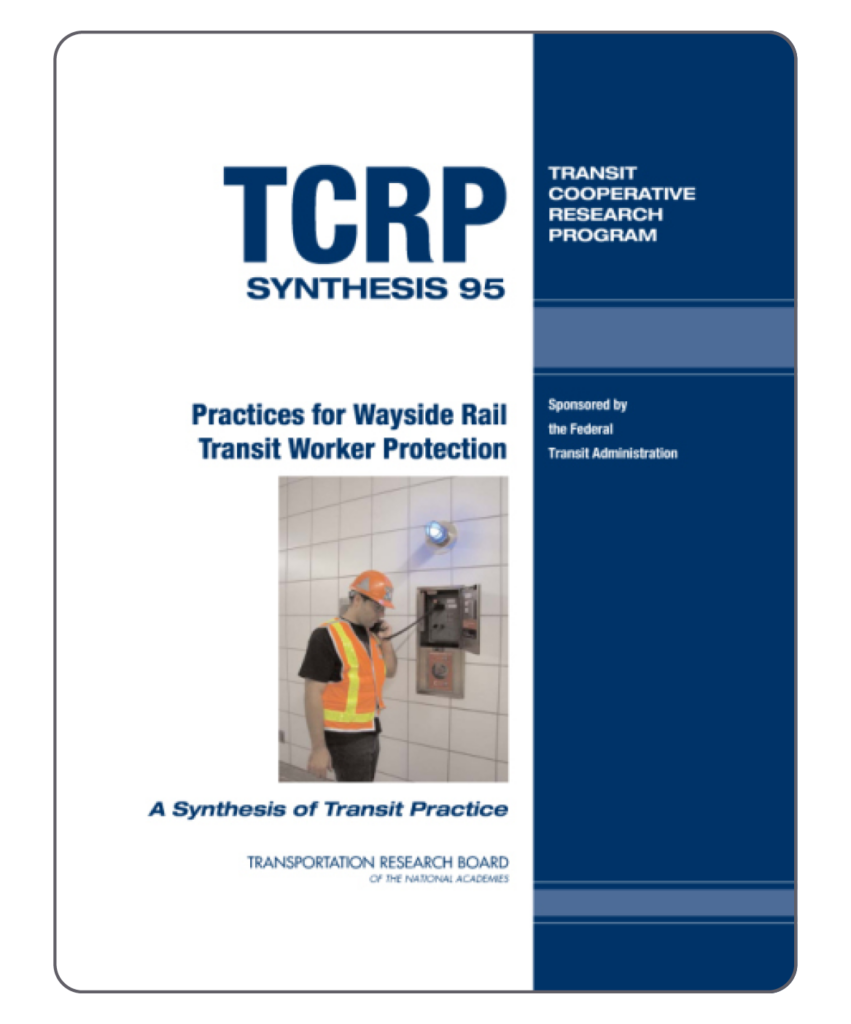
Practices for Wayside Rail Transit Worker Protection
TRB’s Transit Cooperative Research Program (TCRP) Synthesis 95: Practices for Wayside Rail Transit Worker Protection is designed to highlight knowledge, practice, lessons learned, and gaps in information related to wayside rail transit worker protection programs.
Transit Cooperative Research Program (TCRP)
January 2012
TOPICS: Safety and Health , Training
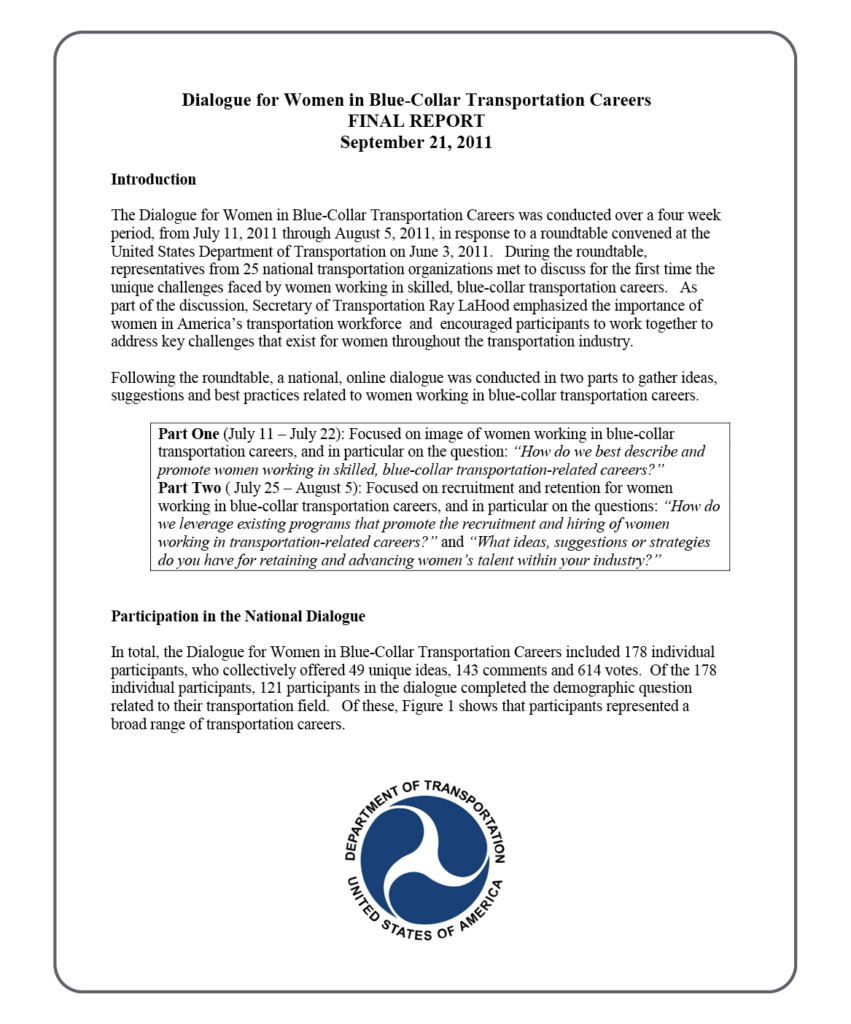
Dialogue for Women in Blue-Collar Transportation Careers
This short summary report describes unique challenges and recommendations regarding women in blue-collar positions in transportation.
US Department of Transportation
September 2011
TOPICS: Community Engagement , Hiring and Recruitment , Retention
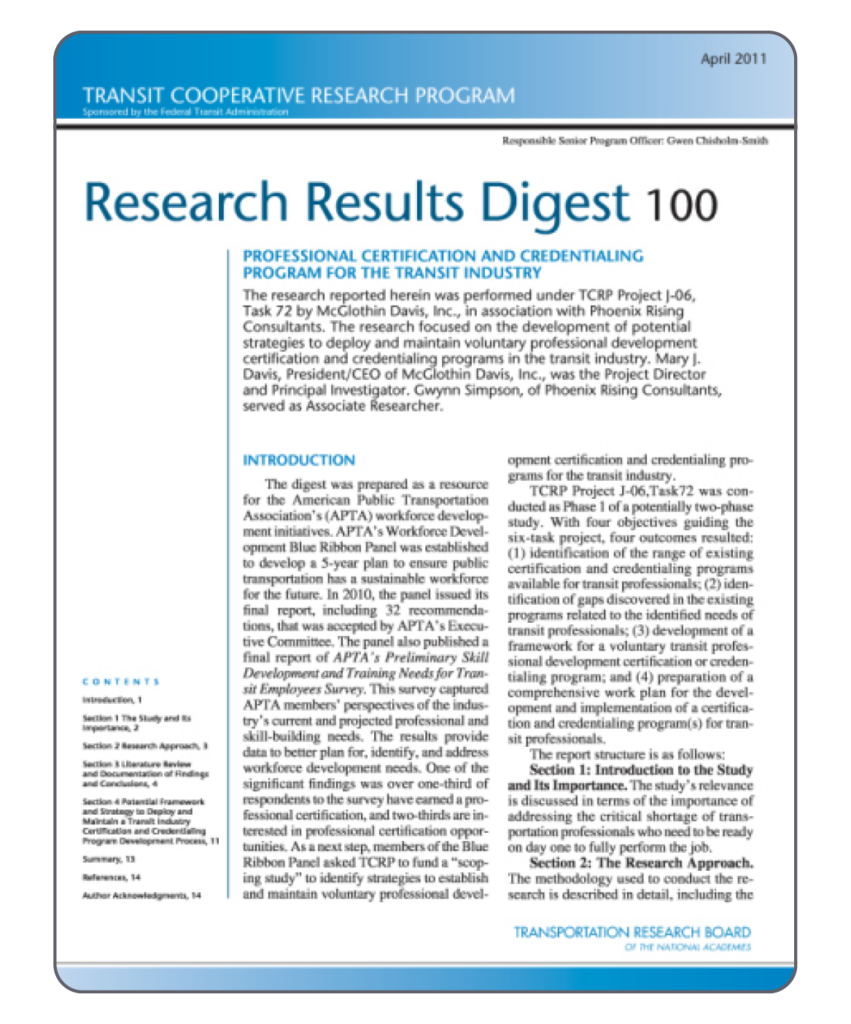
Professional Certification and Credentialing Program for the Transit Industry
TRB’s Transit Cooperative Research Program (TCRP) Research Results Digest 100: Professional Certification and Credentialing Program for the Transit Industry explores the findings of a literature review and a gap analysis of the efficacy of four transit-specific professional development programs. The report also examines potential strategies that might be used to deploy and maintain a transit industry certification and credentialing program.
Transit Cooperative Research Program (TCRP)
April 2011
TOPICS: Career Pathways , Policy and Planning , Retention , Training
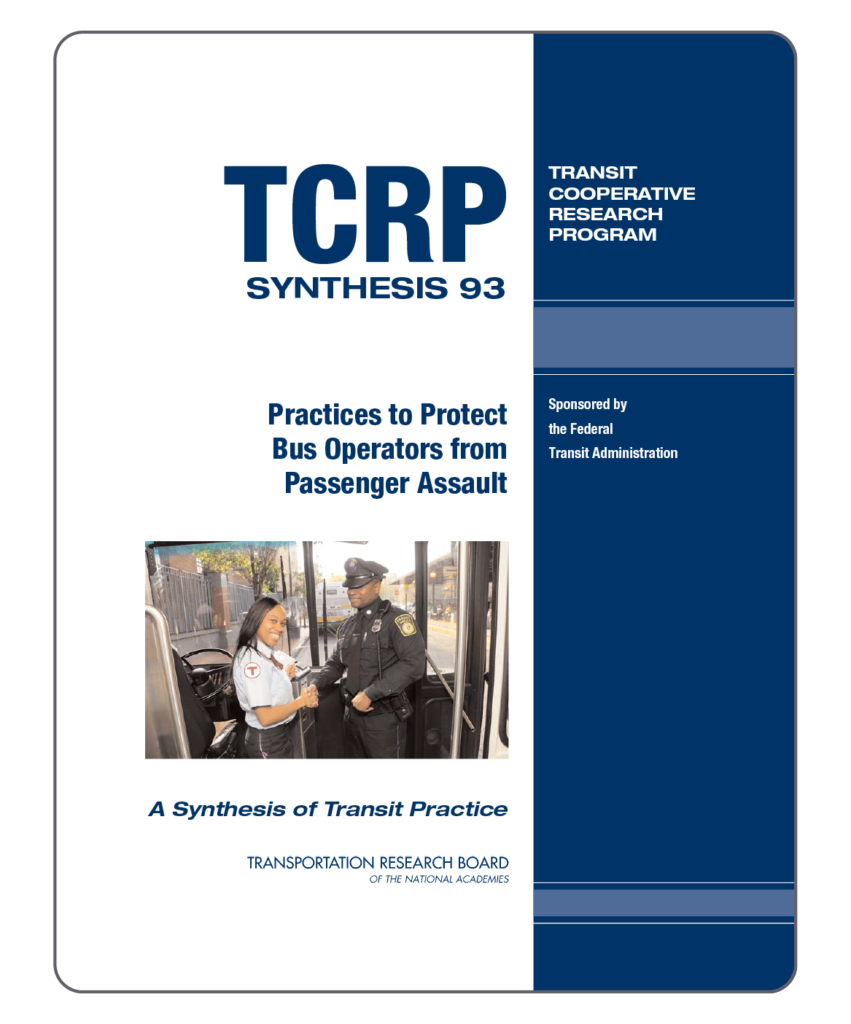
Practices to Protect Bus Operators from Passenger Assault: A Synthesis of Transit Practice
The TCRP Synthesis 93 highlights practices and policies implemented by transit agencies to deter and mitigate assaults on bus operators.
Transit Cooperative Research Program
January 2011
TOPICS: Retention , Safety and Health
Contributor(s): National Academies of Sciences, Engineering, and Medicine; Transportation Research Board; Transit Cooperative Research Program Synthesis Program; Transit Cooperative Research Program
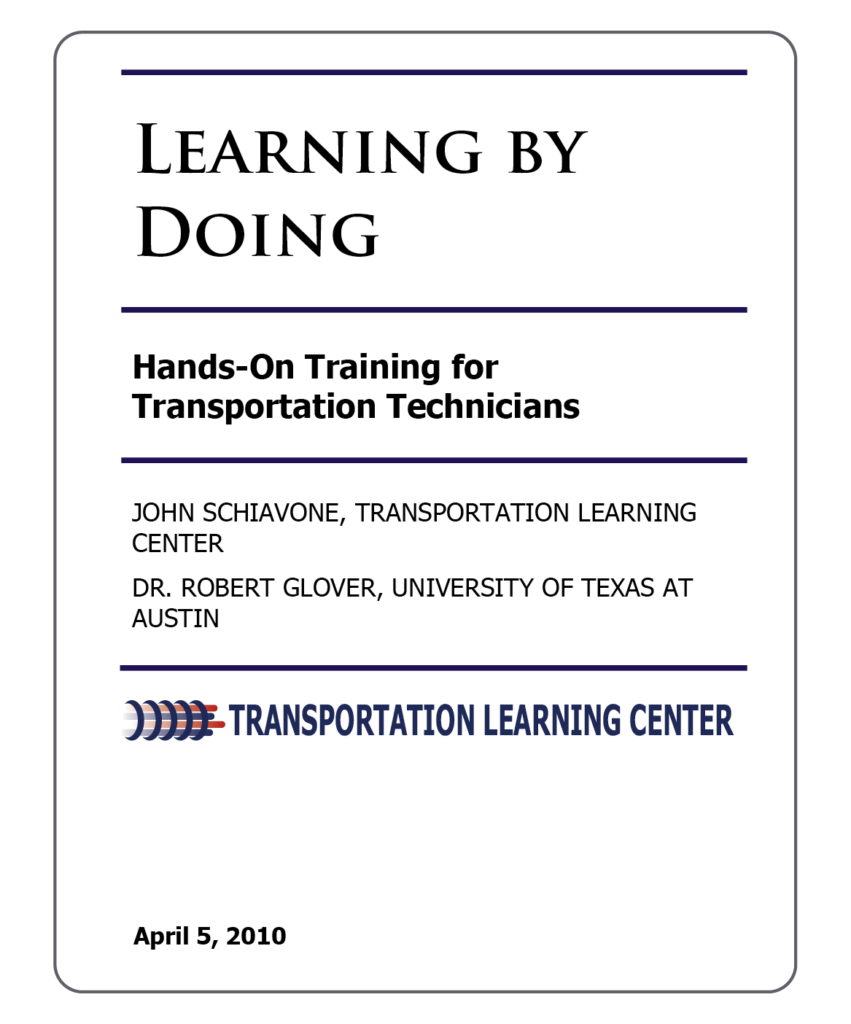
Learning by Doing: Hands-On Training for Transportation Technicians
Today, formal training is absolutely essential to produce technicians capable of providing safe, efficient and cost-effective transport services. The consequences of jeopardizing passenger and public safety are just too great to turn inexperienced workers loose on advanced transit vehicles without proper training, hoping they will learn “as they go.” The question becomes how best to construct an effective training program.
This paper, from the International Transportation Learning Center, examines the subject of technical training and advocates “learning by doing” as an essential element to acquiring needed technical knowledge and skills. It stands to reason that someone attracted to becoming a technician is interested in working with their hands. Training, therefore, should make use of that natural inclination and engage students in hands-on activities throughout the entire learning process.
International Transportation Learning Center
April 2010
TOPICS: Apprenticeship , Training
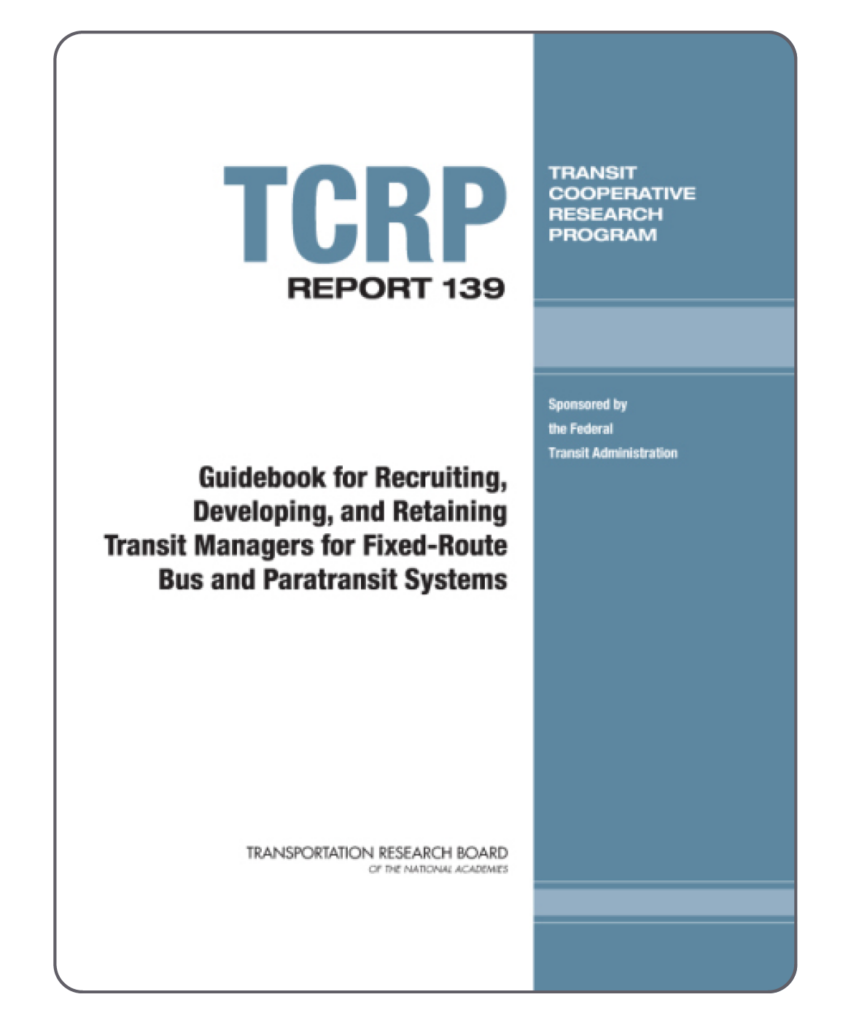
Guidebook for Recruiting, Developing, and Retaining Transit Managers for Fixed-Route Bus and Paratransit Systems
TRB’s Transit Cooperative Research Program (TCRP) Report 139: Guidebook for Recruiting, Developing, and Retaining Transit Managers for Fixed-Route Bus and Paratransit Systems explores resources for fixed-route bus, general public demand response, and Americans with Disabilities Act (ADA) paratransit systems resources to assist in the recruitment, development, and retention of managers.
Transit Cooperative Research Program
March 2010
TOPICS: Hiring and Recruitment , Policy and Planning , Retention , Workforce Shortage
Contributor(s): National Academies of Sciences, Engineering, and Medicine; Transportation Research Board; Transit Cooperative Research Program
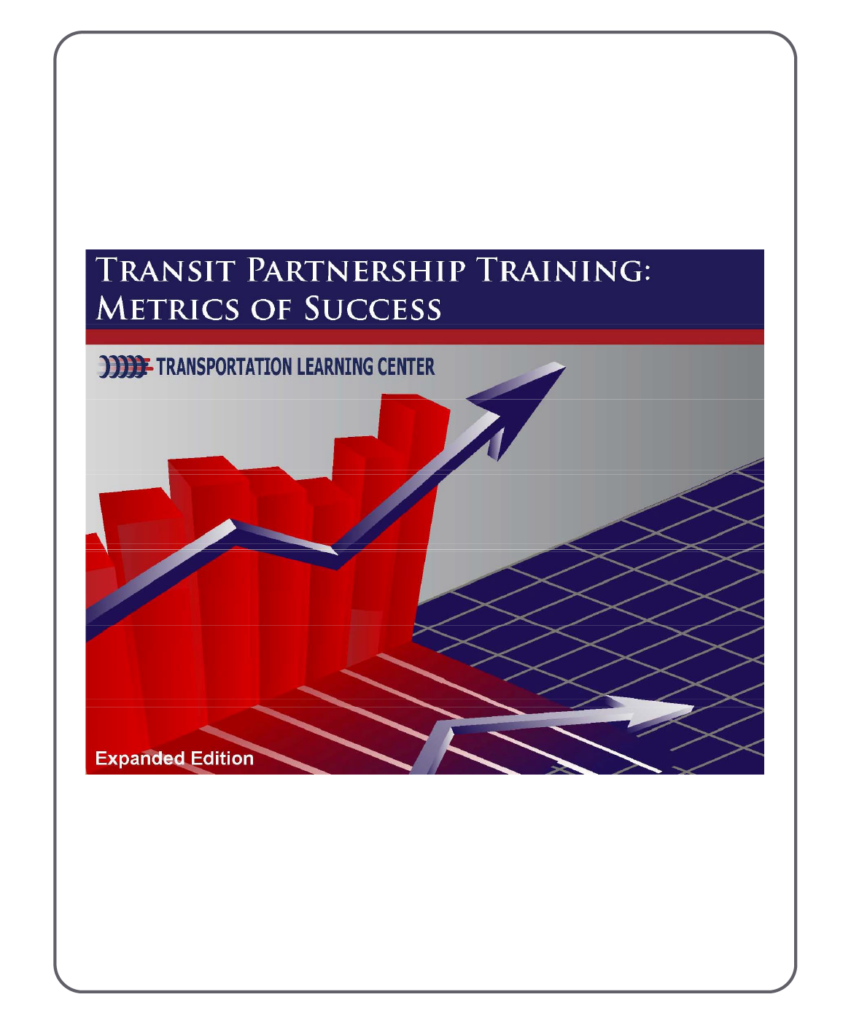
Transit Partnership Training: Metrics of Success
The Transit Partnership Training: Metrics of Success report is an overview of the key findings of the Metrics of Success series, which chronicles measurable outcomes, in particular return on investment, of transit training partnerships in which the International Transportation Learning Center has had a substantial role.
International Transportation Learning Center
February 2010
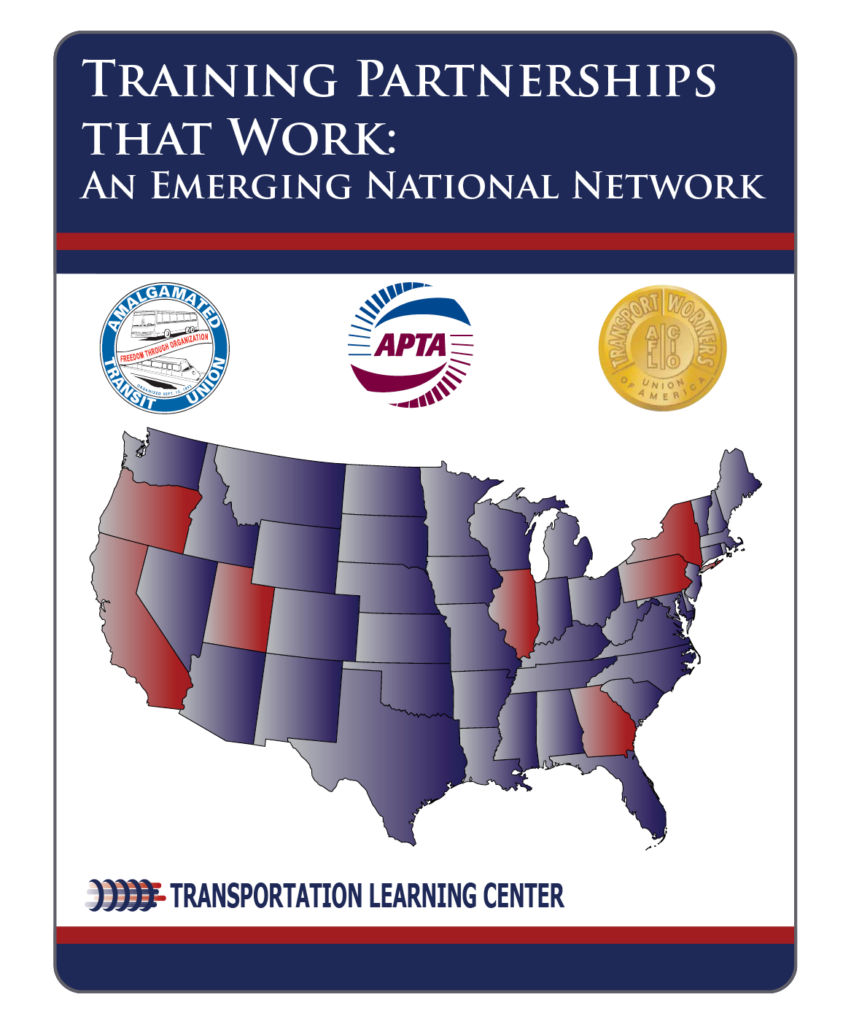
Training Partnerships That Work: An Emerging National Network
Training Partnerships That Work provides vivid summaries of successful labor-management training partnerships at sites across the country. The cases included here represent unique training partnerships. Most importantly, they illustrate how labor and management can work together successfully on issues of training, and provide valuable lessons for other industries facing the problem of retiring baby boomers and inadequate capacity to train replacement workers.
International Transportation Learning Center
February 2010
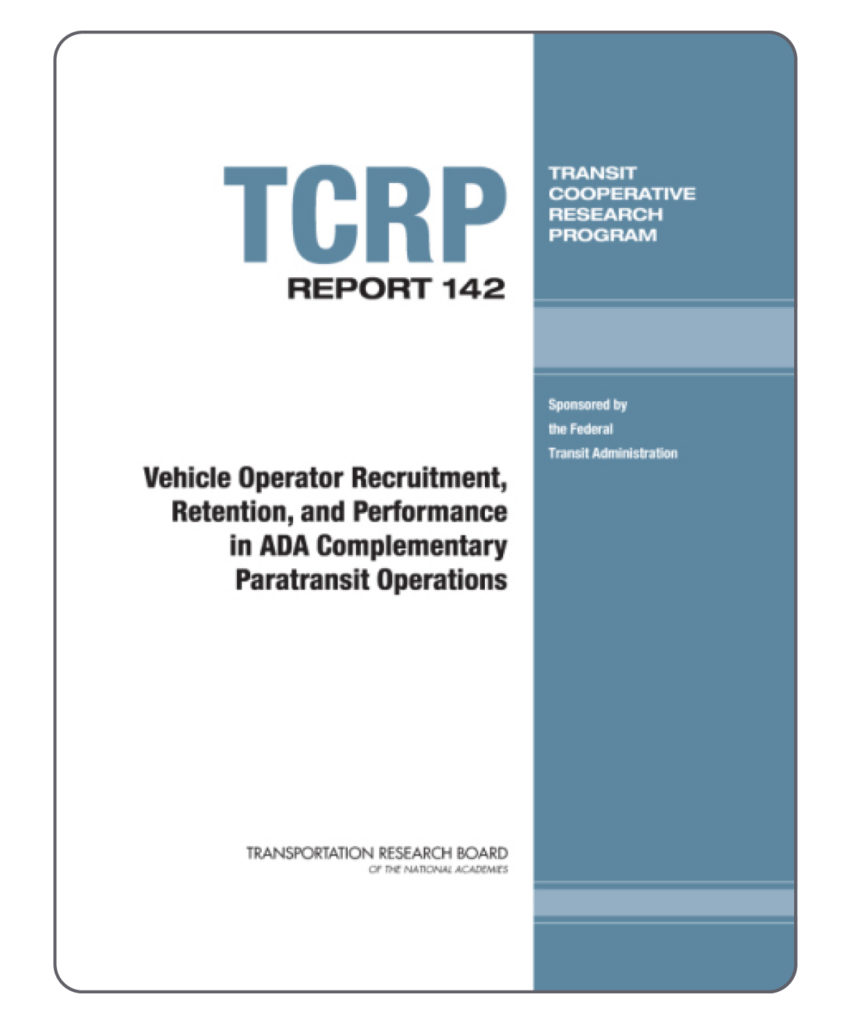
Vehicle Operator Recruitment, Retention, and Performance in ADA Complementary Paratransit Operations
TRB’s Transit Cooperative Research Program (TCRP) Report 142: Vehicle Operator Recruitment, Retention, and Performance in ADA Complementary Paratransit Operations provides guidance for understanding the relationships that influence and enhance operator recruitment, retention, and performance in Americans with Disabilities Act (ADA) complementary paratransit services.
Transit Cooperative Research Program (TCRP)
TOPICS: Hiring and Recruitment , Retention , Training
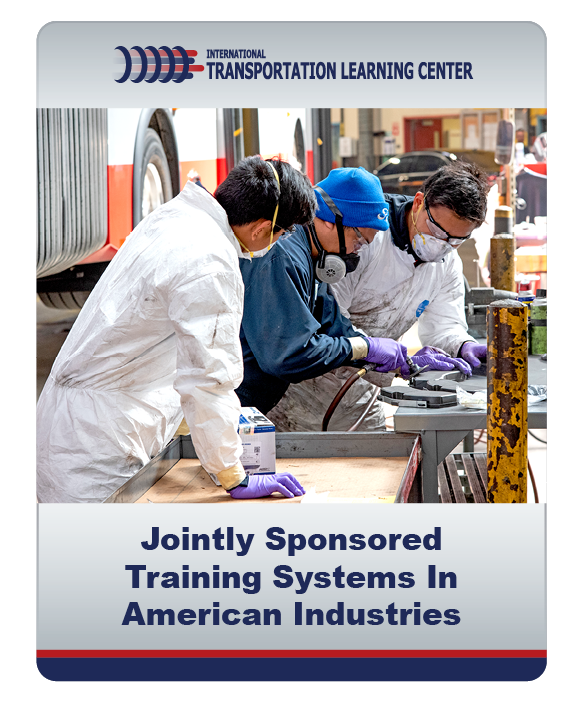
Jointly Sponsored Training Systems In American Industries
This paper examines recent developments in credentialing in jointly sponsored training and qualifications systems across the United States. This paper builds on previous work on building trades joint apprenticeship and training programs, describes their structure and activities, and documents their superior performance.
Written in collaboration with Robert W. Glover, the University of Texas at Austin.
International Transportation Learning Center
February 2009
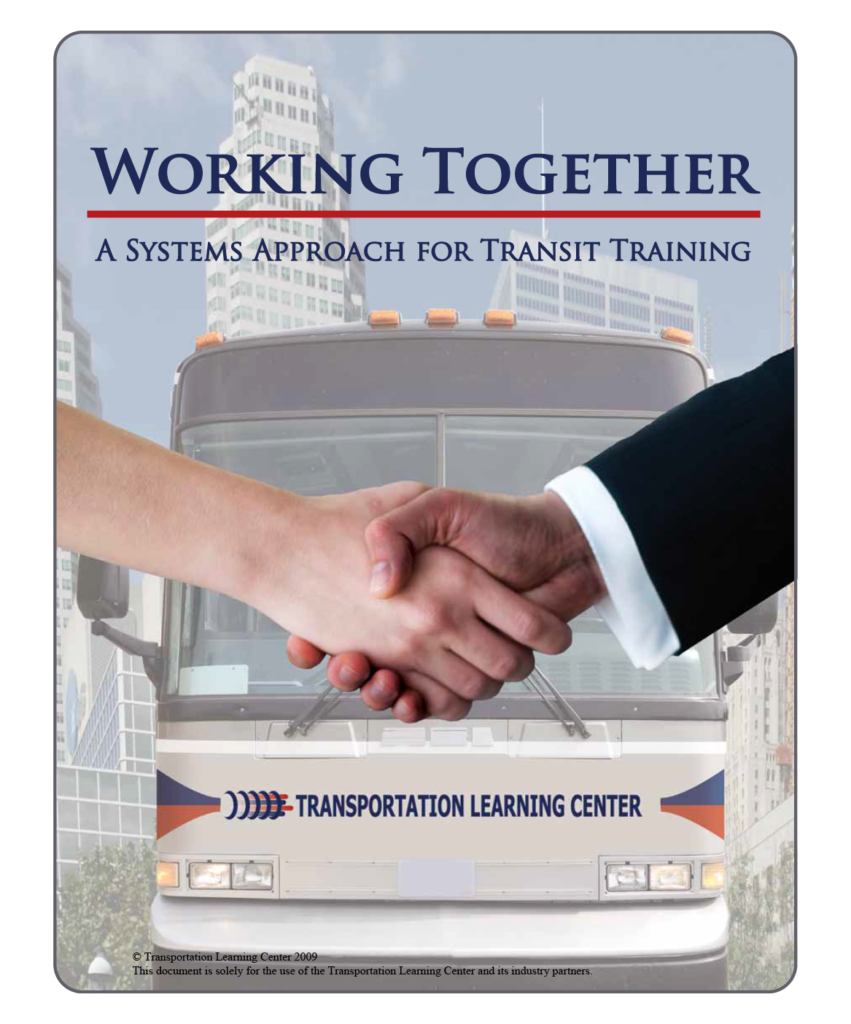
Working Together: A Systems Approach for Transit Training
Transit faces a critical skills challenge driven by changing technologies, shifting workforce demographics and record-breaking growth in ridership. Working Together: A Systems Approach for Transit Training outlines how constructive training partnerships provide the most effective way for the transit industry to address its skill challenges.
International Transportation Learning Center
January 2009
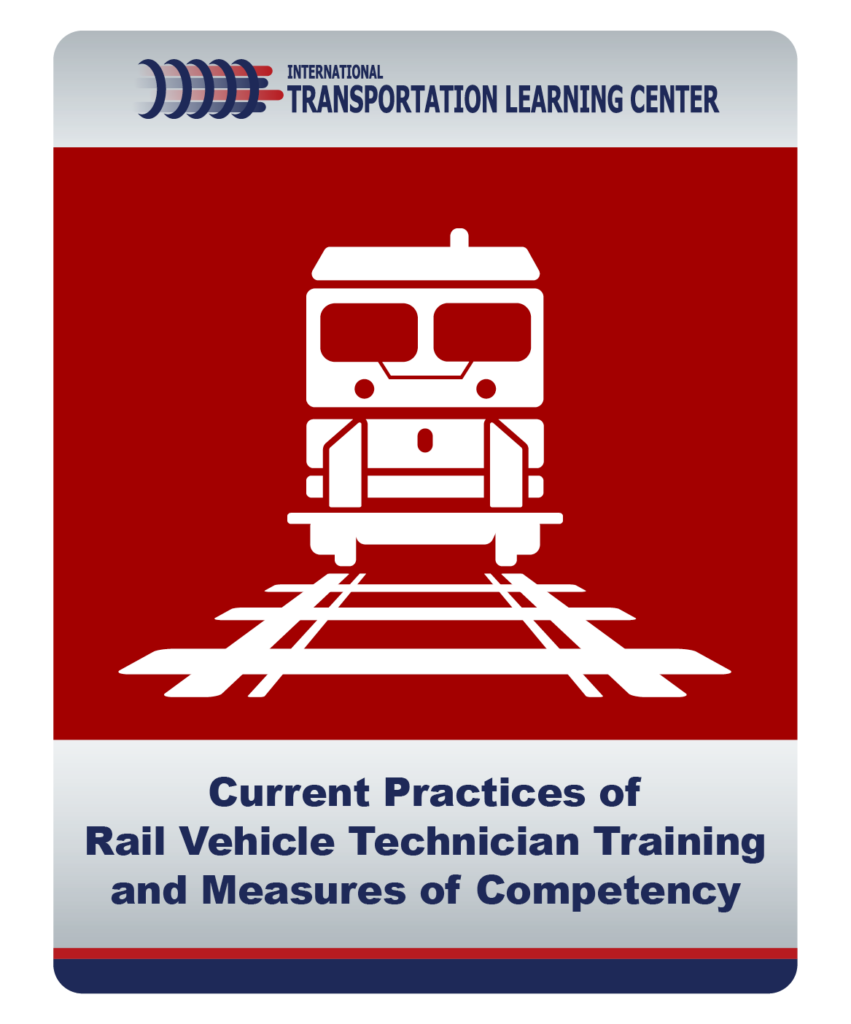
Current Practices of Rail Vehicle Technician Training and Measures of Competency
This 2009 ILTC brief summarizes findings from a survey on best practices in rail car maintenance, based on recommendations from the RCRP E-7 Panel.
International Transportation Learning Center
January 2009
TOPICS: Policy and Planning , Training
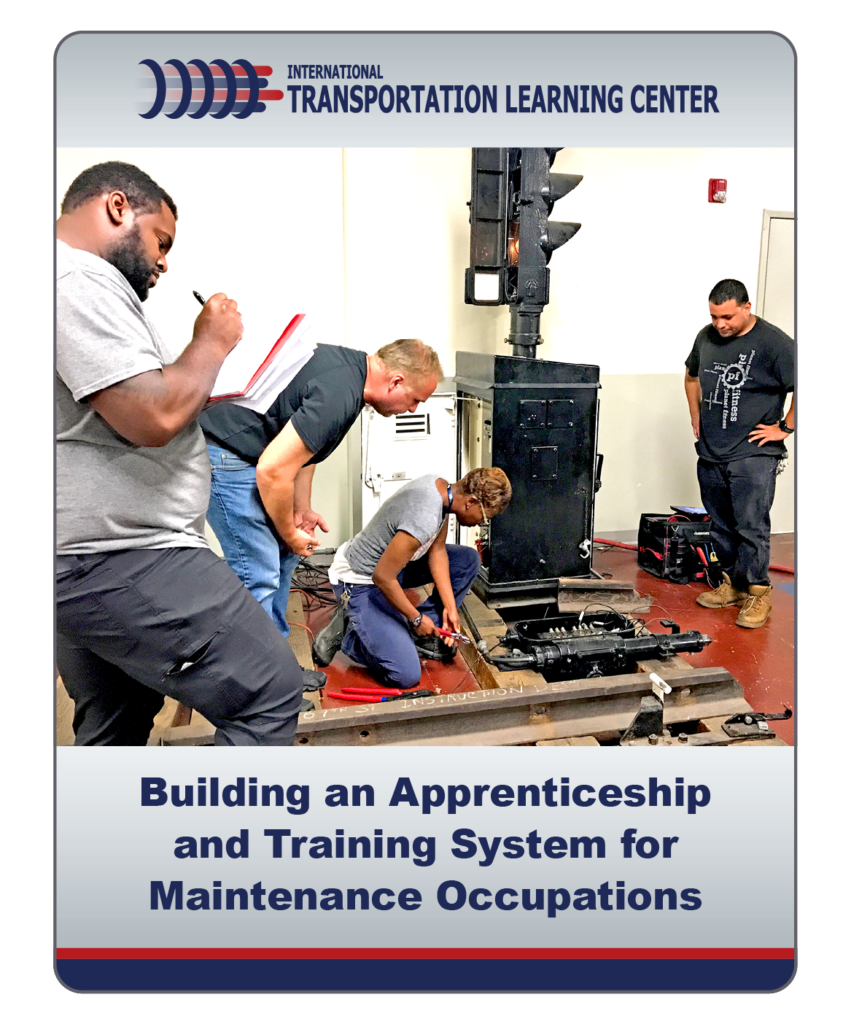
Building an Apprenticeship and Training System for Maintenance Occupations
This article discusses the joint training and apprenticeship system emerging in maintenance occupations in the American transit industry, as well as related challenges and strategies to overcome them. The article reports on early results, including efforts to develop a consensus national framework for apprenticeship and training in transit maintenance.
Written with Robert W. Glover, the University of Texas at Austin.
International Transportation Learning Center
January 2009
TOPICS: Apprenticeship , Career Pathways , Training
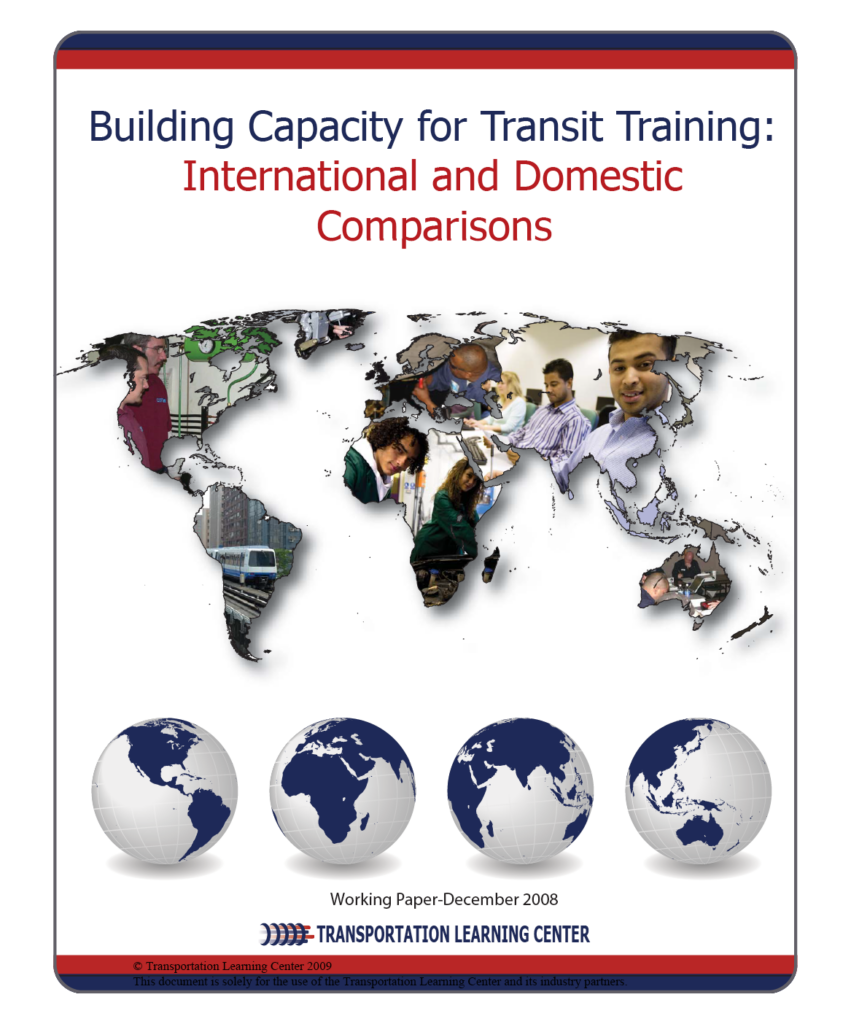
Building Capacity for Transit Training: International and Domestic Comparisons
This working paper provides an overview of the findings from research on strong industry-wide workforce development systems in six other countries and in several US industries. It identifies key features that could be adapted for use to create more effective US transit training.
International Transportation Learning Center
December 2008
TOPICS: Apprenticeship , Program Evaluation and ROI , Training
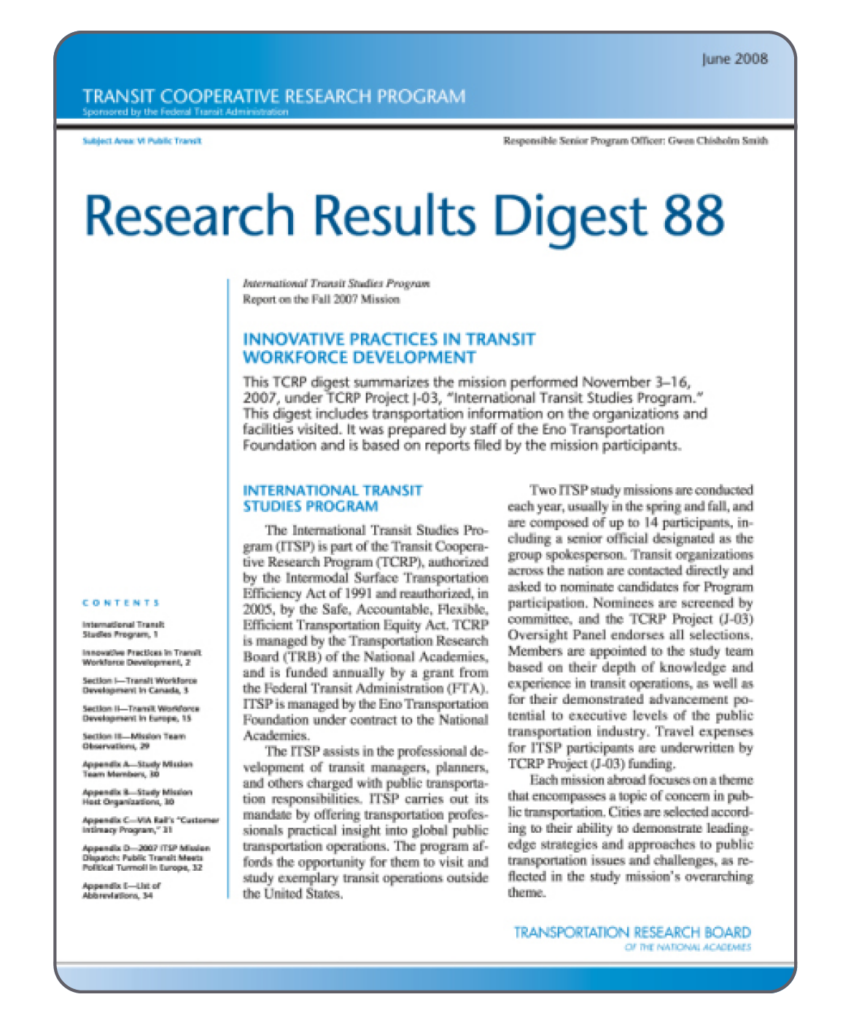
Innovative Practices in Transit Workforce Development
TRB’s Transit Cooperative Research Program (TCRP) Research Results Digest 88: Innovative Practices in Transit Workforce Development examines innovative practices in workforce development in several cities in Canada, France, and Belgium.
Transit Cooperative Research Program (TCRP)
June 2008
TOPICS: Hiring and Recruitment , Policy and Planning , Training
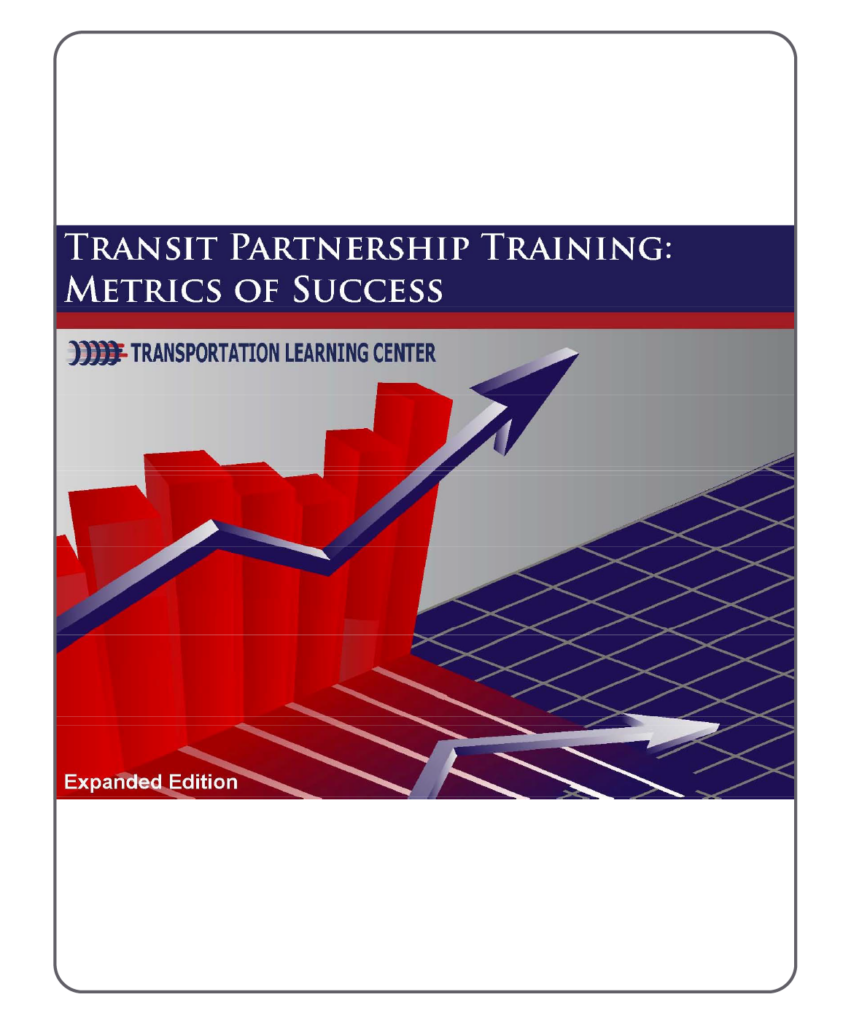
Metrics of Success Series
The Metrics of Success series chronicles measurable outcomes, in particular return on investment, of transit training partnerships in which the International Transportation Learning Center has had a substantial role. Each Metrics report focuses on quantitative data from a specific partnership, while Transit Partnership Training: Metrics of Success is an overview of key findings from all Metrics reports to date.
International Transportation Learning Center
May 2008
 Transit Partnership Training: Metrics of Success – Expanded Edition
Transit Partnership Training: Metrics of Success – Expanded Edition
 Smart Investment Partnership: New York State's Transit Workforce Training Proves its Worth
Smart Investment Partnership: New York State's Transit Workforce Training Proves its Worth
 Measuring Up: Keystone Training Partnership – Vol. 1
Measuring Up: Keystone Training Partnership – Vol. 1
 Measuring Up: Keystone Training Partnership – Vol. 2
Measuring Up: Keystone Training Partnership – Vol. 2
 Keystone – Making a Difference in Pennsylvania Transit
Keystone – Making a Difference in Pennsylvania Transit
 Keystone – Pennsylvania Transit on the High Road
Keystone – Pennsylvania Transit on the High Road
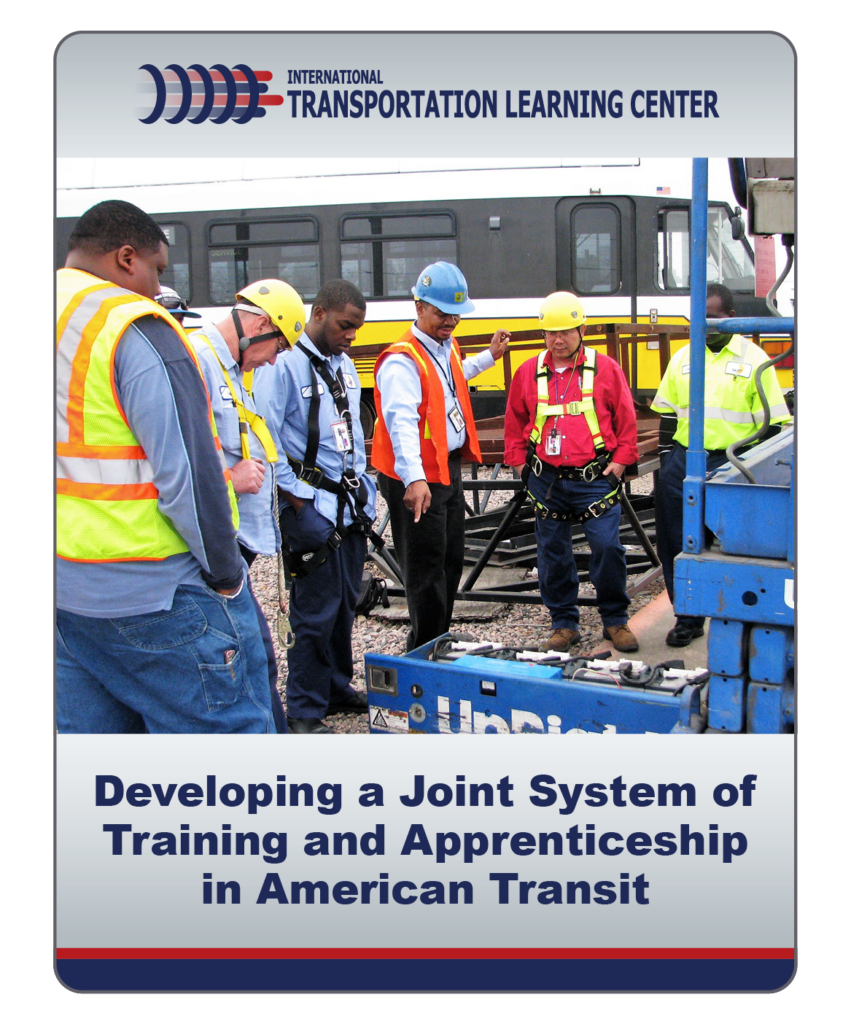
Developing a Joint System of Training and Apprenticeship in American Transit
This paper reviews training innovations and lessons that may be applicable to the transit industry from practices used in other industries. It draws on a rich body of experience of joint apprenticeship and training programs, as well as employer-sponsored training.
Prepared with Robert W. Glover, the University of Texas at Austin.
International Transportation Learning Center
September 2007
TOPICS: Apprenticeship , Policy and Planning , Training
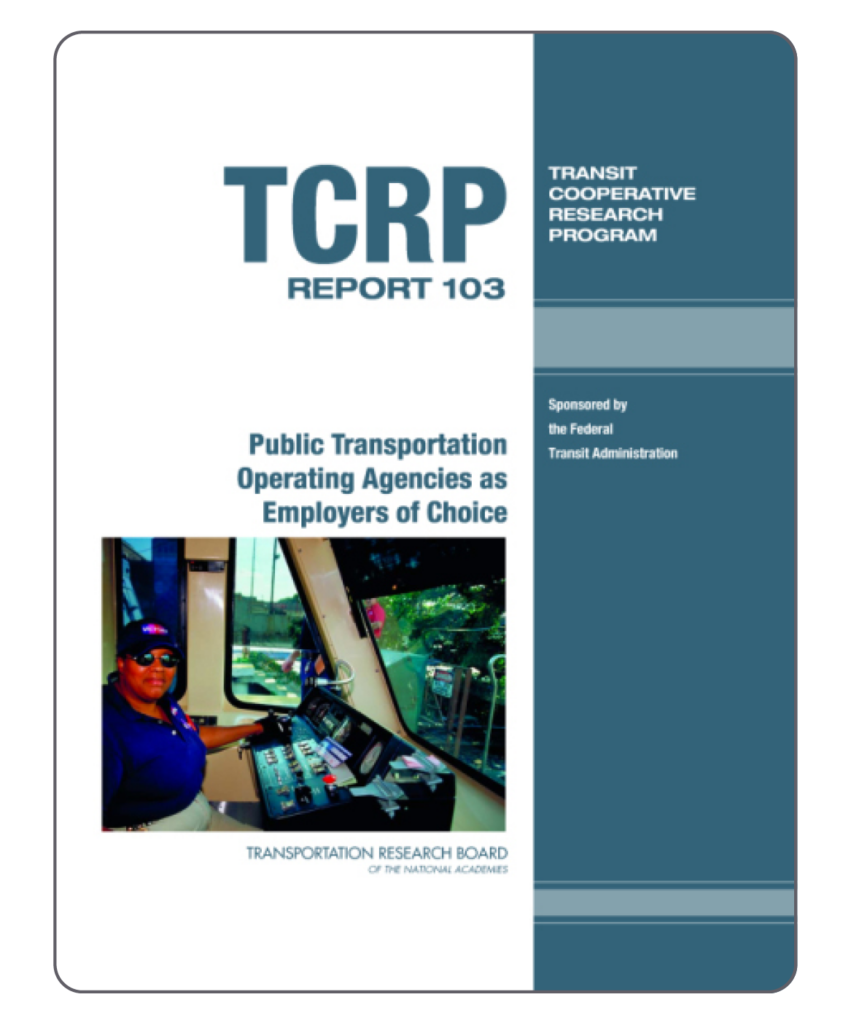
Public Transportation Operating Agencies as Employers of Choice
TRB’s Transit Cooperative Research Program (TCRP) Report 103 documents principles, techniques, and strategies that are used in workforce recruitment, development, and retention. The report includes a companion document, “Communications Strategy and Implementation Plan, Positioning the Public Transportation Operating Agency as an Employer of Choice” that describes strategies and solutions that offer the greatest potential for positioning public transportation operating agencies as an employer of choice.
Contributors: Watson Wyatt Worldwide and Focus Group Corporation
Transit Cooperative Research Program
January 2004
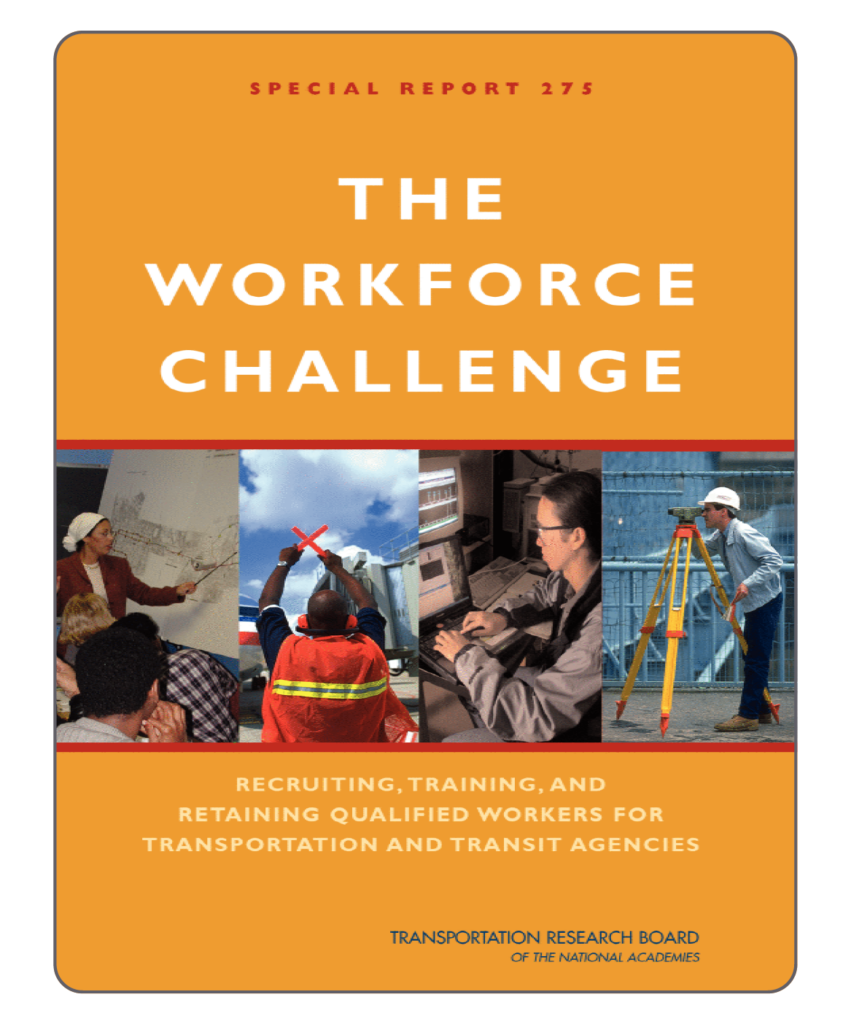
The Workforce Challenge
This report compiles research about the issues facing the transportation workforce, including changing skills, an aging workforce, and low prioritization of training. The report recommends working to expand existing federal and academic resources, create an institutional focus for the issue, and establish human resources management as a strategic function within the transportation community.
Transportation Research Board
January 2003
TOPICS: Hiring and Recruitment , Policy and Planning , Procurement , Retention , Training
Contributor(s): National Academies of Sciences, Engineering, and Medicine; Transportation Research Board; Committee on Future Surface Transportation Agency Human Resource Needs: Strategies for Recruiting, Training, and Retaining Personnel
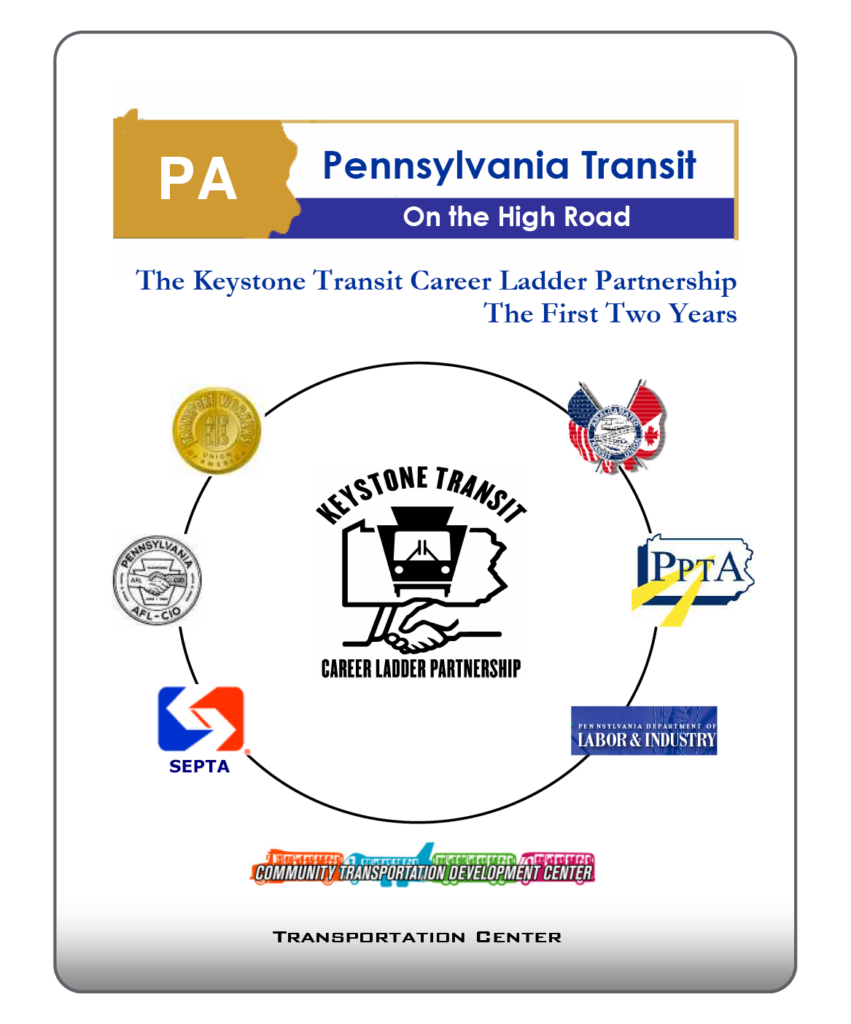
Pennsylvania Transit on the High Road
This report is part of a larger case study that chronicles the development of the Keystone Transit Career Ladder Partnership, including the process of job task/work task analysis, skills gap analysis, and data-driven training development.
International Transportation Learning Center
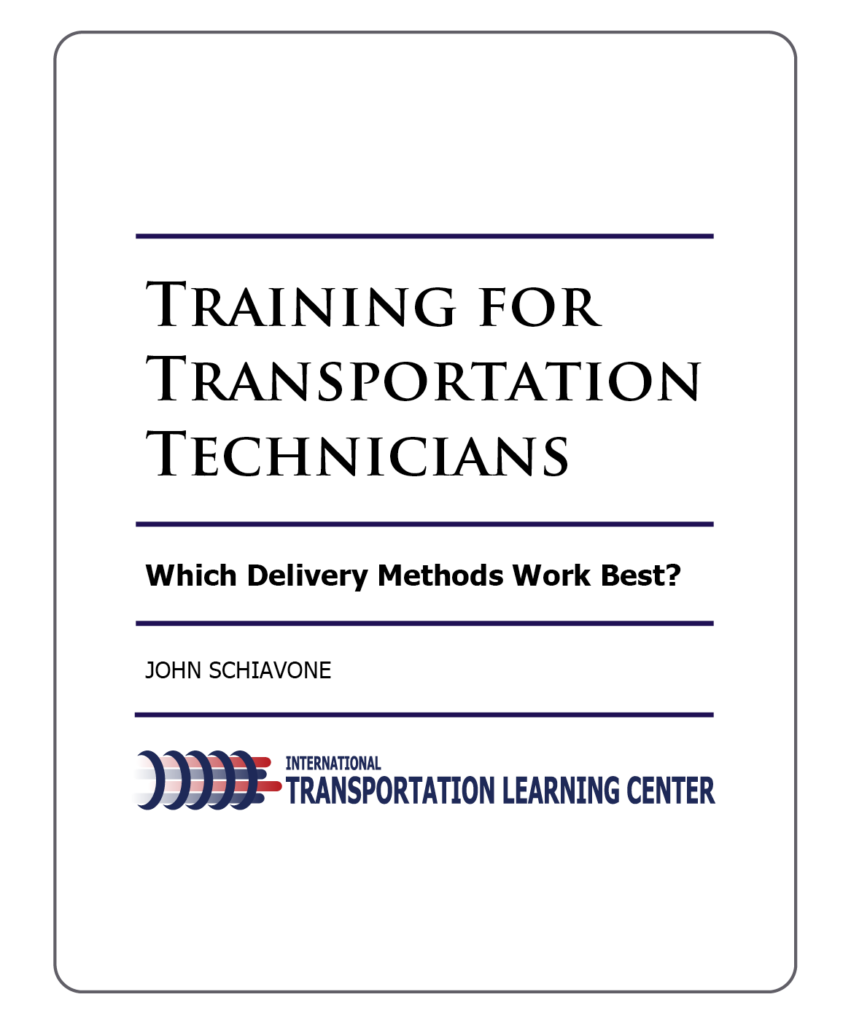
Training for Transportation Technicians: Which Delivery Methods Work Best?
This paper explores what is the most effective way to train transportation technicians. It proposes a blended approach combining classroom time with interactive hands-on demonstrations, followed by structured on-the-job training (OJT) and mentoring.
International Transportation Learning Center
TOPICS: Apprenticeship , Career Pathways , Mentorship , Training






